A look at President Trump’s administration and the rest of Washington:
- Trump wants to boost defense spending by $54 billion, a 10% jump
- Justice Department shifts course in controversial Texas voting rights case
- Trump says “nobody knew healthcare could be this complicated.”
- Trump says Hollywood‘s obsession with him led to Oscar snafu
- Trump’s nominee for Navy secretary withdraws over financial conflicts
- Democrats pick Tom Perez to lead them from the political wilderness
As the healthcare vote looms, Trump sees opposition from conservatives, both on Capitol Hill and in the media
It’s a really important vote in President Trump’s fledgling first term.
Will House Republicans pass a bill to repeal and replace the Affordable Care Act — a promise from Trump on the campaign trail — or reject it? (House Speaker Paul D. Ryan rushed to the White House on Friday morning for a last-minute meeting with Trump as both attempted to corral enough votes.)
Trump spent much of the week trying to win support from members of the Freedom Caucus, among the most conservative lawmakers, some of whom are holdouts because they believe the bill does not go far enough.
“After seven horrible years of ObamaCare (skyrocketing premiums & deductibles, bad healthcare), this is finally your chance for a great plan!” Trump tweeted Friday.
But even some in conservative media aren’t all that thrilled about the bill.
Here are some of Friday’s headlines:
Polls: Ryancare even more unpopular than Obamacare and Hillarycare (Breitbart)
So, it’s been clear in recent weeks that the right-wing website Breitbart does not like the new healthcare proposal.
The news site has dubbed the current bill Obamacare-lite or Ryancare — an homage of sorts to Ryan, who helped craft the legislation — and argued it does not go far enough in its overhaul.
Most conservatives want to repeal the Affordable Care Act, nicknamed Obamacare, they just differ on what the replacement should look like. For example, some on the far right want to see so-called “essential health benefits,” such as maternity and newborn care, stripped from the bill.)
This piece highlights several of the dismal polls the legislation has received.
Among them: A recent Fox News survey that showed 54% oppose the bill, compared with 34% who support it. The article also references an analysis of polling and data by FiveThirtyEight.com, which shows the GOP legislation is more unpopular than Obamacare and President Bill Clinton’s healthcare reform bill were when they were first introduced.
A modest immigration proposal (Weekly Standard)
Trump’s recent immigration orders have left many immigrants on edge.
Through social media and pop-up legal clinics, immigrant rights groups have doled out around-the-clock assistance, as families fear being separated.
In this piece, Irwin Stelzer notes that “at some point, our border will be secure, resistance to deporting felons will collapse, and we will have accepted the fact that Dreamers will be allowed to stay in this country, probably on a path to citizenship.”
He lays out his views of immigration reform, citing, among other things, setting an annual immigration limit and adopting “a system that has the effect of enriching our citizens by filling that annual quota with immigrants who are likely to increase the well-being of the existing citizenry.”
Jeff Sessions is Rip Van Winkle on drug policy (American Conservative)
It’s clear from polls that most Republicans oppose marijuana legalization, while Democrats support it.
However, libertarian-leaning Republicans often tend to support legalization.
This piece highlights Atty. Gen. Jeff Sessions’ recent comments in opposition to states legalizing pot.
“The attorney general regurgitates simplistic clichés right out of the 1970s and 1980s about marijuana use. ‘I don’t think America is going to be a better place when people of all ages, and particularly young people, are smoking pot,’ Sessions told reporters on February 26,” the author, Ted Galen Carpenter, writes.
He adds, “Such comments confirm that critics may be right when they label him a ‘drug war dinosaur.’ He seems either oblivious or scornful about the trend in public opinion regarding marijuana.”
FCC Chairman Pai wants to halt Internet privacy rules before they begin taking effect this week
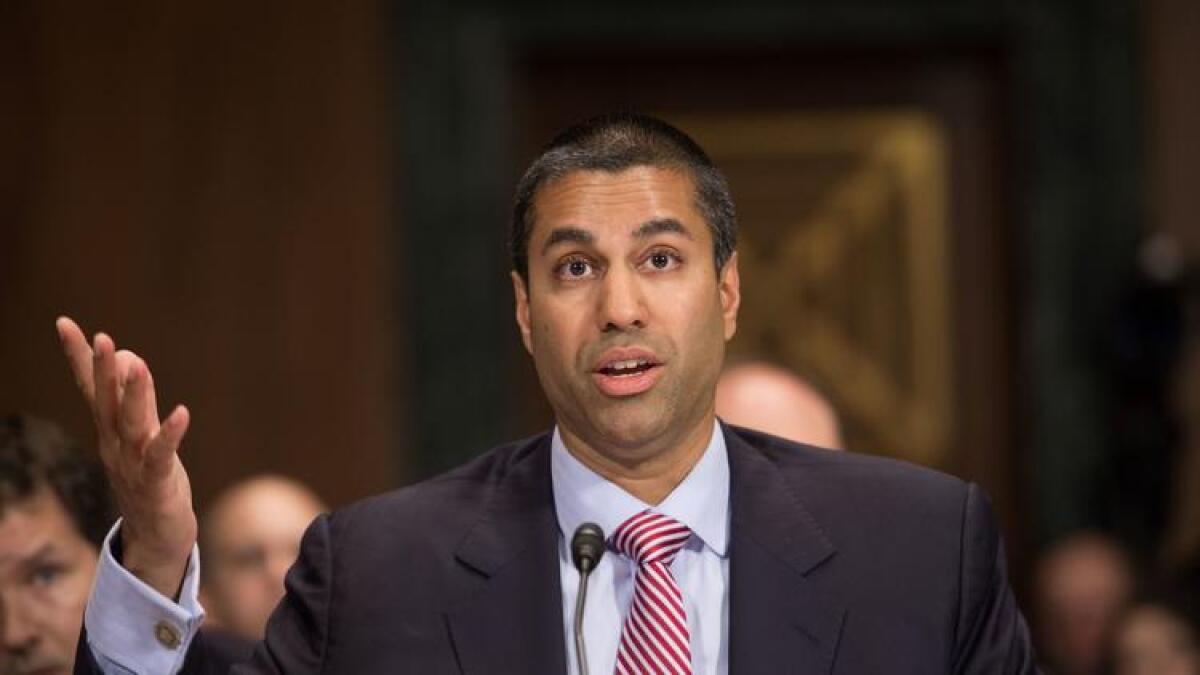
The nation’s new top telecommunications regulator wants to halt tough Internet privacy rules before they begin taking effect this week, arguing they would unfairly impose tougher requirements on broadband providers than on websites and social networks.
Privacy advocates and a key Senate Democrat vowed Monday to fight the move as well as a separate effort in Congress to overturn the regulations, which were approved in October on a party-line vote by the Federal Communications Commission when it was controlled by Democrats under President Obama.
Following President Trump’s inauguration, control of the commission passed to Republicans and Ajit Pai took over as chairman.
“All actors in the online space should be subject to the same rules, and the federal government shouldn’t favor one set of companies over another,” a spokesman for Pai said Friday.
Trump says Hollywood’s obsession with him led to best picture Oscar gaffe

President Trump is often loath to accept responsibility when things go wrong, but in the case of Sunday’s Oscars broadcast, he made an exception.
As he explained it Monday, it was Hollywood’s obsession with attacking him that contributed to the botched best picture announcement, calling the embarrassing episode “sad,” of course.
Accounting firm PricewaterhouseCoopers has apologized for the mix-up that led Warren Beatty and Faye Dunaway to announce “La La Land” as the winner of the top Academy Award prize, instead of “Moonlight.”
But in Trump’s eyes, the blame falls more broadly on an entertainment industry so preoccupied with politics that they “didn’t get the act together,” he told Breitbart News.
“It took away from the glamour of the Oscars,” Trump told a reporter from the website, which was once led by his chief White House strategist, Stephen K. Bannon.
“It didn’t feel like a very glamorous evening. I’ve been to the Oscars. There was something very special missing, and then to end that way was sad,” he added.
The ceremony did contain a number of slights at Trump during its telecast, some more subtle than others. Host Jimmy Kimmel openly at one point begged the president to weigh in by tweeting at him.
Trump spent part of Sunday night hosting a black-tie dinner at the White House honoring the nation’s governors, who were visiting Washington for their annual winter meeting. But it appears from excerpts of the Breitbart interview that he may have spent at least part of the evening watching.
Justice Department shifts course in closely watched Texas voter ID case
The Trump administration has scaled back its assault on a strict Texas voter identification law that federal courts have ruled discriminated against minorities, portending a shift in how the Justice Department plans to pursue allegations of voter suppression.
The government revealed its decision in court papers filed in federal court Monday, dealing a blow to civil rights advocates who have relied on federal support to help them knock down the controversial Texas statute.
“It’s a very concerning signal to American voters about the Department of Justice’s commitment to enforcing the Voting Rights Act,” said Danielle Lang, deputy director of the voting rights unit of the Campaign Legal Center, which is suing Texas in the case.
The administration’s partial retreat in the dispute highlights how Atty. Gen. Jeff Sessions, a conservative Republican who has championed voter identification measures, is expected to handle such cases. The Obama administration had joined civil rights groups in aggressively challenging the Texas law and other such measures around the country.
At issue in the case was how the Justice Department would proceed in a federal lawsuit that alleged the Texas legislature discriminated against minority voters when it enacted the strict voter identification law in 2011.
Known as SB 14, the measure requires voters to present a specific form of government-issued photo identification - such as a driver’s license, military ID card, U.S. passport or citizenship certificate - to be permitted to cast a ballot.
The Obama administration and civil rights groups argued the state pushed the law, in part, to suppress the power of the state’s minority voters, who frequently don’t drive or have a passport.
State officials and lawmakers countered that the law was aimed at preventing voter fraud, though there is scant evidence that the problem exists.
The law was challenged in court by civil rights groups and the Justice Department under provisions of the 1965 Voting Rights Act, which was intended to help overcome legal barriers erected at the local and state level to keep African-Americans from the polls.
Last July, a federal appeals court ruled that the Texas law had a discriminatory impact on minority voters. It told U.S. District Judge Nelva Gonzales Ramos to craft a temporary remedy in time for the November elections.
Ramos subsequently ordered Texas to permit voters to present other forms of documentation to verify their identities. The judge’s order is expected to remain in force until she imposes a permanent remedy or Texas addresses the judges’ concerns.
According to the court papers filed Monday, the Justice Department will continue to work with civil rights groups to address those issues but will seek to withdraw from another important aspect of the suit.
In the same decision that found the Texas law had a discriminatory impact, the appeals court reversed Ramos’ finding that Texas legislators had intended to harm minority voters.
It ordered Ramos to reconsider the evidence of that finding.
If the judge determines discriminatory intent in crafting the voter ID requirements, she could throw out the entire law. Civil rights groups will continue to press that claim.
In its court filing, the Justice Department asked Ramos to permit it to withdraw its claim that Texas acted with intent, arguing that it is best to give the Texas legislature time to address the matter.
With the loss of their key ally in court, civil rights groups will argue on their own in an effort to prove that Texas acted with a discriminatory purpose in passing the law. A hearing is scheduled for Tuesday.
Voting advocates complained that the Trump administration was backing away from a key safeguard of voting rights.
The Justice Department decision “defies rationality and stands diametrically opposed to positions they have taken at every stage of this litigation,” Kristen Clarke, president of the Lawyers’ Committee for Civil Rights Under Law, said in a statement. “This reversal of position was taken despite years of work and effort that the government has invested in fighting the Texas Voter ID law, one of the most discriminatory voting restriction of its kind.”
House Intelligence Chair Devin Nunes warns against ‘witch hunt’ over Trump-Russia ties
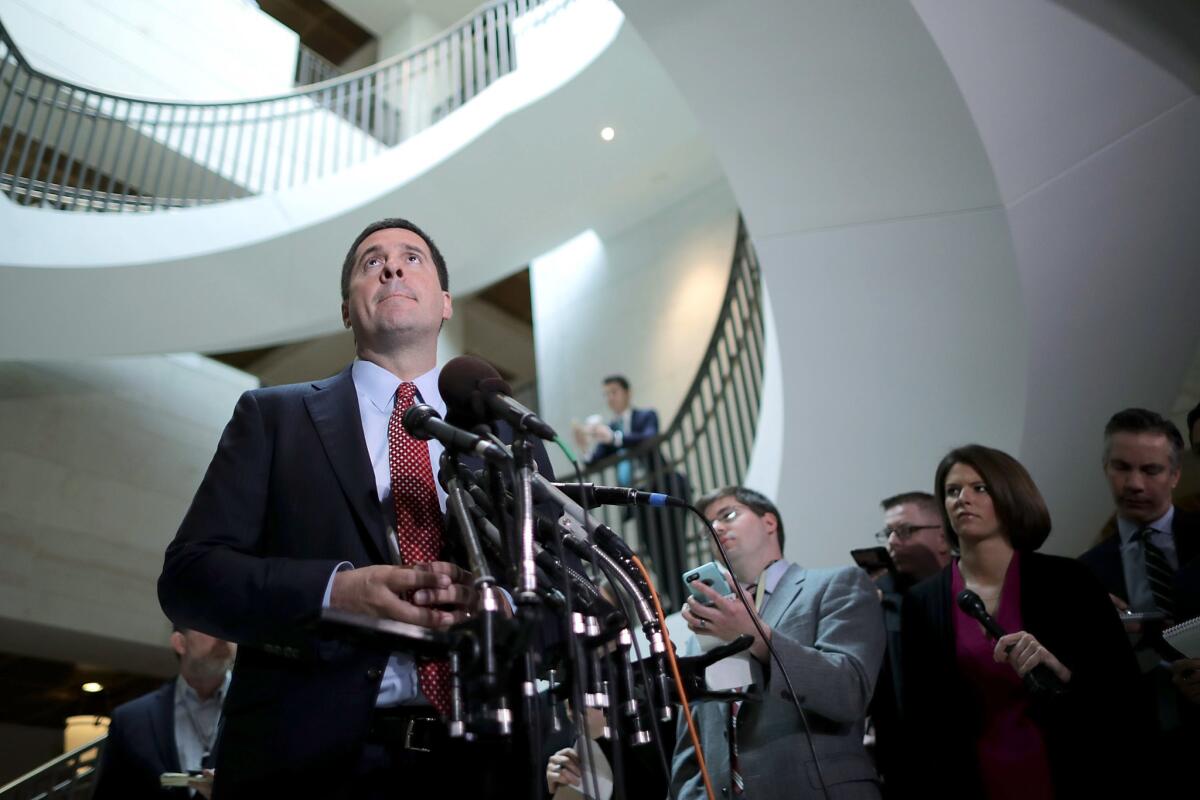
House Intelligence Committee Chairman Rep. Devin Nunes said on Monday he has seen no evidence from the intelligence community that there was contact between Russia and the Trump campaign.
“I want to be very careful, we can’t just go on a witch hunt against Americans because they appear in a news story,” said Nunes (R-Tulare). “We still don’t have any evidence of them talking to Russia.”
He said the committee has been briefed on the “highlights” of what the intelligence community has found, but is still collecting evidence.
The committee’s ranking Democrat, Adam B. Schiff (D-Burbank), quickly responded, saying the committee’s investigation is in its “infancy” and it’s too soon to reach conclusions about the evidence.
“We haven’t obtained any of the evidence yet, so it’s premature for us to be saying we’ve reached any conclusion about the issue of collusion,” Schiff said. “The most that we’ve had are private conversations, the chair and I with intelligence officials. That’s not a substitute for an investigation.”
The House and Senate Select Intelligence Committees are conducting separate investigations into Russia’s reported attempts to influence voters in 2016 in an effort to curtail Hillary Clinton’s chances and boost Donald Trump’s. A leaked U.S. intelligence report on the attempts did not look at whether the effort succeeded.
The House committee has expanded a previous ongoing investigation of Russia cyberhacking to include a look at efforts to interfere in the 2016 election, Nunes told reporters Monday. Though it is still in its early stages — the leaders of the committee are still discussing the investigation’s scope — Nunes said he expects the findings to be made public.
Schiff and Nunes spoke separately to reporters Monday. Schiff said the two agreed privately that they would jointly address reporters about the investigation going forward.
Nunes, who served as a member of Trump’s transition team, said he continues to be concerned about leaks of classified and sensitive information from the White House and intelligence communities. The leaks — one of which resulted in a report about the FBI investigating Trump campaign officials — will be part of the committee’s investigation.
“A government can’t function with massive leaks at the highest level,” Nunes said.
Appeals court denies Justice Department request to put appeal of travel ban on hold
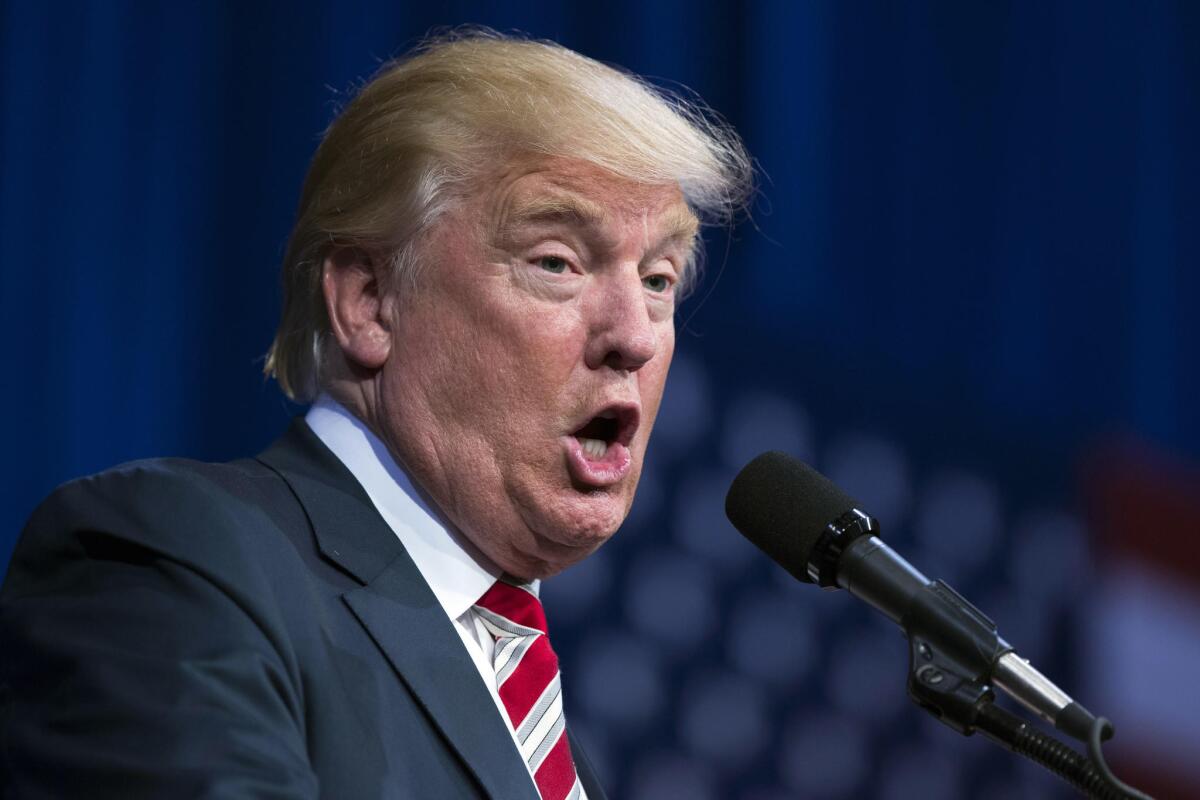
The 9th U.S. Circuit Court of Appeals has denied the
Justice Department’s request to pause proceedings in an appeal of President Trump’s travel ban.
The court in a filing Monday said its schedule for the government’s appeal of a lower court’s halt on the travel ban will proceed, with the first brief due to the appeals court on March 10.
In early February, the Justice Department appealed a Seattle-based federal district judge’s order blocking enforcement of Trump’s executive action. which established a series of immigration and refugee restrictions aimed at preventing potential terrorists from entering the country.
Last week, government lawyers asked the appeals court to stop proceedings in the case because the president planned to issue a new executive order and rescind the original one.
A three-judge panel of the court previously denied a request from the government to reverse a nationwide stay on the travel ban. The same panel on Monday ruled that the appeal will proceed.
Trump has said he will sign a new executive order “tailored” to deal with court decisions that have largely gone against him. On Monday, White House Press Secretary Sean Spicer said he expected the order to be issued mid-week.
Spicer has said Trump wants to fight for the current order while also issuing a new one, but the Justice Department has said in multiple court filings that the the current order will be undone after a new one is issued.
The states of Washington and Minnesota, which brought the case in Seattle now under review, have pushed for courts to move forward on a review of the constitutional issues.
‘No random ICE stops on streets of America,’ Homeland Security chief tells governor
President Trump received some unsolicited advice at dinner with the nation’s governors when Virginia Gov. Terry McAuliffe told him he needs to do a better job explaining his policies regarding deportations.
McAuliffe, a Democrat and chairman of the National Governor’s Assn., told the president that there has been a “chilling effect going on” as businesses stay away from his state and as immigrants fear being rounded up.
“If they’re not going to be deported, we need to hear that from the president,” McAuliffe said, recounting his conversation from the governors’ Sunday night dinner with Trump.
“What I told the president is these actions are hurting us.”
McAuliffe, a longtime ally of Hillary Clinton, said Trump agreed in large part.
McAuliffe also met privately with Homeland Security Secretary John F. Kelly, and said the secretary assured him during an hourlong talk that Trump’s enforcement actions were only targeting criminals -- despite widespread reports of otherwise law-abiding immigrants being detained for being in the U.S. illegally.
“He assured me there will be no random ICE stops on the streets of the United States of America,” McAuliffe said, referring to the raids being conducted by Immigration and Customs Enforcement officers.
If that’s the case, McAuliffe said, Trump’s policy does not sound much different than the operations under former President Obama, whose administration deported more immigrants than its predecessors.
Obama, however, explicitly put a priority on deportations of criminals, a distinction the Trump administration has done away with as part of the president’s executive action.
“My advice to him was he needs to let the American public know what they’re doing,” McAuliffe said.
Trump: ‘I haven’t called Russia in 10 years’
President Trump rejected calls for an independent investigation of his ties to Russia, telling a group of business leaders Monday that he hasn’t called Russia in a decade.
At the start of a White House meeting with healthcare executives, a reporter asked Trump whether a special prosecutor should be assigned to investigate allegations of Russian meddling during the election.
In response, Trump mouthed the word “no” to the executives. As reporters were led out of the room, Trump said: “I haven’t called Russia in 10 years.”
Democratic lawmakers have ramped up their calls for additional investigations into allegations that Trump allies had been in contact with Russian officials during the election and inappropriately discussed U.S. sanctions against the Moscow regime during the transition.
White House officials have denied reports that Trump associates were frequently in touch with senior Russian intelligence officials during the election.
U.S. intelligence agencies concluded last year that Russian leader Vladimir Putin had authorized an operation to damage Hillary Clinton’s campaign and tilt the 2016 election in Trump’s favor.
Trump: ‘Nobody knew that healthcare could be so complicated’
President Trump promised the nation’s governors Monday that his yet-to-be-revealed replacement plan for the Affordable Care Act would give states greater flexibility and thanked some Republicans in the room who advised him on healthcare.
“It’s an unbelievably complex subject,” he said. “Nobody knew that healthcare could be so complicated.”
The remark likely surprised state leaders; spending on Medicaid alone was the second-biggest driver of increased state general fund spending, according to the 2016 Fiscal Survey of States conducted by the National Assn. of State Budget Officers.
And it was just eight years ago that Washington dove head-first into a raging debate over healthcare reform under President Obama, which simmered long after his signature health law was enacted.
But the finer points of healthcare policy are likely new to Trump, who is immersed in discussions with Republican leaders and his senior staff on that and other subjects ahead of his high-profile address Tuesday to a joint session of Congress.
Trump offered no hint as to the details. Republicans have vowed to repeal and replace Obamacare, but their effort has stalled as they debate how to do so and await word from the White House on what Trump wants to do.
The president seemed keenly aware of the political ramifications of whatever steps he takes.
“As soon as we touch it, if we do the most minute thing, just a tiny little change, what’s going to happen? They’re going to say it’s the Republicans’ problem,” Trump said after telling the governors the easiest thing for him to do would be nothing, and, in his view, watch Obamacare collapse.
“But we have to do what’s right because Obamacare is a failed disaster.”
Trump wants to add $54 billion to defense budget while slashing domestic spending and foreign aid
President Trump is proposing a massive increase in defense spending of $54 billion while cutting domestic spending and foreign aid by the same amount, the White House said Monday.
Trump’s spending blueprint previewed a major address that he will give Tuesday night to a joint session of Congress, laying out his vision for what he called a “public safety and national security budget” with a nearly 10% increase in defense spending.
“We never win a war. We never win. And we don’t fight to win. We don’t fight to win,” Trump said Monday in remarks to the nation’s governors. “So we either got to win or don’t fight it at all.”
Trump noted that the U.S. has spent nearly $6 trillion on fighting wars since the Sept. 11 attacks but said that cutting military spending was not the answer.
Instead, the increase he is proposing would be offset by cuts to unspecified domestic programs and to foreign aid, which would in turn be made up for in part by demanding that other countries pay more for security alliances that have historically been underwritten by the U.S.
“This budget expects the rest of the world to step up in some of the programs that this country has been so generous in funding in the past,” an official from the Office of Management and Budget said, demanding anonymity to discuss the president’s spending plans.
Foreign aid makes up about 1% of the budget.
“This budget speaks for itself,” the official said. “I don’t think this budget has anything to do other than putting Americans first.”
Trump’s call for deep cuts to spending at home is likely to set up major battles on Capitol Hill, where Democrats and even House Republicans will likely be reluctant to pass a spending bill that includes such major reductions in programs for their constituents.
Trump says businesses can’t borrow because of Dodd-Frank. The numbers tell another story
President Trump was preparing the first step in a key campaign promise — dismantling the 2010 Dodd–Frank Wall Street Reform and Consumer Protection Act — when he repeated a frequent criticism of the law.
“We expect to be cutting a lot out of Dodd-Frank because, frankly, I have so many people, friends of mine that had nice businesses, they can’t borrow money,” Trump told leading corporate chief executives, including Jamie Dimon of JPMorgan Chase & Co. and Larry Fink of money management giant BlackRock Inc., meeting at the White House earlier this month
“They just can’t get any money because the banks just won’t let them borrow it because of the rules and regulations in Dodd-Frank,” Trump said.
Shortly afterward, he ordered a wholesale review of the landmark act, which was passed in the wake of the 2008 financial crisis.
But a main reason for dismantling Dodd-Frank often cited by Trump and critics of the law — that its slew of tougher financial regulations have significantly restricted bank lending — isn’t borne out by the data.
Another Trump nominee withdraws nomination to top national security post due to business interests
Philip M. Bilden, President Trump’s pick for Navy secretary, withdrew from consideration late Sunday, becoming the second White House nominee to bail on a top Pentagon position due to problems untangling his financial investments.
“After an extensive review process, I have determined that I will not be able to satisfy the Office of Government Ethics requirements without undue disruption and materially adverse divestment of my family’s private financial interests,” Bilden said in a statement.
He did not detail the issues but he said he “fully” supported “the president’s agenda … to modernize and rebuild our Navy and Marine Corps.”
Bilden’s withdrawal comes after billionaire investor Vincent Viola dropped out from becoming Army secretary after he decided his extensive financial holdings would hamper his ability to win Senate confirmation.
The White House shot down reports that surfaced two weeks ago that Bilden was considering stepping down.
“Just spoke with him and he is 100% commited [sic] to being the next SECNAV pending Senate confirm,” White House spokesman Sean Spicer tweeted on Feb. 18.
Bilden, a venture capitalist and Army veteran, was a surprise selection from Trump but had the backing of Defense Secretary James N. Mattis.
“This was a personal decision driven by privacy concerns and significant challenges he faced in separating himself from his business interests,” Mattis said in a statement. “While I am disappointed, I understand and his respect his decision, and know that he will continue to support our nation in other ways.”
Bilden served ten years in the U.S. Army Reserve as a military intelligence officer from 1986 to 1996. He then co-founded private equity firm HarbourVest Partners LLC and spent 25 years there, mainly in the company’s Hong Kong headquarters.
He also serves on the board of directors of the United States Naval Academy Foundation and the board of trustees of the Naval War College Foundation.
Mattis said he intends on recommending a replacement nominee to Trump “in the coming days.”
The withdrawal marks another setback for Trump’s national security team, which has struggled to find its footing since the fledgling administration began.
Earlier this month, National Security Advisor Michael Flynn was forced to resign after it became public that he held secret talks with a Russian ambassador and then misled Vice President Mike Pence about it.
Army Lt. Gen. H.R. McMaster took the job last week after Trump’s first choice to replace Flynn, retired Navy Vice Adm. Robert Harward, passed on the opportunity.
New DNC chairman Tom Perez ridicules Trump tweet over ‘rigged’ vote
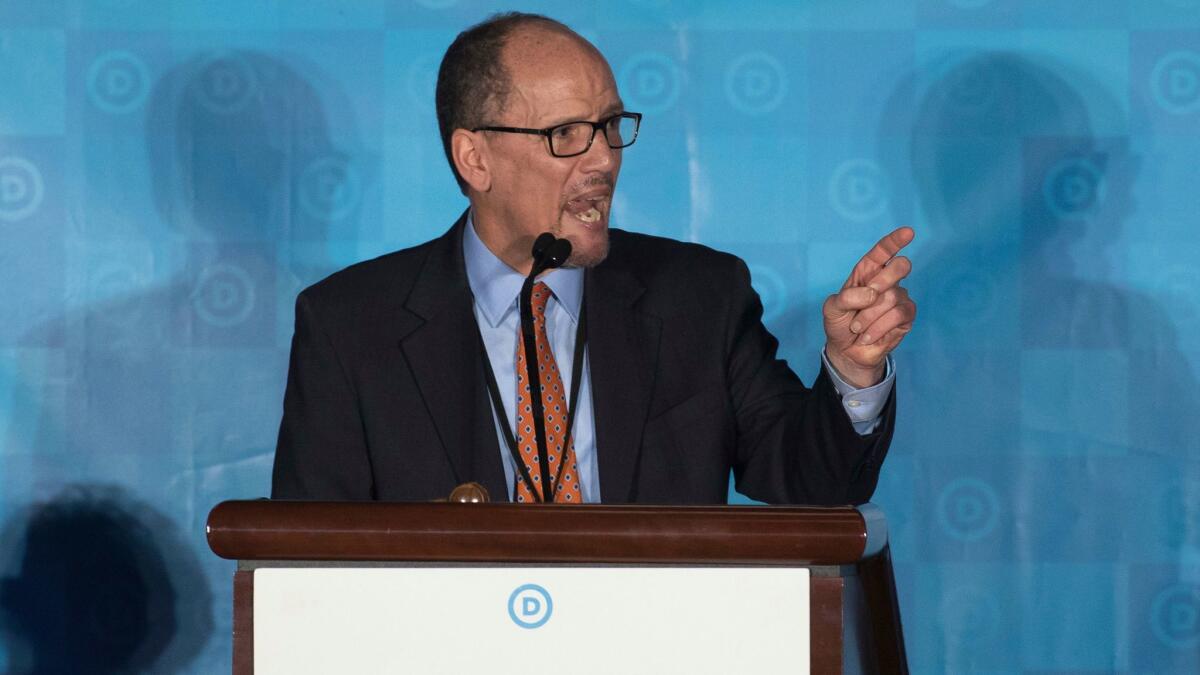
President Trump claimed Sunday that the race for Democratic National Committee chairman had been “rigged” -- drawing a quick riposte from Tom Perez, who narrowly won the party’s leadership race.
Trump insinuated that Perez’s DNC victory on the second ballot at a party conference in Atlanta on Saturday was because Hillary Clinton had backed Perez, a former Labor secretary in the Obama administration who was seen as representing the party’s establishment forces.
Clinton did not make a formal endorsement, but Perez’s rival, Rep. Keith Ellison of Minnesota, was backed by Sen. Bernie Sanders (I-Vt.) and the party’s more liberal wing.
“Bernie’s guy, like Bernie himself, never had a chance,” Trump tweeted early Sunday morning. “Clinton demanded Perez!”
Perez, appearing on CNN’s “State of the Union” on Sunday, told host Jake Tapper that he and Ellison “got a good kick out of that,” adding: “Donald Trump, up in the morning tweeting about us.”
Sanders, appearing on the same show, said Trump “doesn’t have a point” about the DNC vote.
Moments after Perez beat Ellison by 35 votes out of 435 cast, he named Ellison as the deputy chairman of the party, leading to widespread applause.
Perez is the first Latino to lead the Democratic Party, and he faces the challenge of trying to rebuild a party that suffered devastating losses in the 2016 election. Republicans now control not only the White House and Congress, but 33 governorships and dozens of state legislatures.
In his CNN interview, Perez sarcastically suggested that Trump should address questions about Russian interference in the 2016 presidential campaign rather than concerning himself with the DNC leadership battle.
“Frankly, what we need to be looking at is whether this election was rigged by Donald Trump and his buddy Vladimir Putin,” he said.
White House again bats away call for special prosecutor on Russia
A White House spokeswoman said Sunday that it was too soon to say whether a special prosecutor should look into Russian interference in the 2016 presidential campaign, while President Trump again inveighed against coverage of Russia-related queries as “FAKE NEWS.”
Calls have grown louder from Democrats in Congress for U.S. Atty. Gen. Jeff Sessions to recuse himself from the issue because of his role as a prominent Trump supporter during the campaign, and to appoint an independent special prosecutor to carry out a Russia probe.
A few Republicans have joined in that chorus – some reluctantly. Rep. Darrell Issa of Vista, appearing on HBO’s “Real Time with Bill Maher,” voiced support Friday for naming of a special prosecutor to probe the Russian connection, though he also said congressional intelligence committees should continue their work.
He also said he considered Sessions a friend, but pointed to his role as a political appointee who had worked on the Trump campaign.
Issa, who narrowly won reelection, was a vociferous critic of the Obama administration during his former tenure as head of the House Oversight Committee. In that post, he spearheaded an array of investigations on topics from Benghazi to bank bailouts.
Some Republicans pushed back against the notion of Sessions needing to recuse himself. Sen. Tom Cotton, R-Ark., said on NBC’s “Meet the Press” that he had seen no “credible” information about contacts between the Trump campaign and Russians – and no allegations that rose to the level of criminal activity.
“If we get down that road, that’s a decision that Attorney General Sessions can make at the time,” said Cotton, who is a member of the Senate Intelligence Committee.
U.S. intelligence agencies have concluded that Russian intelligence agencies hacked Democratic Party computers and used other tactics last year to interfere with the election. The FBI is separately investigating whether anyone on Trump’s campaign had improper contacts with Russian authorities during the campaign.
On Sunday, White House Deputy Press Secretary Sarah Huckabee Sanders said congressional investigations on Russia and the campaign should be allowed to go forward before a special prosecutor appointment was considered.
“I don’t think we’re there yet,” Sanders said on ABC’s “This Week.” “Let’s work through this process.”
Echoing the previously stated White House stance, Sanders said the Trump campaign had not colluded in any Russian meddling.
“We had no involvement in this,” she said.
The president is known to keep a close eye on surrogates’ performances on the talk shows, and Sanders repeated a prime administration talking point: that questions about possible Trump campaign contacts with Russia amounted to Democratic excuses for losing the election.
“If Democrats want to continue to relive their loss every single day, by doing an investigation or review after review, that’s fine by us,” she said. “We know why we won this race. It’s because we had the better candidate with the better message.”
Trump himself underscored that notion with an afternoon tweet denouncing media coverage of the ongoing Russia investigations as “FAKE NEWS put out by the Dems, and played up by the media, in order to mask the big election defeat and the illegal leaks!”
Whose news is fake? Here’s the latest in Trump’s war with the press
Every president since 1981 has attended the annual White House Correspondents’ Assn. dinner.
That year, President Reagan missed out. The reason? He needed to recover after a would-be assassin fired a bullet into his chest a few weeks earlier.
On Saturday, President Trump announced he will not be attending the annual dinner in April, long considered the premier social event of the Washington press corps and typically an evening of good-natured bantering between presidents and the Fourth Estate.
Trump’s announcement added to the ratcheting tensions between his administration and the media. Almost daily, in speeches or on Twitter, he calls particular news outlets fake, disgusting or dishonest — and news organizations have responded by digging in, standing united and devoting more resources to covering a president who has branded the press the enemy.
Crucial group of Americans like Trump’s stands, not him, poll finds
With the public deeply split in its views of President Trump, one potentially key group stands out -- those who dislike the man, but approve of the direction in which he’s moving.
That’s a central finding of a new nationwide survey by NBC News and the Wall St. Journal.
The new poll confirms what other major surveys have shown: Trump starts his administration with less support than any president in the seven decades of presidential polling. Asked if they approve or disapprove of the job Trump is doing, 44% approve, 48% disapprove. No previous president has begun his tenure with a net negative job approval.
Trump has held onto the support of his ardent backers. At the other end of the spectrum, he gets almost no approval from Democrats. In the middle, the poll found, are many Americans -- just over a third of those polled -- who either voted for Trump with reservations, voted for a third party candidate or did not vote at all in 2016.
Just over half of that group gives Trump positive marks, the poll found. Their support is enough, currently, to keep Trump’s standing from collapsing, and holding them is likely key to his future.
Just under one third of Americans say they like Trump and approve of his policies, the poll found. Another one in six approve of most of his policies even though they dislike him. Well over half, 59%, said they did not like him personally.
On a separate question, only 43% of those surveyed have a positive view of Trump -- up from the low points of the campaign, but still far below the standing of most new presidents.
By contrast, 86% agreed with one of the central lines of Trump’s inaugural speech, that government insiders had “reaped the rewards of government, while the people have borne the cost.”
On other issues, the public is more closely divided. The public splits evenly, for example, on Trump’s proposed temporary ban on travel from seven mostly Muslim countries.
Just over half of those surveyed, 52%, said that the problems Trump has encountered in his first month were “unique to this administration and suggest real problems”; 43% said they were “growing pains” similar to those other administrations have had.
And by 51%-41%, the public thinks the press has been too hard on the new administration.
The NBC/WSJ poll, run by a bipartisan team of two polling firms, was taken by phone, using cell phones and landlines, Feb. 18-22 among 1,000 American adults. It has a margin of error for the full sample of 3.1 percentage points in either direction.
Trump appears to think Perez at head of Democratic National Committee is good news for Republicans
The Democratic Party put its faith in its old guard Saturday to guide it out of the political wilderness, choosing as its new leader an Obama-era Cabinet secretary over the charismatic congressman backed by the progressive wing of the party.
Tom Perez, a former secretary of Labor with strong ties to unions, persuaded the spirited assembly of party delegates in Atlanta that he can best help harness a grass-roots outpouring of anti-Trump protest and anger into a Democratic resurgence at the ballot box.
Trump to Washington reporters: Not going to your dinner
The annual White House Correspondents’ Assn. dinner will be missing a key guest this year: President Trump.
On Saturday, Trump tweeted he will not attend the April 29 dinner, considered the premier social event of the Washington press corps -- and typically an evening of good-natured bantering between presidents and reporters with a mix of celebrities watching.
His announcement comes amid growing tensions between his administration and the media. Trump has decried stories he doesn’t like as “fake news,” and described unnamed news groups as an “enemy of the people.”
A day earlier, the White House barred reporters from several major news organizations, including the Los Angeles Times, the New York Times, CNN and Politico, from attending an off-camera press briefing.
In a sign of the growing rift, several media organizations that traditionally sponsor lavish parties around the black-tie dinner had announced they would not do so this year.
At the annual dinner, the president usually delivers self-deprecating jokes and often is roasted by a high-profile comedian. The president also greets students who win journalism scholarships and awards, a major part of the evening.
Trump has been a frequent guest of media organizations at the dinner in the past, but he always sat at a table in the crowded ballroom, not up at the front dias.
President Obama singled Trump out during the dinner several years ago, mocking Trump for raising doubts about whether Obama was born in the United States.
“This year, as we do every year, we will celebrate the First Amendment and the role an independent press plays in a healthy republic,” the White House Correspondents’ Assn. said in a statement earlier this month about the upcoming dinner.
Former Labor Secretary Tom Perez named Democratic Party leader
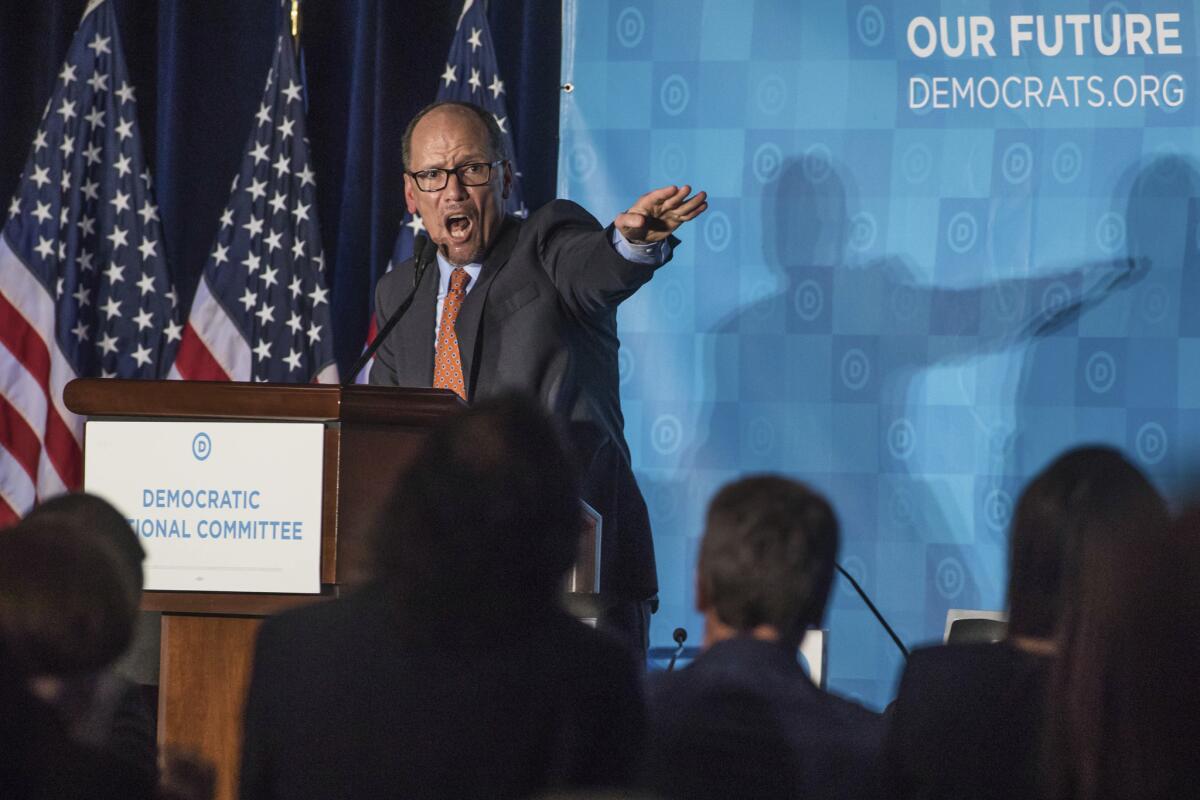
The Democratic Party put its faith in its old guard Saturday to guide it out of the political wilderness, choosing as its new leader an Obama-era Cabinet secretary over the charismatic congressman backed by the progressive wing of the party.
Tom Perez, a former secretary of Labor with strong ties to labor unions, persuaded the spirited assembly of party delegates in Atlanta that he can best help harness a grass-roots outpouring of anti-Trump protest and anger into a Democratic resurgence at the ballot box.
“We are suffering from a crisis of confidence, a crisis of relevance,” Perez told delegates before they chose him in a down-to-the-wire contest with Rep. Keith Ellison of Minnesota, whom the Bernie Sanders wing of the party had rallied round.
“We need a chair who can not only take the fight to Donald Trump. … We also need a chair who can lead a turnaround and change the culture of the Democratic Party,” Perez said.
The ascendance of an establishment liberal is certain to renew tension between veteran party stalwarts and the unruly progressive movement aligned with Sanders and Sen. Elizabeth Warren of Massachusetts, both of whom backed Ellison.
Some Ellison supporters erupted in protest as the final vote was announced.
Perez quickly sought to unite the party by naming Ellison his deputy chair, a move unanimously approved by the 435 assembled delegates, who had supported Perez 235-200.
Trump chastises media for not reporting minor dip in national debt
President Trump took to Twitter on Saturday morning to blast the news media for not highlighting a minor dip in the national debt.
“The media has not reported that the National Debt in my first month went down by $12 billion vs a $200 billion increase in Obama first mo.,” he tweeted at 8:19 a.m.
Trump’s tweet came shortly after Herman Cain, who ran unsuccessfully for the Republican presidential nomination in 2012, made a similar comment on Fox News.
While the numbers are accurate, Trump’s tweet suggests he deserves credit for something that is largely beyond his control, especially since he hasn’t yet given Congress any proposals to change tax laws or the financial industry.
“Considering that Trump hasn’t enacted any fiscal legislation, it’s a bit of a stretch for him to take credit for any changes in debt levels,” Dan Mitchell, a libertarian economist at the Cato Institute, told the fact-checking website Politifact.
President Obama’s first month in office in 2009 was largely taken up with spending bills aimed at easing the massive recession that he had inherited.
Trump inherited an economy with low inflation, low unemployment and a booming stock market.
The national debt, which stands at just under $20 trillion, is expected to rise by more than $500 billion in the fiscal year ending in September.
Mexico rejects U.S. plan to deport Central Americans to Mexico
Mexico has informed the Trump administration that it cannot accept non-Mexican nationals whom U.S. authorities arrest along the border and seek to remove from U.S. territory, the nation’s internal security chief said Friday.
Earlier this week, the Trump administration rolled out a broad immigration crackdown that included a proposal to send non-Mexican detainees apprehended along the U.S.-Mexico border back to Mexico while their immigration cases were pending in the United States.
The vast majority of non-Mexican nationals detained along the U.S.-Mexico border are Central Americans. They often travel overland through Mexico to reach the United States.
In a fact sheet released Tuesday, the Department of Homeland Security said that releasing detained, third-country nationals “to the foreign contiguous territory from which they arrived” would save on detention and adjudication resources. The idea would be to keep them out “pending their hearings” on deportation, the fact sheet said.
However, Mexican authorities have reacted coolly from the outset to the notion. Now, they appear to have formally nixed the idea.
On Friday, Mexico’s interior secretary, Miguel Angel Osorio Chong, told a radio interviewer than Mexican authorities had informed a pair of visiting U.S. Cabinet officers — Secretary of State Rex Tillerson and Homeland Security Secretary John F. Kelly — that Mexico could not oblige the U.S. request.
“We told them that our legal framework doesn’t allow this,” Osorio Chong told Radio Formula, referring to the visit this week of the two Trump Cabinet officials. “ We told them it is impossible. There is no way, legally, nor is there capacity.”
In recent years, non-Mexicans, mostly Central Americans, have become a larger proportion of illegal immigrants apprehended along the Southwest border as the relative number of Mexican nationals has declined.
In fiscal year 2016, according to U.S. Border Patrol statistics, agents recorded apprehensions of almost 191,000 undocumented Mexican citizens along the Southwest frontier. In the same fiscal year, the Border Patrol said it registered 218,000 detentions of non-Mexican nationals, most of them Central Americans.
Cecilia Sanchez of The Times’ Mexico City bureau contributed to this report.
An earlier version of this blog post misspelled Miguel Angel Osorio Chong’s name as Osorio Chung.
Trump blasts FBI over Russia leaks after a brief Twitter hiatus
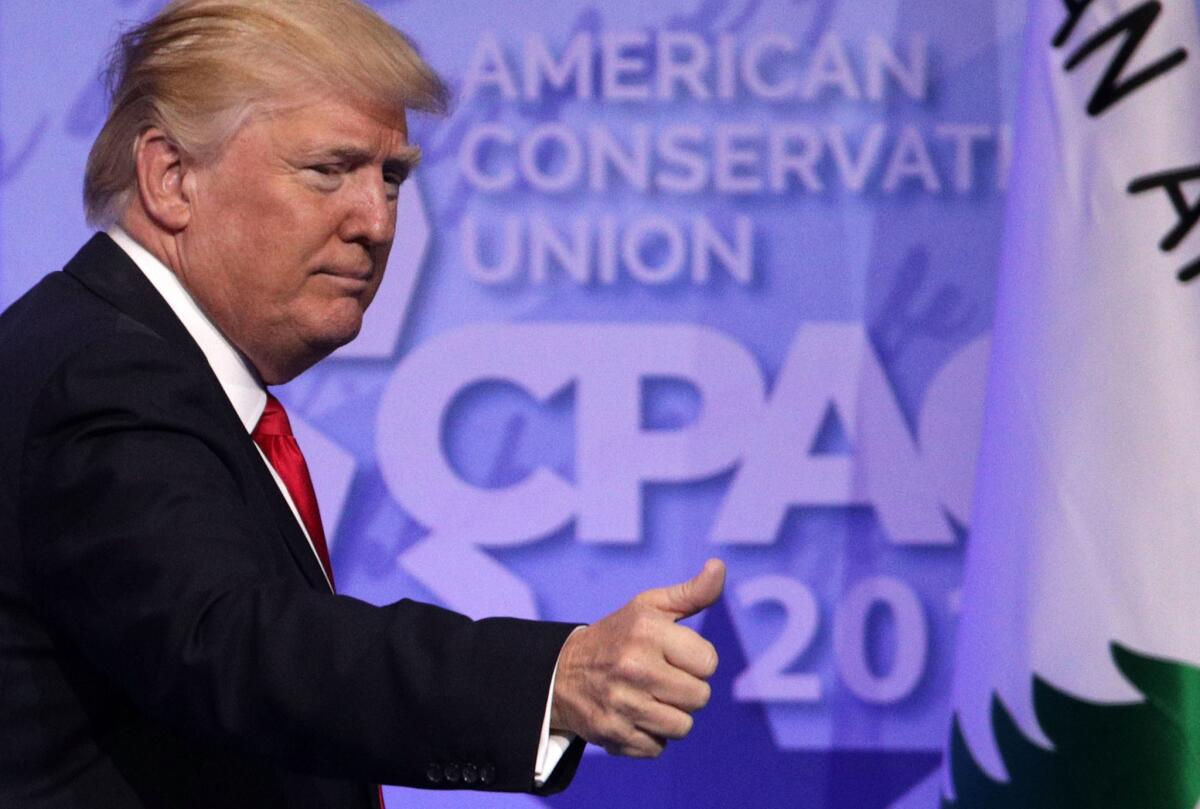
After several days of relative silence on Twitter, President Trump’s feed came alive Friday with a direct attack on the FBI.
Yes, he’s done this before. But recent news reports that suggest his administration pressed the FBI to quell claims that members of his campaign had contact with Russians throughout the 2016 election appear to have inspired a response.
“The FBI is totally unable to stop the national security ‘leakers’ that have permeated our government for a long time,” he tweeted.
And conservative news was all over it.
Here are some of today’s headlines:
Trump blasts FBI ‘leakers’ (Fox News)
Trump has assailed everyone from Democrats to intelligence officials for the leaks — which he often refers to as “fake news” — about his ties to Russia.
Reports from several news outlets this week, citing anonymous sources, claim Trump’s chief of staff, Reince Priebus, asked FBI Deputy Director Andrew McCabe to publicly dispute media reports that Trump’s campaign advisors frequently were in touch with Russian intelligence agents during the election.
While some reports made it appear Priebus had contacted McCabe, this piece disputes that. “Fox News has learned that McCabe indeed had initiated the conversation, asking to speak with Priebus for a few minutes at the end of an intelligence meeting last week,” their article reports.
Ed Schultz at CPAC: Trump promised America’s heartland a deal (Daily Caller)
He was once among the top liberal voices in the country.
Now, Ed Schultz, the former MSNBC anchor, is speaking glowingly about President Trump.
Between covering high-profile speeches at the Conservative Political Action Conference from Trump and his aides, the Daily Caller popped into a panel at which Schultz provided commentary.
Shultz, who now works with the Russian government-funded RT television network, blasted the Trans-Pacific Partnership trade deal, asserting that Trump’s claim that it would cost U.S. jobs was a game changer in the 2016 election.
“Trump went into Pennsylvania, Ohio, Michigan and Wisconsin and he took down the progressive firewall, because he talked to the American people about a deal,” Schultz said. “It was a Wall Street deal, it was not a Main Street deal,” he said, referring to the TPP.
Trump is about blowing up Washington as it exists (Rush Limbaugh)
Remember when Trump talked about “draining the swamp?”
Since he entered the White House, some conservatives have wondered if Trump means business. Many members of his cabinet — including Priebus and Atty. Gen. Jeff Sessions — are the ultimate Washington insiders.
Still, Rush Limbaugh, one of the firebrand conservatives out there, is certain the president will blow up traditional Washington.
What’s Trump’s No. 1 obstacle?
“I have concluded that the media is the No. 1 obstacle because of the success they have,” he said on his radio show this week. “The people in Washington, media is every bit as big a part of the establishment as anybody else is.”
He added: “The media is creating this narrative, if you will, and this picture — this series of pictures, this overall image — that Trump is stalled, that everybody’s opposing him, that his agenda is backlogged.”
After Trump calls media an enemy of the people, White House bars many news outlets from briefing
Friday’s White House press briefing, normally an on-camera affair open to all reporters with press credentials, was turned into an exclusive event for certain outlets hand-picked by the administration.
The action came after President Trump on Friday described the media and what he terms “fake news” as “the enemy of the people.”On the list were Trump-friendly outlets such as Breitbart News, the Washington Times and OANN, a conservative television network that employs former Trump campaign manager Corey Lewandowski as a commentator.
Off the list were some of Trump’s favorite targets, including the New York Times and CNN. The Los Angeles Times was also excluded.
The off-camera briefing with Sean Spicer, the press secretary, was not solely for conservative outlets. Several mainstream reporters were also allowed in, including the three major broadcast networks and wire services, such as Bloomberg News. Also allowed in were pool representatives who transmit news events to a far larger group of reporters.
The Associated Press and Time magazine were also invited but declined to participate in solidarity with other news organizations that were denied entry.
The White House Correspondents’ Assn. protested, as did editors at several of the organizations that were excluded.
In a statement, Times editor Davan Maharaj said that it was “unfortunate that the Los Angeles Times has been excluded from a White House press briefing today.”
“The public has a right to know, and that means being informed by a variety of news sources, not just those filtered by the White House press office in hopes of getting friendly coverage,” Maharaj said.
“Regardless of access, The Times will continue to report on the Trump administration without fear or favor,” he added.
12:30 p.m.: This post was updated with a statement from Times editor Davan Maharaj.
‘It’s a Russian flag!’ Trickster strikes CPAC before Trump’s speech
As the crowd waited to hear President Trump speak at the Conservative Political Action Conference, little red-white-and-blue flags appeared without warning, handed down the aisles by a man with a green bag, according to a witness.
The flags said “Trump.” They also happened to be the flag of the Russian Federation.
“He was dressed like any one of us,” said Tyler Dever, 20, a student at the University of South Florida in Tampa, who was wearing a suit. “He passed them to me and was like, ‘Pass them down, pass them down.’ ”
Dever, caught up in the moment, passed them down, before someone sitting next to him said, “Oh, it’s a Russian flag!” CPAC staff quickly recollected the flags.
“If it was just a red-white-and-blue flag, I would have picked it out,” Dever said. He said it was his first time attending an event like CPAC and was surprised to see a provocateur in the audience, especially beyond the cordon set up by the Secret Service.
“Someone tried to victimize me,” Dever said. “You have Secret Service out here, and I’d expect it to be fully screened. ... Thank God someone noticed.”
Trump still loves the USC/L.A. Times poll: What it got right and what it got wrong
Throughout the fall campaign, then-candidate Donald Trump and his allies loved the USC/L.A. Times “Daybreak” poll -- the only major survey that consistently showed him winning.
“A couple polls got it right. I must say Los Angeles Times did a great job, shocking because, you know, they did a great job,” Trump declared in his speech this morning at CPAC, the annual gathering of conservative activists.
But did the poll get it right?
In the simplest terms, no, and after considerble analysis, we know why.
A celebration, and wake, for a campaign legend and a Republican Party that is no more
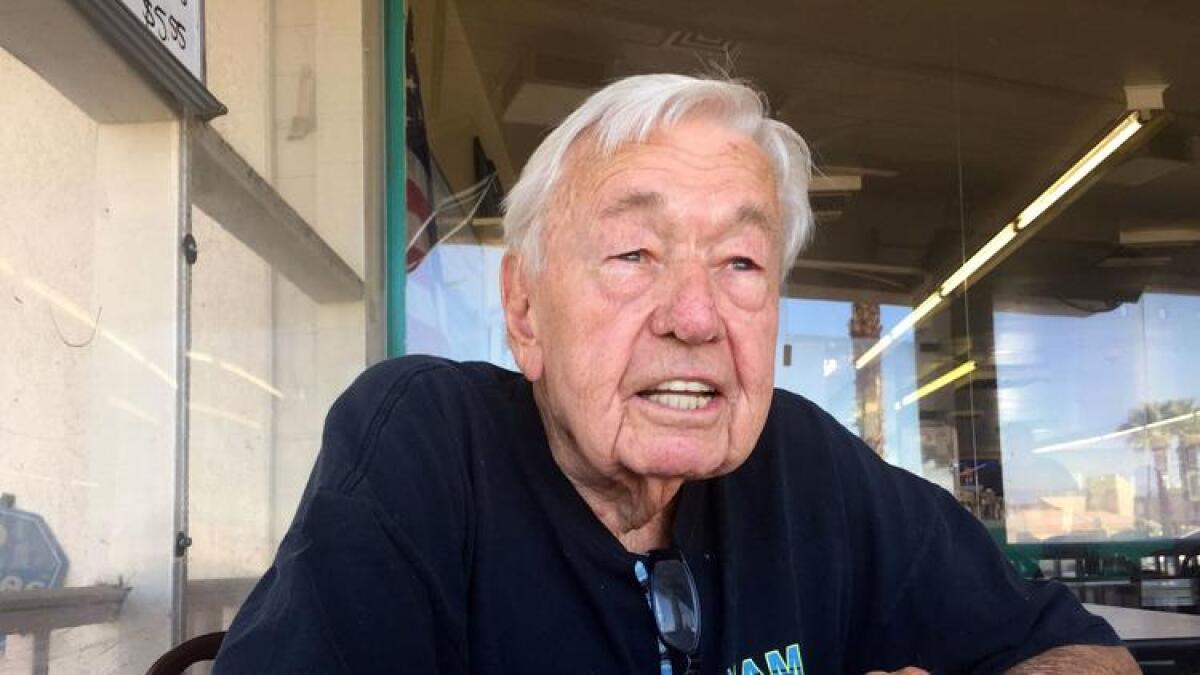
It was a cool and rainy day when elders of the Republican tribe recently gathered to honor one of their own.
The honoree, Stuart K. Spencer, was unmistakable in his white duck pants and a lime-green sport coat so bright it almost hurt to see. A reformed chain-smoker, he snapped merrily away on a wad of chewing gum.
The event marked Spencer’s 90th birthday, but the mood beneath the surface conviviality was unsettled and gray, like the clouds fringing the mountains outside.
If the occasion was intended as a personal celebration, it also had the feel of a wake for a time in politics long passed.
Along with former Vice President Dick Cheney and former California Gov. Pete Wilson, veterans of the Reagan years turned out in force. It was Spencer, more than anyone, who took a political long shot and washed-up B-movie actor and helped transform him into the Reagan of legend.
CPAC’s reaction to President Trump’s speech: Two thumbs up
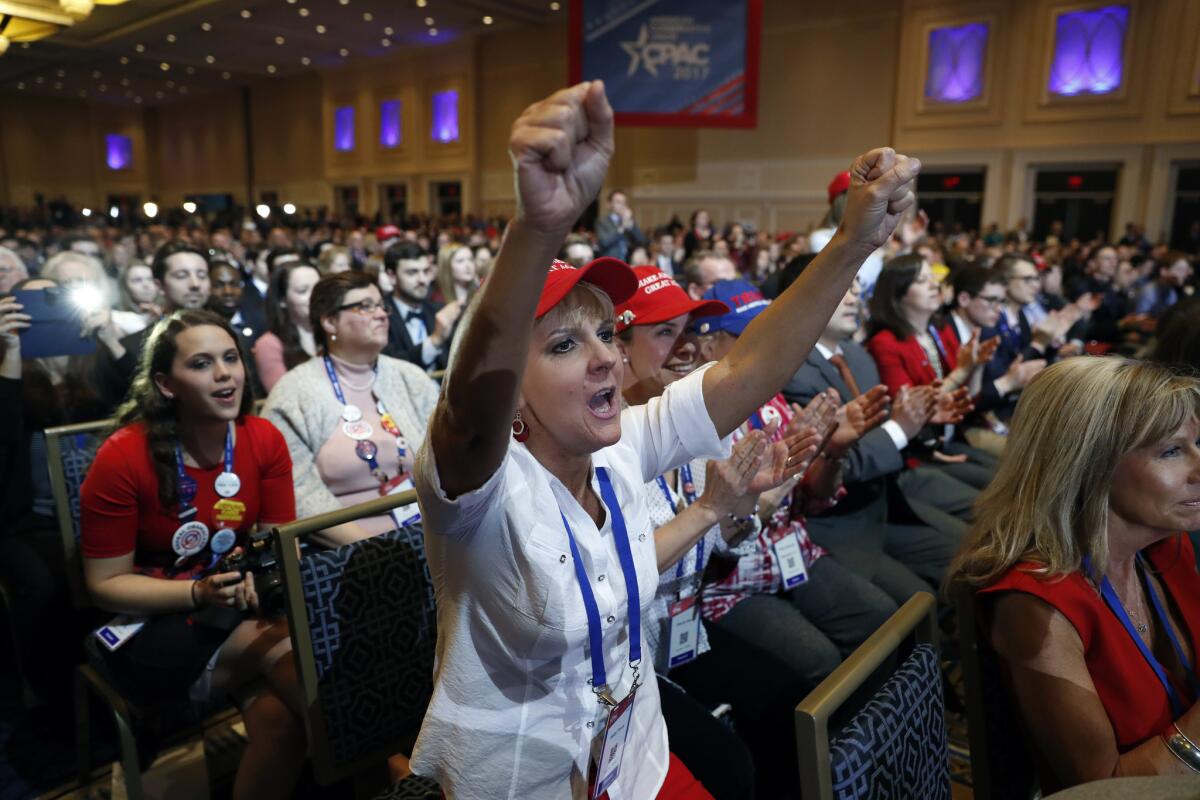
President Trump loves CPAC, and CPAC loves Trump.
As hundreds of Conservative Political Action Conference attendees spilled out into the hallways Friday after Trump’s speech to the group, they had glowing reviews of the man who has been tormenting Democrats and the media and transforming the Republican Party.
“It was fantastic, unbelievable, absolute truth,” said Shia L. Lome, 84, a retired Air Force colonel from Deerfield Beach, Fla., appraising Trump’s remarks. “If he carries through [his promises], this will be the greatest country ever.”
Lome added that there is “no question about it, Trump is his own type of Republican. Whether it’s conservative or whatever you want to call it,” Lome said he is happy “as long as [Trump] causes the Democrats heartaches.”
Kayne Robinson, 73, a former chairman of the Iowa Republican Party, said Trump was simply taking the party in the direction that “people want it to go.”
“I think the party is every bit as united behind him as it was behind either of the Bushes,” Robinson said. “Trump led a revolution in the party, very much like Reagan. ... I think Trump is doing just fine.”
Frank March, a 50-year-old Army retiree from Fairfax County, Va., emerged from the ballroom at the Gaylord National Resort & Convention Center wearing a red Make America Great Again cap, which carried Trump’s jagged signature on the bill.
March’s daughter had gotten the hat signed when she previously met Trump, and he proudly showed off photos of that event. “I recognize the signature!” a woman exclaimed as she saw the hat.
March praised Trump’s “follow-through” and his “commitment to workers” as “incredible.”
“He’s bringing in new people to the party,” March said. “The hope is, by his follow-through, doing what he said he was going to do,” then the non-Republicans who voted for Trump “will stick.”
Helping workers will be one of the ways Trump can make that happen, he said.
“In politics, you’re supposed to help people,” March said. “Workers are the people. They’re people who earn money to take care of their families. Republicans should support those people because they’re the ones who make America run.”
Donald Trump shows up at conservatives’ most prominent gathering and defines a new GOP

President Trump shows up at conservatives’ most prominent gathering and defines a new GOP.
President Trump made one of his strongest pitches Friday to unite the Republican Party and the conservative movement behind a nationalist, anti-globalist ideology that until recently would have been unthinkable for many Republicans.
“There is no such thing as a global anthem, a global currency or a global flag,” Trump said to great applause from thousands of conservatives. “I’m not representing the globe. I’m representing your country.”
He echoed ideas he has espoused in the past -- denouncing trade deals as the antithesis of “economic freedom,” warning that the great cities of Europe have been ruined by mass immigration, denouncing intervention in the Middle East by both parties.
But while many of the words were familiar, the venue and the passion made Friday’s speech remarkable.
The comments came at the annual Conservative Political Action Conference, just outside of Washington, D.C., the most prominent gathering of right-leaning groups and activists in the country. Such a speech would have been shocking from a conservative, much less the president, at almost any other time in the conference’s history.
Trump has been popular at CPAC in the past. He credits a speech there with launching his political career. But he snubbed last year’s event amid a heated primary in which many conservatives rejected his tone and the direction he was trying to move the GOP.
“I would have come last year, but I was worried that I would be at that time too controversial,” Trump said in his speech, which lasted nearly an hour.
Trump, the first president since Ronald Reagan to address the group during his first year in office, made clear that he is moving those once controversial ideas to the movement’s center.
In addition to his usual critiques of the media and frequent references to his electoral success, Trump spoke directly of his ambition for reshaping the Republican Party to attract blue-collar voters, “the forgotten men and women” who helped propel his electoral victory.
“I’m here today to tell you what this movement means for the future of the Republican Party and for the future of America,” Trump said. “The core conviction of our movement is that we are a nation that [must] put and will put its own citizens first.”
Later, he added that “the GOP will be from now on also the party of the American worker.”
While Trump tried to unite conservatives, the speech made little effort to bridge the country’s larger political divide. For example, Trump dismissed people who have shown up at town halls around the country to protest reversal of Obamacare.
“They’re not you,” he said. “They’re the side that lost.”
Justice Department rescinds order phasing out use of private prisons
Atty. Gen. Jeff Sessions has jettisoned an Obama administration order to phase out the use of private prisons to hold federal inmates.
The new order reverses one issued by former Deputy Atty. Gen. Sally Yates in August that sought to eliminate the department’s use of private for-profit prisons, which hold just over 10% of the current prison population.
The Obama administration order “changed long-standing policy and practice, and impaired the bureau’s ability to meet the future needs of the federal correctional system,” Sessions wrote Thursday to announce the reversal.
Civil rights and prisoner rights groups decried the Sessions’ decision, saying private prisons are not as cost-effective or as safe as government-run facilities, citing numerous abuses in the past.
The Bureau of Prisons houses about 21,000 of its 190,000 inmates in a dozen private prisons, including one near Bakersfield.
“Atty. Gen. Sessions has shown that he is not taking the mass incarceration crisis seriously,” said Wade Henderson, who heads the Leadership Conference on Civil and Human Rights.
“Continuing to rely on private prisons for federal inmates is neither humane nor budget conscious,” Henderson added. “We need a justice system that can work better for all people.”
Yates’ order did not affect facilities used to detain people in the country illegally.
The use of private prisons is expected to surge under President Trump’s promised crackdown on illegal immigration.
Trump has signed an executive order calling for expansion of immigrant detention facilities and authorized the use of private contractors “to construct, operate, or control facilities.”
Stocks in private prison companies have jumped on Wall Street since Trump won the presidential election, and they continued their rise on news of Sessions’ order.
CPAC and conservative media prepare for Trump
The future path of the Republican Party is being debated in the halls of the Conservative Political Action Conference in Maryland this week.
Will it be the party of Donald Trump, an outsider of the GOP establishment, or House Speaker Paul D. Ryan, the definition of establishment? Or, perhaps, of Richard Spencer, a white nationalist leader of the so-called alt-right movement? (Spencer was kicked out of CPAC on Thursday.)
Trump is set to address the conference on Friday, and the conservative media are ready for the much-anticipated address.
“Tomorrow it will be TPAC when he’s here,” Kellyanne Conway, a senior advisor to Trump told reporters Thursday.
Here are some of today’s headlines:
Go Big, Go Bold: Walker, at CPAC, pushes GOP to carry out agenda as party controls Congress, White House (Fox News)
Wisconsin Gov. Scott Walker, once a Trump foe, is urging conservatives to use the November election as a mandate.
“Do what you said you were going to do,” Walker said to attendees.
In the Fox News piece, which leads its website, it notes that leaders at the conference are hoping to use it to strategize about what they can accomplish and to better articulate their values at a time when the very definition of conservatism has seemed to waver.
Sweden Democrats: Trump was right (Fox News)
Remember last weekend when everyone — including many Swedish politicians — were really confused about Trump’s comments at a recent rally?
“You look at what’s happening last night in Sweden,” Trump, at a rally in Florida on Saturday, said about the Scandinavian country that has accepted large numbers of refugees. “Sweden. They took in large numbers. They’re having problems like they never thought possible.”
Actually, not much happened in Sweden on Friday night. Trump said later that he had been referring to a broadcast on Fox News on that night. Still, recent riots in the country were covered extensively by conservative media.
This post notes a recent op-ed penned by Jimmie Akesson and Mattias Karlsson, both leaders of the Sweden Democrats, in the Wall Street Journal on Wednesday supporting Trump’s characterization of a Muslim immigrant-led crime crisis in Sweden.
In it they write, “Trump did not exaggerate Sweden’s current problems. … If anything, he understated them.”
Trump Is Letting DREAMers Stay, And Rush Is Fine With That (Daily Caller)
He’s an immigration hard liner, and, apparently, he’s OK with Trump allowing DREAMERs to remain in the country.
This piece highlights comments by Rush Limbaugh this week.
“A lot of people think that Trump’s caving because if you allow the DREAMers to stay, we’re talking 750,000 DREAMers, kids, who each have two parents who could come in. Look, this is a-no-win,” Limbaugh said this week. “Nobody’s gonna win anything by deporting a bunch of kids that we let in.”
Trump advisor Steve Bannon rails at ‘corporatist, globalist media’
The two men with the most heavily dissected relationship in President Trump’s White House held a rare public appearance together Thursday and agreed on one common enemy: the media.
Reince Priebus, the chief of staff who is often described as “embattled,” said he has grown “conditioned” to the media counting Trump out: during the presidential campaign, the transition and the first month of the presidency.
“The biggest misconception is everything that you’re reading,” Priebus said.
Steve Bannon, Trump’s chief strategist, framed his complaint as an ideological war. He consistently called the media “the opposition party” throughout a 20-minute joint interview on stage at the Conservative Political Action Conference just outside of Washington.
“It’s not only not going to get better, it gets worse every day,” Bannon said. “They’re corporatist, globalist media that are adamantly opposed to an economic nationalist agenda like Donald Trump has.”
“If you think they’re going to give you your country back without a fight,” he added. “You are sadly mistaken.”
Bannon, former executive chairman of the far-right Breitbart News, seldom speaks in public. His nationalist rendering of Republican ideology is often seen in contrast to Priebus, the former chairman of the GOP, who is viewed as the more mainstream conservative advocate within the White House.
The two men said the tension between them portrayed in the media is inaccurate. But as they praised each other, the men made clear that Bannon sees his role as dominant in shaping Trump’s policy.
Bannon praised Priebus for doggedly keeping the trains running -- “one of the toughest jobs I’ve ever seen in my life.” Bannon talked about being in “the first inning” of shaping “a new political order” and beginning the “deconstruction of the administrative state.”
Priebus used more prosaic language and spoke of Bannon as the one who pushes Trump to maintain his bold vision.
“He is very dogged in making sure that every day the promises that President Trump made are the promises we’re working on,” Priebus said of Bannon.
In Mexico, Homeland Security chief says there will be no mass deportations of people in U.S. illegally
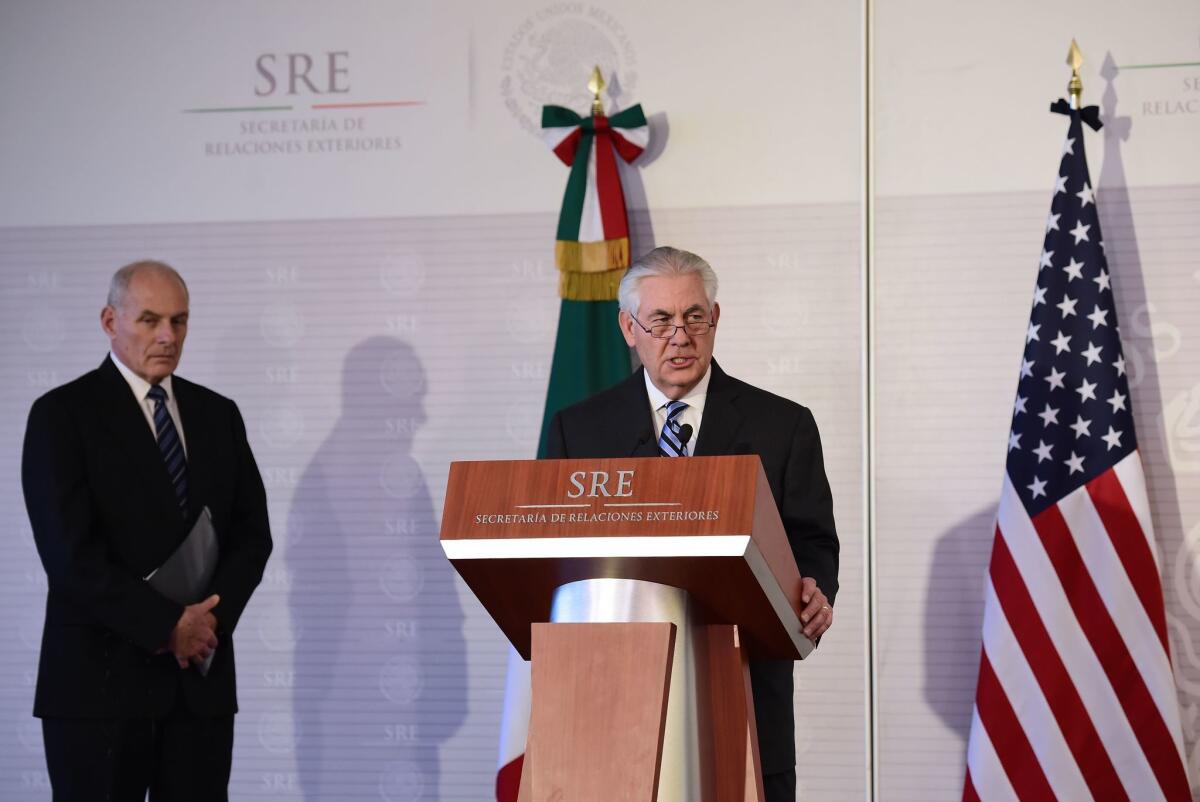
Homeland Security Secretary John F. Kelly, on a visit to Mexico, said Thursday that there will be no mass deportations of people living in the U.S. illegally.
Kelly also said U.S. military forces would not be used in deportation efforts and that any deportation cases would go through the U.S. legal system.
“No. Repeat, no use of military force in immigration operations,” Kelly said at a news conference at the Foreign Relations Ministry in Mexico City. “None. We’ll approach this operation systematically, in an organized way, in a results-oriented way, in an operation and and in a human dignity way.”
Kelly and Secretary of State Rex Tillerson are in Mexico City to discuss a wide variety of issues, including immigration and security, with Mexican government officials.
Kelly’s remarks came the same day President Trump called recent raids in the U.S. an unprecedented enforcement effort.
“You see what’s happening at the border. All of a sudden for the first time, we’re getting gang members out,” he said. “We’re getting really bad dudes out of this country, and at a rate that nobody’s ever seen before.”
Mexico bracing for long battle with Trump administration, foreign minister tells lawmakers
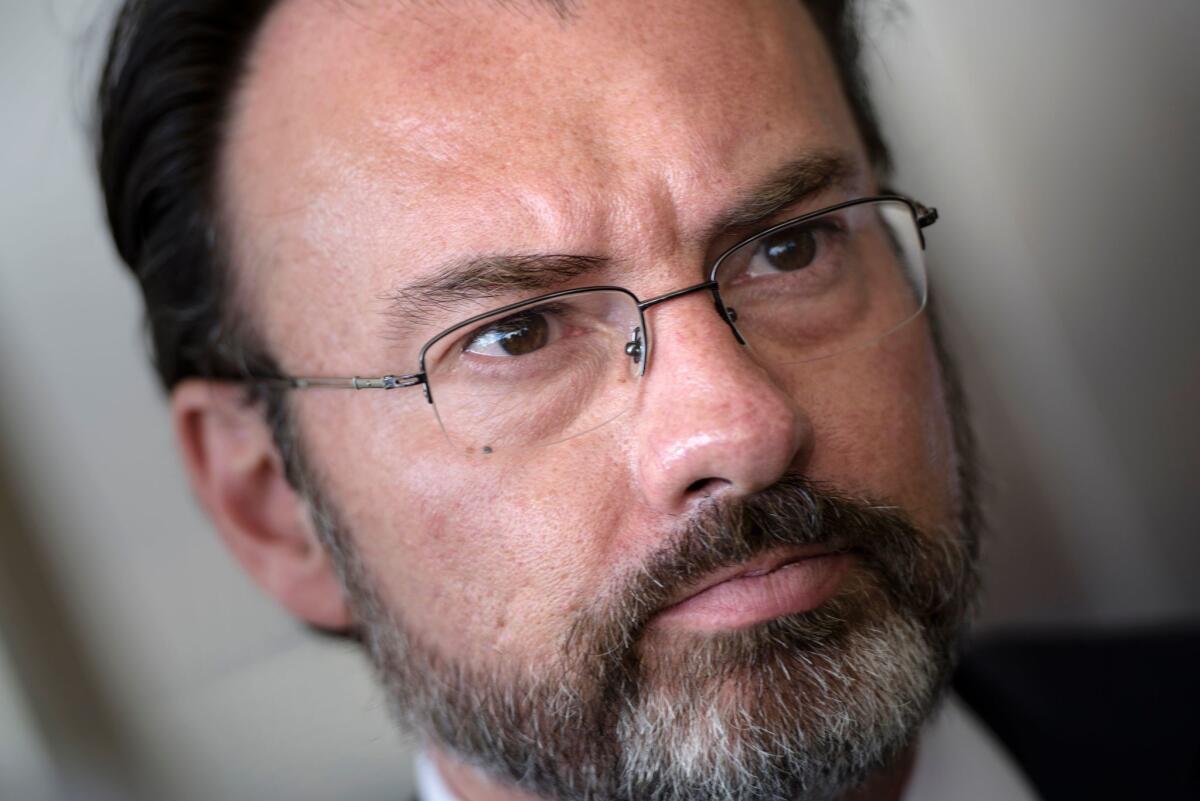
Mexico is preparing for a long “battle” with the administration of President Trump, its foreign minister reportedly told lawmakers in private comments, adding that the country was prepared to retaliate with new tariffs if necessary.
“We are here preparing for a battle that is going to be long,” Foreign Minister Luis Videgaray told federal deputies Wednesday, according to the newspaper La Jornada, which said it had obtained a copy of the comments. “This is not going to be resolved in three days.”
In the reported remarks, Videgaray said Mexico was prepared to retaliate with new tariffs on U.S.-made goods should the Trump administration follow up on its threats to slap an export tax of 20% or more of goods imported from Mexico to the United States.
There was no official response from the Mexican Foreign Ministry on Videgaray’s reported remarks.
Videgaray was among the Mexican officials, including President Enrique Peña Nieto, who met this week with a pair of visiting White House Cabinet members, Secretary of State Rex Tillerson and Homeland Security Secretary John F. Kelly. The private remarks were apparently made on Wednesday, when the two Trump envoys were scheduled to arrive in Mexico City.
Homeland Security tried to downplay immigration raids as routine. Now Trump says they’re unprecedented
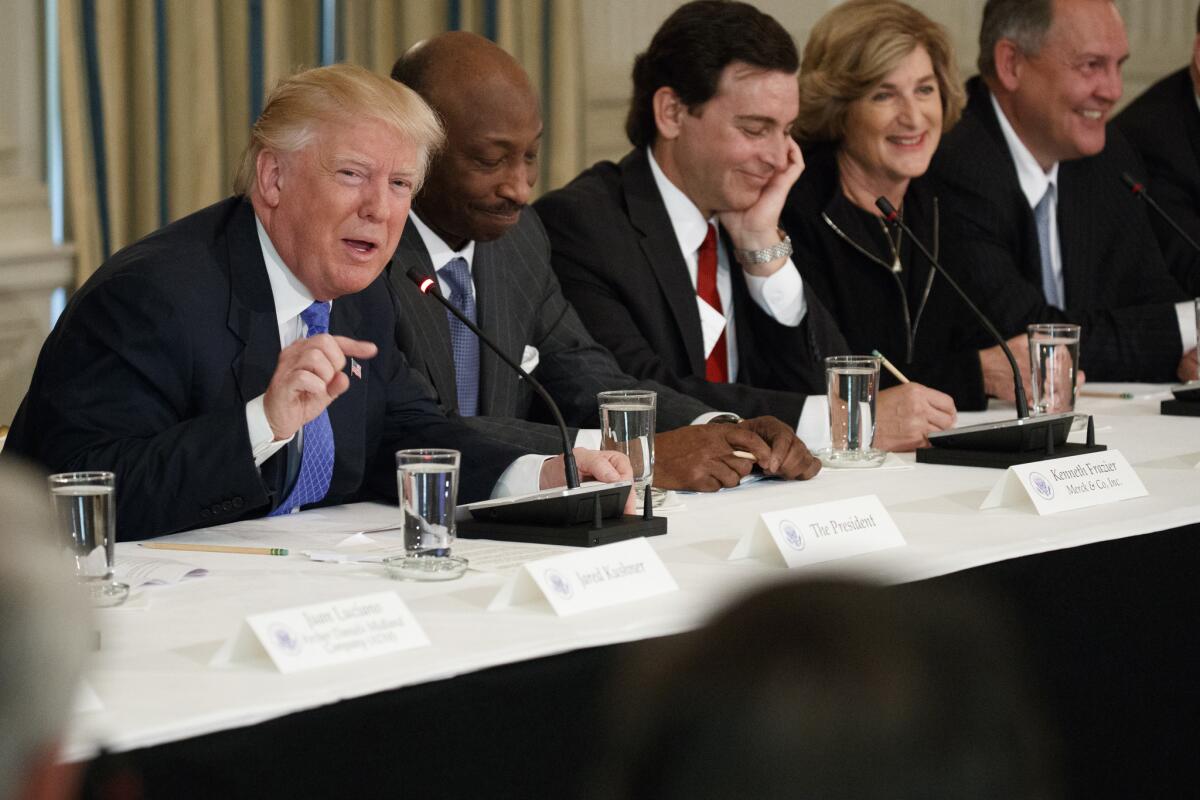
After nationwide immigration raids this month in which more than 680 people were arrested, the Department of Homeland Security issued a nothing-to-see-here statement downplaying the sweeps as strictly ordinary.
“ICE conducts these kind of targeted enforcement operations regularly and has for many years,” the agency said last week, referring to Immigration and Customs Enforcement.
But President Trump had a different take Thursday, labeling the raids an unprecedented enforcement effort.
“You see what’s happening at the border. All of a sudden for the first time, we’re getting gang members out,” he said before a roundtable on manufacturing. “We’re getting really bad dudes out of this country, and at a rate that nobody’s ever seen before.”
Under President Obama, deportations peaked at 400,000 people in 2012, touching off widespread criticism from immigration advocates, which prompted Homeland Security to scale back deportations.
Last year, deportations fell to 240,000 as the Obama administration focused on targets similar to what Trump described in the raids conducted under his authority: criminals, repeat immigration violators and recent arrivals.
Trump also called the sweeps this month a “military operation,” even though no military resources were involved and the White House has pushed back aggressively on reports that the administration was considering seeking National Guard forces to assist in deportations.
Homeland Security said the raids were conducted by ICE agents, U.S. marshals and state and local law enforcement agencies.
“What has been allowed to come into our country, when you see gang violence that you’ve read about like never before, and all of the things — much of that is people that are here illegally,” Trump said. “They’re rough and they’re tough, but they’re not tough like our people. So we’re getting them out.”
Of the 680 arrests last week, 161 occurred in Los Angeles and surrounding counties. Three-quarters of those detained in the Los Angeles-area sweeps were from Mexico.
Trump noted that Secretary of State Rex Tillerson and Homeland Security Secretary John F. Kelly traveled to Mexico this week on a “tough trip.”
“We have to be treated fairly by Mexico,” Trump said.
White nationalist leader Richard Spencer booted from Conservative Political Action Conference
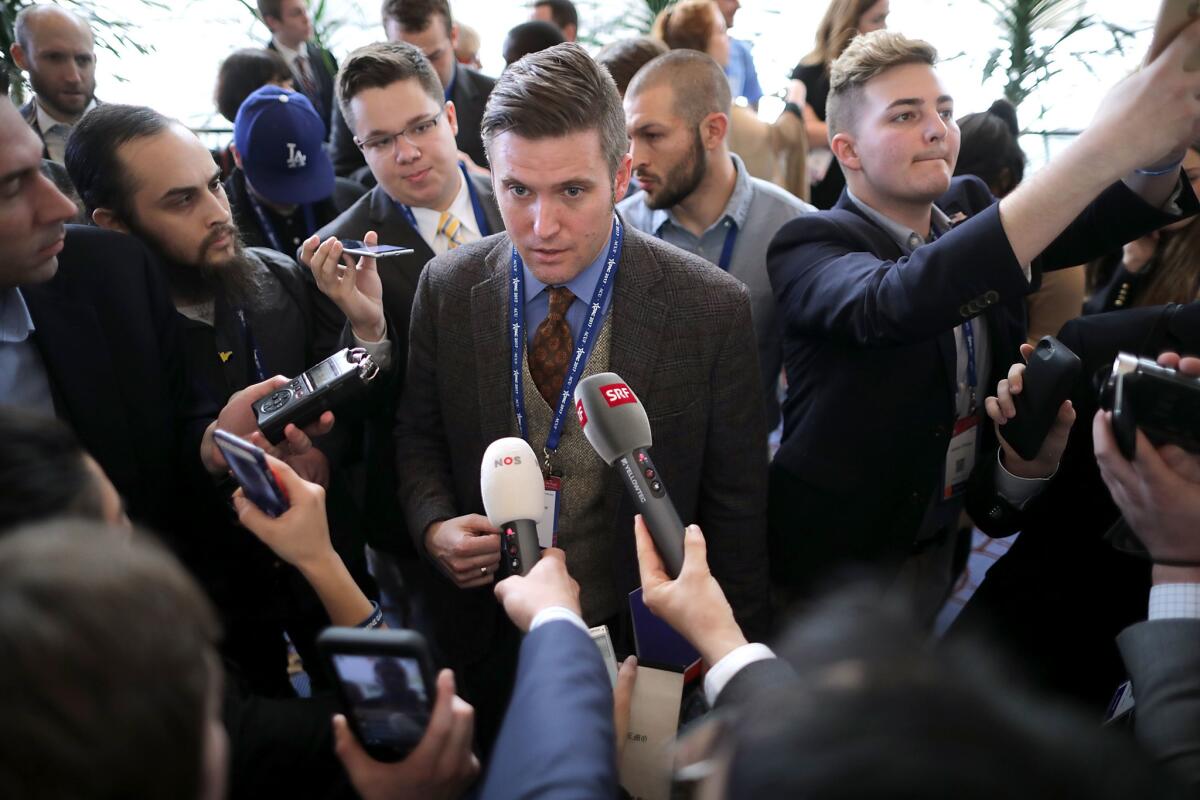
One of America’s most prominent white nationalists, Richard Spencer, was kicked out of the Conservative Political Action Conference on Thursday after conference organizers gave him credentials to attend and then wavered on whether to let him stay.
Spencer, who coined the term “alternative right” to describe his far-right views on separating the races, came to CPAC to attend a speech that was critical of the “alt-right.”
CPAC organizer Matt Schlapp took pains to distance CPAC from the fringe Spencer represents.
“The ‘alt-right’ does not have a legitimate voice in the conservative movement,” said Schlapp, adding that “nobody from that movement is speaking at CPAC.”
Obamacare 101: Are health insurance marketplaces in a death spiral?

It’s been a rocky few months for the health insurance marketplaces created by the Affordable Care Act.
Even if you’re not one of the roughly 11 million Americans who rely on these online markets to get your health insurance, you’ve probably seen the headlines about rising premiums and insurance companies pulling out of the system.
Last week, national insurance giant Humana announced it would stop selling plans on the marketplace. Aetna’s chief executive claimed the marketplaces are in a “death spiral.” Republicans say the marketplaces are Exhibit A that Obamacare is collapsing.
So what’s the real story? Are these things really kaput or can they be fixed? Here’s a rundown of where things stand.
Trump administration wants tax reform done by August, Mnuchin says
The Trump administration wants to overhaul the tax code by August, Treasury Secretary Steven Mnuchin said Thursday, laying out an aggressive timetable in his first significant public comments since taking office last week.
“Our economic agenda, the No. 1 issue is growth, and the first most important thing that will impact growth is a tax plan,” Mnuchin said in an interview with CNBC.
“So we are committed to pass tax reform,” he said. “We want to get this done by the August recess.”
Loud and angry, protesters turn congressional town halls into must-see political TV
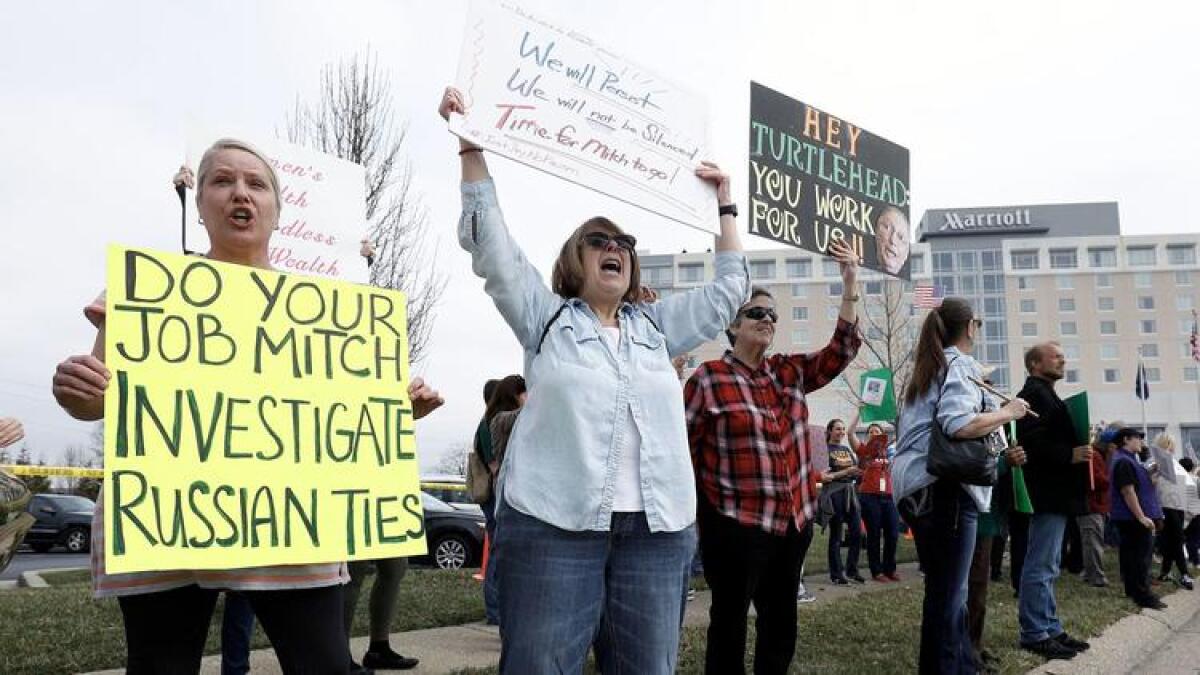
They came by the hundreds, in big cities and rural hamlets, to heckle, plead, badger and, in some instances, to protest the protests themselves.
Congress is in recess this week, and a citizenry suddenly spurred to action used the opportunity to let their returning lawmakers know just how they feel about the tempestuous last month in Washington.
“Winners make policy and losers go home,” a taunting Mitch McConnell, the Republican Senate leader, told an invitation-only gathering in his home state of Kentucky, as about 1,000 protesters gathered outside.
Not exactly.
The town hall meeting, a throwback to a time of more intimate connection, has become a political organizing tool in the social media age — a piece of performance theater and a worldwide stage.
Obamacare, immigration, environmental regulation, Social Security, Russian meddling in the 2016 election and Trump, Trump, Trump — all poured forth this week in the form of questions, loudly and heatedly.
Trump administration rescinds guidelines on protections for transgender students
The Trump administration rescinded an Obama-era directive Wednesday aimed at protecting transgender students’ rights, questioning its legal grounding.
Under the guidelines, schools had been required to treat transgender students according to their stated gender identity, and either allow access to restrooms and locker rooms for the gender they identify with or provide private facilities if requested. The Obama administration had said that students’ gender identities were protected under Title IX requirements, which prohibit federally funded schools from discriminating on the basis of sex.
But officials in the Education and Justice departments said that their predecessors failed to make their case, citing “significant litigation” spurred by the policy.
Americans in Mexico protest Trump’s ‘inflammatory rhetoric’ during Tillerson visit
A group of Americans living in Mexico is planning a protest Thursday to send a message to visiting U.S. Secretary of State Rex Tillerson.
Their gripe?
President Trump’s “inflammatory rhetoric.”
That’s according to a draft of a letter that several groups organizing the protest hope to deliver to Tillerson, who is in town along with Homeland Security Secretary John F. Kelly for talks with top Mexican officials.
The letter, which will be cosigned by the Mexican chapter of Democrats Abroad, as well as other groups, complains about Trump’s “hostile” attitude toward Mexico, which it says is engendering “nationalistic sentiments” in Mexico.
Among Trump’s hostile acts, the letter says, is Trump’s vow to build a border wall and force Mexico to pay for it.
“The idea of building a wall ... frames Mexico and Mexicans as foreign invaders,” the letter says.
It also criticizes Trump for pledging to renegotiate NAFTA, saying, “The U.S. and Mexico are deeply connected economies and it is in the interest of the United States to strengthen the regional production network to boost manufacturing employment in the U.S. and ensure the long-run competitiveness of manufacturing in the region.”
There are more than a million U.S. citizens living in Mexico, and many have been vocal since Trump’s election. Last month, thousands turned out for a women’s march outside the American Embassy that saw crowds chanting anti-Trump slogans.
Mexico will never accept ‘unilateral’ American immigration rules, foreign secretary says
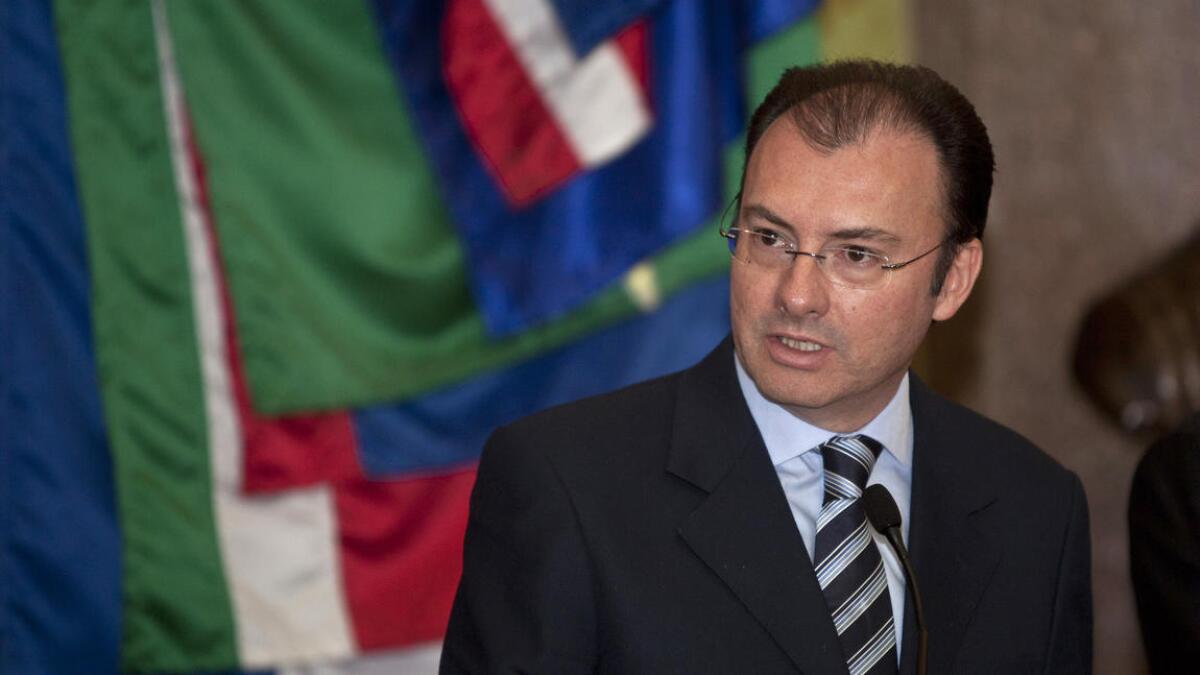
Mexico will reject any “unilateral” effort from the United States to impose immigration or other policies on the Mexican government, the country’s foreign secretary said Wednesday.
“I want to make clear, in the most emphatic way, that the government of Mexico and the Mexican people do not have to accept measures that, in a unilateral way, one government wants to impose on another,” Foreign Secretary Luis Videgaray said in public comments. “That we are not going to accept.”
He spoke a day after the Trump administration unveiled tough new measures to enforce immigration laws and deport people who are in the country illegally — proposals that were widely portrayed in the Mexican media as a prelude to massive deportations.
On Wednesday, two top Trump administration cabinet members — Secretary of State Rex Tillerson and Homeland Security Secretary John F. Kelly — were arriving in Mexico for talks with that nation’s officials, including Videgaray. Immigration, trade and law enforcement issues were expected to be discussed at a tense moment in U.S.-Mexican relations.
In his reported comments, the Mexican secretary did not single out any specific U.S. proposal as objectionable. Mexican officials have acknowledged there is little they can do to counter U.S. immigration policies.
Among other things, the Trump administration has proposed sending non-Mexican citizens detained along the U.S.-Mexico border back to Mexico. Mexican officials would presumably have to sign off on such a plan.
Mexico already detains and deports thousands of Central Americans annually who cross Mexican territory with the hope of entering the United States illegally via the U.S.-Mexico border. U.S. authorities have worked with their Mexican counterparts to halt the Central American influx.
The Mexican foreign secretary made it clear that immigration would be at the top of the list of items to be discussed during meetings with the U.S. Cabinet secretaries.
Defending the rights of Mexican immigrants is “the first point in the agenda,” said Videgaray. He also said Mexico could take the issue of the rights of Mexican immigrants to the United Nations and other international agencies.
U.S. Secretary of State Rex Tillerson arrives in Mexico
Both in power and in turmoil, conservatives head to Conservative Political Action Conference to see what’s next

The eyes of men in crisp blazers darted toward passing faces and identification badges, looking for a familiar face, a famous name. As Fox News host Sean Hannity prepared to broadcast a live show from a ballroom, a brief chant burst out from the audience: “U-S-A! U-S-A!”
It’s that time of year again: Hundreds of Republicans began arriving Wednesday at the Gaylord National Resort & Convention Center in Oxon Hill, Md., just south of Washington, for the annual Conservative Political Action Conference. CPAC, as it’s best known, is a place for conservative political figures and activists to gather, schmooze, hammer out new ideas and audition for starring roles in the Republican Party.
And this year, CPAC attendees have a lot to talk about. Their party is in control of Congress, the White House and dozens of state governments across America, and yet not at all at peace with itself.
President Trump is expected to address the conference later in the week after winning on a platform of populist nationalism that some conservatives have accused of not being conservative at all.
Breitbart News, the brash rising star of right-wing media, is one of the conference’s top promoters, but one of its staffers, Milo Yiannopoulos, lost his speaking slot at CPAC and resigned from the news organization after video circulated showing him appearing to promote pedophilia. Some conservatives had backed Yiannopoulos and cried censorship when the provocateur offended liberals at college speaking events, but now they had become offended themselves.
Still, as CPAC began on Wednesday, the mood was upbeat. This was a victorious movement, after all.
Many new guests were greeted by the sight of Josh Platillero, 23, wearing a cartoonishly large stovepipe hat and a suit the colors of the American flag.
“I love networking,” said Platillero, who recently lived in Knoxville, Tenn., before moving to the D.C. area to work with a conservative nonprofit, the Leadership Institute. It’s his second year attending CPAC, and he was excited about the lineup of speakers, which include some of the White House staff.
“I think our new president is not perfect, but I think he’s doing good things,” he said.
Ariel Kohane, 45, who came from the Upper West Side in Manhattan, stood in the lobby holding signs that read, “Jews for Trump,” in both English and Hebrew.
“I love the fact that I can get together with many of my fellow conservative friends and colleagues and we can all be very proud of ourselves with all our accomplishments and the fact that we get to strategize and plan ways to further expand conservatism across America and across the whole world,” Kohane said.
Pence condemns Jewish center bomb threats and visits desecrated cemetery in Missouri
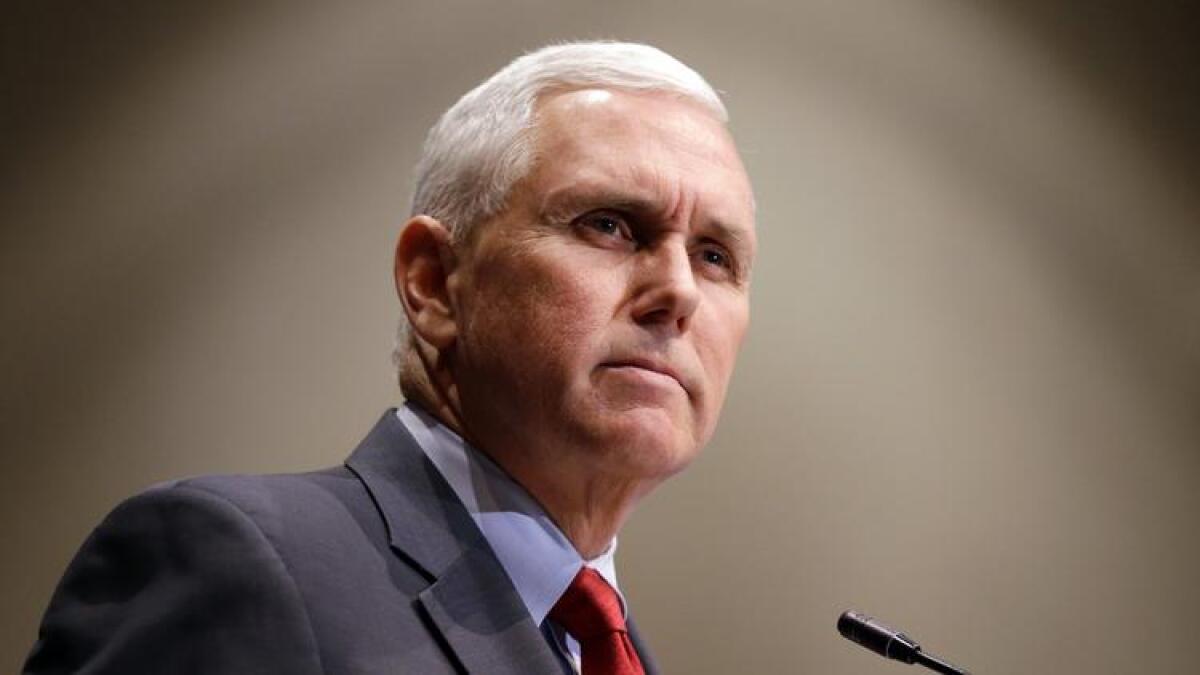
Visiting Fenton, Mo., on Wednesday, Vice President Mike Pence condemned a string of bomb threats against Jewish community centers around the nation and the desecration of a St. Louis-area Jewish cemetery over the weekend.
“Speaking just yesterday, President Trump called this a horrible and painful act. And so it was. That along with other recent threats to the Jewish community centers around the country,” said Pence, who was visiting the headquarters of the Fabick Cat machinery company. “He declared it all a sad reminder of the work that still must be done to root out hate and prejudice and evil. We condemn this vile act of vandalism and those who perpetuate it in the strongest possible terms.”
The vice president said it was “inspiring” how the “people of Missouri have rallied around the Jewish community with compassion and support.”
Among those showing solidarity with the Jewish community is a group of Muslims who launched an online fundraising campaign to help repair the cemetery. Donors had pledged more than $90,000 by Wednesday afternoon.
Pence later visited the Chesed Shel Emeth Cemetery in University City, Mo., where nearly 200 tombstones had been toppled over the weekend.
Trump’s move on transgender bathroom access sparks interest
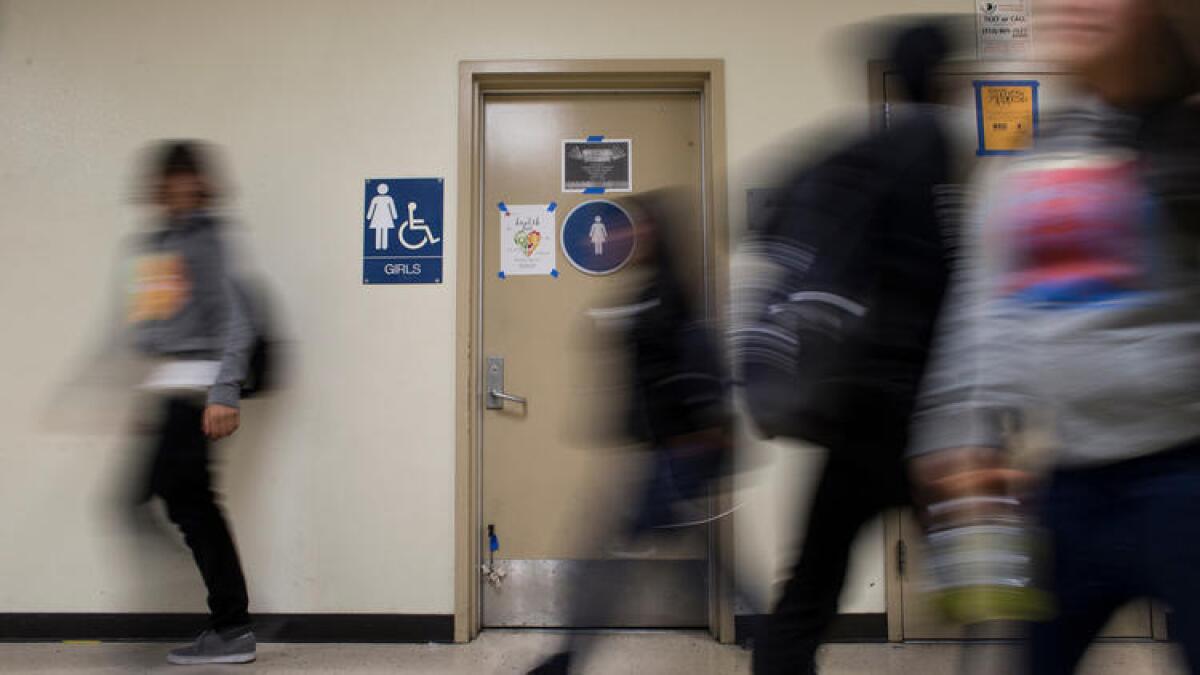
For President Trump, commenting on social issues — such as same-sex marriage and abortion — has never seemed much of a priority.
Indeed, throughout the campaign, Trump hardly discussed the topics.
When asked about transgender bathroom access at a town hall in April 2016, Trump said people should be able to use whichever bathroom they choose. He then moved on from the question, offering little else.
Now it appears his administration is set to wade into the controversy.
It’s a topic the conservative media loves to explore.
Here are some of today’s headlines:
Return to normalcy: Trump readies reversal of transgender bathroom lunacy in public schools (Daily Caller)
What will the Trump administration do about transgender bathroom access?
The Caller highlights White House Press Secretary Sean Spicer’s pronouncement on the issue: “This is a states rights issue and not one for the federal government,” Spicer told reporters.
The ‘lunacy’ referred to is the federal guidance President Obama issued prior to leaving office directing schools that receive federal funding to allow transgender students to use restrooms and other facilities that match their gender identities.
Several states filed suit to overturn the directive, and a federal judge issued a temporary injunction barring its enforcement, which remains in place.
Several states, following the lead of North Carolina, are seeking to implement legislation that bans transgender people from using the bathrooms of the gender with which they identify.
66 percent of Trump voters change the channel when awards shows get too political (Daily Caller)
When Meryl Streep criticized President Trump last month in her Golden Globes speech, he replied quickly.
“Meryl Streep, one of the most over-rated actresses in Hollywood, doesn’t know me but attacked last night at the Golden Globes,” Trump tweeted.
Well, Trump can probably expect more barbs as actors (in overwhelmingly liberal Hollywood) take the stage at the Oscars on Sunday.
Lots of Trump voters can be expected to change the channel, according to this piece, which highlights a new poll on the subject.
The Hollywood Reporter says that 66% of Trump voters said they have stopped watching an awards show because a celebrity started talking about politics while accepting an award. By contrast, only 19% of Hillary Clinton’s supporters have done so.
Trump talks tolerance, decries anti-Semitism, but media remain skeptical (Fox News)
Well, Trump finally did say something to condemn the anti-Semitic vandalism and threats that have taken place since his presidential victory.
“Anti-Semitism is horrible,” Trump said in an interview with MSNBC on Tuesday.
In the Fox News piece, Howard Kurtz argues the media should give the president more credit for speaking out.
“I always think it’s unfair to blame a political leader for violence or vandalism carried out by people who support him,” he writes. “I felt the same way about critics who blamed Barack Obama for urban riots or shootings of police officers.”
Among Republicans, Trump is more popular than congressional leaders
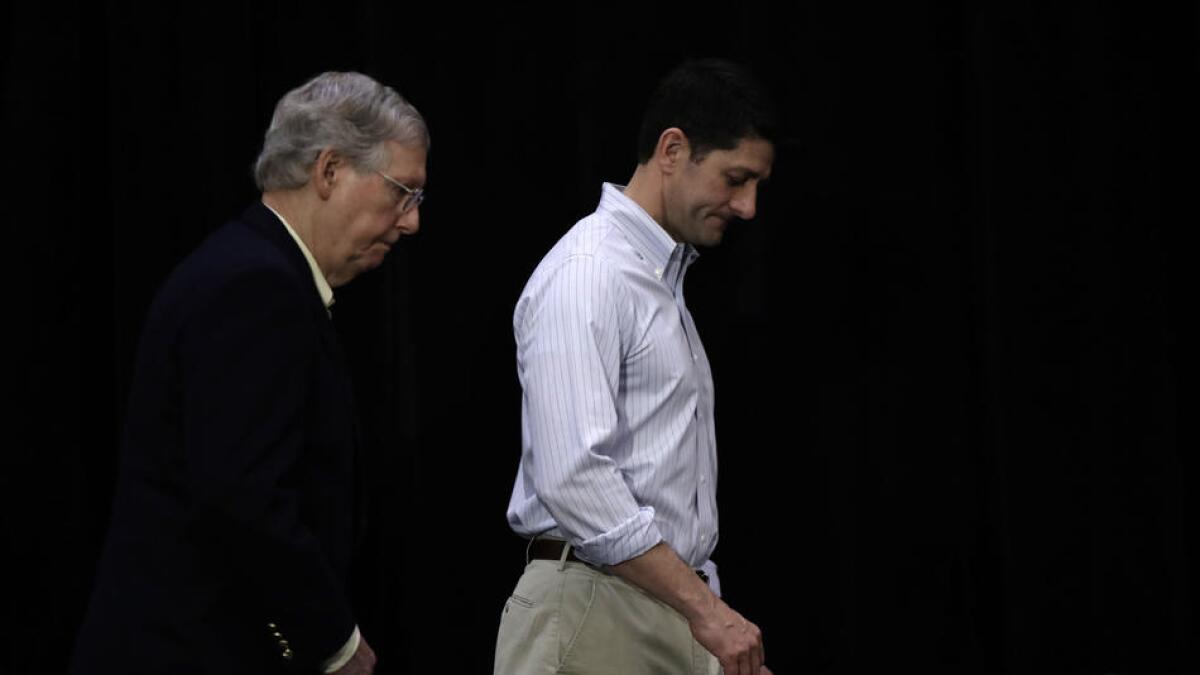
Amid strain between the Trump administration and the Republican-controlled Congress, the White House holds the high ground, a new survey indicates.
Among Republicans, President Trump has greater popularity than the party’s congressional leaders. Asked specifically who they would trust if the two sides disagreed, most Republicans chose Trump over their party’s leadership.
The findings, from a new survey by the nonpartisan Pew Research Center underscore Trump’s continued sway with the Republican congressional majority. Although the president has historically low job approval ratings among the public at large, he remains highly popular among Republican partisans and in Republican districts.
As for Democrats, they’re strongly in an oppositional mood. Asked if they were more worried that Democrats in Congress would go too far in opposing Trump or not go far enough, more than 70% of Democrats said they feared their party would not go far enough. Only 20% said they worried the party would go too far.
Republicans in Congress have eyed Trump warily on several fronts. His positions on trade and entitlement reform break with years of the party’s positions. His reluctance to criticize Russian President Vladimir Putin has generated tension. And the administration’s lack of clarity on healthcare and tax policy have Republican leaders guessing which way to turn on major issues.
But Republican partisans have fewer reservations than their elected representatives. Eighty-six percent to 13%, those who identify as Republicans or as independents who lean Republican have a favorable view of Trump, the Pew survey found.
By comparison, 57% have a favorable view of Sen. Mitch McConnell of Kentucky, the majority leader, with 22% unfavorable and 21% having no opinion. House Speaker Paul Ryan of Wisconsin is slightly better known, with 65% of Republicans holding a favorable view, 23% an unfavorable view and 13% having no opinion.
Asked who they would trust if the two sides disagreed, 52% of Republicans said they would side with Trump and 34% with the Republicans in Congress. Republicans younger than 40 were the only major exception; 52% to 36%, they said they would side with Congress.
At the same time, Republican partisans now have a warmer opinion of their party leadership than they had during most of President Obama’s tenure.
During the Obama years, GOP partisans tended to be frustrated that their side could not reverse the president’s initiatives, even with a majority in the House, starting in 2010, and then in the Senate for Obama’s last two years. Their view of the GOP leadership has rebounded strongly since the election.
Democrats’ view of their congressional leadership has been more stable. And both sides widely dislike the other party’s leaders.
Supreme Court rejects use of ‘racial stereotypes’ in death penalty cases
The Supreme Court rejected the use of “racial stereotypes” in death penalty cases Wednesday, reopening the case of a black man in Texas who was sentenced to die after his jury was told African Americans are more likely than whites to commit crimes.
Chief Justice John G. Roberts Jr. said this testimony had no place in a sentencing hearing and “appealed to the racial stereotype that black men are prone to violence.”
“Our laws punish people for what they do, not for who they are,” the chief justice said in the courtroom.
The 6-2 decision faults Texas authorities for refusing to give a new sentencing hearing to Duane Buck, a Houston man who was convicted of shooting and killing his ex-girlfriend and seriously injuring her new boyfriend in 1995.
Buck was found guilty of murder, but when his jury was debating his fate, his court-appointed defense attorney put on the witness stand an expert who cited statistics showing blacks are more likely to commit future crimes than whites.
After hearing this testimony, the jury decided to sentence Buck to death.
Years later, Texas state attorneys set aside the death sentences for six other black defendants whose juries heard similar testimony, but they refused to reopen Buck’s case.
In Buck vs. Davis, the high court said that was a mistake. The jury was deciding “the question of life or death,” and this is no place for the introduction of a “particularly noxious strain of racial prejudice,” Roberts said.
The court sent the case back to judges in Texas to reconsider the death sentence.
Justice Clarence Thomas dissented, along with Justice Samuel A. Alito Jr. Thomas said Buck was properly sentenced to die for a brutal murder, and he insisted the court should not have heard the case for procedural reasons. “Having settled on a desired outcome, the court bulldozes procedural obstacles and misapplies settled law to justify it,” he wrote.
At Rep. Tony Cárdenas’ town hall, Democrats worry about what Donald Trump may do
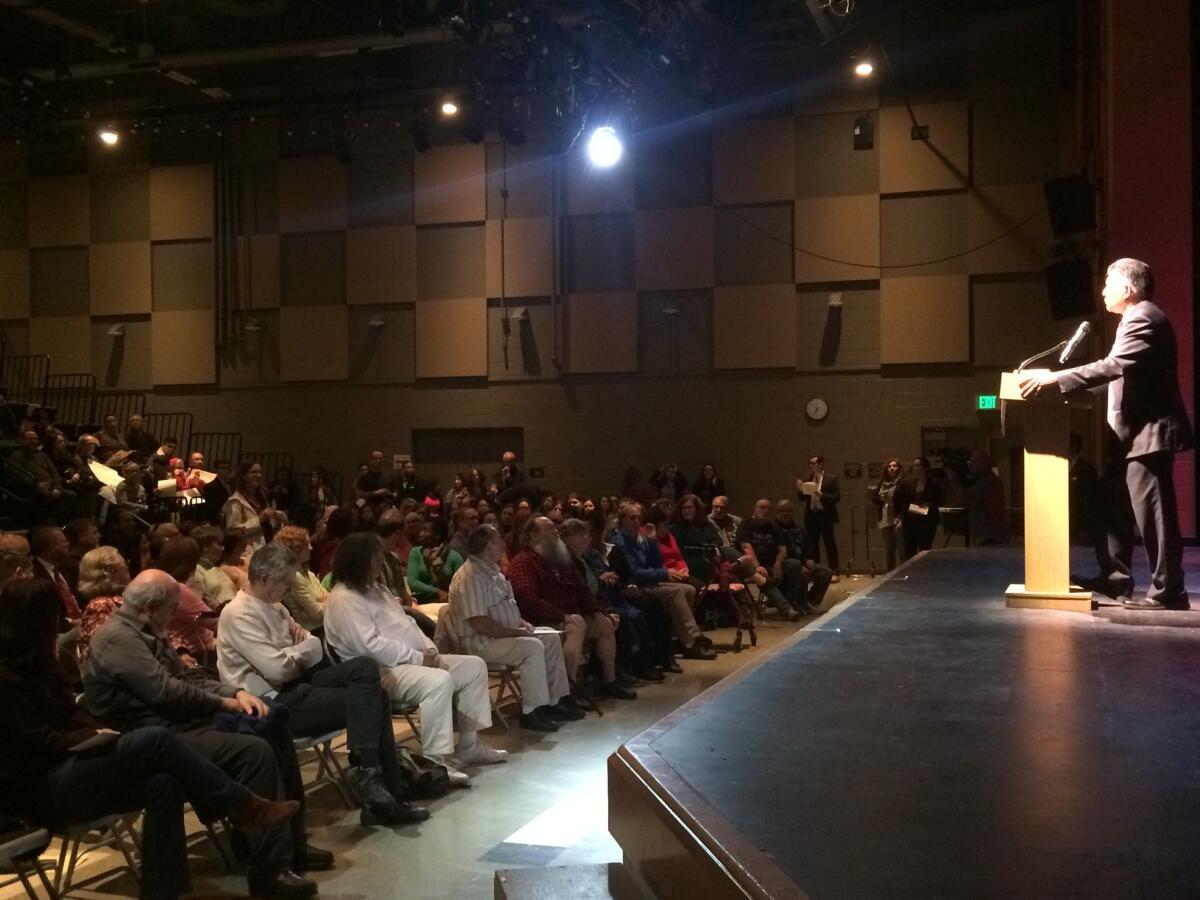
They arrived with soggy jackets, hats and umbrellas.
The topic was supposed to be the Affordable Care Act. But many who attended Democratic Rep. Tony Cárdenas’ town hall meeting Tuesday night in a crammed auditorium at the Cesar E. Chavez Learning Academies came with a question: What can we -- as Democrats -- do to help you?
“Show up and vote,” said Cárdenas, who represents a slice of the staunchly liberal San Fernando Valley. (Hillary Clinton defeated Donald Trump in this district by nearly 60-percentage points in the fall election.)
“Sign people up, get people involved,” he said.
At times the meeting had the feel of a therapy session for Democrats, wondering aloud how to function under a Trump administration.
“Where is the anger among Democrats?” asked one man. “I want to see more anger.”
Cárdenas, standing at a lectern on an elevated stage, offered a stern look and nodded in agreement as rain could be heard splattering on the roof above.
The complaints included Republicans’ efforts to repeal Obamacare and Trump’s new immigration mandates.
“Trust me, I’m pissed. I’m upset,” Cardenas said. “But we have to act constructively. We have to be responsible.”
Last month, Trump signed executive orders directing the Department of Homeland Security to prioritize the removal of people in the U.S. illegally who have criminal convictions.
In addition to speeding up the deportation of convicts, Trump’s orders also call for quick removal of people in the country illegally who are charged with crimes and waiting for adjudication.
And in recent days, a handful of people who have received protection under Deferred Action for Childhood Arrivals (DACA) have been arrested by Immigration and Customs Enforcement agents nationwide.
Cárdenas said that for him, the issue is personal. His parents were immigrants from Mexico, who lived in the San Fernando Valley for decades, raising 11 children, he said. Today his district is nearly 70% Latino.
“I’m going to fight for you,” he said. “I’m going to fight for the people who are my immigrant father.”
When a young man, a DACA recipient, asked him, via Twitter, if he’ll be safe in the weeks ahead, Cárdenas seemed at a loss.
“I pray that [Trump] doesn’t go after you,” he said.
Killing with kindness, GOP’s McClintock faces down hostile questioners as town hall goes into overtime
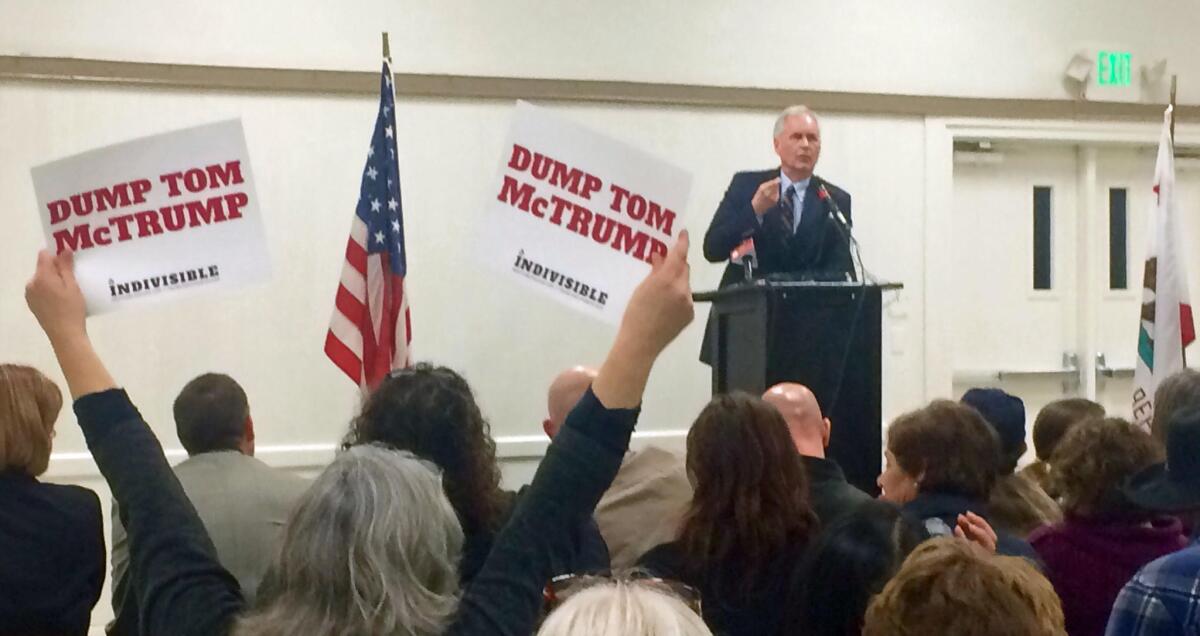
The last time Rep. Tom McClintock held a town hall meeting, earlier this month in the Sacramento suburbs, he left under police escort.
His session Tuesday night in Mariposa, a small tourist way station on the road to Yosemite, drew plenty of barbed questions, criticizing the five-term GOP congressman and attacking President Trump.
But the more than half dozen California Highway Patrol officers arrayed around the auditorium at the fairground hardly seemed necessary.
McClintock ceded no ground on his deeply conservative beliefs and staunchly and repeatedly defended the president -- often to jeers and catcalls.
But even some of the harshest questions McClintock faced were prefaced with thanks for his willingness to show up early and stay late. Many of his GOP colleagues have ducked such confrontations, refusing their constituents’ requests.
“God bless all of you for being here,” he said at one point, after a woman in the audience said the huge turnout -- about 900 people -- was a show of resistance to Trump. (In fact, about a third or so of the crowd appeared strongly supportive of the president.)
It is highly doubtful if any minds were changed during the session, which went more than an hour past schedule.
But in the end, McClintock managed to outlast many of his inquisitors. By the time he took his last question, after more than two hours and 20 minutes, the hall was close to half empty.
Florida congressman finds hostile crowd at town hall
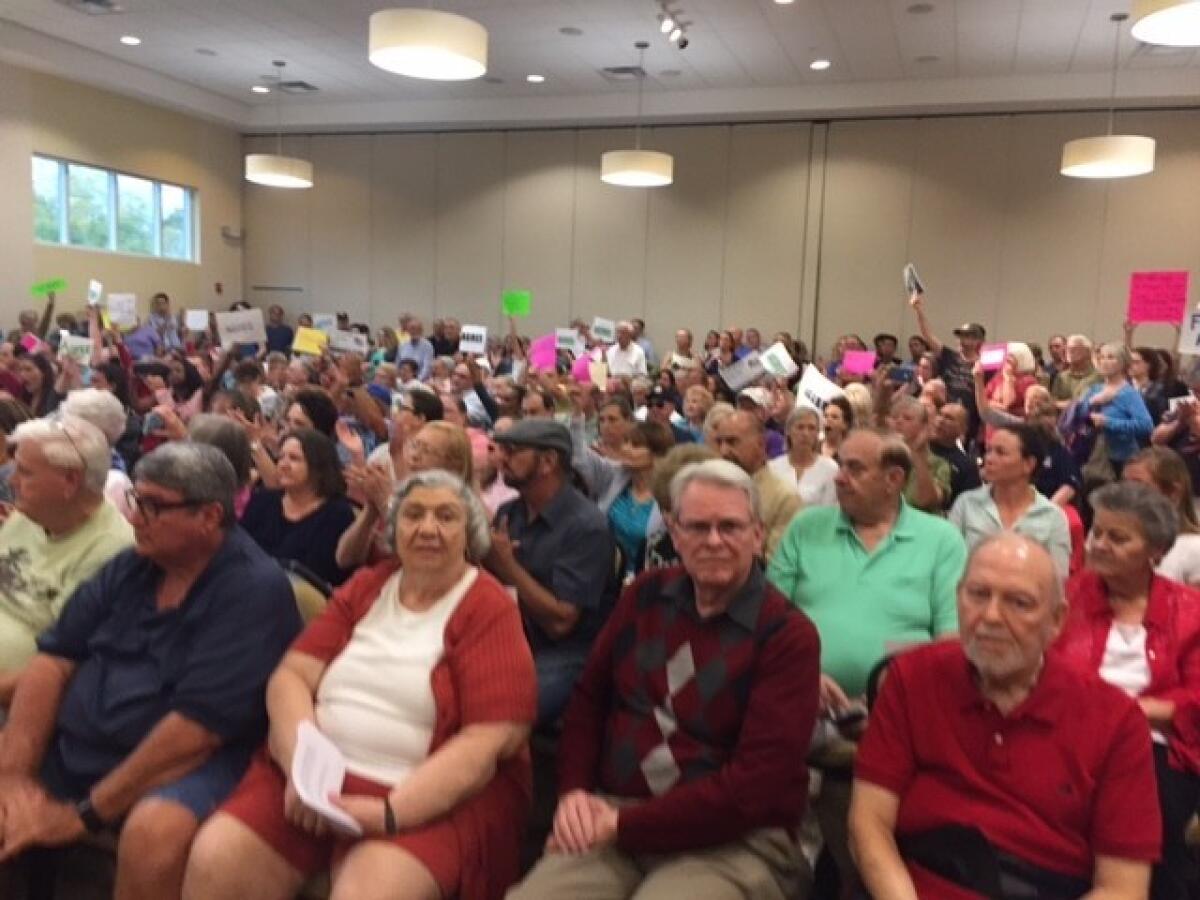
Florida Rep. Dennis A. Ross learned on Tuesday that winning an election with 58% of the vote is no indication of how the crowd will shape up at a town hall.
Appearing before about 250 people and one comfort dog, Ross dodged questions, catcalls and boos.
The Republican answered 21 questions in the 56 minutes he stood before the crowd, pacing back and forth over a large water stain that adorned the carpet at the Clermont City Center.
Most of the constituents posed adversarial questions. Three offered their support (one wished that God bless both Ross and President Trump).
The main topics had a familiar sound to them: keeping the Affordable Care Act, not cutting Social Security benefits, opposing the travel ban and protecting the environment.
Ross stuck to the party script except to say that he didn’t always condone “or defend what the president is saying or tweeting.”
Ross has been a strong supporter of President Trump and attended his rally in Melbourne, Fla., last week. He also served on Trump’s transition team.
Ross was swept into office in 2010 as part of the tea party movement.
The last question -- from a Trump critic -- had three parts: Ross was asked about the expense to taxpayers when the president spends weekends at Mar-a-Lago, the U.S.’ ties to Russia and Trump’s still unseen tax returns.
“This is the first anyone has brought that to my attention,” Ross said of the reported $10 million that it has cost to shuttle Trump between Florida and Washington three times.
The boos were hearty and long, drowning out the rest of Ross’ answer. The congressman was then hustled out the back door to the continual chant of “Do your job.”
A town hall in Savannah, Ga., tests its reputation for civility
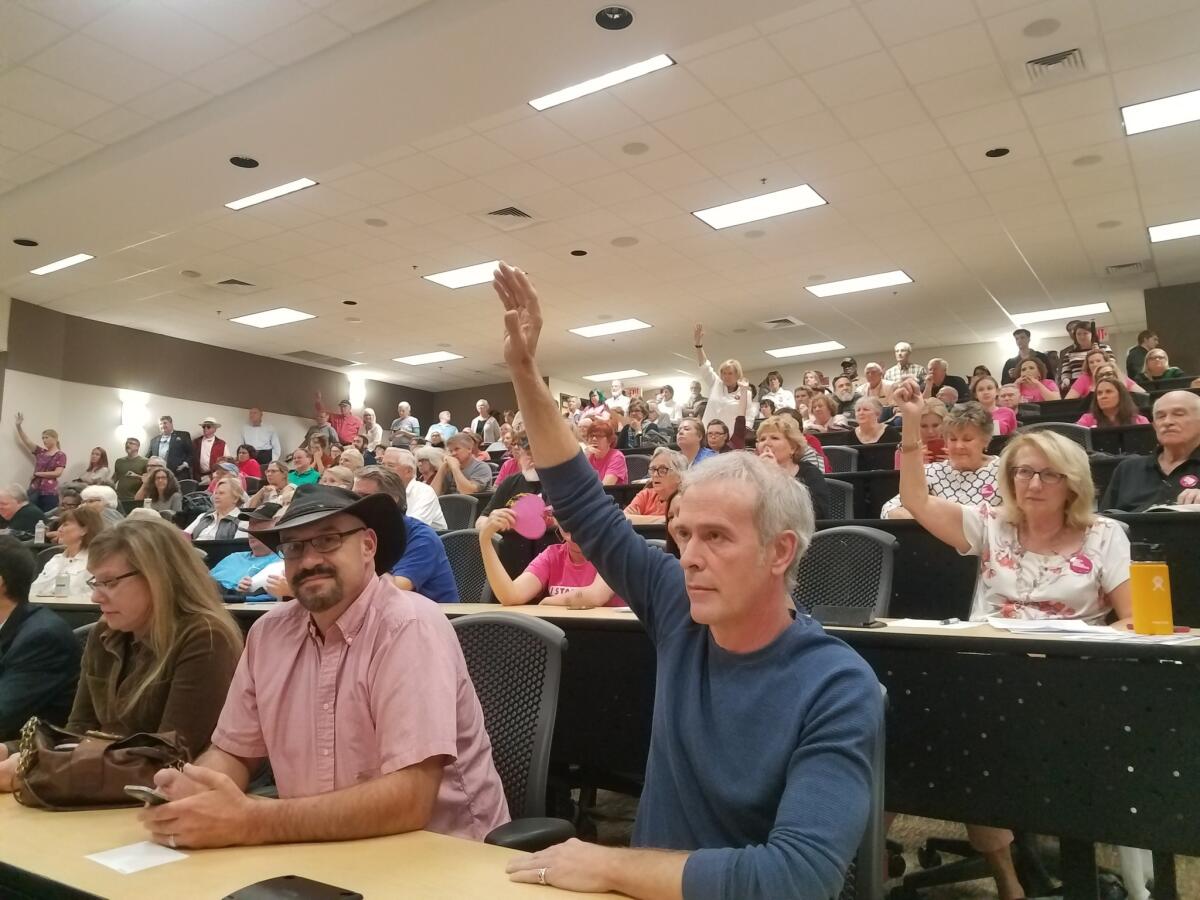
The boos began as soon as Rep. Buddy Carter, a two-term Republican representing a staunchly conservative stretch of coastal Georgia, tried to present his plans to replace the Affordable Care Act.
“You know about the promises and you know about the reality,” Carter told constituents who packed a town hall meeting in Savannah on Tuesday, noting that healthcare premiums had gone up by $4,300 for the average family. “Look, folks, Obamacare is collapsing.”
“You collapsed it!” one man in the audience shot back as the crowd roared.
More than 300 people, many wearing Planned Parenthood T-shirts and waving pink and purple paper hearts, squeezed into an auditorium at Armstrong College for the standing-room-only event. Outside, scores more chanted, “Let us in!”
Throughout, the meeting tested this traditional Southern town’s reputation for gentility, with some members of the crowd jeering and crying, “Shame on you!” while others pleaded for quiet.
“If you’ve got something to say, use your manners and raise your hand,” one Trump supporter burst out.
“Why don’t YOU raise your hand?” a man across the room hollered back.
The crowd’s concerns ran the gamut from rising sea levels and Russia’s influence in U.S. politics to abortion access, President Trump’s attacks on the news media and the teaching of religion in public schools. Some needled Carter for his support of Trump, with one man asking if he stood by a president who had not released his tax returns.
“I am not here to tell you Donald Trump is perfect,” Carter responded. “I am not going to tell you I agree with everything he has done. Those of you who have studied the Bible know that God has used imperfect people to do great things.”
Yet it was Republicans’ plan to repeal the Affordable Care Act that caused the most ire. A local owner of a small jewelry business told Carter that if the act had not been in effect when he had major abdominal surgery a few years ago, he may have had to lay off an employee.
“Look, for every story like this there are 20 stories that are just the opposite,” said Carter, a pharmacist. As Republicans developed a more affordable and accessible healthcare alternative, the new plan would be rolled out incrementally, he said. Health coverage would not be denied because of preexisting conditions, he added.
“These are divisive times,” Carter finally admitted, reminding his audience that “we live in the greatest country in the world.” But even that could not bring agreement. The meeting ended with a chorus of “No!”
Supreme Court justices appear split over whether Constitution extends to Mexican teenager shot across the border

The Supreme Court justices debated border shootings and drone strikes Tuesday in a case that could preview the legal battle over President Trump’s proposed ban on foreign travelers from certain Muslim-majority countries.
But the eight justices sounded evenly split over whether the parents of a Mexican teenager can sue the U.S. border agent who shot and killed him as he stood on the Mexican side of the border.
At issue is whether the Mexican family can invoke the Constitution’s protections against excessive force and for due process of law to restrain the conduct of the American agent, or whether U.S. law stops at the border.
What’s going on in Sweden?
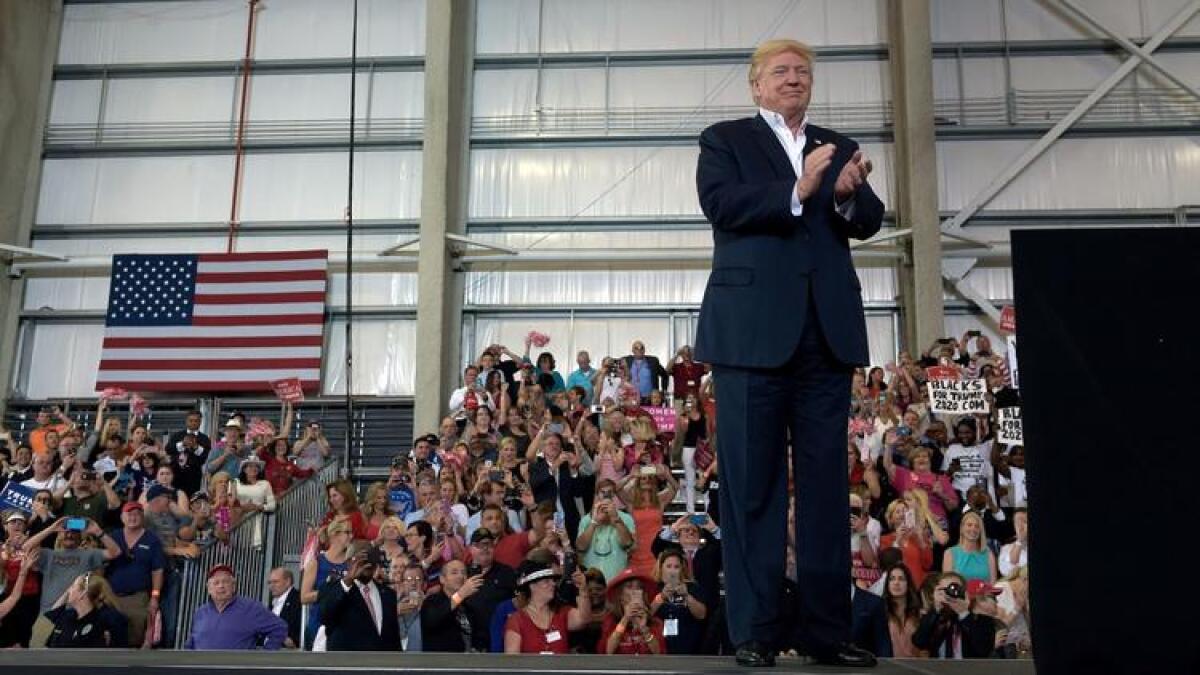
What’s going on in Sweden?
If you ask President Trump, it’s absolute chaos.
“You look at what’s happening last night in Sweden,” Trump, at a rally in Florida on Saturday, said about the Scandinavian country that has accepted large numbers of refugees. “Sweden. They took in large numbers. They’re having problems like they never thought possible.”
Actually, not much happened in Sweden on Friday night. But Monday night, riots broke out in a predominantly immigrant suburb of Stockholm, ensuring that Sweden was in for another cycle through the conservative news spin machine.
Here are some of today’s headlines:
Riots in Sweden. Cars ablaze, rocks thrown after arrest in migrant area (Fox News)
In the hours after a man was arrested for suspected drug charges, violence erupted on Monday evening in Rinkeby, a suburb of Stockholm that has experienced a large influx of refugees. No injuries were reported, yet the headline – prominently displayed on the home page -- does make it appear there was a major disturbance in the area.
The article notes that Trump had been “mocked” for his comments about Sweden days before, and goes on to cite recent crime reports on the country:
“Reports of rapes in Sweden jumped 13% in 2016 compared to the previous year, and reports of sexual assaults were up 20%, according to preliminary data from the Swedish National Council for Crime Prevention.”
There was no linkage made in that report, however, between crime statistics and the presence of refugees in the country.
Breitbart led its website with the headline Sweden: Looting, cars torched,police attacked as riots break out in migrant suburb
“Riots broke out on Monday night in the suburb of Rinkeby, where a majority of residents were born overseas, just hours after the country’s Prime Minister attacked U.S President Donald J. Trump for linking mass migration with rising violence in Sweden,” says the lede of its story, alluding to Swedish Prime Minister Stefan Löfven, who said Monday that facts matter when discussing Trump’s comments about his country.
In other conservative news:
Another Trump campaign rival is making pilgrimage to White House (Daily Caller)
President Trump regularly reminiscences about the 2016 campaign.
Now he’s making an effort to meet with former GOP adversaries.
In the past month, he’s dined with New Jersey Gov. Chris Christie and Sen. Marco Rubio (R-Fla.). This week, Trump is set to meet with Ohio Gov. John Kasich in the Oval Office.
Kasich consistently castigated Trump throughout the Republican primaries and into the general election.
He refused to endorse Trump after he secured the Republican nomination. He boycotted the Republican National Convention in July even though it was in his home state and wrote in Sen. John McCain on his absentee ballot last fall, notes the article.
Trump and the media (American Spectator)
Alas, it seems to be a daily battle.
During the general election, Trump’s prime enemies were Hillary Clinton and the media. Now it’s just the media – some of which he asserts is nothing more than “fake news.” (It is, of course, not new for presidents to battle the press, but Trump does take it to another level.)
“Trump is not wholly right about the “fakeness” of the news he delights in castigating. He is not wholly wrong either,” writes William Murchison.
The piece seeks to find common ground between the media (which often does tilt liberal) and the president.
“The major media’s liberalism — brighter, smokier than in Vietnam-Watergate days — is a problem more intense than when Vice President Spiro T. Agnew, at Richard Nixon’s bidding, lit into the media’s ‘nattering nabobs of negativism,’” he writes.
Sweeping new immigration guidelines emphasize more enforcement, deportations
Immigration enforcement officers are free to target any of the 11 million people in the U.S. illegally for removal, the Trump administration said Tuesday, a vast expansion of the federal government’s deportation priorities as the president pursues his promised crackdown on illegal immigration.
The new guidelines, in two memos issued by Homeland Security Secretary John F. Kelly, also call for the hiring of thousands more enforcement agents as the agency moves to implement President Trump’s executive order on immigration issued during his first week in office.
“All of those in violation of immigration law may be subject to immigration arrest, detention and, if found removable by final order, removal from the United States,” the department wrote on its website.
Though the guidelines emphasized that authorities should focus on convicted criminals or those charged with crimes, immigration groups reacted with alarm to what they described a radical shift in policy and enforcement tactics.
“These memos lay out a detailed blueprint for the mass deportation of 11 million undocumented immigrants in America,” said Lynn Tramonte, deputy director of America’s Voice Education Fund, an advocacy group. “These memos amount to an instruction manual for the coast-to-coast, fast-track deportation of everyone in the United States without papers, no matter how long they’ve been here, how strong their family ties, and how much they contribute.”
Under the Obama administration, officials took a far less aggressive stance on immigration, despite deporting a record number of migrants, by focusing on those who were either convicted of multiple offenses or had repeatedly entered the country illegally.
The memos did not specify how the Trump administration plans to deal with 750,000 so-called Dreamers, migrants brought to the country illegally as children and granted work permits, a key Obama administration program.
Trump has publicly wavered on whether to deport the Dreamers, and the White House has identified ways to remove them from the U.S. without Trump’s fingerprints.
The instructions also expand so-called expedited deportations, under which someone who is in the U.S. illegally is detained and thrown out without appearing before an immigration judge. Such deportations, which were limited by the Obama administration to people caught within 100 miles of the border and within two weeks of entering, now include people caught anywhere in the country within two years of arriving illegally.
In addition, the guidelines call for hiring 10,000 more immigration enforcement officers and 5,000 Border Patrol agents and for the immediate planning and building of a wall along the southern border, all of which Trump ordered earlier.
Those steps would require additional funds from Congress, and it is unclear whether Republican lawmakers will sign off on them.
Kelly’s memos also called for the expansion of a program in which local police help capture those violating immigration laws.
Homeland Security will also establish an office to assist those who are victims of crimes committed by those in the country illegally, according to the memos.
Trump administration officials said they were fulfilling the pledge of the president who promised more aggressive enforcement of immigration laws and are also reacting in response to a spike of illegal border crossings.
“A surge of illegal immigration at the southern border has overwhelmed federal agencies and resources and has created a significant national security vulnerability to the United States,” Kelly wrote in one of the memos, adding that immigration courts are experiencing “a historic backlog of removal cases.”
In October and November, the Obama administration apprehended more than 90,000 immigrants along the southern border, an increase of about 42% over the same period in 2015, according to Kelly.
Scott Pruitt tries to calm a rattled EPA workforce
Even as the newly installed Environmental Protection Agency chief sought to calm employees anxious about his longtime opposition to the agency, Scott Pruitt managed to rattle them a little more.
Concerns about the direction he will take the EPA grew with publication over the weekend of his first interview as agency chief.
During it, he suggested to the Wall Street Journal that the EPA, which has taken the lead in federal efforts to regulate greenhouse gases, may not even be equipped to be playing much of a role at all.
He left open the possibility that the agency will look for leadership on global warming from the GOP Congress, where there has been a persistent opposition to meaningful climate action and mainstream climate science.
During his first agency-wide address Tuesday, Pruitt focused on his favorite themes of federalism, the need for predictability among regulated industries and the dangers of agency overreach. But he also sought to reassure the staff by remarking repeatedly about how much he values its work.
He expressed admiration for the many employees he met during his first meetings at the headquarters who have been with the agency for decades.
“You can’t lead unless you can listen,” Pruitt said. “I seek to listen, learn and lead with you.” But he also bemoaned the “toxic” nature of modern politics.
Conservatives have accused the EPA of taking actions outside the rule of law in pursuit of a liberal environmental agenda. That’s not how many employees of the 15,000-person agency view their work over the last several years. Their relationship with the new boss is certain to be tense. Just before Pruitt was confirmed Friday, 773 former employees signed a letter urging the Senate to reject him.
On Monday, Greenwire reported that Pruitt, a frequent target of protesters, is requesting round-the-clock security protection from the Secret Service. The protests may only intensify as Pruitt sets about dismantling the last administration’s work on the environment.
“John Muir is rolling over in his grave at the notion of someone as toxic to the environment as Scott Pruitt taking over the EPA,” Sierra Club Executive Director Michael Brune said after Tuesday’s speech.
Trump, after failing to denounce anti-Semitism, calls threats to Jews ‘horrible’ and ‘painful’
President Trump, under pressure for his reluctance to address a recent spike in anti-Semitic threats, condemned them in forceful terms Tuesday during a visit to the National Museum of African American History and Culture in Washington.
Trump spoke effusively about his tour of the new African American museum on the National Mall, calling it a “meaningful reminder of why we have to fight bigotry, intolerance and hatred in all of its very ugly forms.”
He linked that lesson to bomb threats lodged against dozens of Jewish community centers around the country in recent weeks.
“The anti-Semitic threats targeting our Jewish community and community centers are horrible and are painful and a very sad reminder of the work that still must be done to root out hate and prejudice and evil,” he continued.
The comments came shortly after a tweet by his former rival, Hillary Clinton, calling on Trump to speak out.
Trump grew defensive when asked about the subject during a news conference last week, calling a question about how the government would respond “insulting” and telling an Orthodox Jewish reporter who asked it to sit down.
Trump reacted as though the allegation of anti-Semitism was directed at him, even though the reporter who asked it emphasized that it was not.
“I hate the charge,” Trump said. “I find it repulsive.”
Trump names H.R. McMaster, an Army strategist, as his new national security advisor
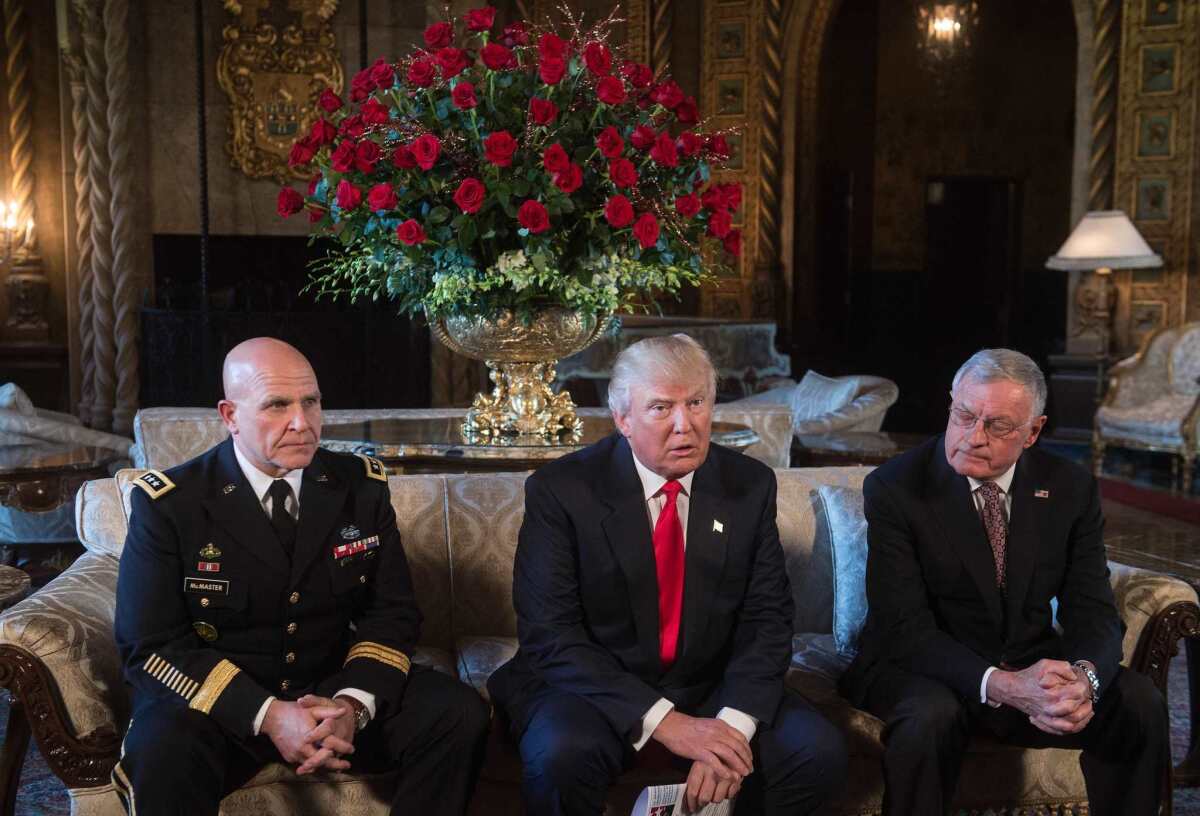
President Trump named Army Lt. Gen. H.R. McMaster as his new national security advisor Monday, replacing Michael Flynn, who was forced to resign last week.
McMaster, a career Army officer and strategist, is known as one of the military’s most prominent intellectuals.
“He is highly respected by everyone in the military, and we’re very honored to have him,” Trump said of McMaster in making the announcement while seated in the living room at Mar-a-Lago, his estate here, between a uniformed McMaster and Keith Kellogg, who had been interim national security advisor.
Kellogg will return to his previous role as chief of staff to the jobholder, now McMaster.
McMaster will take over a National Security Council that is short on staff and the subject of reports of internal turmoil. The president’s chief strategist, Stephen K. Bannon, was given a seat on the council, a highly unusual move for a political appointee.
Bannon was an architect of the temporary ban on entry into the U.S. for refugees and travelers from seven majority-Muslim countries whose ad hoc rollout sowed chaos at airports around the country before it was stopped by the courts. Trump is expected to order a revised travel ban as soon as this week.
Flynn’s ouster came after reports emerged that he had lied to Vice President Mike Pence about his discussions in December with the Russian ambassador to the U.S. about impending sanctions by the Obama administration over its conclusion that Russia had meddled in the election.
McMaster has served since July 2014 as director of the Army Capabilities Integration Center at Ft. Eustis in Virginia.
He is perhaps best known as the author of a 1997 book, “Dereliction of Duty,” that explores the military’s responsibility for U.S. failure during the Vietnam War.
“What a privilege it is to be able to continue serving our nation,” McMaster said alongside Trump. “I’m grateful to you for that opportunity, and I look forward to joining the national security team and doing everything that I can to advance and protect the interests of the American people.”
Trump also said that John R. Bolton, the former ambassador to the United Nations under President George W. Bush, who also interviewed for the job, will serve the administration in an unspecified capacity.
1:01 p.m.: The story was updated with comment from McMaster.
Pence ‘disappointed’ by Flynn but supports Trump’s handling of ouster
Vice President Mike Pence said Monday he was “disappointed” to learn he had been misled by Michael Flynn, the ousted national security advisor, but that he believed President Trump handled the situation correctly.
Pence’s comment, made during a visit to Brussels, was his first public reaction to Flynn’s forced resignation a week ago.
Before Trump took office, Pence, based on Flynn’s assurances, went on national television to assert that Flynn had not discussed U.S. sanctions with the Russian ambassador to Washington, Sergei Kislyak, in December. It emerged that Flynn had in fact done so.
“I was disappointed to learn that the facts that had been conveyed to me by Gen. Flynn were inaccurate,” the vice president said at a joint news conference with the NATO secretary-general, Jens Stoltenberg.
He added: “I fully support the president’s decision to ask for his resignation” but praised Flynn’s service to the country.
Pence was not told about the discrepancy in Flynn’s account until weeks after the White House was informed by the Justice Department that intercepts of Flynn’s conversations with the ambassador did not back up his claims.
The vice president did not directly address a reporter’s question as to whether he felt “left out of the loop” because of that time lag, and whether he had been assured by Trump’s team that something like that wouldn’t happen again.
“I’m very grateful for the close working relationship I have with the president,” Pence said. Trump’s decision, he said, “was handled properly, and in a timely way.”
The vice president was in Brussels as part of a concerted effort in recent days to calm European officials alarmed over Trump’s professed affinity for Russian President Vladimir Putin and the extent of Trump’s backing for European institutions such as the EU, which is based in Brussels.
Pence, following a meeting with European Council President Donald Tusk, expressed the “strong commitment of the United States to continued cooperation and partnership with the European Union.”
Tusk thanked him for that sentiment, but noted that “much has happened over the past month in your country,” referring to the period since Trump took office.
“Too many new and sometimes surprising opinions have been voiced over this time about our relations, and our common security, for us to pretend that everything is as it used to be,” he said.
Treason! Why the provocative accusations against Trump and his aides are unlikely to go anywhere
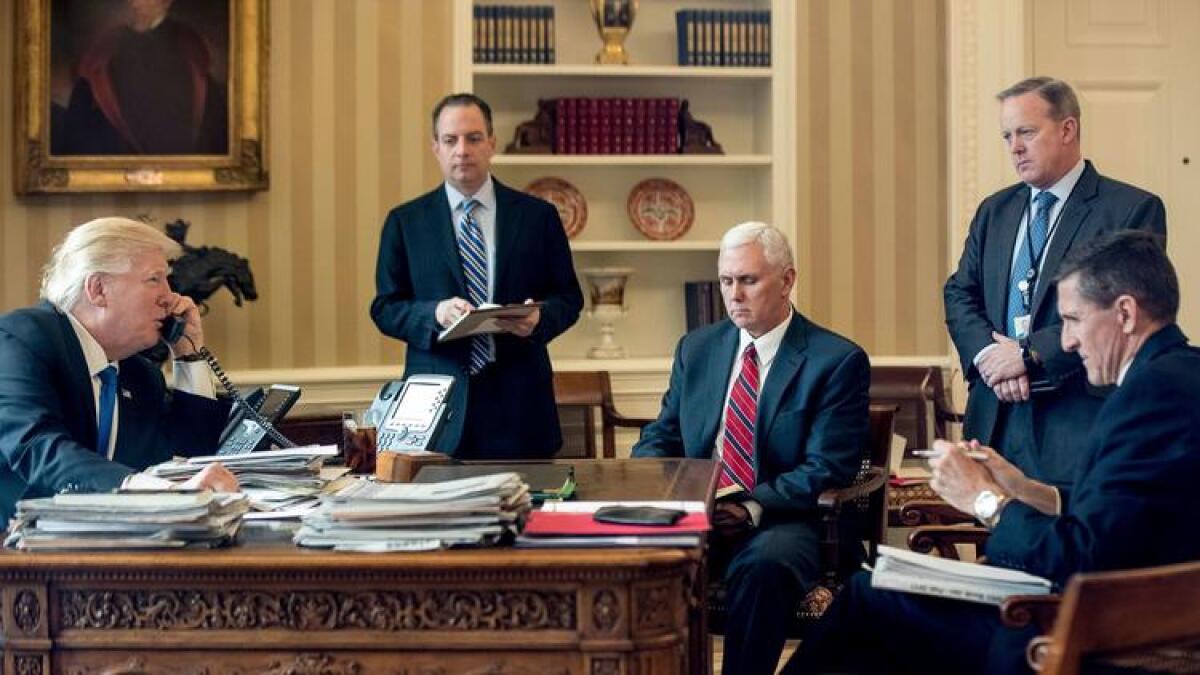
The word is hurled like a thunderbolt: Treason!
There are few more serious charges than taking up the cause of America’s enemies and colluding to undermine the country from within.
Yet that very accusation has been leveled against President Trump by some of his most fevered critics. They cite, among the particulars, the president’s evident high regard for his Russian counterpart, Vladimir Putin, and Russia’s meddling in the 2016 election, which helped Trump and badly undermined Democrat Hillary Clinton.
It’s not just left-wing celebrities like film director Michael Moore who are wielding the T-word. Rep. Seth Moulton, a Massachusetts Democrat and Iraq war veteran, used it during a CNN interview.
“If members of the administration are essentially conspiring with Russia … that’s the definition of treason,” Moulton said. “This is a very, very serious affair.”
Defense Secretary Mattis arrives in Iraq and makes clear the U.S. is not there to take oil
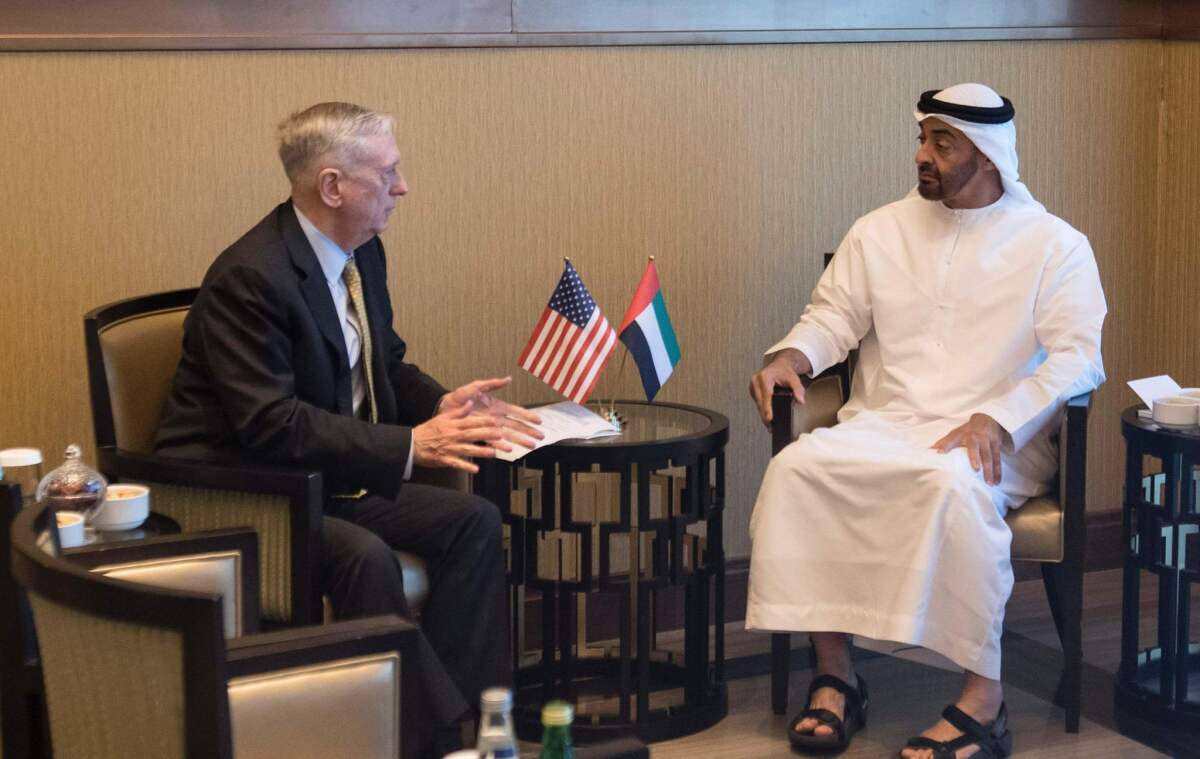
Defense Secretary James N. Mattis made an unannounced visit to Iraq’s capital on Monday to reassure allies of the U.S. military’s commitment to support the sprawling operation to recapture the city of Mosul from entrenched Islamic State militants.
Ahead of the trip, however, Mattis made clear he did not advocate President Trump’s oft-stated wish to take Iraq’s oil.
Such an undertaking would be illegal and require decades of occupation by hundreds of thousands of troops, and likely cost more money than could be earned from the oil.
“All of us … in America have generally paid for our gas and oil all along and I’m sure we will continue to do so in the future,” Mattis said. “We’re not in Iraq to seize anybody’s oil.”
Trump, as a candidate and as president, has repeatedly said that the U.S. should have “taken Iraq’s oil,” including at CIA headquarters on just one day after his inauguration last month.
“The old expression, ‘to the victor belong the spoils’ — you remember,” he said. “I always used to say, ‘Keep the oil.’ I wasn’t a fan of [the war in] Iraq. I didn’t want to go into Iraq. But I will tell you, when we were in, we got out wrong....
“If we kept the oil, you probably wouldn’t have ISIS because that’s where they made their money in the first place. So we should have kept the oil. But OK. Maybe you’ll have another chance. But the fact is, should have kept the oil,” he said, using an acronym for Islamic State, the militant group that seized oil fields in Iraq and Syria and sold their output on the black market.
Iraq’s economy is nearly entirely reliant on oil and it remains the lifeblood for Iraqi Prime Minister Haider Abadi’s fragile government as it tries to provide basic services to citizens and maintain the nation’s aging infrastructure.
Legal experts have said the U.S. seizure of Iraqi oil would have violated decades of international law, including the Geneva Conventions.
When Mattis stepped off the C-17 cargo plane Monday morning, it marked his first return to the war-torn country where he spent years in combat as a Marine Corps officer before retiring as a four-star general in 2014.
He’s set to have face-to-face talks with Abadi and other senior Iraqi government officials, whom he called “our partner in this fight” against Islamic State. Iraqi ground forces began the assault Sunday to retake Mosul, Iraq’s second-largest city.
The operation, backed by U.S. air power and special forces, is expected to take months.
“We’re going to make certain that we have good shared situational awareness of what we face as we work together, fight alongside each other to destroy ISIS,” Mattis told reporters Sunday before the trip.
Iraq is also one of seven countries named in Trump’s temporary ban on travelers that was put on hold by the courts. Trump’s ban caused anger in Iraq, where members of parliament considered retaliating by refusing to grant visas for U.S. nationals.
While the Trump administration intends to issue another version of the ban, Mattis said he was promised that it would shield the thousands of Iraqi interpreters, advisors and others who have assisted the American military in Iraq.
“Right now, I am assured that we will take steps to allow those who have fought alongside us, for example, to be allowed in to the United States,” Mattis said. “They will be vetted obviously by their performance on the battlefield beside us.”
White House denies any collusion between the Trump campaign and Russia
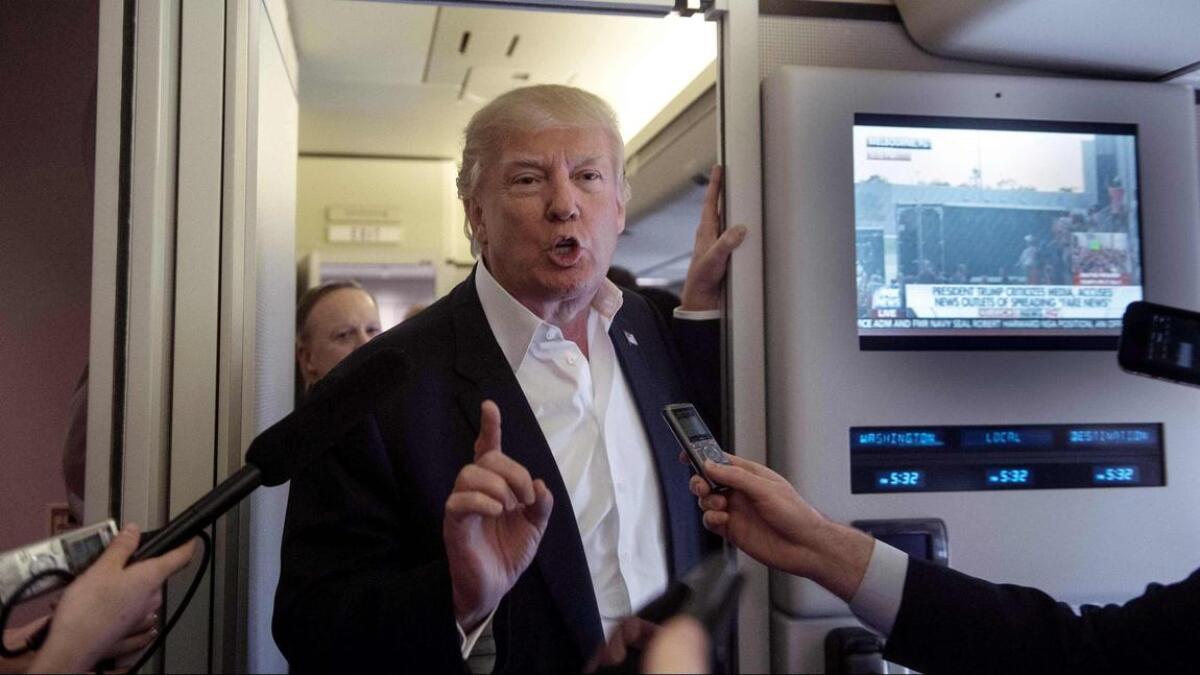
As questions deepened about ties between President Trump’s administration and Vladimir Putin’s Russia, White House Chief of Staff Reince Priebus flatly denied Sunday that the two camps colluded during the 2016 presidential campaign.
Priebus, in a series of news show interviews, also insisted that ousted national security advisor Mike Flynn had done nothing illegal in discussing sanctions against Russia with the country’s ambassador to Washington prior to Trump’s inauguration, and batted aside questions about disorder and disarray in the White House.
Priebus, who was not on Trump’s campaign, has previously said he could not speak to any involvement with Russia by campaign staff. But asked on “Fox News Sunday” whether there was collusion “between anybody involved with Trump and anybody involved with Russia” during the campaign, he replied: “No.”
He was somewhat more equivocal in a separate interview on NBC’s “Meet the Press” when asked about a New York Times article last week that alleged contacts between the Trump campaign and Russian operatives. U.S. intelligence assessments have said Russia interfered in the election with the aim of aiding Trump.
Other presidents have battled the press. But never like Trump
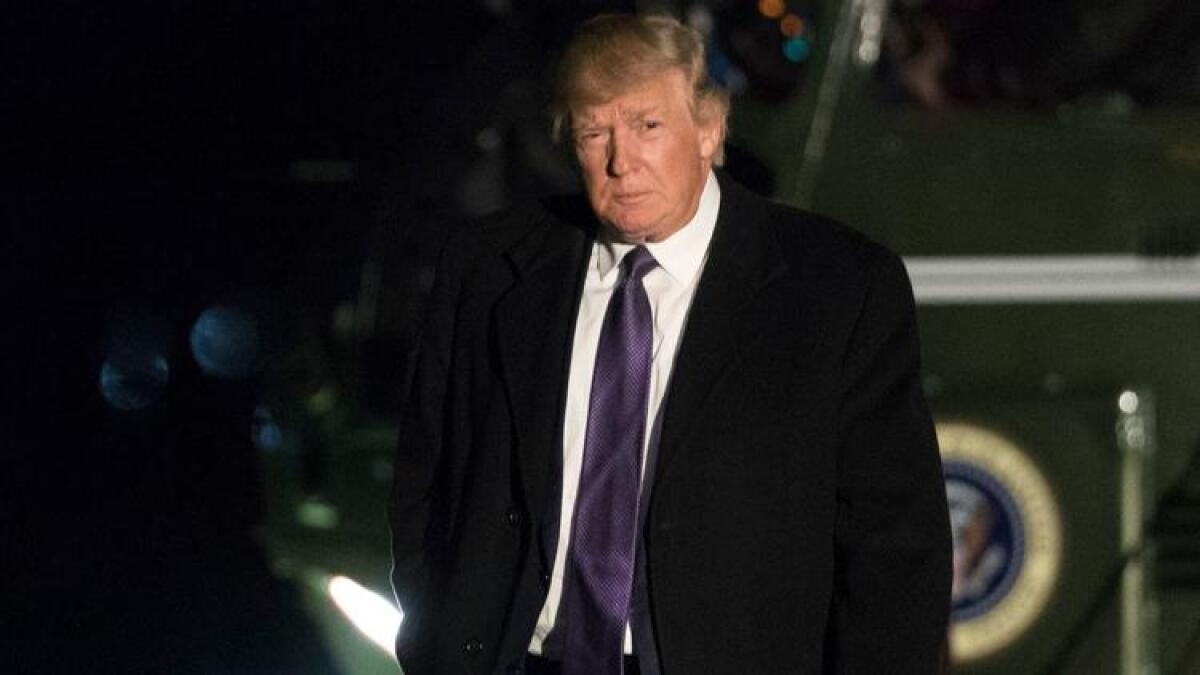
He’s not the first president to have issues with the press — Thomas Jefferson and Abraham Lincoln had complaints too — but President Trump has taken his battle with the media to new heights and made his complaints unusually public and caustic.
How that will play out is anybody’s guess, though there’s an adage about the power of journalism: Never pick fights with someone who buys ink by the barrel. That, however, was before Twitter and video made ink unnecessary for communicating with the public.
The president continued his attacks on the media at a Florida rally Saturday, saying he wanted to speak with supporters “without the filter” of the press.
“They don’t get it,” Trump said through whistles and applause from attendees inside a crammed airport hangar.
Homeland Security secretary drafts aggressive guidelines to carry out Trump’s immigration orders
The Department of Homeland Security has drafted broad new guidelines to more aggressively capture and deport people living in the country illegally, a U.S. official said, bringing President Trump’s vision of tougher immigration enforcement a step closer to reality.
The guidelines, which largely follow up on directives that Trump laid out in executive orders in his first week in office, were contained in memos signed Friday by Homeland Security Secretary John F. Kelly. The White House is reviewing the memos and may request changes, the official said.
“A surge of illegal immigration at the southern border has overwhelmed federal agencies and resources and has created a significant national security vulnerability to the United States,” Kelly wrote.
In October and November, more than 90,000 immigrants were apprehended along the southern border under Obama administration priorities for deporting people who had recently crossed into the U.S. illegally and were close to the border, an increase of about 42% over the same period in 2015, according to Kelly.
Under the proposed guidelines, Kelly wrote, the department will seek to hire 10,000 more enforcement agents and 5,000 Border Patrol officers, which Trump called for in his earlier executive orders strengthening immigration enforcement.
The department “shall immediately begin planning, design, construction and maintenance” of a wall along the southern border, Kelly wrote, underscoring another directive in the order signed by the president. Trump has repeatedly called for such a wall to help deter the flow of immigrants.
Department officials will prioritize the removal of immigrants, focusing first on those who have been convicted and charged with crimes, have committed fraud or have not complied with orders to leave the country, Kelly wrote.
“Criminal aliens have demonstrated their disregard for the rule of law and pose a threat to persons residing in the United States,” Kelly wrote.
Trump’s orders also greatly expanded the number of people who are considered priorities for deportation: up to 8 million of the 11.1 million people in the U.S. illegally.
Among them are people who haven’t been charged with a crime but are suspected of committing “acts that constitute a chargeable criminal offense.” That would include the 6 million people believed to have come into the U.S. without passing through a designated border crossing.
Kelly’s memos said the Homeland Security Department will also create an office to assist those who are victims of crimes committed by those in the country illegally, and will seek to expand partnerships with local police agencies to help nab people in the country illegally.
Defense Secretary Mattis breaks with Trump on declaring that media are ‘enemy of the American people’
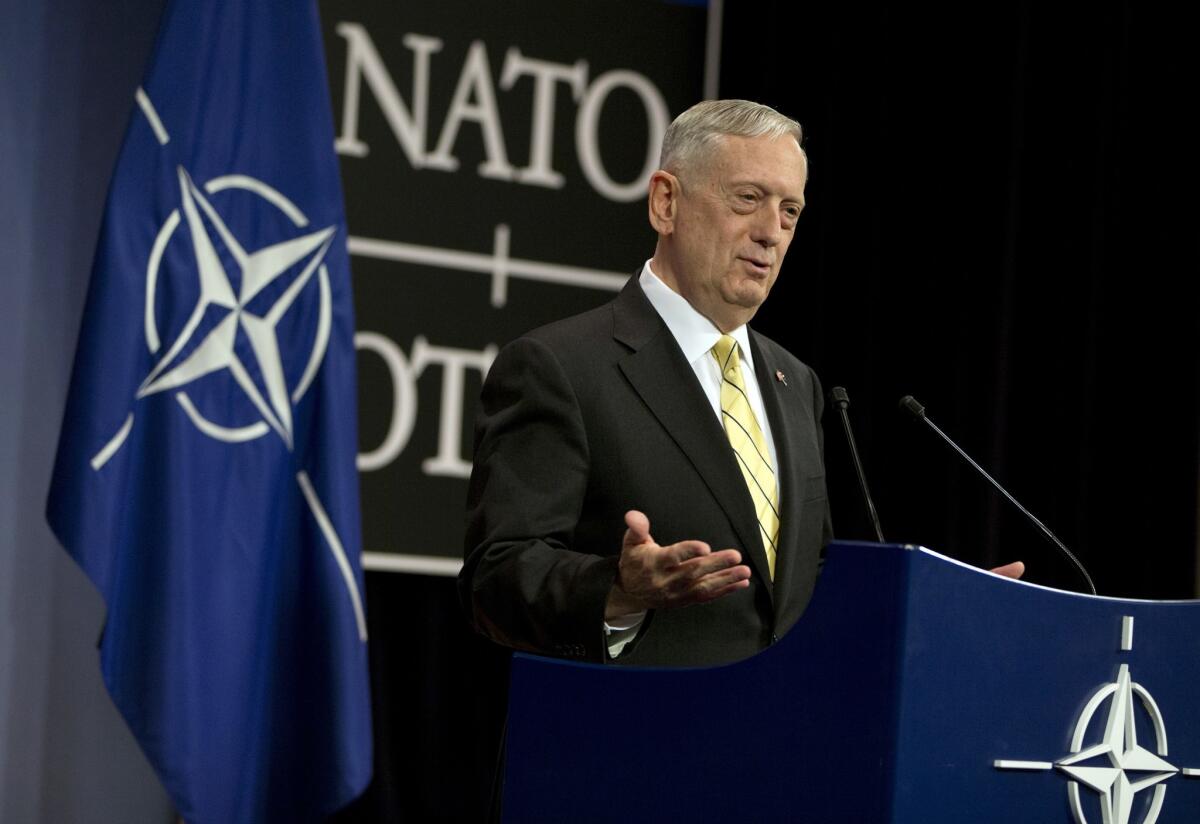
Defense Secretary James N. Mattis said Sunday that the media is not the “enemy of the American people,” refusing to align with President Trump’s startling declaration last week.
“I’ve had some rather contentious times with the press,” he said in response to a question about whether he saw the media as an enemy. “But no, the press is a constituency -- as far as I’m concerned -- that we deal with and I don’t have any issues with the press, myself.”
On Friday, Trump tweeted that the “fake news” media was an “enemy of the American people.” An initial tweet mentioning CNN, the New York Times, NBC and “many more” was deleted and reposted, expanding the list to include ABC and CBS.
Trump repeated the attack Saturday before thousands of cheering supporters in Melbourne, Fla., when he blamed the media for undermining his administration.
“I also want to speak to you without the filter of the fake news,” Trump said at the rally. “They’ve become a big part of the problem. They are part of the corrupt system.”
The fledgling Trump White House has been besieged with setbacks, including the resignation of Trump’s national security advisor, Michael Flynn, after just three weeks amid a deepening controversy over Russian interference in the U.S. government.
In response, Trump has declared a new round of battle with journalists. He called the media “fake” roughly 20 times Thursday in a rambling 77-minute news conference that also took aim at leaks from the intelligence community of classified information about Flynn’s secret talks with a Russian ambassador in December, while the Obama administration was still setting U.S. foreign policy.
Mattis insisted that the upheaval in the administration was not debilitating.
“Welcome to democracy,” he said. “It’s at times wildly contentious. It’s at times quite sporting, but the bottom line is this is the best form of government that we can come up with.”
Gen. Tony Thomas, commander of the U.S. military’s Special Operations Command, said at a military conference on Tuesday that the chaos should stop.
“Our government continues to be in unbelievable turmoil,” he said. “I hope they sort it out soon because we’re a nation at war.”
When asked about those comments, Mattis said that Thomas was “taken a bit out of context because we all want to see everything moving smoothly.”
“The military’s job is to hold the line, and to hold the line, and to hold the line, while our government sorts out the way ahead, and our people speak,” he said.
Defense Secretary James Mattis says U.S. air forces heavily involved in Mosul operation

U.S. special forces are operating near the front lines in the battle to retake western Mosul from Islamic State, but Defense Secretary James N. Mattis said Sunday during a visit to Arab allies here that there has been no change to rules of engagement regarding U.S. forces’ role in the Iraqi operation since President Trump took office.
Mattis plans to present the White House with a more aggressive plan to combat Islamic State by month’s end, but he acknowledged Sunday that U.S. airstrikes pounded Islamic State targets in western Mosul in the days ahead of the Iraqi assault, hitting militant command and control facilities.
The multinational coalition led by the U.S. has conducted more than 10,000 airstrikes against Islamic State targets in Iraq, the Pentagon said, while more than 70,000 Iraqi forces have been trained and equipped.
“The isolation phase has been going on for some time now,” Mattis said. “The attack into the city is something I don’t want to get into details about because I owe confidentiality to the troops who are actually making the attack.”
U.S. pilots say the airspace above west Mosul is thick with aircraft. At any given time, up to 50 warplanes are flying in an increasingly compressed area.
Trump basks in cheers at Florida rally and takes aim at the media
President Trump returned to campaign mode Saturday with a clear opponent in mind: the media, declaring before thousands of cheering supporters that “fake news” was undermining his nascent administration’s accomplishments.
The White House was running “so smoothly,” Trump said in an airport hangar here. He said the rally was about sharing “our incredible progress in making America great again.”
“I also want to speak to you without the filter of the fake news,” he said. “They’ve become a big part of the problem. They are part of the corrupt system.”
Here are some of the times Trump complained about a president using Air Force One to campaign
President Trump touched down Saturday in central Florida for what he has labeled a “Make America Great Again Rally,” hosted by his campaign years before the first votes are to be cast in another White House race.
Trump arrived here on Air Force One after a short flight from West Palm Beach, where he is spending a third consecutive weekend at his Mar-a-Lago estate, dubbed the “Winter White House.”
That means that while his campaign organization bears many of the costs for the event, taxpayers will be on the hook for some of the politicking, too. And it wasn’t long ago that Trump himself was complaining loudly about the same thing.
Here are just a few examples from the 2016 campaign, when President Obama was campaigning for Hillary Clinton, and earlier campaign cycles.
Homeland Security secretary: Trump is working on a streamlined travel ban
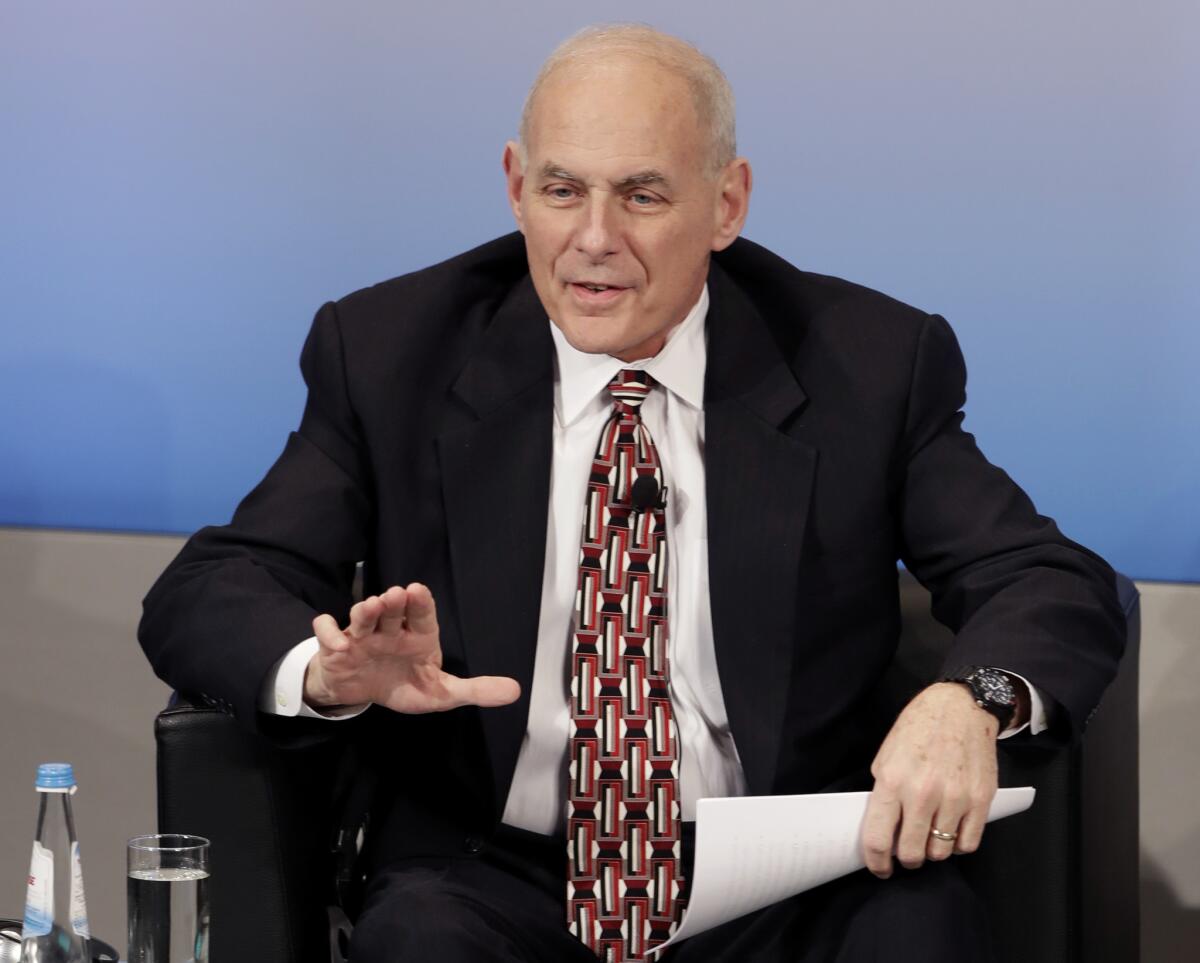
President Trump is working on a “streamlined” version of his executive order banning travel from seven predominantly Muslim nations to iron out the difficulties that landed his first order in the courts, Homeland Security Secretary John Kelly said Saturday.
Speaking at the Munich Security Conference in Germany on a panel about combating terrorism, Kelly said Trump’s original order was designed as a “temporary pause” to allow him to “see where our immigration and vetting system has gaps — and gaps it has — that could be exploited.”
He said the Trump administration was surprised when U.S. courts blocked it from implementing the executive order, and now “the president is contemplating releasing a tighter, more streamlined version” of the travel ban.
Kelly said this next time he will be able to “make sure that there’s no one caught in the system of moving from overseas to our airports.”
Asked whether that meant Trump’s new executive order would allow people with green cards and visas to come into the United States, Kelly said “it’s a good assumption.”
But he went on to say that only people with visas who were already in transit would be allowed in. For others, he said, “we will have a short phase-in period to make sure that people on the other end don’t get on airplanes.”
He did not elaborate on whether this would apply to green card holders as well.
Trump said he would isolate his family businesses, but they have already seeped into the White House
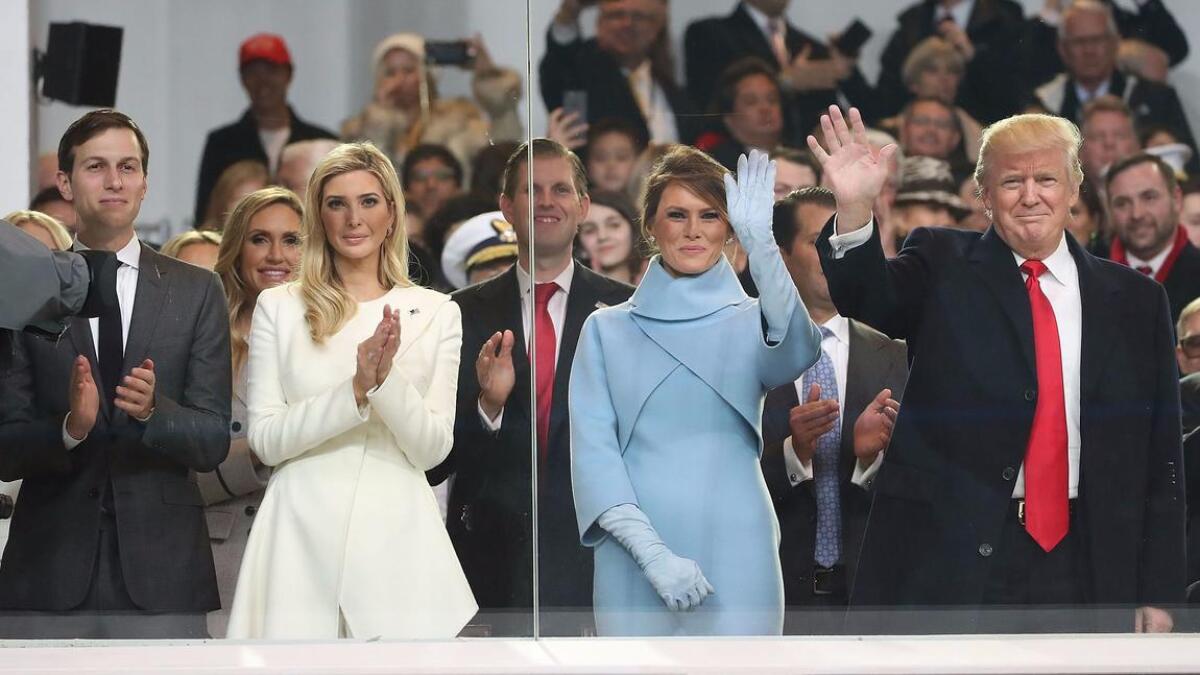
Twenty-four hours before taking the oath of office, President Trump strutted into the presidential ballroom of the Trump International Hotel to toast congressional leaders, top donors and the people he had picked to fill out his Cabinet.
Trump joked that “a total genius must have built this place,” underscoring the message: He would make little effort to separate his presidency from his identity as a business tycoon.
Less than a month in, his intentions are even clearer. The ethics firewall built by Trump’s attorneys already has failed to prevent complications from his family’s businesses from seeping into the presidency.
Trump called ‘fake news’ media an enemy of the American people. Here’s what else has made the public enemies list
President Trump tweeted Friday that the “fake news” media was an “enemy of the American people.” An initial tweet mentioning CNN, the New York Times, NBC and “many more” was deleted and reposted, expanding the list to include ABC and CBS.
Trump has had a long-standing issue with the press. While campaigning, he created a blacklist of seven news organizations that were banned from receiving media credentials. And during his first solo news conference Thursday, he called the media “fake” roughly 20 times.
But this marks the first time as president that he publicly referred to the media as an “enemy.”
Historian Michael Beschloss reminded people on Twitter that in 1972, President Nixon told Henry Kissinger on tape that “the press is the enemy, the establishment is the enemy, the professors are the enemy.” Nixon’s enemies list included several journalists and news organizations, among others.
But that list wasn’t made public until the Watergate hearings in 1973. Typically, government “enemies” are characters of a different sort.
Here are some others who’ve earned the distinction:
- Depression-era mob boss John Dillinger became the first “Public Enemy Number One” when former FBI director J. Edgar Hoover brought the term into the mainstream. Hoover’s list of public enemies also included Bonnie and Clyde and civil rights activist the Rev. Martin Luther King Jr.
- Paul Newman made Nixon’s enemies list. He was in the company of several other directors and Hollywood types, as well as politicians, social activists and members of the media.
- In 1998, President Clinton declared Osama bin Laden America’s top public enemy.
According to a Gallup poll taken last February, Americans view the United States’ main enemies as North Korea, Russia, China, Iran and countries in which Islamic State militants are operating.
Trump turns optimistic during visit to Boeing plant in South Carolina: ‘I will never, ever disappoint you’
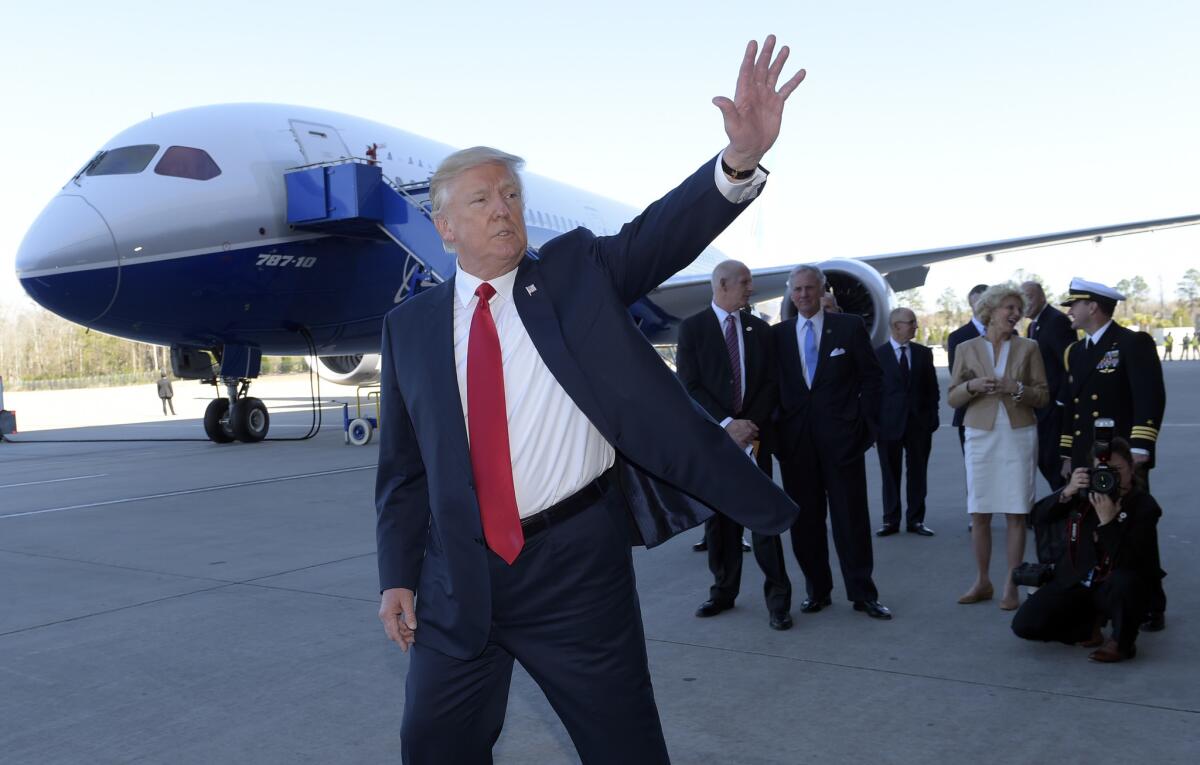
President Trump returned Friday to the themes that secured his electoral victory, praising the contributions of American workers and pledging to lead a resurgence of manufacturing across the country.
Speaking at a Boeing plant in North Charleston, S.C., with a 787 Dreamliner parked behind him, Trump said he had come to celebrate “jobs, jobs, jobs.”
“My focus has been all about jobs, and jobs is one of the primary reasons I’m standing here today as your president,” Trump said. “I will never, ever disappoint you, believe me, I will not disappoint you.”
A day after a sharply negative and often hostile news conference at the White House, Trump adopted a far more optimistic tone in South Carolina, a state he resoundingly won during the presidential primaries and in the general election.
He spoke of expanding the reach of the American dream and unleashing the “American spirit”; there was little reference to the “carnage” he discussed in his inaugural address less than a month ago or the “mess” he repeatedly cited in Thursday’s news conference.
“That’s what we do in America — we dream things and then we build them,” he said at one point, adding later: “Working together … there is nothing we cannot accomplish, no task too large, no dream too great, no goal beyond our reach.”
Much as he did in the campaign, Trump ticked off his recipe for expanding manufacturing: penalties for those taking jobs out of the country, fewer regulations, lower taxes on businesses and a fight against what he called “extreme cheating” by other countries.
“Since November, jobs have already begun to surge,” he said, taking some credit for gains made under his predecessor that Trump said derived from his election win.
“We will see more and more of that across the country.”
Trump did not mention the decision by workers at the plant on Wednesday to turn aside an organizing effort by the International Association of Machinists and Aerospace Workers.
The South Carolina operation has more than 7,500 employees and contributes to more than 100,000 jobs in the state, Boeing spokesman Gordon Johndroe said. The facility at which Trump spoke makes, assembles and installs parts of the Boeing 787’s fuselage.
The visit to the Boeing facility kicked off a weekend for Trump that will mix work and campaigning, with a rally scheduled Saturday in Melbourne, Fla.
White House officials said Friday that while at his Mar-a-Lago estate in Palm Beach, Trump may meet with new candidates for the role of national security advisor.
Trump fired his first pick, retired Gen. Mike Flynn, after it became publicly known that Flynn had misled Vice President Mike Pence about details of a phone call made to the Russian ambassador in December. His second selection, retired Vice Adm. Bob Harward, turned down the job this week.
After bruising battle, EPA nominee Scott Pruitt confirmed by Senate
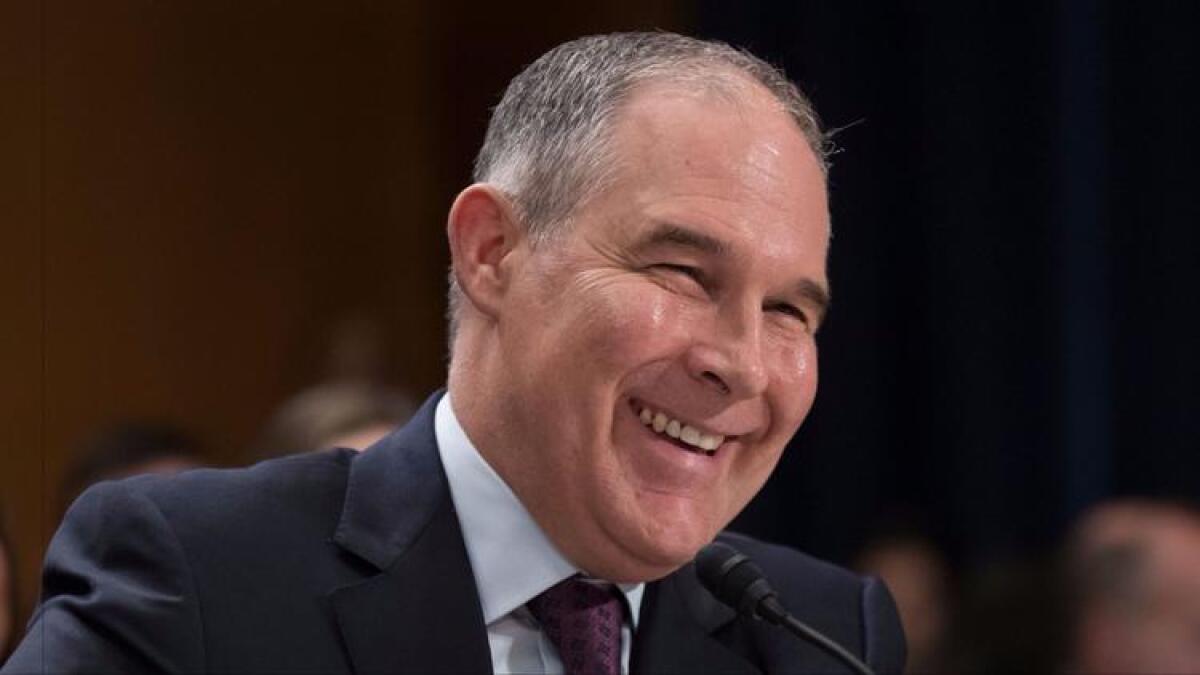
Donald Trump’s nominee to run the Environmental Protection Agency, a climate-change skeptic who for years has been been an ardent critic of the department he will now lead, got final Senate approval Friday after a prolonged assault from environmentalists.
The nomination of former Oklahoma Atty. Gen. Scott Pruitt for the post has been one of the most bitterly fought since Trump took office last month, pitting a crusader for fossil fuel interests who has sued the agency 14 times against an environmental movement that is scrambling to preserve what it can of actions President Obama took to curb climate change and protect natural resources.
Democrats held the Senate floor overnight into Friday urging colleagues to join them in opposing Pruitt — or at least to support their efforts to delay the vote. Their pleas came as a judge in Oklahoma issued an order for Pruitt to turn over thousands of email exchanges with oil and gas companies he has long kept secret. Those documents are to be made public starting Tuesday.
But Republican leaders, emboldened by the expressed support for Pruitt by two politically vulnerable Senate Democrats from coal country, would not delay the vote, which was 52-46.
Here’s why the 2018 Senate election will be crucial for President Trump and his Democratic foes
In the partisan battle zone that is Washington, D.C., there is one conquest that could turn the fight decisively in Republicans’ favor: winning 60 seats in the U.S. Senate.
With control of the House, a filibuster-proof Senate majority could empower President Trump and his congressional allies to push through legislation and approve high-level appointees, such as Supreme Court nominees, with Democrats in the minority powerless to stop them.
That is why the 2018 midterm election is shaping up as crucial for Trump and congressional Republicans, as well as Democrats fighting to protect President Obama’s legacy and hold the line on further GOP advances.
After Democrats netted two seats in the Senate last year, Republicans hold a 52-48 majority, meaning the GOP would need a gain of eight seats to reach a filibuster-proof margin.
(That assumes party lawmakers stick together and vote as a bloc, which is never a certainty, as demonstrated by the withdrawal Wednesday of Trump’s nominee to head the Labor Department, Andrew Puzder, in the face of Republican opposition.)
So what are the odds?
McConnell says he’s ‘very sympathetic’ to ‘Dreamers’ as Trump weighs what to do with young immigrants
As President Trump wrestles over what to do with young immigrants in the U.S. illegally, the “Dreamers” may have found an ally in the Senate GOP leader, who acknowledged a soft spot Friday for them.
“I’m very sympathetic with this situation,” Senate Majority Leader Mitch McConnell (R-Ky.) told reporters.
“These are young people who were brought here at a tender age and who have grown up here or are in the process of growing up here,” said McConnell, whose wife, Transportation Secretary Elaine Chao, immigrated to the U.S. as a child.
“I’m anxious to see what the president decides to do,” McConnell said.
A day earlier, the president openly expressed the personal and political dilemma he faces in fulfilling his campaign promise to take a hard line against illegal immigration.
On the one hand, Trump faces pressure from anti-immigration advocates to keep his pledge to undo President Obama’s executive Deferred Action for Childhood Arrivals program and step up deportations on those in the country illegally.
But more than 700,000 young people who were brought to the U.S. illegally as children are now being temporarily protected from deportation under Obama’s program and given work permits. Stories abound of their lives in the U.S. — many have scant memory of their home countries — and they are now attending school, serving in the military and working.
Senior Trump aides have identified at least two ways for the administration to quietly end the program, shielding the president from blowback through administrative and legal actions.
It is unclear whether Trump will take those steps or allow the program to continue.
Analysis: Trump leaves the White House bubble and shifts to campaign mode, hoping for momentum
As his month-old administration struggles to make good on its promises, President Trump is seeking momentum by using some of the tactics that propelled his candidacy from its beginnings.
On Thursday, he held a free-for-all news conference in which he sparred with reporters and defended his short tenure for almost 80 minutes. On Saturday, Trump will hold a rally in Florida — paid for by his campaign committee, White House officials say.
With both the news conference and the rally, Trump is trying to magnify one of the chief advantages of any president, and particularly one who came into office as a celebrity: his ability to burst out of the presidential bubble and speak uninterrupted to his sea of dedicated supporters.
The sudden change of pace acknowledges the central truth of his campaign and his presidency: Despite the layers of support that envelop any president, Trump is most visibly comfortable when he’s the one selling himself.
Republicans in Congress gambled on Trump and won. Here’s why they’re worried now
The relationship between President Trump and GOP leaders in Congress started as a marriage of convenience, thrown together by necessity and sustained on the promise of pushing a Republican agenda into law.
Until recently, House Speaker Paul D. Ryan (R-Wis.) and Senate Majority Leader Mitch McConnell (R-Ky.) tolerated Trump’s turbulent debut because they agreed with the direction the White House was heading — or were confident they could nudge it in the desired one.
Many Republicans backed Trump’s travel ban, despite the rocky rollout. They support upending Obama-era regulations and raved about Trump’s Supreme Court nominee.
“For most of us, there has been such a yearning ... to get something done, even if they don’t agree with the tactic, they applaud the result,” said Rep. Mark Meadows (R-N.C.), chairman of the conservative House Freedom Caucus.
But the newfound partnership is showing signs of serious strain. Growing discomfort about the Trump team’s ties to Russia, daily dramas at the White House and the increasing unrest at town hall meetings with constituents back home have prompted second thoughts about the alliance.
As the first 100 days tick away, and rank-and-file Republicans head home for a weeklong recess, there is a growing worry that Congress will face a drip-drip-drip of new revelations about the Trump White House that will overshadow the rest of the Republican agenda, such as repealing Obamacare, enacting tax reform and cutting government spending.
“That’s what the fear is,” said one Republican senator, granted anonymity to frankly discuss the outlook. “It’s not a good situation. You can’t let this go and not look at it.”
President Trump looks to the past and President Obama
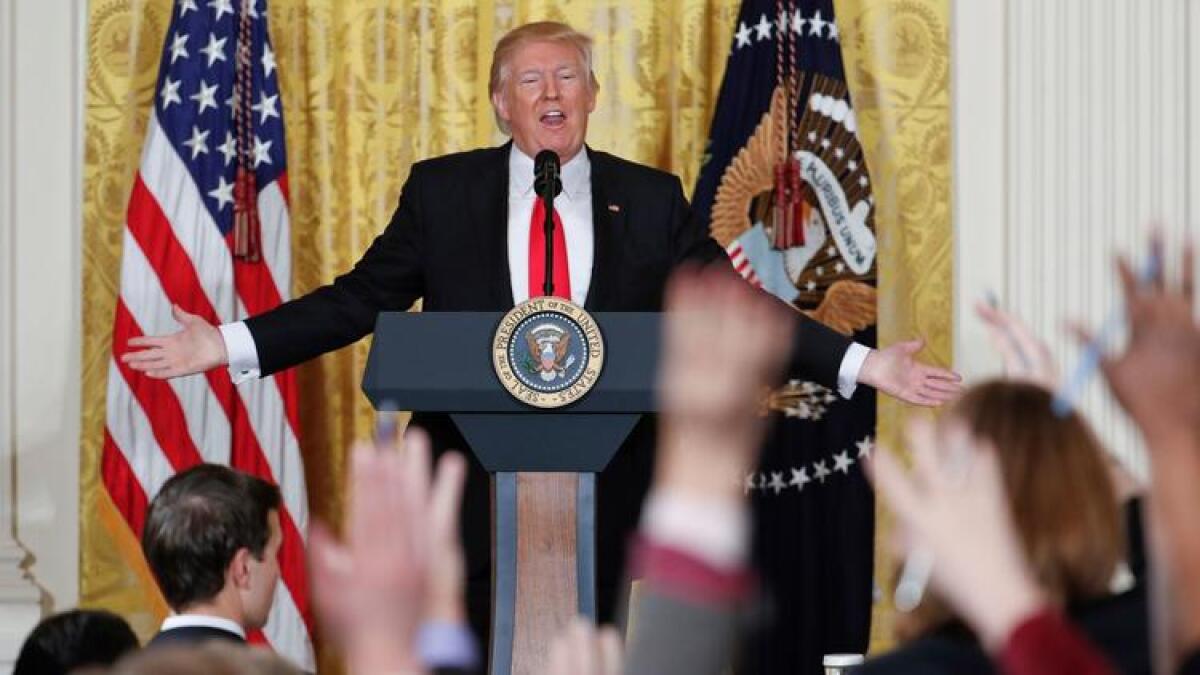
President Trump is pointing fingers at President Obama.
From insisting he inherited a “mess,” to blaming lingering Obama administration officials for government leaks, Trump is not hesitant to cast blame on the former president.
“To be honest, I inherited a mess. It’s a mess. At home and abroad,” Trump said during his 77-minute, freewheeling press conference on Thursday.
Trump’s been in the White House four weeks, yet he still appears intent on harping on the past – and he has some help.
Here are some of today’s headlines in the conservative media:
WHODUNIT? Trump launches bid to find leakers, as speculation surrounds Obama officials (Fox News)
Leaks. Leaks. And more leaks.
Trump insists that former Obama administration officials are behind the leaks that reveal his aides and associates made repeated contact with senior Russian officials during the 2016 campaign.
But who?
This piece cites unnamed intelligence officials who suspect the leaks could be spearheaded by, among others, former CIA Director John Brennan and former Director of National Intelligence James Clapper. Both men served in the Obama administration.
Comparing Donald Trump and Barack Obama’s first press conferences (Daily Caller)
The press conferences were stark contrasts.
Trump’s was much more wide-ranging than Obama’s on Feb. 9, 2009.
Among the specific differences: Trump spent a lot of time bashing the media; Obama was bashing Congress.
“Obama pushed his $800 billion in economic stimulus on Americans and accused Republicans of ‘playing politics,’ the Caller notes, quoting the president: “I can’t afford to see Congress play the usual political games.”
Both blamed their predecessors for the problems they had to deal with, the piece notes. While Trump said he inherited “a mess, at home and abroad, a mess,” Obama also claimed to be facing a big mop-up operation.
“My administration inherited a deficit of over $1 trillion, [and we also]...inherited the most profound economic emergency since the Great Depression,” he said.
That’s entertainment! Trump’s 75-minute tour de force (American Spectator)
People on both sides of the aisle agree: Trump’s press conferences are entertaining, and the right side of the aisle thinks they’re especially fun.
“Donald Trump, giving press conferences as president, is like a cross between Fidel Castro’s long-windedness and machismo and Christopher Walken’s theatrical presence — and nobody else in the room can compete with that,” writes Scott McKay. “It was a freewheeling, wide-open, raucous barroom brawl of a presser, with Trump taking on every questioner with swagger and New York moxie.”
Here’s what a 1951 college football game can tell us about voter attitudes toward President Trump
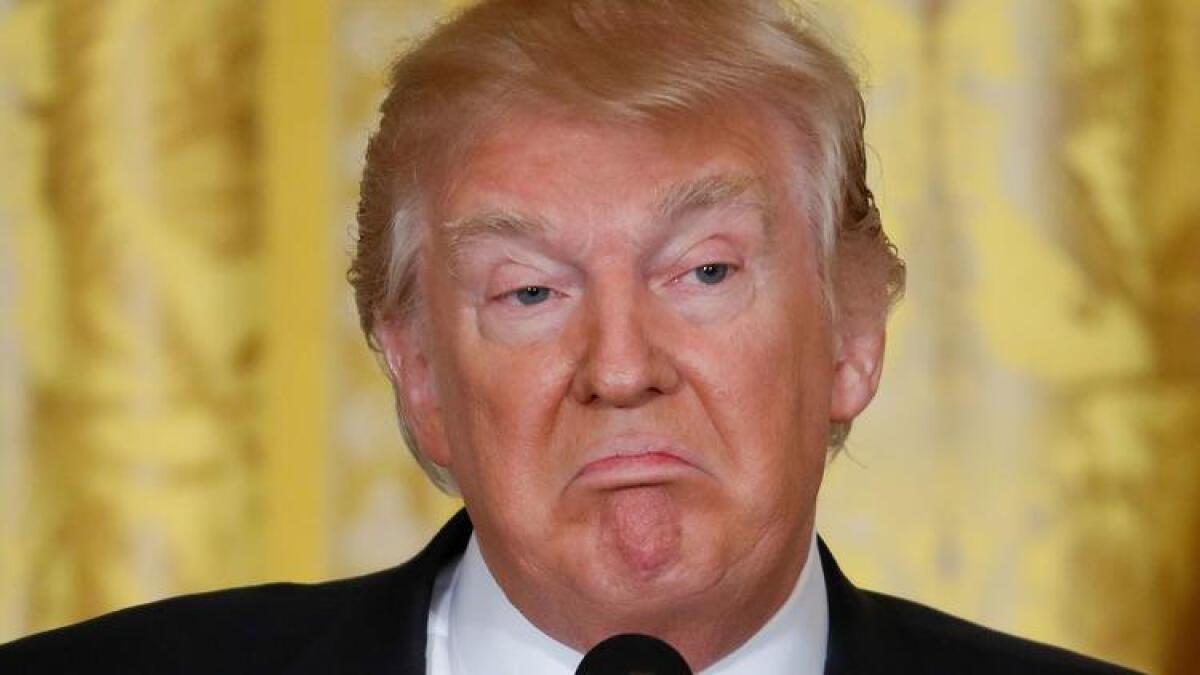
In November 1951, the Dartmouth and Princeton football teams played a season-ending game that resulted in a seminal work on the nature of human cognition.
Princeton won the contest, to finish the season undefeated. Of more lasting consequence, though, was the research that followed — a psychological case study that provides a helpful overlay for today’s politics.
The game was exceedingly violent, with broken bones and a flurry of penalty flags. Subsequent news accounts stoked the controversy, with fans from each side blaming the other for the mayhem.
Intrigued, a pair of researchers undertook an experiment in which students at the Ivy League colleges filled out questionnaires gauging their reactions to the game. The students were shown film clips of the action and asked to mark instances hey considered “mild” or “flagrant” violations of the rules.
The result was that Princeton students saw the Dartmouth team commit twice as many infractions as Dartmouth students professed to see.
Even though students watched the exact same clips, perceptions were vastly different based on their rooting interest.
White House denies report that Trump is considering mobilizing the National Guard for immigration enforcement
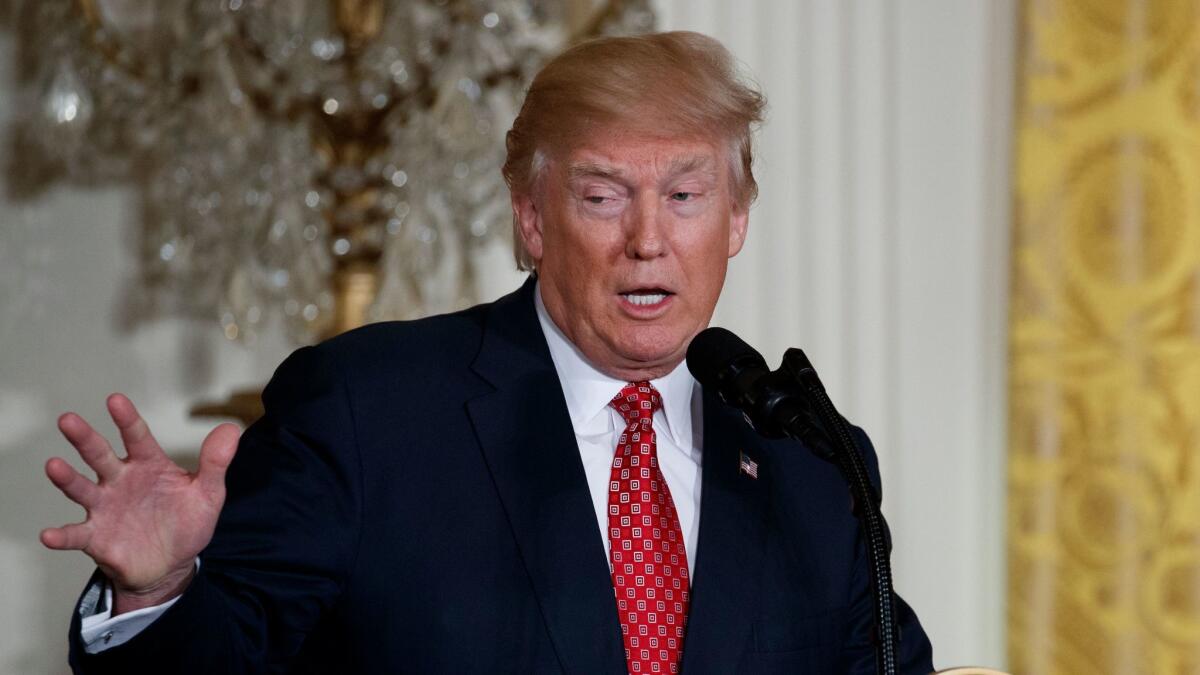
The White House flatly denied an Associated Press report Friday that as many as 100,000 National Guard troops could be mobilized to make immigration arrests.
An 11-page memo obtained by the news wire calls for the potential deployment in 11 states, including California and others that border Mexico, as part of a plan to implement President Trump’s Jan. 25 executive order directing federal agencies to “employ all lawful means to enforce the immigration laws of the United States.”
White House Press Secretary Sean Spicer dismissed the report to reporters on Air Force One, as the president was preparing to travel to South Carolina.
“That is 100% not true. It is false. It is irresponsible to be saying this,” he said. “There is no effort at all to round up, to utilize the National Guard to round up illegal immigrants.”
The draft memo was written by Homeland Security Secretary John Kelly, the AP reported, and would give governors of those states the choice of whether to deploy their National Guard troops in the initiative.
In the Trump administration’s first months, such drafts outlining potential administration actions have often become public. In some cases the leaked information largely reflected executive actions the president ultimately signed, but in others were not — or at least not yet — steps the administration took.
Immigration and Customs Enforcement officials told members of Congress on Thursday that while the agency could round up 11-million people under the president’s order, they “did not have the resources,” Rep. Michelle Lujan Grisham (D-N.M.), chairwoman of the Congressional Hispanic Caucus, said afterward.
“That’s pretty chilling,” she said.
Times staff writer Lisa Mascaro contributed to this report.
8:54 a.m.: This story was updated with more comment from Spicer and comment from a congresswoman.
Trump weighs mobilizing 100,000 National Guard troops for immigration roundups
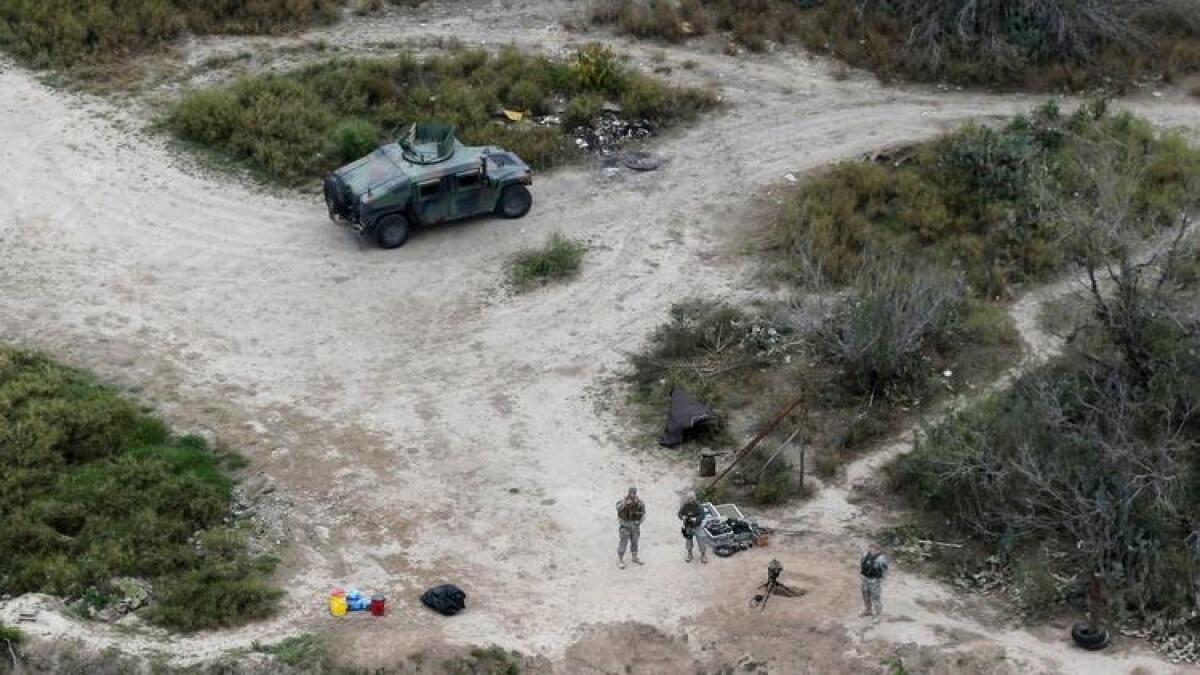
A draft memo obtained by the Associated Press outlines a Trump administration proposal under consideration to mobilize as many as 100,000 National Guard troops to round up immigrants in the U.S. illegally. Millions of those who would be affected in 11 states live nowhere near the Mexico border.
The 11-page document calls for the unprecedented militarization of immigration enforcement as far north as Portland, Ore., and as far east as New Orleans. If the proposal is implemented, governors in the affected states would have final approval on whether troops under their control participate.
Travel ban, ‘very fake news,’ Cabinet picks: Here’s the transcript from President Trump’s news conference
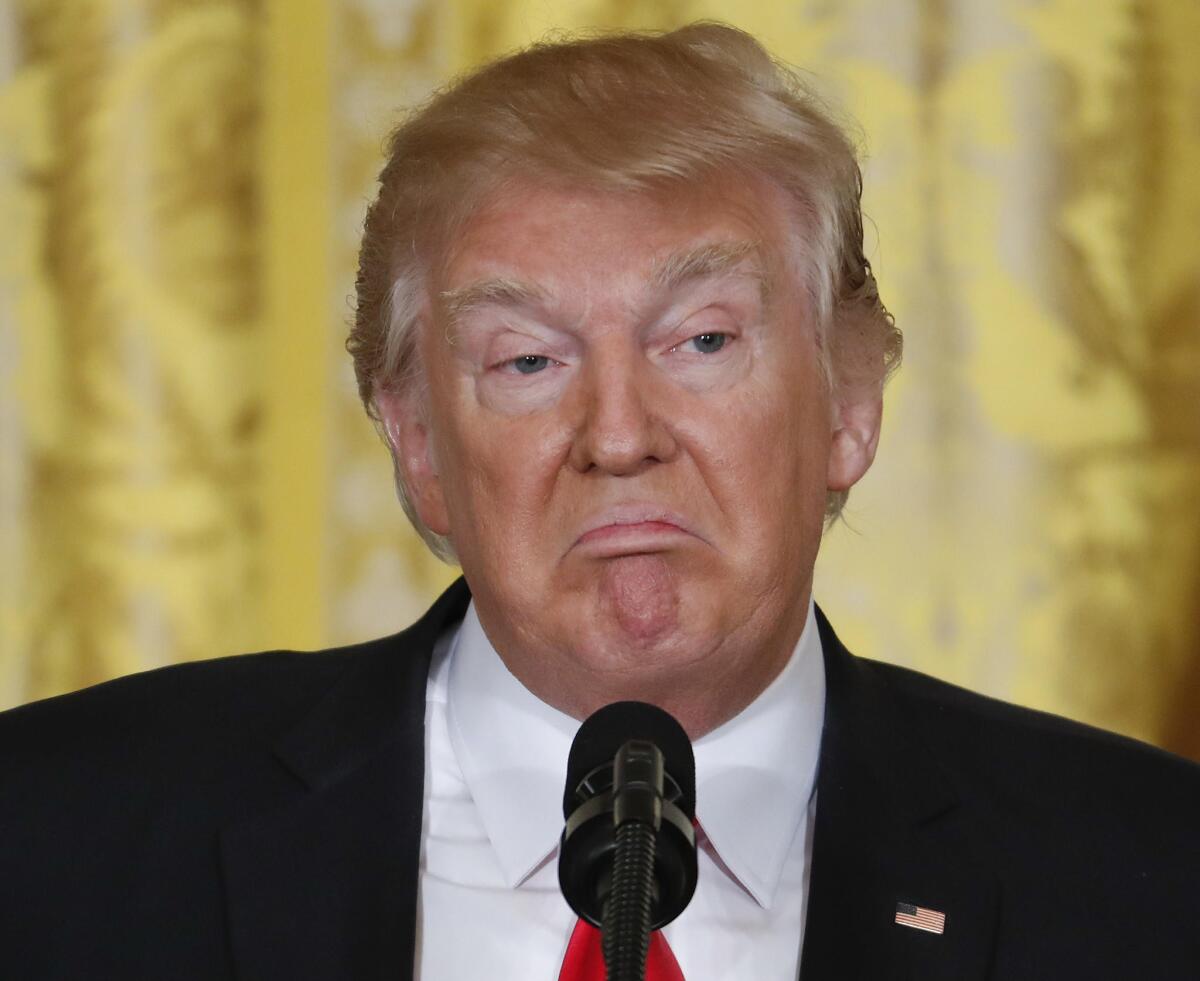
President Trump appeared Thursday at a news conference to announce his replacement choice for Labor secretary. Trump went on to address a wide range of topics, including Russia, his plans for a new executive order on a travel ban, “fake news,” leaks, his electoral victory, his wife, Melania, and daughter Ivanka, and more.
Here is a transcript of those remarks, as prepared by CQ/Roll Call:
Moments from Trump’s news conference that stood out
On his 28th day in office, President Trump held his first solo news conference. It lasted about 90 minutes and left viewers with a number of moments that were, well, out of the norm for presidential briefings. But, of course, those norms were set before Trump was elected president. The appearance proved a return to his freewheeling style on the campaign trail.
Here are some of the moments that stand out when it comes to topic or delivery:
“I guess it was the biggest electoral college win since Ronald Reagan.”
Trump won the election. He is, after all, president. Still, months after the results were final, he still routinely brings up and misstates the size of his win in the electoral college. In this exchange, a reporter points out that former President Obama won more electoral votes than Trump (Obama had 332 in 2012; Trump had 302). Oh, and George H.W. Bush had 426 electoral votes when he beat Michael Dukakis in 1988.
Appeals court says it is suspending further action on Trump travel ban
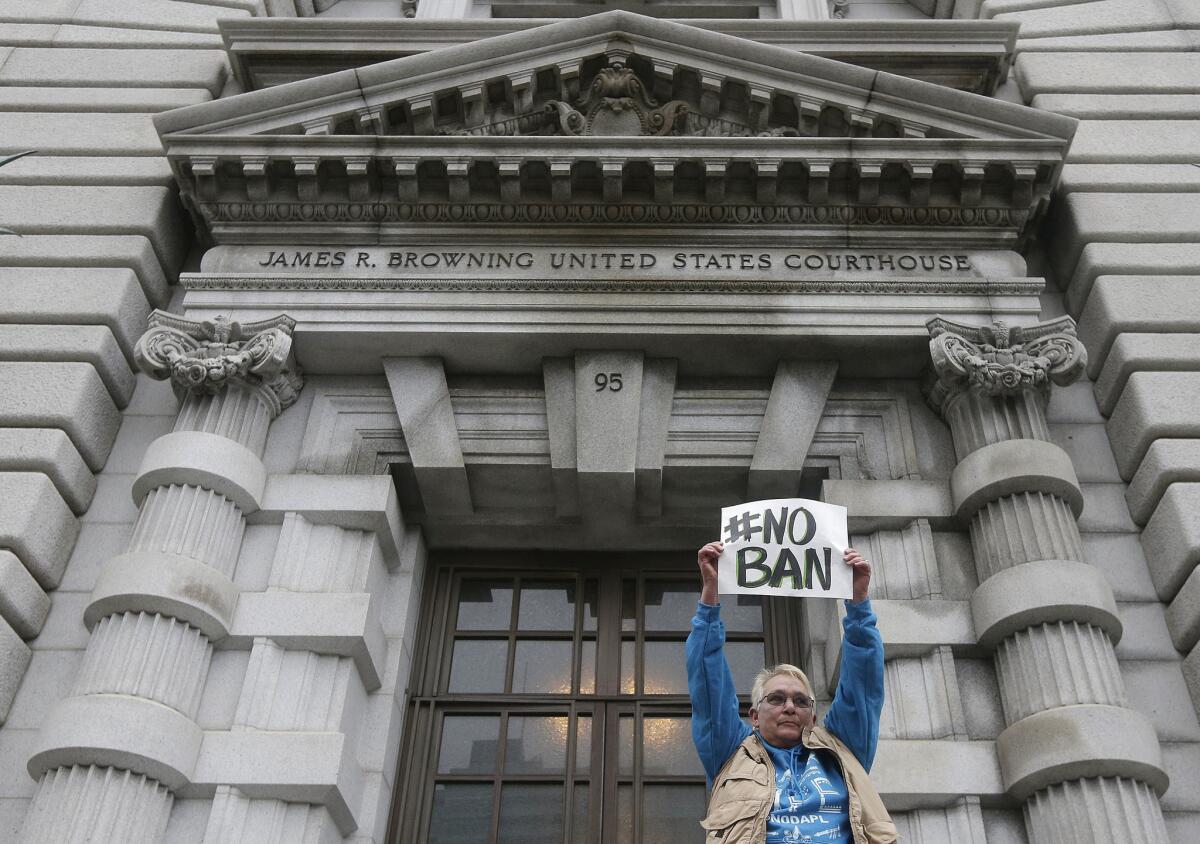
A federal appeals court decided late Thursday to take no further action on President Trump’s travel ban while the administration prepares new, more limited restrictions designed to address legal objections.
In a brief order, the U.S. 9th Circuit Court of Appeals said a vote on whether to reconsider the court’s Feb. 9 decision to continue blocking the ban would not be held pending further action from the Trump administration.
Trump announced Thursday that his administration would not appeal the earlier decision. Instead, he said his administration planned to unveil a new executive order designed to limit the ability of people who might be associated with terrorism to enter the United States.
The ban blocked by the 9th Circuit prevented citizens from seven predominantly Muslim countries from entering the U.S. for three months, leading to the cancelation of at least 60,000 visas.
A federal judge in Seattle earlier this month issued a temporary restraining order nationwide against enforcement of the ban in response to a suit brought by the states of Washington and Minnesota. The government appealed to the 9th Circuit.
A three-judge panel of two Democratic appointees and one appointed by a Republican unanimously agreed that the ban was likely to violate constitutional guarantees of due process.
Following that decision, an unidentified 9th Circuit judge asked that an 11-judge panel be convened to review the ruling.
But in an order late Thursday, the court said that in light of the upcoming new executive order, it would pause its proceedings “pending further order of this court.”
Vice admiral turns down national security job
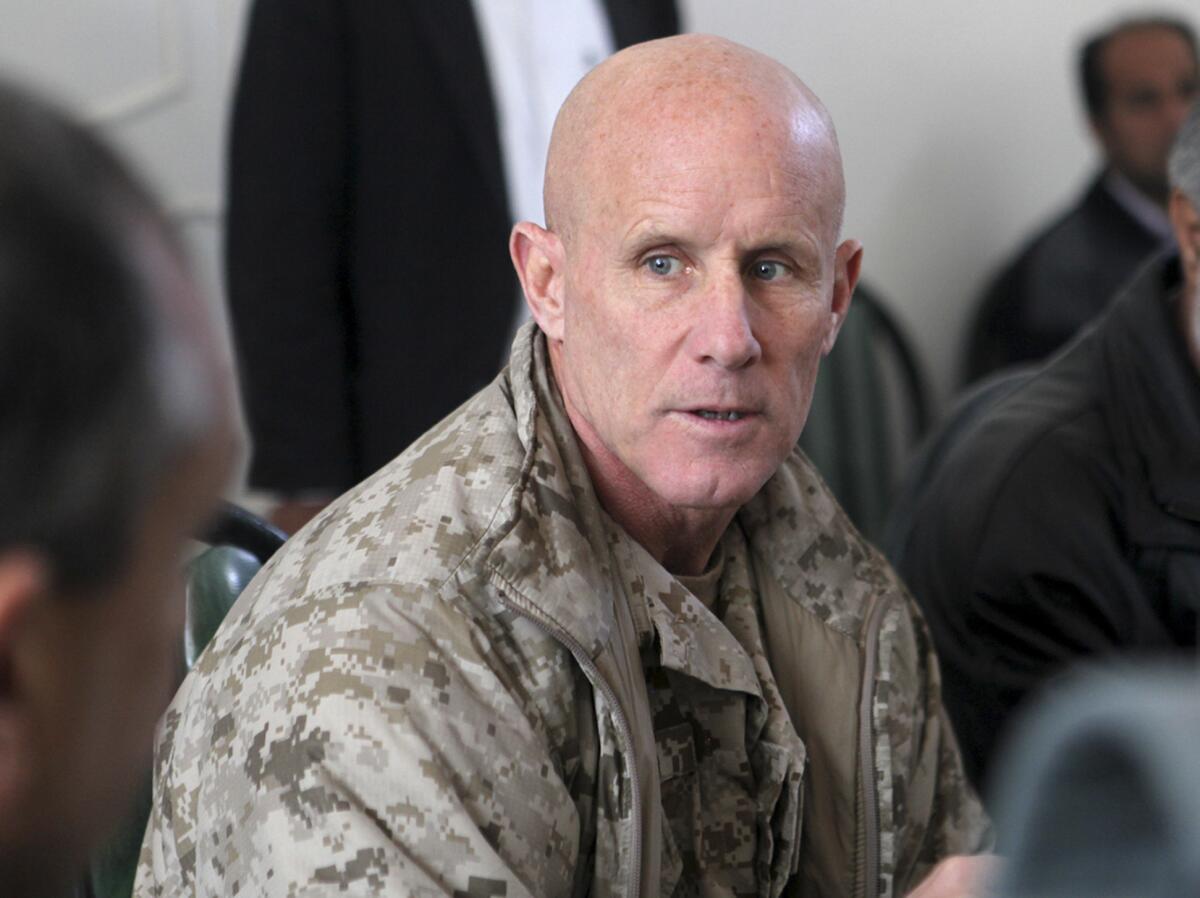
Navy Vice Adm. Robert Harward has turned down an offer to be President Trump’s new national security advisor.
A senior White House official said that Harward turned down the offer because of financial and family commitments.
The official spoke anonymously because Harward’s decision had not been publicly announced.
Harward would have replaced retired Gen. Michael Flynn, who resigned at Trump’s request Monday after revelations that he misled Vice President Mike Pence about discussions he held with a Russian diplomat.
Officials said this week that there were two other contenders: acting national security advisor Keith Kellogg and retired Gen. David H. Petraeus.
Trump’s silence on a documented rise in episodes of anti-Semitism is ‘mind-boggling,’ group says
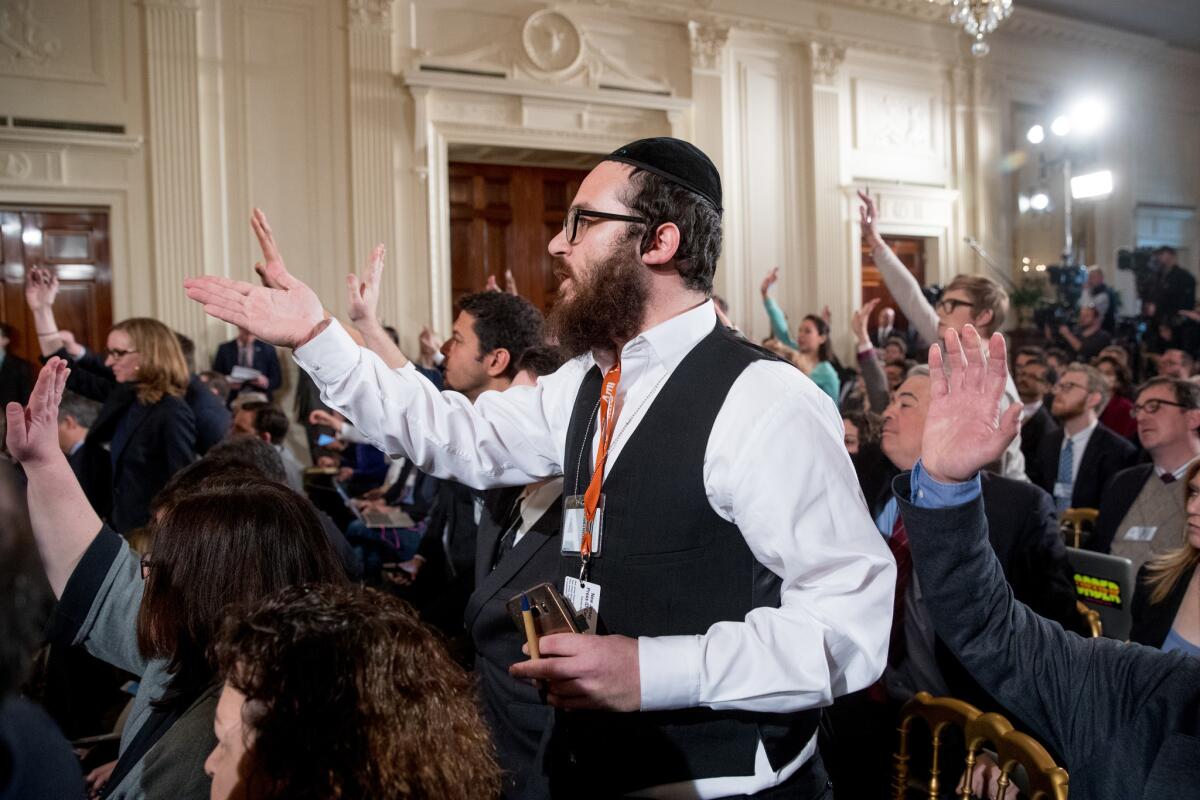
For a second straight day, President Trump refused to directly address questions Thursday about a documented rise in anti-Semitic episodes in the United States, prompting renewed concern from prominent Jewish groups.
A day earlier, he sidestepped a query from an Israeli reporter on the issue by touting his margin of victory in the electoral college and his Jewish grandchildren. On Thursday, the president labeled a reporter’s attempt to revisit the issue as “insulting.”
“Here’s the story, folks. Number one, I am the least anti-Semitic person that you’ve ever seen in your entire life,” he said at a news conference. “Number two, racism, the least racist person.”
Trump then ordered the reporter, Jake Turx of Ami Magazine, to “sit down.”
When a second reporter tried to press Trump on the issue, the president claimed, without evidence, that any anti-Semitic behavior was the work of his political opponents.
“It won’t be my people. It will be the people on the other side to anger people like you,” he said.
The Anti-Defamation League has monitored a surge in racist and anti-Semitic graffiti and vandalism since Trump’s election, including the use of Nazi imagery. Forty-eight Jewish Community Centers reported bomb threats in January, according to CNN.
“It is mind-boggling why President Trump prefers to shout down a reporter or brush this off as a political distraction,” ADL National Chairman Marvin Nathan and CEO Jonathan Greenblatt said in a statement. “This is not a partisan issue. It’s a potentially lethal problem — and it’s growing.”
“Trump may claim to love the Jewish people, but his actions demonstrate callous indifference to anti-Semitism at best and outright advancement at worst,” said Stosh Cotler, CEO of Bend the Arc Jewish Action, a liberal group.
U.S. ambassador to U.N. offers yet another version of Mideast policy
Adding further confusion to President Trump’s emerging Middle East policy, the U.S. envoy to the United Nations said Thursday that United States “absolutely” supports creation of a Palestinian state.
“We absolutely support a two-state solution,” Ambassador Nikki Haley said at U.N. headquarters in New York. “That’s never wavered.”
Her comments came a day after Trump said he could “live with” either a one-state or a two-state solution for the Israeli-Palestinian conflict, effectively the core of U.S. policy in the region.
The two-state solution has been the goal of both Republican and Democratic administrations, as well as the U.N. and the European Union, for at least two decades. It envisions an Israeli nation and a Palestinian nation living side by side.
Despite Trump’s willingness to abandon the policy, Haley argued that the U.S. position remained firm.
“Anybody who wants to say the United States doesn’t support a two-state solution — that would be an error,” she said.
She said the administration is trying to “think outside the box” to bring the two sides together and restart long-stalled negotiations.
Haley also attacked what she called “outrageous” anti-Israel bias at the U.N.
She said the Security Council ignores attacks on Israelis and shows favoritism to Palestinians, obscuring other pressing issues like Iran’s support of terrorist groups.
“I’m here to say the United States will not turn a blind eye to this anymore,” she said.
White House has found ways to end protection for Dreamers while shielding Trump from blowback
While President Trump wavered Thursday on whether he will stop shielding from deportation people who were brought to the U.S. illegally as children, his aides have identified at least two ways to quietly end their protections without his fingerprints.
An executive order has already been drafted to end the program, Deferred Action for Childhood Arrivals, that allows hundreds of thousands of the immigrants to live and work openly in the U.S. Trump used that legal mechanism to great fanfare to expand deportation authority and restrict entry to the U.S.
But with the president showing less willingness to sign such an order, advisors have begun to explore alternatives.
Senior Trump aides have examined at least two options that would not directly involve Trump, according to two immigration policy advisors to the White House: a lawsuit brought by states, and new legal guidance that details who is a priority for deportation.
“DACA is a very, very difficult subject for me,” Trump conceded during a rambling East Room news conference Thursday, promising to address the issue “with heart. … It’s one of the most difficult subjects I have because you have these incredible kids.”
Public deeply polarized and already dug in on Trump
Less than a month into President Trump’s tenure, an overwhelming share of Americans already have strongly held views about his job performance and positions are deeply polarized.
Trump’s core supporters continue to strongly back the new president, a survey from the nonpartisan Pew Research Center finds. His opponents -- a larger group -- fervently disapprove of him.
Those polarized views help explain why Trump’s attacks on the media and repeated mentions of his defeated Democratic opponent – he mentioned “Hillary” 12 times during his news conference today – may make sense as a strategy. While his approach may not change the minds of people who dislike him, it could help rally his existing supporters.
The Pew survey found that three-quarters of Americans either strongly approve or strongly disapprove of Trump. That’s a much higher number than had strongly held views of other presidents at this stage of their terms in office.
Overall, the survey, which was conducted last Tuesday through Sunday, found that 56% of Americans disapproved of Trump’s performance in office and 39% approved.
That marked the first major poll in which Trump’s approval dropped below 40%, but it’s only slightly lower than several other recent polls.
The finding does, however, differ a lot from the poll by Rasmussen, a Republican favorite, which Trump cited in his news conference. That survey found 55% of Americans approving of Trump’s performance in office.
One major difference between the surveys is that Rasmussen, alone among recent major surveys, reported numbers only from people it considered “likely voters” -- a hard group to define this far away from an election and one that can easily be skewed.
In the Pew survey, almost half of Americans, 46%, strongly disapproved of Trump’s work so far, while three in 10 strongly approved.
That level of strong disapproval is unprecedented for this early in a president’s tenure. Indeed, President Obama never generated that high a level of strong disapproval in his eight years. President George W. Bush did so only in his last month in office, Pew’s surveys found.
Trump’s most controversial action so far -- his proposed temporary ban on travel from seven mostly Muslim countries -- also drew sharply polarized reactions.
Overall, the division of opinion on the travel order was almost the same as division on his job performance overall.
But views on how the administration had executed the order were more negative. Only 28% said they believed the administration had done a good job of rolling out the order, while 17% said the administration had done only a fair job and 53% said they had done a poor job.
The Pew poll surveyed 1,503 adult Americans nationwide by telephone, including cellphones and land lines. It has a margin of error for the full sample of 2.9 percentage points in either direction.
Here’s the transcript of Trump’s repeated evasions on whether his campaign had contacts with Russian officials

When asked if Putin was testing Trump, he said he did not believe so.
In his news conference, reporters repeatedly pressed President Trump on the question of whether anyone from his campaign had contacts with Russia intelligence officials, and he repeatedly avoided answering.
Trump was asked the question five times and eventually said that “nobody I know of” had such contacts.
Here are the relevant excerpts from the transcript of the news conference provided by CQ Roll Call. Some words in the questions were not audible for the transcription:
QUESTION: During your campaign, did anyone from your team [have contacts with the] Russian government or Russian intelligence? And if so, what was the nature of those conversations?
TRUMP: The failing New York Times wrote a big, long front-page story yesterday. And it was very much discredited, as you know. It was -- it’s a joke. And the people mentioned in the story, I notice they were on television today saying they never even spoke to Russia. They weren’t even a part, really -- I mean, they were such a minor part. They -- I hadn’t spoken to them.
I think the one person -- I don’t think I’ve ever spoken to him. I don’t think I’ve ever met him. And he actually said he was a very low-level member of I think a committee for a short period of time. I don’t think I ever met him. Now, it’s possible that I walked into a room and he was sitting there, but I don’t think I ever met him. I didn’t talk to him ever. And he thought it was a joke.
The other person said he never spoke to Russia; never received a call. Look at his phone records, et cetera, et cetera. And the other person, people knew that he represented various countries, but I don’t think he represented Russia, but knew that he represented various countries. That’s what he does. I mean, people know that.
That’s Mr. Manafort, who’s -- by the way, who’s by the way a respected man. He’s a respected man. But I think he represented the Ukraine or Ukraine government or somebody, but everybody -- people knew that. Everybody knew that.
So, these people -- and he said that he has absolutely nothing to do and never has with Russia. And he said that very forcefully. I saw his statement. He said it very forcefully. Most of the papers don’t print it because that’s not good for their stories.
So the three people that they talked about all totally deny it. And I can tell you, speaking for myself, I own nothing in Russia. I have no loans in Russia. I don’t have any deals in Russia. President Putin called me up very nicely to congratulate me on the win of the election.
He then, called me up extremely nicely to congratulate me on the inauguration, which was terrific. But so did many other leaders, almost all other leaders from almost all of the country. So that’s the extent.
Russia is fake news. Russia -- this is fake news put out by the media.
[Several minutes later]
QUESTION: I just want to get you to clarify this very important point. Can you say definitively that nobody on your campaign had any contacts with the Russians during the campaign? And on the leaks, is it fake news or are these real leaks?
TRUMP: Well the leaks are real. You’re the one that wrote about them and reported them, I mean the leaks are real. You know what they said, you saw it and the leaks are absolutely real. The news is fake because so much of the news is fake. So one thing that I felt it was very important to do -- and I hope we can correct it. Because there’s nobody I have more respect for -- well, maybe a little bit but the reporters, good reporters.
[after a lengthy answer, the reporter repeats the question about contacts between his campaign and Russia}
TRUMP: Well, I had nothing to do with it. I have nothing to do with Russia. I told you, I have no deals there, I have no anything.
[several minutes later]
QUESTION: Thank you. I was just hoping that we could get a yes or no answer on one of these questions involving Russia. Can you say whether you are aware that anyone who advised your campaign had contacts with Russia during the course of the election?
TRUMP: Well I told you, Gen. Flynn obviously was dealing. So that’s one person. But he was dealing, as he should have been.
QUESTION: During the election?
TRUMP: No. Nobody that I know of. Nobody...
QUESTION: So you’re not aware of any contact during the course...
TRUMP: Look, look, look...
QUESTION: ... of the election?
TRUMP: How many times do I have to answer this question?
QUESTION: Can you just say yes or no?
TRUMP: Russia is a ruse.
I know you have to get up and ask a question. It’s so important. Russia is a ruse. I have nothing to do with Russia. Haven’t made a phone call to Russia in years. Don’t speak to people from Russia. Not that I wouldn’t. I just have nobody to speak to.
I spoke to Putin twice. He called me on the election. I told you this. And he called me on the inauguration, a few days ago. We had a very good talk, especially the second one, lasted for a pretty long period of time. I’m sure you probably get it because it was classified. So I’m sure everybody in this room perhaps has it. But we had a very, very good talk.
I have nothing to do with Russia. To the best of my knowledge no person that I deal with does.
Now, Manafort has totally denied it. He denied it. Now people knew that he was a consultant over in that part of the world for a while, but not for Russia. I think he represented Ukraine or people having to do with Ukraine, or people that -- whoever. But people knew that. Everybody knew that.
QUESTION: But in his capacity as your campaign manager, was he in touch with Russian officials during the election?
TRUMP: You know what? He said no. I could only tell you what he -- now he was replaced long before the election. You know that, right? He was replaced long before the election. When all of this stuff started coming out, it came out during the election. But Paul Manafort, who’s a good man also by the way, Paul Manfort was replaced long before the election took place. He was only there for a short period of time.
Trump says he’ll repeal travel ban, replace it with a new one next week that’s ‘tailored’ to court decisions
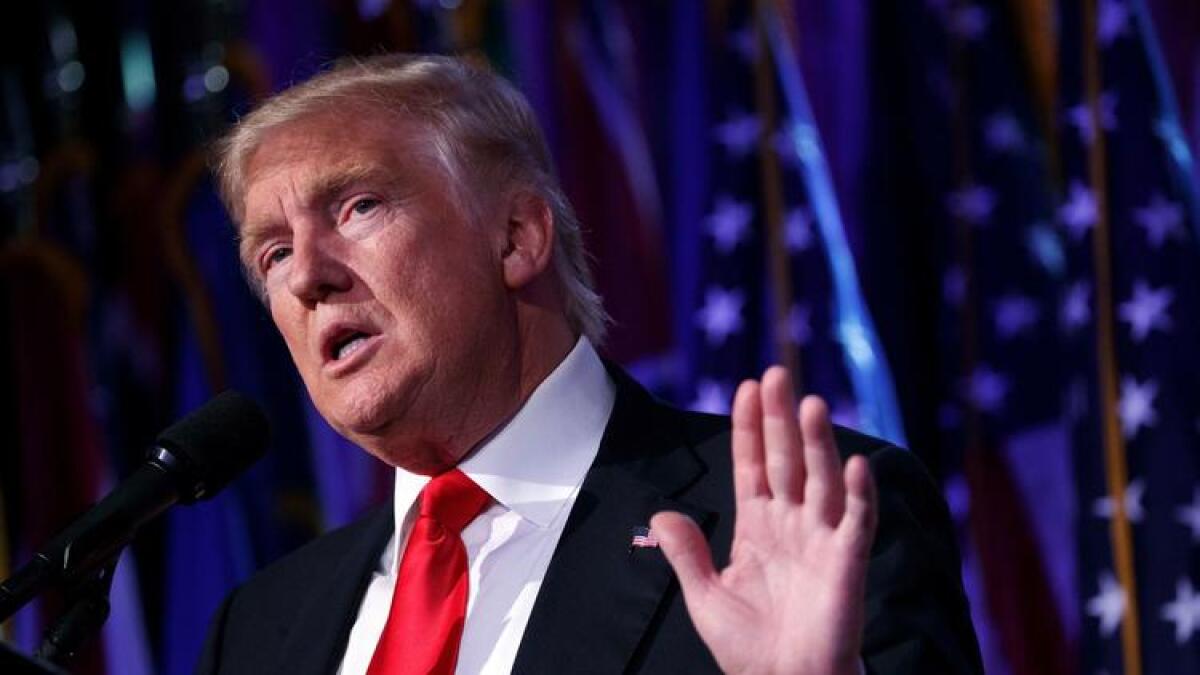
President Trump announced Thursday that his administration will be releasing a new, narrower executive order on travel to replace one that’s been shot down by multiple federal courts.
The order temporarily suspended travel from seven mostly Muslim countries and halted refugee admissions but is not in effect after court defeats.
Trump did not clarify details of the new order, saying only that it would be “tailored” to the “bad” courts that described the original order as overreaching, suggesting it would be narrower in its focus.
In a brief filed to the 9th Circuit Court of Appeals on Thursday, the Department of Justice argued that the court was wrong in its move to not reinstate the travel ban earlier this month. But government lawyers said they did not seek a reconsideration of the decision because a revamped executive order is in the works.
That new order would supersede the old one, lawyers wrote.
Government lawyers said the appeals court should vacate its prior decision when the new executive order is issued.
Still, Trump defended the original order when speaking to reporters on Thursday.
“We had a very smooth rollout... but we had a bad court,” Trump said. He said the new order will be “very much tailored to what I consider to be a very bad [court] decision.”
Trump skirts Russia issue in a freewheeling news conference: ‘I’m not ranting and raving’

Donald Trump makes a premonition that the press will say he was ranting and raving.
President Trump said Thursday that “nobody that I know of” from his campaign contacted Russian agents or government officials before his election.
His denial was perhaps the most notable development in a a lengthy news conference in which he berated the press and complained that he had “inherited a mess.”
Trump also defended his ousted national security advisor, Michael Flynn, saying that Flynn acted appropriately in discussing sanctions with Russia during the transition period. He said Flynn was asked to resign only because he misled Vice President Mike Pence about those discussions.
“I fired him because of what he said to Mike Pence — very simple,” Trump said.
He said, “It certainly would have been OK with me” if Flynn discussed sanctions with Russian Ambassador Sergey Kislyak when President Obama was still in office.
“I didn’t direct him, but I would have directed him if he didn’t do it,” Trump said.
Flynn’s discussion of sanctions while another administration was still setting U.S. policy was seen as inappropriate, and possibly illegal.
Trump also promised to issue a new version of his travel ban next week, and he vowed it would withstand court scrutiny.
He complained that his many accomplishments were not being recognized while insisting that his much-criticized early weeks in office were going smoothly. He even said his travel ban worked without a hitch, despite numerous problems at airports around the country.
Trump hedged when several reporters asked him to definitively state whether anyone in his campaign had contacted Russians before the election, saying repeatedly that he himself had no involvement with the Russian government. He also said that political controversy would make it hard to cut a wide-ranging deal with Russian President Vladimir Putin, but that he was nonetheless committed to trying.
The news conference was a return to Trump’s more spontaneous public side that characterized his campaign. He sparred with the press, bragged about the size of his election victory, boasted of his television ratings and continued to take shots at Hillary Clinton.
“I won with news conferences,” he said, as if explaining why he chose to hold the impromptu news conference.
Trump, while relentlessly bemoaning what he said was unfair coverage, nonetheless insisted that he was having a good time.
“Tomorrow, they will say, ‘Donald Trump rants and raves about the press,’” he said. “I’m not ranting and raving.”
Trump pick for ambassador to Israel has tough Senate hearing
President Trump’s nominee for U.S. ambassador to Israel, David Friedman, faced hecklers and tough questions Thursday in his Senate confirmation hearing.
Friedman, an attorney who worked for Trump and who has expressed hard-line, pro-Israel positions, sought to distance himself from his more inflammatory comments.
“I cannot justify these hurtful words, which I deeply regret,” Friedman testified.
Friedman has called President Obama, other Democratic leaders and critics of Israeli actions anti-Semitic. He likened liberal American Jews to Holocaust-era Kapos, Jews who worked for the Nazis in concentration camps.
He is a financial backer of expanding Jewish settlements in the West Bank, land claimed by the Palestinians.
He also has dismissed as unworkable the proposed two-state solution to the Israeli-Palestinian conflict.
The diplomatic strategy, which envisions an Israeli nation and a Palestinian nation existing side by side, has been the cornerstone of U.S. policy since the Clinton administration, although Trump said Wednesday that he is willing to abandon it if Israel and the Palestinians can produce a better plan.
Testifying to the Senate Foreign Relations Committee, Friedman said he would be “delighted” to see Israeli and Palestinian states coexist west of the Jordan River but questioned whether that was feasible.
Democrats questioned whether Friedman could conduct diplomacy given his strong opinions and brash approach.
“I’m having difficulty understanding whether you really can be a diplomat,” said Sen. Ben Cardin of Maryland, the ranking Democrat on the committee.
Sen. Tom Udall (D-N.M.) called on the Trump administration to withdraw Friedman’s nomination.
Friedman said he was qualified for the job because of his deep knowledge of Israeli history, born of a life of study and 50 visits there. He also cited his close friendship with Trump and his fluency in the Hebrew language.
Seconds after beginning his opening statement, Friedman was interrupted by a pro-Palestinian demonstrator who waved a Palestinian flag and shouted, “We aren’t going away!”
Five other outbursts, both from pro-Palestinian and American Jewish protesters, including one man in a kippa, followed.
Trump announces Labor secretary pick, Alexander Acosta, who would be only Latino in Cabinet
President Trump said Thursday that he will nominate former Justice Department official R. Alexander Acosta as Labor secretary after his first pick, fast-food executive Andy Puzder, withdrew.
If confirmed, Acosta would be the only Latino in Trump’s Cabinet.
“He’ll be a tremendous secretary of Labor,” Trump said at a news conference in the East Room of the Whiite House, noting that Acosta was previously confirmed by the Senate three times.
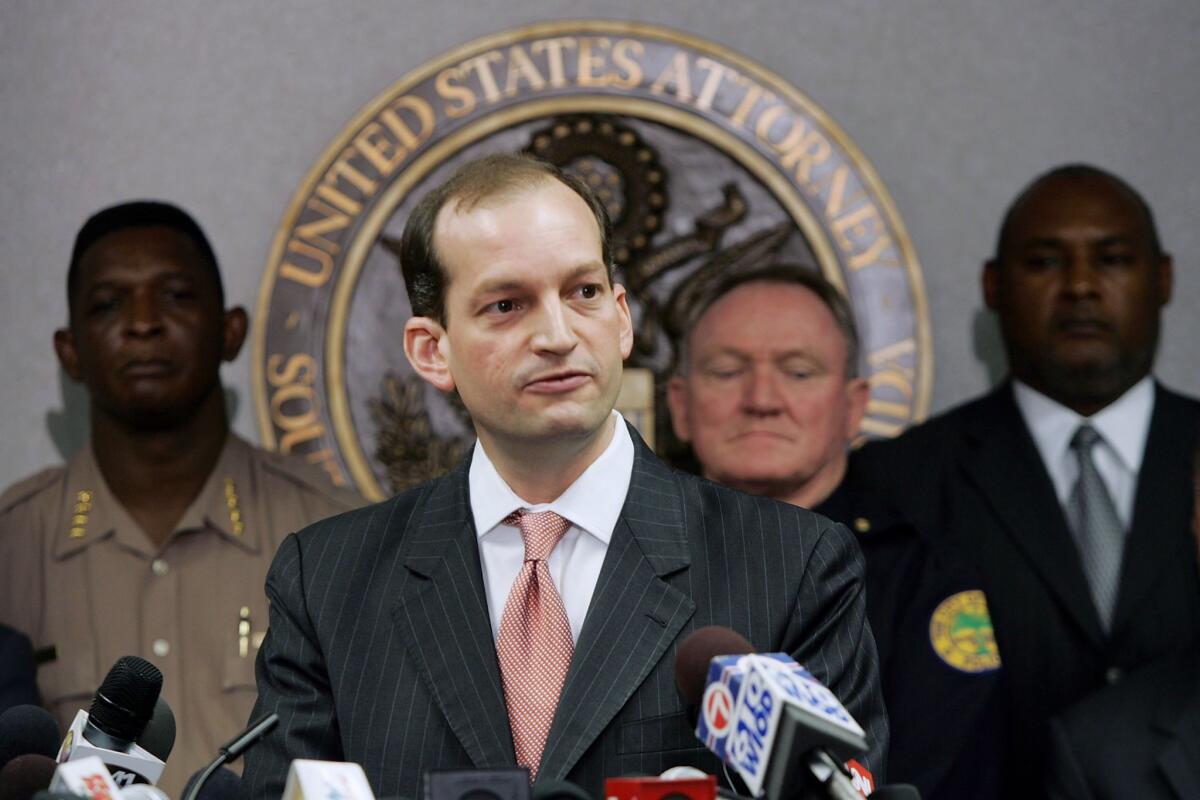
Acosta was assistant attorney general for the Justice Department’s Civil Rights Division under former President George W. Bush and also has served as U.S. attorney for the Southern District of Florida and as a member of the National Labor Relations Board.
Since 2009, Acosta has been dean of the law school at Florida International University in Miami.
Puzder, chief executive of Carpinteria-based CKE Restaurants Inc., parent company of Carl’s Jr and Hardee’s, withdrew the day before his Senate confirmation hearing after several Republicans opposed him because of a series of controversies, including admitting he had for years employed a housekeeper in the U.S. illegally and decades-old allegations of spousal abuse.
10 a.m.: This story was updated with comment from Trump.
Trump is showing a reluctance to take responsibility for White House chaos
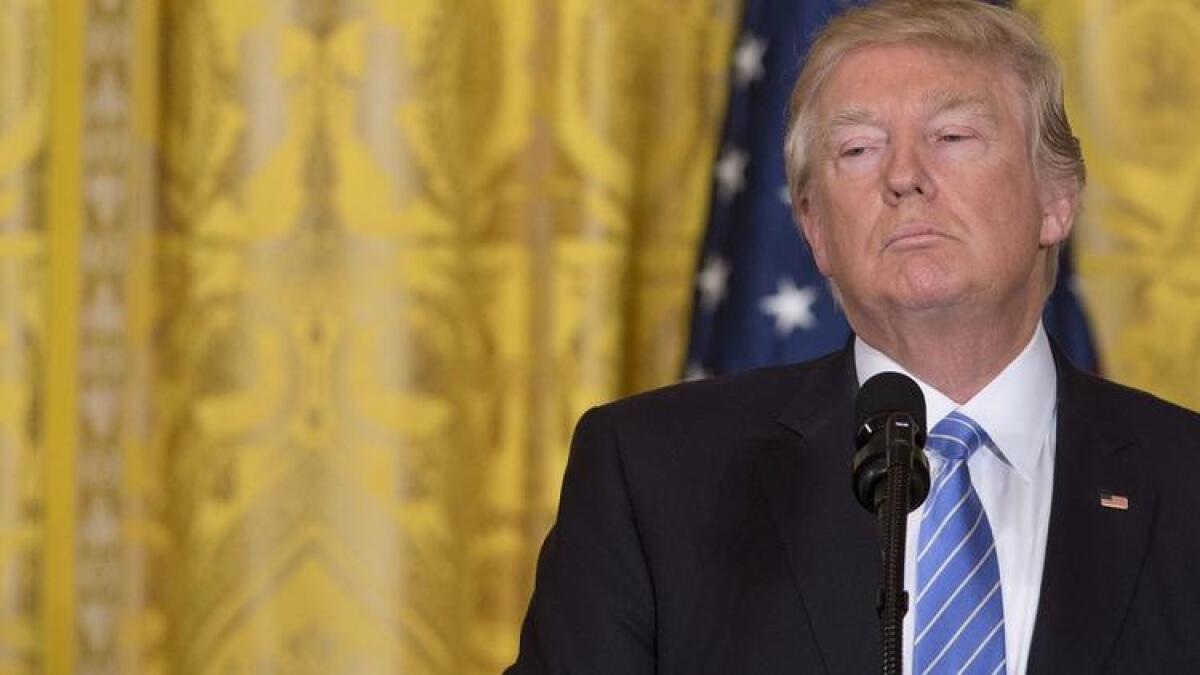
Asked for the first time publicly to address the dismissal of Michael Flynn, his national security advisor, President Trump was clear Wednesday in his frustration.
But the president’s target was not Flynn, a retired Army lieutenant general, nor his conduct
“Gen. Flynn is a wonderful man,” Trump said. “I think he’s been treated very, very unfairly by the media — as I call it, the fake media — in many cases.”
Trump’s answer — in which he also blamed intelligence officials for “illegally” leaking information that prompted Flynn’s ouster — marked the most prominent example to date of his reluctance to publicly shoulder the responsibility for missteps at the White House.
While Congress struggles to replace Obamacare, the Trump administration is moving to reshape health insurance on its own
With congressional Republicans struggling to develop an Obamacare alternative, the Trump administration is taking steps on its own to loosen government regulation of the nation’s health insurance markets, a longtime conservative goal.
Administration officials said the moves — which were detailed in proposed regulations released Wednesday — are necessary to stabilize Obamacare marketplaces that have been shaken over the last year by rising premiums and insurer exits.
But the Trump administration’s moves to relax rules on insurers appear likely to shift additional medical costs to patients by promoting higher-deductible health plans.
The proposed regulations also set the stage for potential reductions in government aid to low- and moderate-income consumers, another policy favored by GOP leaders, including Trump’s new Health and Human Services secretary, Tom Price, a fierce advocate for reduced federal healthcare spending.
The moves drew criticism from many consumer and patient advocates worried that the Trump administration is undermining key protections established by the Affordable Care Act.
House riles California with vote to block state retirement law to help low-income workers
Over the protest of California’s governor and Senate leader, the Republican-controlled U.S. House of Representatives voted to block the state from moving forward with its novel plan to provide a path toward retirement security for nearly 7 million low-income Californians.
The move was viewed by leaders in California and several other states as an incursion on states’ rights by a Republican Congress they accuse of setting its federalist principles aside to scuttle a program that is creating anxiety among Wall Street investment houses.
The House vote took aim at new laws in California and several other states that would require private employers that do not currently offer retirement savings programs to set up accounts for their workers, through which a small share of their earnings would be set aside in an IRA-type account. Private firms would invest the money, much like they do in 529 college savings accounts that many states have established. Workers could choose not to participate, and employers would not have to contribute any money to the accounts.
“Republicans have decided Wall Street’s profits are more important than workers’ retirement savings,” House Minority Leader Nancy Pelosi said in a floor speech, where she noted the state plans are enthusiastically endorsed by AARP as an effective tool to help keep seniors out of poverty.
Gov. Jerry Brown wrote a letter to lawmakers in Congress imploring them not to vote against the plans, as did state Senate leader Kevin de Leon, who crusaded for years to pass the 2016 legislation authorizing the new retirement program.
But the House voted Wednesday to rescind an Obama administration regulation that cleared the path for states to start launching their programs later this year.
House Majority Leader Kevin McCarthy said in a letter to de Leon that he was concerned the Obama regulation would not give people who currently do not have access to retirement plans at work enough protections once enrolled in the state programs. He also expressed doubts about the trustworthiness of states to oversee such programs.
“Repealing this regulation is completely in line with our mutual respect for federalism,” McCarthy wrote, “and nothing in Congress’ action will block state innovation.”
But during the floor debate, Democrats said opponents of the programs were not looking out for workers, but Wall Street.
”There’s a reason why some business organizations like the [U.S.] Chamber and other financial groups are worried about this,” said Rep. Earl Blumenauer (D-Oregon). “This is a low-cost, high-impact, transparent program.... I think they’re afraid of the model.”
The resolution next goes to the Senate.
Andy Puzder, Trump’s pick for Labor secretary, drops out
The troubled nomination of Southern California executive Andy Puzder to become President Trump’s Labor secretary collapsed Wednesday amid growing Republican opposition.
Puzder, chief executive of Carpinteria-based CKE Restaurants Inc., the parent company of the Carl’s Jr. and Hardee’s chains, abruptly withdrew his nomination just a day before he was to face his Senate confirmation hearing.
“After careful consideration and discussions with my family, I am withdrawing my nomination for secretary of Labor,” Puzder said in a statement emailed by his spokesman. “I am honored to have been considered by President Donald Trump to lead the Department of Labor and put America’s workers and businesses back on a path to sustainable prosperity.”
“While I won’t be serving in the administration, I fully support the President and his highly qualified team,” Puzder said.
Puzder’s nomination as Labor secretary appears in deep trouble amid increasing Republican opposition
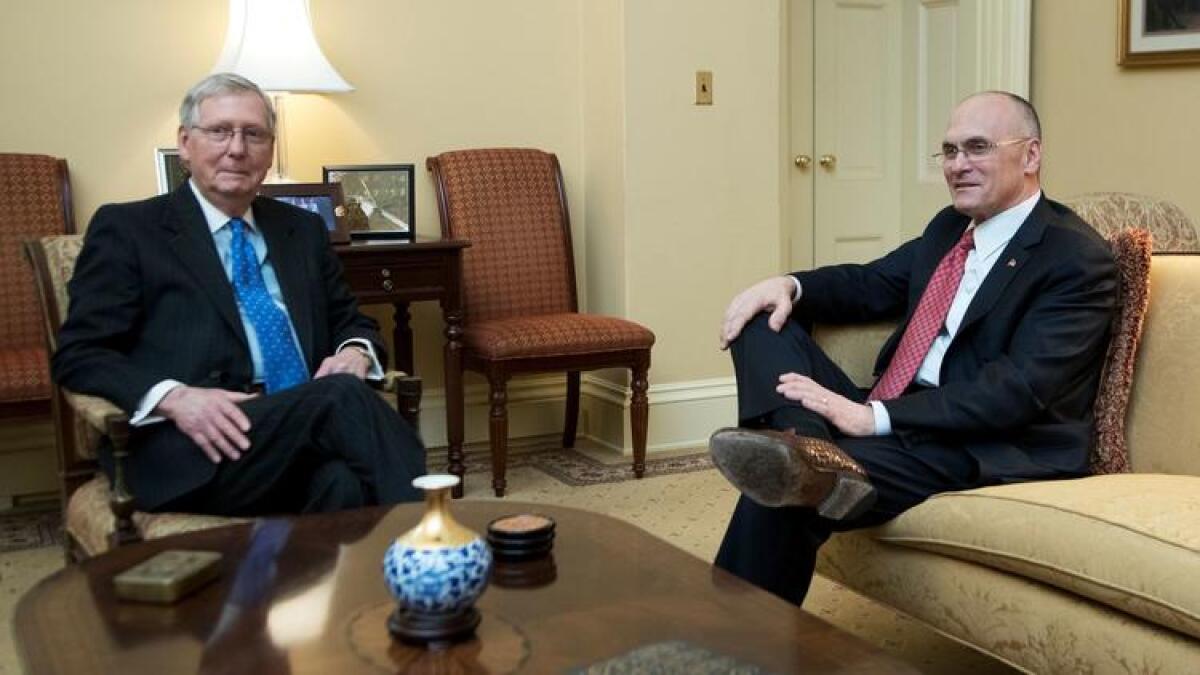
Andy Puzder’s nomination as Labor secretary appeared to be in deep trouble Wednesday amid increasing Republican opposition in the wake of a series of controversies.
At least four Republican senators would oppose the Southern California fast-food executive’s confirmation, CNN reported. That would be enough to sink the nomination because of apparent unanimous Democratic opposition.
With as many as 12 potential no votes among GOP members, top Senate Republicans urged the White House to withdraw the nomination.
After the resignation of National Security Advisor Michael Flynn this week, President Trump and White House officials might not want to use their political capital to save Puzder’s nomination.
Puzder, the chief executive of Carpinteria-based CKE Restaurants Inc., the parent company of the Carl’s Jr. and Hardee’s chains, is scheduled for a confirmation hearing on Thursday.
Senate Majority Leader Mitch McConnell (R-Ky.) reiterated Tuesday he was a “strong supporter” of Puzder.
On Wednesday, Sen. John Cornyn (R-Texas), a member of the GOP leadership, said he expected Puzder’s hearing before the Senate Health, Education, Labor and Pensions Committee to take place as scheduled.
“Nothing’s changed,” he said.
Since then, however, GOP concerns about the nomination appear to have grown -- or at least become more public. The concerns have been mounting as new controversies have arisen in recent days, including Puzder’s admission that he had employed a housekeeper for years who was in the U.S. illegally.
Puzder paid back taxes related to that employee after Trump picked him for Labor secretary in early December.
Some Republicans also have viewed a 1990 episode of “The Oprah Winfrey Show” in which Puzder’s ex-wife, Lisa Fierstein, made allegations of spousal abuse, according to Politico.
Fierstein wrote to the leaders of the Senate Health, Education, Labor and Pensions Committee last month saying she had later withdrawn the allegations and vouching for Puzder as a “a good, loving, kind man.”
But Sen. Susan Collins (R-Maine) said she had viewed the Oprah episode and told reporters Tuesday she had not made up her mind on Puzder’s nomination.
“There have been issues that have been raised about him, and I’m sure that all of them will be thoroughly addressed in the hearing,” Collins said.
Asked about Puzder on Wednesday, Collins said, “I’ve expressed my concerns.”
Sens. Lisa Murkowski (R-Alaska), Tim Scott (R-S.C.), Johnny Isakson (R-Ga.) and John Thune (R-S.D.) also said this week that they were awaiting the confirmation hearing before making a decision. Sen. Rob Portman of Ohio also expressed concerns.
“I think it’s important that before we come to any conclusions or make any judgments that we have an opportunity to hear from him at his confirmation hearing respond to some of the questions that have been raised,” Thune said Tuesday.
The issues involving his housekeeper and ex-wife came on top of controversial comments Puzder has made in recent years opposing an increase in the minimum wage to $15 and musing about deploying increased automation to his restaurants.
Democrats also have highlighted labor law violations at CKE Restaurants, and fast-food workers have staged protests against Puzder’s nomination in Los Angeles and elsewhere.
On Thursday, Senate Minority Leader Charles E. Schumer (D-N.Y.) called for Puzder to withdraw, calling him “probably the most anti-worker” choice ever for the Cabinet position.
Trump in first summit with Israeli Prime Minister Benjamin Netanyahu
President Trump and Israeli Prime Minister Benjamin Netanyahu both declined to commit to the internationally accepted recipe of a two-state solution to the Israeli-Palestinian conflict Wednesday, a diplomatic shift for both governments that could signal a realignment of the traditional peace process.
At a joint news conference ahead of their first White House summit, Trump said he would support whatever solution the Israelis and Palestinians wanted.
“I’m looking at two states and one state, and I like the one both parties like,” Trump said. “I can live with either one.”
Netanyahu dodged the question.
For years, the United States and most of its allies advocated the vision of two states, one Israeli and one Palestinian, living side by side as the basis for lasting peace in the region.
Trump now has backed away from that commitment, raising questions about how officials would draw up a peace plan.
Trump did criticize, albeit mildly, Israel’s rapid expansion of housing settlements in the occupied West Bank, land claimed by the Palestinians.
Asked about the settlements, Trump turned to Netanyahu, standing at a lectern beside him, and said, “I’d like to see you hold back on settlements a little bit.”
Netanyahu looked surprised and countered that settlements could be discussed as part of a final peace deal, but he added they were “not the core of the conflict.”
Trump also was asked about his campaign pledge to relocate the U.S. embassy from Tel Aviv to Jerusalem, a move considered provocative because both Israel and the Palestinians claim the city as their capital.
Trump said he was thinking about it “very carefully” but would not commit to a move date.
Trump and Netanyahu seemed on the same page on other topics.
Both were critical of the landmark deal, negotiated by six world powers and Iran in 2015, that eased sanctions on Tehran in exchange for destroying or freezing Iran’s nuclear development programs. But Trump did not repeat his campaign promise to “rip up” the deal.
Netanyahu strongly defended Trump when asked about the xenophobic and anti-Semitic sentiments unleashed by some of his supporters during the presidential race last year.
“There is no greater friend of Israel,” Netanyahu said of Trump, then singled out Trump’s son-in-law, Jared Kushner, as a lifelong family friend.
Kushner, a 36-year-old observant Jew with no formal diplomatic experience, has been tapped by Trump to lead negotiations with Israel and the Palestinians.
Both Trump and Netanyahu said they were finding that several Arab countries now see Iran and radical Islam as enemies worth joining forces to fight, instead of seeing Israel as the primary enemy.
In contrast to the often-chilly joint appearances that Netanyahu had with President Obama, the Israeli leader’s arrival on the south steps of the White House was full of smiles, kisses and warm handshakes shared by the two leaders and their wives.
“Our alliance has always been strong, but under your leadership, it will be even stronger,” Netanyahu said.
Trump makes his first comments about Flynn’s dismissal, and he blames the media and leakers
President Trump lashed out Wednesday at the media and the sources of leaks in complaining that his former national security advisor, Michael Flynn, suffered “unfair” treatment when he was dismissed this week.
“It’s very unfair what happened to Gen. Flynn and the documents and papers that were illegally leaked,” Trump said at a news conference with Israeli Prime Minister Benjamin Netanyahu, making his first public comments since accepting Flynn’s resignation late Monday,
But Trump said nothing about Flynn’s potentially illegal conduct in discussing U.S. sanctions with a Russian diplomat prior to Trump’s inauguration.
More glaringly, Trump did not address his own role in Flynn’s ouster. After announcing Flynn’s resignation Monday night and distributing his resignation letter, the White House said Tuesday that Trump had, in recent weeks, lost trust in Flynn and was forced to let him go.
“It’s really a sad thing that he was treated so badly,” Trump said.
Trump alternately claimed the media was trafficking in “fake news” and that intelligence and law enforcement officials were leaking factual information to them.
“It’s a criminal act and it’s been going on for a long time,” Trump said, acknowledging other presidents’ complaints about leaks to reporters but adding that he felt especially harshly targeted.
“People are trying to cover up for a terrible loss that the Democrats had under Hillary Clinton,” Trump said, without explaining who he was accusing.
The comments echoed a morning series of tweets from the president, but overlooked what the White House had claimed was the driving force behind Flynn’s resignation: his mischaracterizations of the substance of his conversations with Russia’s ambassador to the United States in late December.
Is it really ‘un-American’ to leak news to the press? Trump says yes
It’s President Trump versus the intelligence community … again.
News reports, citing unnamed sources within the FBI and National Security Agency, reveal Trump aides and associates made repeated contact with senior Russian officials during the 2016 campaign, but the president’s chief response has been to lambaste the leaks as “very un-American.”
“Information is being illegally given to the failing @nytimes & @washingtonpost by the intelligence community (NSA and FBI?),” he jabbed on Twitter.
It appears the conservative media are siding with Trump.
Here are some of Wednesay’s headlines:
Fox News, Breitbart and the Daily Caller all led their websites Wednesday morning with headlines highlighting Trump’s denunciation of the intelligence community leaks.
- ‘VERY UN-AMERICAN’: Trump blasts US intel community over ‘illegal’ leaks (Fox News
- Donald Trump denounces ‘un-American’ intelligence leaks to ‘fake news’ (Breitbart)
- ‘The real scandal’ Trump accuses intelligence community leakers of acting ‘just like Russia’ (Daily Caller)
In other conservative news:
Ethics watchdog can’t investigate Kellyanne Conway or punish other rule violators (Daily Caller)
A day after the Office of Government Ethics recommended the White House consider taking disciplinary action against White House advisor Kellyanne Conway, this piece cites an analysis by the nonpartisan Project On Government Oversight. The analysis notes the OGE “lacks the authority to investigate complaints of ethics noncompliance and to issue binding recommendations for disciplinary action.”
Last week, Conway endorsed Ivanka Trump’s fashion line during a television interview – a move, OGE officials say, that possibly violated the standards of ethical conduct for executive employees. The White House says Conway has been “counseled,” but the OGE said it has yet to receive any guidance on what if anything happened as a corrective action.
The analysis from the Project on Government Oversight notes that the OGE cannot investigate or punish Conway.
Philly archbishop ‘amazed’ by media hostility toward Trump (Breitbart)
Conservatives are loving Philadelphia Archbishop Charles J. Chaput’s comments in support of the president.
“It’s just amazing to me how hostile the press is to everything the president does,” Chaput said in an interview this week with Hugh Hewitt, a conservative talk radio host.
“I don’t want to be partisan in my comments here, but it seems to me if we are really serious about our common responsibilities, we support the president,” Chaput said, “whether we accept everything he stands for or not, and wish him success rather than trying to undermine him.”
Chaput has served as archbishop in Philadelphia since 2011. He previously served as Archbishop of Denver and Bishop of Rapid City, S.D.
How far will Republicans go to destroy Trump? (American Spectator)
It’s no surprise that Trump does not get along with members of his own party. Just last week he alluded to Sen. John McCain (R-Ariz.) as a loser, and he regularly voices criticism of Republican lawmakers.
In this piece, the author, Melissa Mackenzie, speculates how far members of the GOP – McCain, Sen. Lindsey Graham (R-S.C.) to name a few -- will go to hurt Trump’s presidency.
“Both McCain and Graham know that the Russians did not create a fraudulent election,” she writes. “They’re willing, though, to extend this story, if it weakens the Republican president, who does not share their personal national security goals.”
She adds: “The Republican establishment has always been good at cutting their nose off to spite their face. In this case, they’re likely to come out of this scalpel wielding with something worse than a scarred face — if they, if we, survive it at all.”
Senate votes to block rule on guns and mentally impaired
The Republican-led Senate has voted to block an Obama-era regulation that would prevent an estimated 75,000 people with mental disorders from being able to purchase a firearm.
The 57-to-43 vote to revoke the regulation now sends the measure to President Trump, who is expected to sign it.
The Obama administration rule strengthened the federal background check system by requiring the Social Security Administration to include the names of beneficiaries with mental impairments who also have a third party to manage their benefits.
But some critics said the rule was too broad and unfairly stigmatized the disabled. With a Republican ally in the White House, the GOP has moved aggressively to rescind several late Obama administration regulations.
Read more:
With Trump in the limelight, Congress has been quietly working to undo Obama-era regulations
While the White House tries to contain fallout over Flynn’s resignation, Trump starts tweeting again
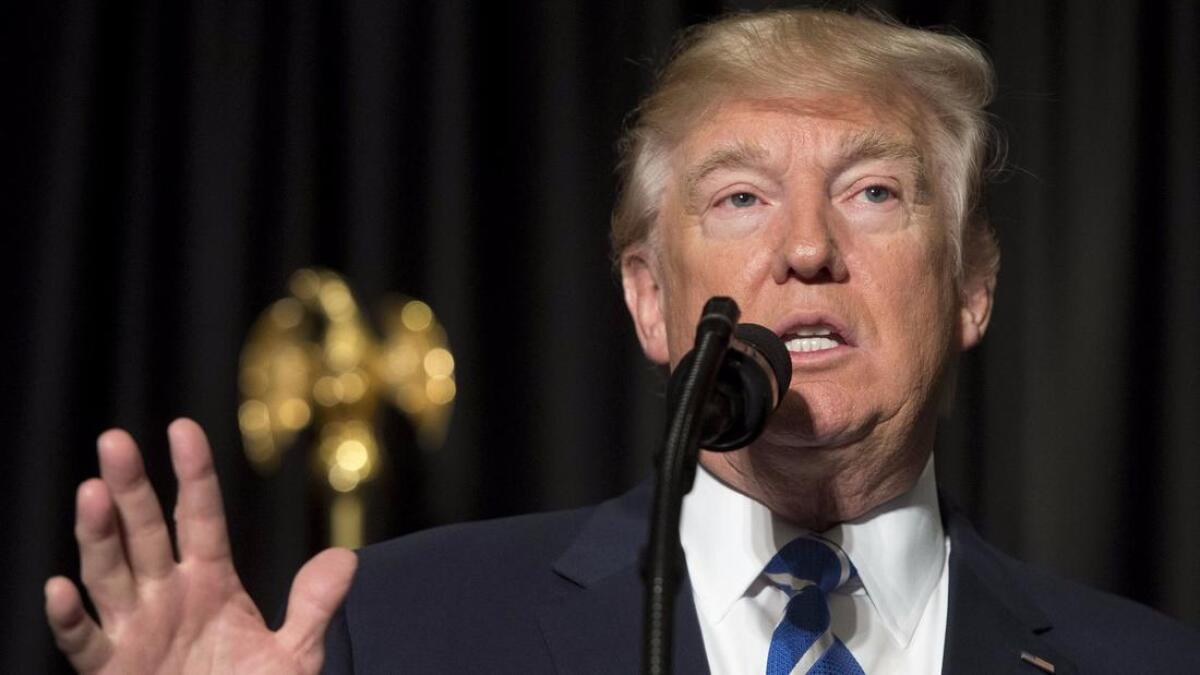
As the White House struggles to contain the fallout from the ouster of former National Security Advisor Michael Flynn this week, President Trump doubled down Wednesday on favorite lines of attack, against the mainstream press and the sources of their reporting.
Trump, a voracious consumer of morning cable news, began the day by attacking “the fake news media” and their “conspiracy theories and blind hatred. Morning shows on MSNBC and CNN were “unwatchable,” but “Fox and Friends” was “great,” he said.
In an apparent reference to a New York Times report that Trump campaign officials may have been in direct contact with Russian intelligence officials during the campaign - long denied by the White House - the president deemed questions about a “Russian connection” as “non-sense.”
Then he claimed information was being “illegally given” to the Times and Washington Post by the intelligence community that now serves him.
“The real scandal here is that classified information is illegally given out by ‘intelligence’ like candy,” he later added. “Very un-American.”
Those, and two additional tweets, ended a brief interlude in which the president had scaled back on his freewheeling online commentary.
His tweets contained inherent contradictions. Was the reporting on Russian connections nonsense as he claimed, or the product of leaks of factual but confidential information from intelligence officials?
Trump is due to face reporters later Wednesday for a joint news conference with Israeli Prime Minister Benjamin Netanyahu. At a news conference Monday, Trump called on reporters from conservative-leaning outlets -- the Daily Caller website and Sinclair broadcasting -- who did not ask about Flynn’s then-tenuous status.
Russia denies that intelligence agents were in contact with Trump’s campaign team

Kremlin spokesman Dmitry Peskov on Wednesday denied reports of intercepted phone calls between Russian intelligence officials and members of Donald Trump’s presidential campaign.
The New York Times said that the Russians made contact with Paul Manafort, who briefly served as Trump’s campaign chairman. Current and former U.S. officials interviewed by the newspaper declined to identify other Trump associates contacted by the Russians.
Speaking to reporters in Moscow, Peskov, spokesman for President Vladimir Putin, pointed to the anonymity of the sources, saying that the reports “are not based on any facts, do not point to actual facts.”
The report comes a day after U.S. National Security Advisor Michael Flynn resigned following reports he misled Vice President Mike Pence and other officials about his contacts with Russia.
Asked about the allegations, Russian foreign ministry spokeswoman Maria Zakharova said Wednesday they “prove once against there is a major internal, political game, you can call it bargaining, in the United States.”
Russian lawmakers were more direct in trying to defend Trump.
“This is not about information but about a high-precision information bomb,” Alexei Pushkov, chairman of the Federation Council’s information committee, tweeted. “The goal is to blow up the Trump administration.”
White House backs away from two-state solution for Israel and Palestinians
On the eve of the first summit between President Trump and Israeli Prime Minister Benjamin Netanyahu, the White House late Tuesday appeared to back away from the long-standing U.S. advocacy of a so-called two-state solution for peace between Israel and the Palestinians.
“A two-state solution that doesn’t bring peace is not our goal that anybody wants to achieve,” a senior White House official said in briefing reporters ahead of the Netanyahu meeting.
U.S. policy, and that of most international groups, for decades has considered a two-state solution, where Israel and a Palestinian nation live side-by-side, as the essential basis for peace in the troubled region. But the official, who spoke to reporters under rules that did not allow him to be identified by name, cast doubt on that.
Asked whether peace didn’t equal a two-state solution, the official said, “Maybe, maybe not.”
“It’s something the two sides have to agree to,” the official added. “It’s not for us to impose that vision.”
“Peace is the goal, whether it comes in the form of a two-state solution if that’s what the parties want or something else. If that’s what the parties want, we’re going to help them,” the official said.
The statements were the latest fluctuation in what seems to be an evolving Middle East policy for the new administration.
Initially, Trump took hard-line positions on Israel, refusing to condemn the expansion of settlements in West Bank land claimed by the Palestinians and vowing to move the U.S. Embassy from Tel Aviv to Jerusalem.
Relocation of the embassy is controversial because both Israelis and Palestinians claim Jerusalem, or parts of it, as their capital.
Trump also said he would turn over the Israeli-Palestinian portfolio to his son-in-law, Jared Kushner, a longtime supporter of Israel. He has nominated as his ambassador to Israel one of his lawyers, David Friedman, a passionate financial backer of settlements, which much of the world consider illegal and an impediment to peace.
More recently, however, the administration dropped talk of moving the embassy, at least in the short term, and issued a statement that was critical, albeit mildly, of settlements.
Trump has said he wants to make peace in the long conflict the “ultimate deal.” Administrations over the years have been stymied in similar goals. Peace talks have been at an impasse for several years.
Both Trump and Netanyahu are eager to show an improved relationship following eight frosty years with the Obama presidency. But experts have also warned that Trump should be careful not to risk provoking Arab states, whom he needs in the fight against the Islamic State terrorist organization and as counterweight to Iran.
The White House official said Trump and Netanyahu, in their summit Wednesday, will discuss settlements, an embassy move and Iran.
Timeline of events leading up to Michael Flynn’s resignation
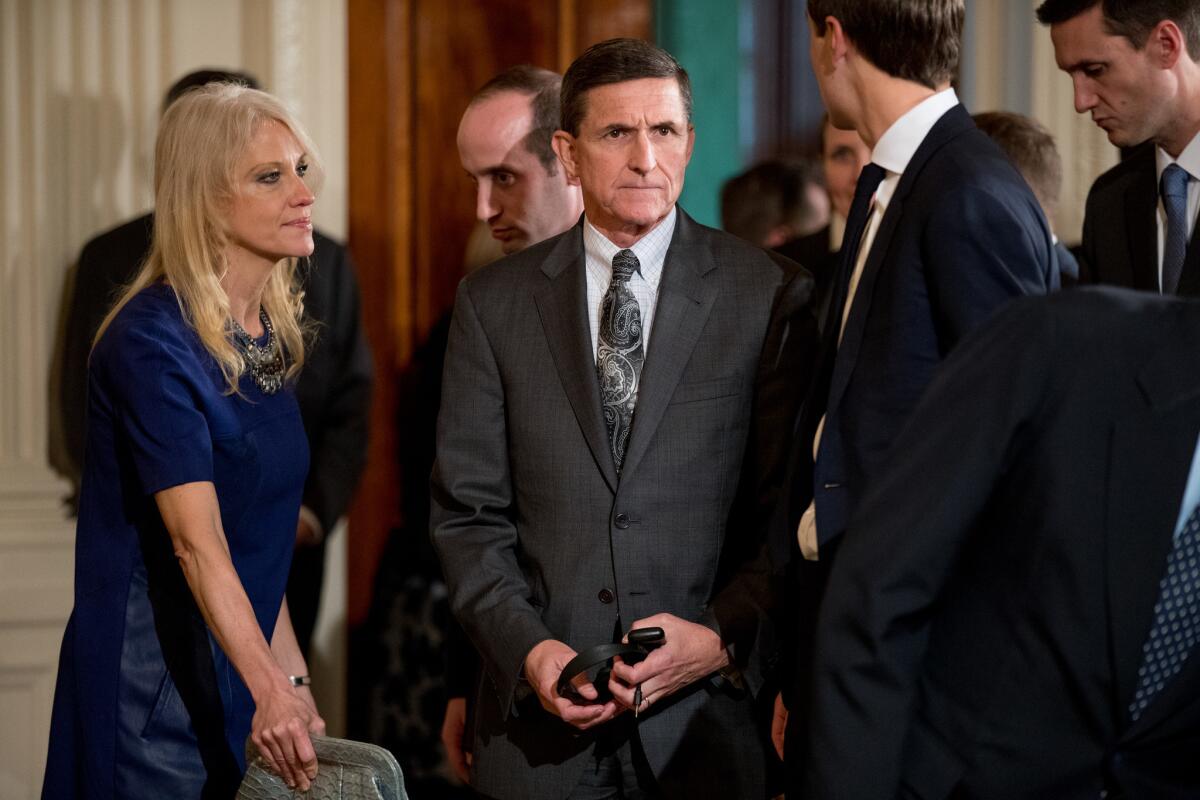
Less than a month in to the new administration, President Trump’s national security advisor, Gen. Michael Flynn, has resigned after admitting that he misled his White House colleagues, including Vice President Mike Pence, about conversations he’d had with Russia’s ambassador to Washington.
In those conversations, officials say, Flynn discussed sanctions that the Obama administration had imposed on Russia to punish Moscow for its interference in the U.S. election. Those conversations could have violated the Logan Act, which prevents unauthorized citizens from negotiating with foreign governments in relation to “disputes or controversies.” The law, however, which was enacted in the 1790s, has never been used to prosecute anyone.
Here’s the timeline of events leading up to Flynn’s resignation:
FBI agents interviewed Michael Flynn last month about his contacts with Russian ambassador, official says
FBI agents interviewed then-national security advisor Michael Flynn last month about his conversations in December with the Russian ambassador to the United States, a U.S. official familiar with the matter said Tuesday.
The official would not describe what Flynn said during in the interview, which took place after he took over as national security advisor on Jan. 20.
Flynn resigned late Monday under pressure for apparently misleading Vice President Mike Pence about the nature of his conversations with Ambassador Sergey Kislyak.
At issue was whether they discussed sanctions newly imposed by the Obama administration over Russia’s meddling in the U.S. election. Flynn initially denied that they had, as did Pence and other White House officials relying on Flynn’s word.
But Flynn came under renewed scrutiny after it was reported last week that transcripts, culled from routine U.S. monitoring of foreign officials’ communications, showed that he and Kislyak did discuss the sanctions.
Acting Atty. Gen. Sally Yates, concerned that Flynn might become a blackmail target for the Russian government, raised concerns about the conversation with the White House counsel on Jan 26. Her warning was issued after the FBI interviewed Flynn, the official said.
The FBI interview of Flynn was first reported by the New York Times.
Democrats push for full investigation of Flynn’s resignation and Trump administration’s ties to Russia
Momentum grew on Capitol Hill on Tuesday for a full investigation of former national security advisor Michael Flynn’s dealings with Russia as lawmakers try to determine whether President Trump or others in the administration sanctioned his activities.
Republicans splintered over whether to aggressively investigate the White House’s dealings with Russia, but Democrats are pushing for a independent review to assess whether Flynn, who resigned Monday, was acting alone or at the direction of others.
“Gen. Flynn’s resignation is not the end of the story, it is merely the beginning,” said Senate Minority Leader Charles E. Schumer (D-N.Y.)
“His resignation raised more questions than answers and the American people deserve to know the truth.”
Already Congress has been investigating Russia’s role in trying to influence the November election. Republican lawmakers have so far been content to keep the inquiry contained in the congressional Intelligence committees.
But Democrats have pressed for a more robust probe, and Flynn’s departure amplified those calls after it was revealed he talked with the Russian ambassador to the U.S. while President Obama was still in the White House. Flynn reportedly discussed the U.S. sanctions that Obama had just levied. He later denied sanctions were discussed.
House Speaker Paul D. Ryan (R-Wis.) said Tuesday he’ll “leave it up to the administration” to explain the circumstances around Flynn’s phone calls with the Russians and his abrupt firing.
But Rep. Adam Schiff (D-Burbank) said that if Ryan is unwilling to have Congress pursue the issue, “then he should get out of the way and allow an independent commission to look into the matter.”
“Do you hear that? Do you hear the silence?” asked Rep. Elijah Cummings of Maryland, the top Democrat on the Government Oversight Committee. “This is the sound of House Republicans conducting no oversight of President Trump. Zero.”
Schumer wants the investigation to grow beyond Congress to an independent prosecutor that could probe potential criminal wrongdoing.
Schumer stopped short of calling for the White House to appoint a special counsel. But he said Trump’s attorney general, Jeff Sessions, should recuse himself because of his long ties to the Trump campaign and put an “independent investigative authority in charge.”
House Minority Leader Nancy Pelosi (D-San Francisco) said an investigation is needed to determine if Flynn acted alone or if others in the White House were aware of his actions.
“My fear is now we will have a shadow national security adviser -- [Bannon -- and his national security vision influencing all of the agencies of government that I mentioned as well as advising the president,” said Pelosi, referring to Stephen Bannon, the former Breitbart editor and Trump’s chief strategist. “This is deadly, deadly serious, what’s happening now. There’s a chance to right the course.”
GOP oversight committee requests information in connection with Mar-a-Lago security concerns
Ethics office recommends White House investigate and possibly discipline Kellyanne Conway
The government’s ethics watchdog is recommending that the White House investigate and possibly discipline President Trump’s counselor Kellyanne Conway.
In a letter made public Tuesday, the Office of Government Ethics wrote to White House attorneys that there’s reason to believe that Conway violated the standards of ethical conduct for executive employees by endorsing Ivanka Trump’s fashion line during a television interview last week.
The letter notes lawyers for the White House and OGE spoke on Feb. 9 — the day of Conway’s interview — and that the Republican and Democratic leaders of the House Oversight Committee asked OGE to follow up.
White House spokesman Sean Spicer said last week that Conway has been “counseled,” but the OGE said it has yet to receive any guidance on what if anything happened as a corrective action. The OGE is requesting that White House lawyers tell them in writing by Feb. 28 what they’ve done about the matter.
Fallout from Michael Flynn’s resignation has some asking about leaks to the media
National Security Advisor Michael T. Flynn is out, but many questions remain.
What did President Trump know about Flynn’s contacts with a Russian diplomat, and when? What did members of his Cabinet know?
A day after Flynn submitted his resignation, the mainstream media is still scrutinizing Flynn’s conflicting accounts and his admission that he had misled Vice President Mike Pence.
The conservative media, meanwhile, is asking different questions.
Here are some of today’s headlines:
Trump, GOP lawmakers eye ‘illegal’ leaks in wake of Flynn resignation (Fox News)
It’s all about who is leaking tidbits to the media.
Throughout the presidential campaign and into the first weeks of his presidency, Trump has had a complicated – perhaps vitriolic – relationship with the press.
“The real story here is why are there so many illegal leaks coming out of Washington? Will these leaks be happening as I deal on N.Korea etc?” Trump tweeted on Tuesday.
Fox focuses on who is leaking to the press.
House Intelligence Committee Chairman Devin Nunes (R-Calif.) wants the FBI to conduct an assessment of recent media leaks, Fox noted, and went on to quote the congressman: “If, in fact, the press reports are right, someone made the decision to deliberately listen to Gen. Flynn’s phone calls and that is, I think, unprecedented, unwarranted and flat-out wrong.”
(Americans for Limited Government offered an explanation of its own, suggesting that Flynn’s fall was a “coup” orchestrated by “the deep state bureaucratic establishment.”)
The media’s jihad against the Trump White House staff (American Spectator)
Jeffrey Lord is one of Trump’s prime advocates on cable news – regularly appearing on CNN to defend the policies of the new administration.
In this piece, Lord, who served as a political director in the Reagan administration, writes that the “liberal media can’t stand the new president — it can’t abide his agenda.” He also assails the media for focusing too much on Trump’s staffers.
“The subject may change. It could be terrorism. Illegal immigration. Obamacare. Ivanka’s brand. Anything. The subject is irrelevant. The game is to zero in on this or that Trump White House staffer and paint them with some form of journalistic radioactivity,” writes Lord.
Al Franken has his own history of using ugly, offensive language (Daily Caller)
U.S. Sen. Al Franken of Minnesota is among Trump’s staunchest critics. Over the weekend, the Democratic senator castigated Trump for being “racist” in referring to U.S. Sen. Elizabeth Warren (D-Mass.) as “Pocahontas.”
Franken is an unabashed progressive, but this piece seeks to highlight some of his past remarks about women and minorities.
“While speaking at the White House Correspondents Dinner in 1996, Franken ridiculed [former Republican House Speaker Newt Gingrich] with a joke about his daughter’s first menstrual period,” the piece notes, referring to a New York Post report on the event.
The piece also highlights comments Franken -- then a writer for NBC’s “Saturday Night Live” -- made to Harvard University’s student newspaper in 1976 about how one of his skits had been rejected by “some preppies” at the university’s Hasty Pudding Club.
Franken was clearly trying to push the humor envelope when he said: “ I just don’t like homosexuals. If you ask me, they’re all homosexuals in the Pudding” -- and waited for a reaction.
Thirty years later, the Caller was all over it. “Despite his own offensive past, Franken had no problem calling out President Trump for his use of the term ‘Pocahontas’ to refer to Warren,” associate editor Peter Hasson wrote.
Former wrestling executive Linda McMahon confirmed to lead Small Business Administration
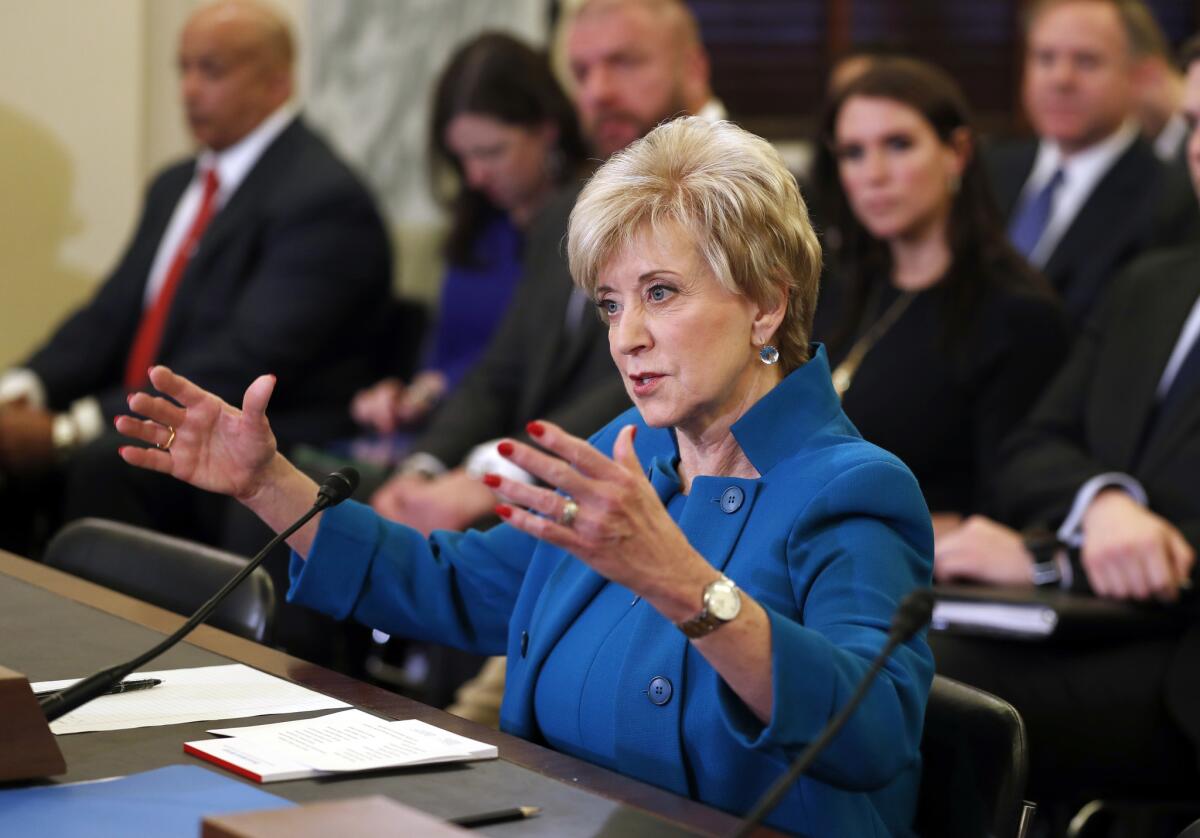
The Senate on Tuesday confirmed former wrestling entertainment executive Linda McMahon to lead the Small Business Administration.
The vote was 81-19.
Senate Majority Leader Mitch McConnell of Kentucky says McMahon will “prioritize growing jobs over growing government bureaucracy” and calls that a welcome change from Washington.
McMahon served as the chief executive officer at World Wrestling Entertainment Inc. before stepping down to run twice for the Senate in Connecticut. She lost both races despite spending some $100 million.
The two Democrats who defeated her — Richard Blumenthal and Chris Murphy — backed her nomination to lead the Small Business Administration.
McMahon helped WWE grow from about a dozen employees into an enterprise with more than 800.
Fed chair signals more interest rate hikes are coming
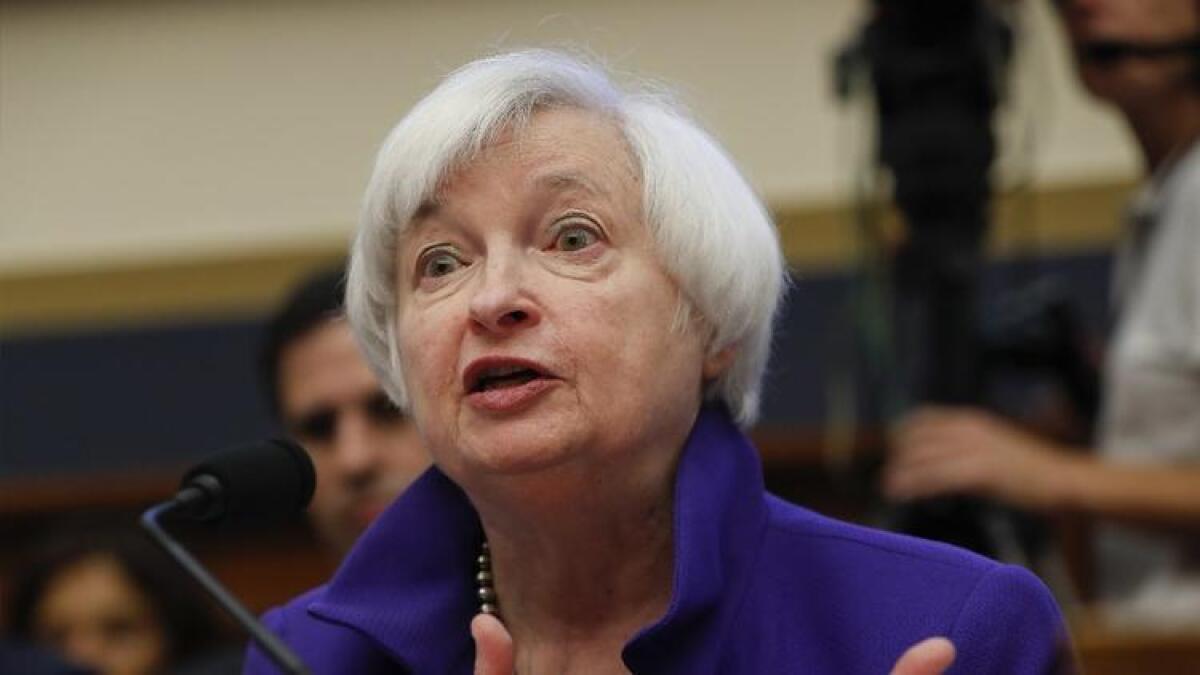
Federal Reserve Chairwoman Janet L. Yellen, in her semiannual report to Congress, on Tuesday painted a largely bright picture of the economy and signaled that the central bank would consider raising interest rates next month.
Most analysts are not looking for a Fed rate hike until June, and Yellen and her colleagues, at their last policy meeting two weeks ago, gave little indication of an imminent move. But with inflation tame and the labor market continuing to expand -- the economy added a strong 227,000 jobs in January -- Yellen hinted at the possibility of a rate increase at the Fed’s next policy meeting in mid-March.
The Fed “expects the evolution of the economy to warrant further gradual increases in the federal funds rate,” Yellen told the Senate Banking Committee on the first of two days of hearings, part of congressionally mandated testimony and a report on monetary policy.
Chris Rupkey, chief financial economist at MUFG Union Bank in New York, said that Yellen not only hinted at a rate hike but gave a clear indication that she did not want to be behind the curve by moving too slowly.
“There’s the usual disclaimers and hedges, but we think she is raising the curtain for a potential rate hike in March this year,” he said.
As before, Yellen refrained from giving any public assessment of President Trump’s plans for tax overhaul and infrastructure spending, and what they may mean for the economy. Expectations for fiscal stimulus, and a rollback of business regulations, have sharply boosted financial markets.
Yellen noted in her prepared remarks that there is considerable uncertainty in the outlook, citing as sources U.S. fiscal policies, the path of productivity growth and developments abroad.
At Tuesday’s hearing, Senate Banking Committee members focused early on the Fed’s role as regulator and the Trump administration’s nascent efforts to scale back the Dodd-Frank rules that were enacted after the financial crisis.
Sen. Mike Crapo (R-Idaho), chair of the Banking Committee, said he was encouraged by Trump’s executive order to review regulations on the financial system. Like many other Republican lawmakers, he raised concerns that the rules were constraining lending and economic growth.
“Financial regulation should strike the proper balance between the need for a safe and sound financial system and the need to promote a vibrant, growing economy,” Crapo said as he opened the hearing.
Sen. Sherrod Brown (D-Ohio), the committee’s ranking Democrat, pushed back on that thinking, saying that “many of my Republican colleagues are dead set on going far beyond reasonable adjustments and seeking to repeal reforms that are key to preventing the next devastating financial crisis.”
Yellen, for her part, said that U.S. banks were now better capitalized, noting that “I believe the financial system is much more resilient than it was.”
Asked by Brown whether the rules had hurt small businesses’ access to finances, Yellen cited a survey from the National Federation of Independent Business, a leading small-business lobbying group. She said only 4% of respondents had reported trouble getting all of the loans they needed.
Speaker Paul Ryan declines to support independent Russian investigation after Flynn’s resignation
Speaker Paul D. Ryan panned calls Tuesday for an independent investigation into Russia after the resignation of President Trump’s national security advisor, Michael Flynn, saying the administration will explain what happened.
Ryan said it “was right to ask for his resignation” after disclosures that Flynn, a retired general, misled some in the administration about his conversations with the Russian ambassador. It remains unclear whether Trump asked for Flynn to step down.
Ryan dismissed the need for further investigation. Congress already is investigating Russia’s intervention in the November election.
“I’ll leave it up to the administration to describe the circumstances,” Ryan said. “I’m not going to prejudge any of the circumstances surrounding this until we have all of the information.”
Several members of Congress have pressed for a fuller investigation into the administration’s relations with Russia after it was disclosed that Flynn had discussed U.S.-imposed sanctions on the country ahead of the inauguration. The Washington Post reported that other Trump administration officials were made aware of the talks.
Sen. Roy Blunt (R-Missouri), a member of the Senate Intelligence Committee, said Congress should “exhaustively” examine Flynn’s actions.
House Minority Leader Nancy Pelosi has pushed for a 9/11-style panel to investigate Russia’s role in the election.
House and Senate Intelligence committees are pursuing investigations, but some in Congress would prefer an independent query to take over a broader role.
The House Intelligence Committee Chairman, Rep. Devin Nunes of California, had backed Flynn earlier Monday, before his resignation. Nunes thanked Flynn for his service Tuesday and lamented in a statement that Washington can be a “rough town for honorable people.”
The view from Moscow: Flynn a victim of ‘Russophobia’

The Kremlin had no official comment Tuesday on Michael Flynn’s resignation as President Trump’s national security advisor. But unofficially, Russian officials heaped scorn on the United States for the “Russophobia” that, in their view, drove Flynn from office.
“This is a domestic issue of the United States,” Kremlin spokesman Dmitri Peskov told reporters, declining to comment further on the resignation, which came after reports indicated that Flynn had discussed U.S. sanctions with the Russian ambassador to the United States in December, before Trump took office. Flynn had steadfastly denied having had any such discussion about sanctions.
On Friday, Peskov had said Flynn and Russian Ambassador Sergei Kislyak had never discussed the lifting of the sanctions.
An outspoken Russian senator blamed Western media for vilifying Flynn.
“Flynn was forced to leave after an aggressive campaign by U.S. mainstream media,” Alexei Pushkov tweeted Tuesday in English. He cited Tuesday’s New York Daily News headline -- “Russian for the exit” -- and said that “tells it all.”
“‘Flynn is out, but the Russian problem remains in the Trump White House,’ write his enemies. The expulsion of Flynn was the first act. Now the target is Trump himself,” Pushkov said in another tweet.
A top Russian official in charge of international affairs praised Flynn and compared anti-Russian sentiments in Washington to the dystopian world of George Orwell.
“Unlike many other top-level Americans, Flynn was open for a dialogue, has been to Moscow and, as it turns out, was in touch with our ambassador in Washington,” said Konstantin Kosachyov, who heads the international affairs committee in the upper house of Russia’s parliament. “But even a readiness for a dialogue with Russians is seen in Washington as a thought crime,” he said, referring to a term from “1984.”
“Either Trump has not found an independence he was looking for, and is being gradually (and successfully) cornered, or Russophobia has infected the new administration top down,” Kosachyov concluded.
Mirovalev is a special correspondent.
Keith Kellogg is Trump’s new national security advisor. Here’s what he did early on in Iraq

Keith Kellogg became President Trump’s acting national security advisor following the resignation of Michael Flynn on Monday.
Over a decade earlier, Kellogg was chief of staff for civilian administrator L. Paul Bremer III, who led the Coalition Provisional Authority during the reconstruction of Iraq.
This article touching on Kellogg’s work expediting rebuilding contracts there first appeared in The Times on Dec. 20, 2003.
Retired Lt. Gen. Joseph “Keith” Kellogg, who captured Defense Secretary Donald H. Rumsfeld’s attention as head of the Joint Chiefs’ command, control, communications and computer systems directorate, began working as Bremer’s chief of staff Dec. 2. The former leader of the Army’s 82nd Airborne Division, Kellogg is described by colleagues as an “expediter” known for cutting through red tape.
Ensconced in his new second-floor office in the toppled dictator’s palace, he described his job as ensuring discipline and speed throughout a massive reconstruction program.
“I’m the guy who’s supposed to make the trains run on time,” Kellogg said.
Trump’s national security advisor, Michael Flynn, resigns over contacts with Russia

Flynn was 24 days into the job when he submitted his resignation letter.
Michael Flynn resigned late Monday as President Trump’s national security advisor, the White House said, following mounting scrutiny over his conflicting accounts of contacts with a Russian diplomat and reports that they were part of a federal investigation.
Flynn’s departure marked another embarrassing setback for an administration just over three weeks old, on a subject that has for months given pause to both Democrats and Republicans — connections between Trump and Russia.
U.S. orders sanctions on senior Venezuelan official, an alleged drug kingpin
The Treasury Department placed a top Venezuelan government official on its kingpin blacklist Monday, alleging he helped run a vast international drug-trafficking network from South America to the United States and Britain.
The listing prohibits Tareck Zaidan El Aissami Maddah, executive vice president of Venezuela, from doing business with American companies and freezes any assets he has in the United States
Venezuela suffers from dire economic crises, sky-high inflation and rampant government corruption.
As many as 13 companies owned by El Aissami, an alleged frontman named Samark Jose Lopez Bello and other people were also blacklisted.
The listing “is the culmination of a multiyear investigation under the Kingpin Act to target significant narcotics traffickers in Venezuela and demonstrates that power and influence do not protect those who engage in these illicit activities,” John E. Smith, acting director of the Treasury Department’s Office of Foreign Assets Control, said in a statement.
“This case highlights our continued focus on narcotics traffickers and those who help launder their illicit proceeds through the United States,” Smith said.
In addition to holding the office of executive vice president, which he assumed this year, El Aissami has served as a state governor and minister of interior and justice.
He had overseen shipments of more than 1,000 kilograms of narcotics “on multiple occasions” from Venezuela to the United States, Mexico and other destinations, officials said.
A senior administration official, who briefed reporters on condition of anonymity, put the value of the shipments at “‘tens of millions of dollars.”
The official said El Aissami’s political role was not a motive for sanctioning him and emphasized that the punishment was not aimed at the Venezuelan government.
Venezuelan President Nicolas Maduro is an anti-American socialist, and diplomatic ties between the two countries are frayed. The governments do not have ambassadors in each other’s capitals.
News organizations have linked El Aissami to corruption scandals involving fake passports and possible ties to Middle Eastern terrorist groups
Lopez Bello, El Aissami’s alleged frontman, who is not a government official, owns or oversees a network of petroleum, engineering, telecommunications and asset-holding companies, some based in Florida.
A group of U.S. lawmakers recently urged the Trump administration to sanction El Aissami.
Senate narrowly confirms Mnuchin for Treasury secretary — now he’s got a lot of work to do
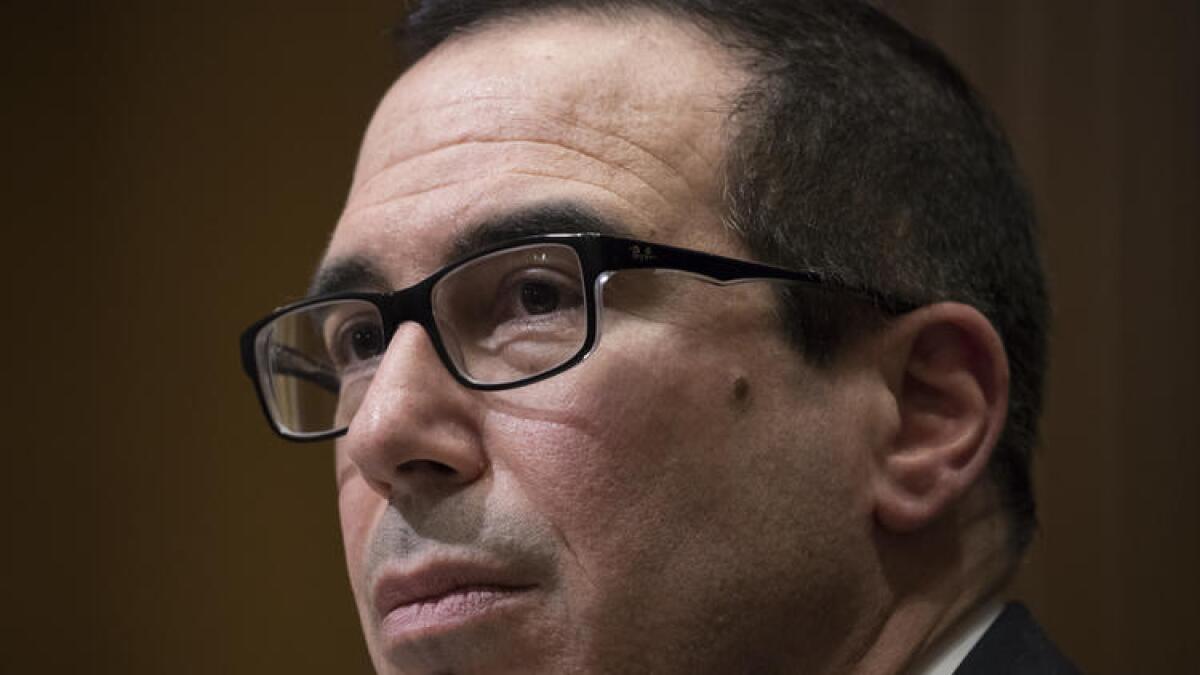
The Senate on Monday narrowly voted to confirm Wall Street executive Steven Mnuchin as Treasury secretary despite strong Democratic opposition fueled by foreclosures at Pasadena’s OneWest Bank when he headed it after the financial crisis.
The Senate’s 53-47 vote split along party lines. All 52 Republicans voted for Mnuchin, joined by only one Democrat, Joe Manchin of West Virginia.
Following a bruising confirmation battle that included accusations of false statements and a Democratic boycott of a committee vote on his nomination, Mnuchin becomes one of President Trump’s top Cabinet officials.
He faces a packed agenda.
White House spokesman says Trump is ‘evaluating the situation’ over Flynn
President Trump is “evaluating the situation” with national security advisor Michael Flynn, spokesman Sean Spicer told reporters Monday.
Spicer read the statement aloud immediately after Trump avoided shouted questions from reporters at the White House.
Trump’s silence about Flynn was telling. The president was willing to answer questions about another embattled member of his team, Chief of Staff Reince Priebus.
“Not a good job, a great job,” Trump said when asked about Priebus’ performance.
Flynn has been under intense scrutiny since the Washington Post reported last week that he discussed sanctions with a Russian diplomat before Trump took office, contradicting numerous denials from both Flynn and other top White House officials, including Vice President Mike Pence.
Flynn’s contacts with Ambassador Sergey Kislyak are under investigation by the FBI, according to multiple news reports.
After the Post reported on the contacts, Flynn’s aides backed away from their earlier denials, telling the newspaper that he “had no recollection of discussing sanctions,” but that “he couldn’t be certain that the topic never came up.”
The White House had declined to discuss Flynn’s fate throughout the weekend. But on Monday afternoon, before Spicer made his statement, Kellyanne Conway, a senior counselor to Trump, told MSNBC that Flynn has the “full confidence of the president.”
The contradictory messages have muddied the situation. Trump himself has yet to speak publicly about it and was notably silent on Twitter as the conversation consumed much of Washington media.
Federal agents nabbed more than 600 in immigration raids last week, Homeland Security chief says
Federal immigration agents arrested more than 600 people, including 161 in the Los Angeles area, during a weeklong dragnet targeting criminal offenders living in the country illegally, U.S. officials said Monday.
Agents arrested at least 680 people deemed “a threat to public safety, border security or the integrity of our nation’s immigration system” in the operation, according to a statement by Secretary of Homeland Security John Kelly.
More than 75% of those arrested were in the country illegally and had been previously charged with crimes ranging from homicide to sexual assault, Kelly said.
He described the raids as routine and not a stepped-up effort to find and deport migrants in the country illegally, as critics have charged.
U.S. Customs and Immigration Enforcement “conducts these kind of targeted enforcement operations regularly and has for many years,” Kelly said.
He said the arrests were concentrated around Los Angeles, New York City, Chicago, Atlanta and San Antonio.
Immigration advocacy groups reacted with alarm when reports of the raids spread across social media on Thursday and Friday.
The groups expressed concern that the sweeps represented a more aggressive push by the Trump administration to crack down on illegal immigration.
Officials with U.S. Immigration and Customs Enforcement (ICE) said the raids were focused on rounding up people with criminal records, as in the past.
In his statement, Kelly said “the focus of these enforcement operations is consistent with the routine, targeted arrests carried out” daily by ICE agents.
Trump tweeted on Sunday that “the crackdown on illegal criminals is merely the keeping of my campaign promise.”
In court filing, Trump administration suggests it won’t go to Supreme Court over travel ban -- for now
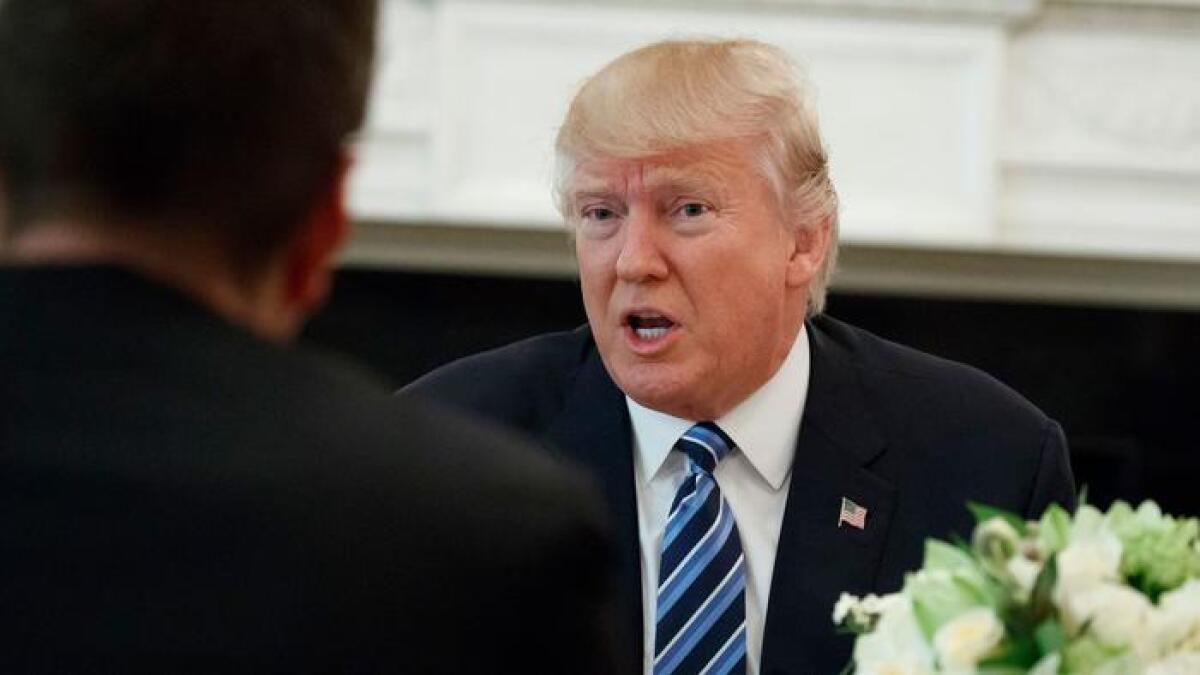
In a filing subitted to a Seattle federal court on Monday, the Department of Justice suggested it would not immediately turn to the U.S. Supreme Court to ask for the Trump administration’s travel moratorium to be reinstated after an appeals court dealt a blow to it last week.
In the filing, Acting Assistant Atty. Gen. Chad Readler told the U.S. District Court in western Washington that the department wanted to see how the case over the travel ban plays out in the 9th Circuit Court of Appeals before proceeding with the case in the lower court.
It’s the Seattle court where Judge James L. Robart on Feb. 3 called for a temporary nationwide halt to Trump’s travel ban, which the White House appealed to the 9th Circuit. Last week, three 9th Circuit judges upheld Robart’s decision. But then a judge from the full appeals court of 25 active judges asked for the wider court to vote on whether an en banc panel -- 11 judges -- should reconsider the government’s request to reinstate the travel ban.
Under court rules, the judge who made that request will remain anonymous. Legal scholars say the makeup of the 9th Circuit makes it its unlikely that the court will vote differently if it reconsiders the government’s request. The court has set a deadline of 11 a.m. Thursday for briefs on whether it should vote for an en banc panel.
The Seattle court and the 9th Circuit have not decided on the constitutionality of the travel ban but have only said it would do irreparable harm if it was reinstated while its constitutionality is decided.
Trump could ask the Supreme Court to vote on whether the ban should go forward while lower courts deliberate constitutional questions.
Last week, White House officials first signaled that they would not go to the nation’s highest court, and then said they were still open to the idea. But the court filing on Monday -- which does not rule out the Supreme Court option-- suggests the White House will avoid going to it for the time being because it wants to see if the 9th Circuit would be open to reconsidering its earlier decision on the ban.
Trump has also said he could sign a new executive order on immigration, which could allow him to circumvent some of the current court fights but possibly open him up to new ones. If signed, it’s expected a new order would be more limited than the current one, which declares a moratorium on travel from nationals of seven mostly Muslim countries, temporarily suspends the admission of refugees and indefinitely bars Syrian refugees.
Meanwhile, the states of Washington and Minnesota, which had brought the Seattle case against Trump, also made a new filing in the district court on Monday. The states argue that the case in Seattle should proceed so the constitutionality of the travel ban can be determined.
Robart granted the states’ request on Monday afternoon.
Canada’s Trudeau balks at hitting Trump over refugee policy during White House visit
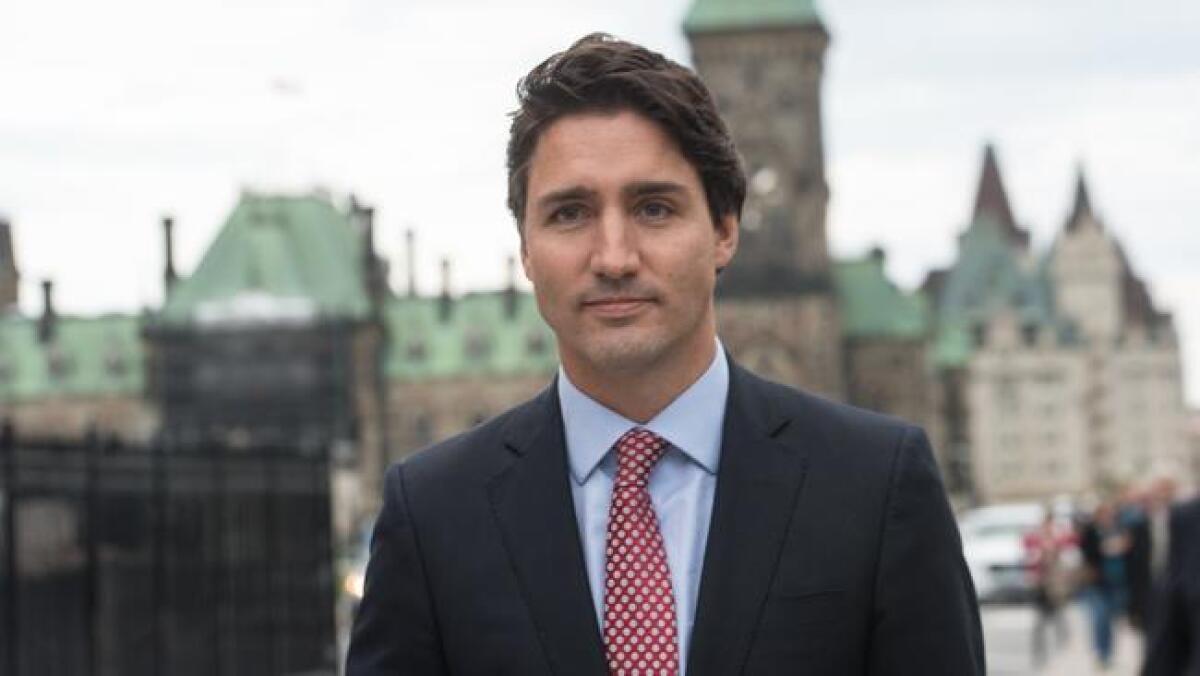
President Trump, a conservative populist, and Canadian Prime Minister Justin Trudeau, a new generation liberal, painted over ideological differences during a cordial joint appearance Monday at the White House.
The two differ sharply on refugees, with Trump’s attempt to block them from entering the country at the top of his agenda and Trudeau making a show out of welcoming many into his country.
Trudeau said the two countries’ differences have always been handled “firmly and respectfully” when asked about the contrast during a joint news conference.
“The last thing Canadians expect is for me to come down and lecture another country on how they choose to govern themselves,” Trudeau said.
The two also spoke positively about the trade relationship, even as Trump has relentlessly criticized the North American Free Trade Agreement. Trump said his issues with the treaty relate more to Mexico and that the trading relationship with Canada requires only tweaking.
Warren, other Democrats train attacks on Labor nominee Puzder
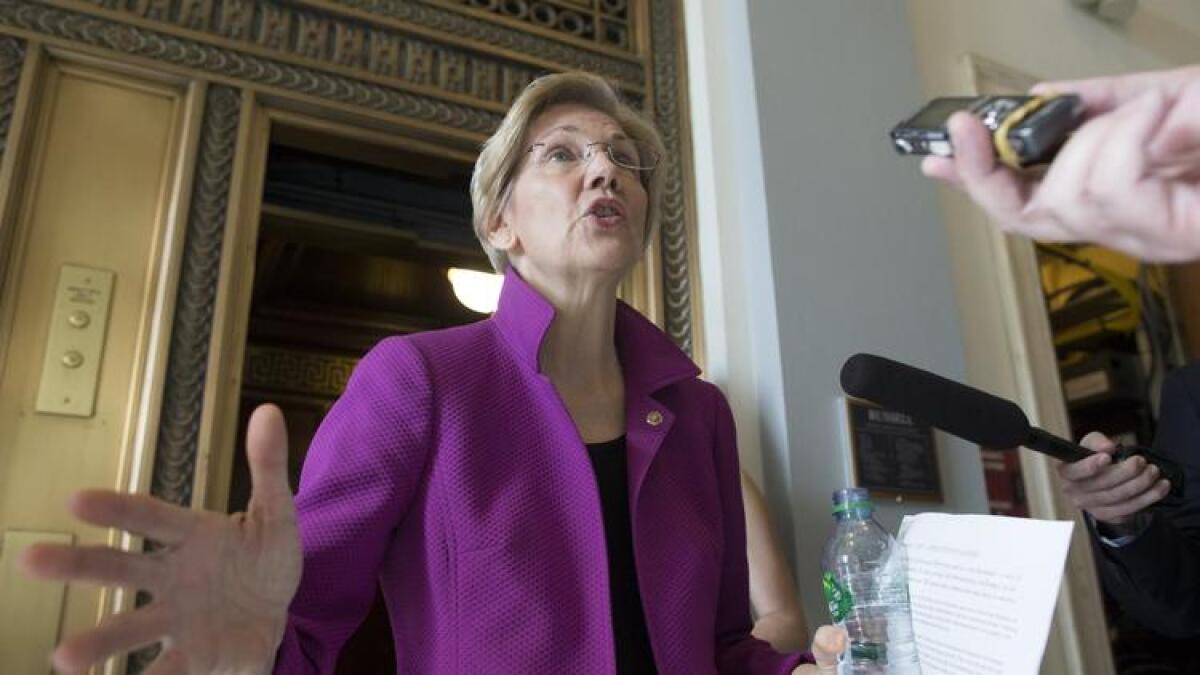
Sen. Elizabeth Warren (D-Mass.) sent Labor secretary nominee Andy Puzder a lengthy list of questions as top Senate Democrats trained their fire on the fast-food executive ahead of his confirmation hearing this week in hopes of knocking off the last of their top targets among President Trump’s Cabinet choices.
Puzder, the chief executive of Carpinteria-based CKE Restaurants Inc., the parent company of the Carl’s Jr. and Hardee’s chains, is scheduled to face tough queries at a Senate hearing on Thursday.
Warren gave him a preview Monday in a 28-page letter.
“My staff’s review of your 16-year tenure as CEO of CKE Restaurants, Inc., the parent company of Hardee’s and Carl’s Jr., reveals that you’ve made your fortune by squeezing the very workers you’d be charged with protecting as Labor Secretary out of wages and benefits,” Warren wrote.
“Your company’s record of prolific labor law abuses and discrimination suits -- the most of any major burger chain -- gives me great pause given that as Labor Secretary you’d be charged with enforcing these very laws,” she said.
Puzder is the last of the eight nominees targeted by Senate Democratic leaders to have a hearing after scheduled sessions were delayed four times as the committee awaited his ethics and financial disclosure paperwork.
Trump welcomes Canada’s prime minister in test of neighborly relations
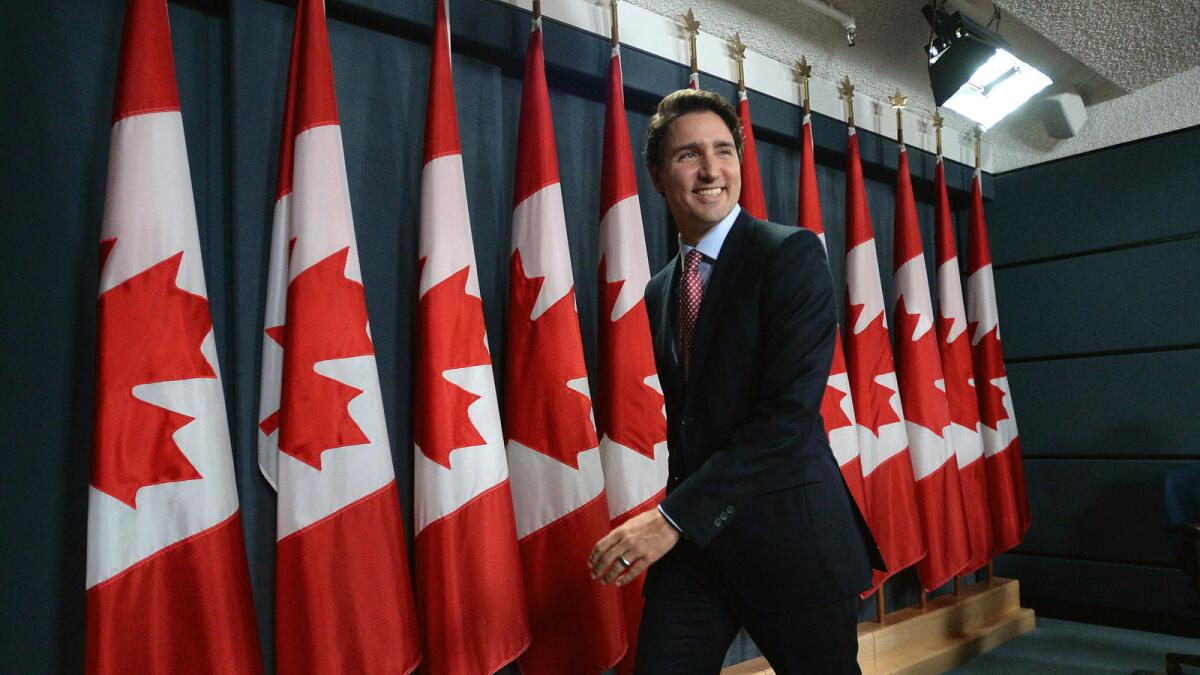
President Trump’s charm offensive with world leaders continues Monday as he welcomes Canada’s prime minister to the White House for a visit where they are expected to discuss two of Trump’s major campaign issues, trade and immigration.
Canada is the U.S.’ second-largest trading partner, and the North American Free Trade Agreement will likely be part of the discussion between Trudeau and Trump, along with global security challenges like the fight against Islamic State and renewed tensions in the Korean peninsula after North Korea test-fired a ballistic missile over the weekend.
Canada has also seen a steady increase in refugees seeking help in recent weeks after being denied asylum in the U.S. or concluding that Trump’s travel ban has created unwelcome and even unsafe conditions for them.
After a weekend in which he dined and golfed with Japanese Prime Minister Shinzo Abe, and more than a week after he held the hand of Britain’s prime minister and paid tribute to America’s “special relationship” with her country, Trump welcomes Justin Trudeau, the young prime minister who had forged a close bond with President Obama.
The telegenic 45-year-old leader of Canada’s Liberal Party credited his 2015 victory in part to a campaign message inspired by Obama’s. At his first meeting that fall with Obama, the president teased Trudeau about his good looks while celebrating their shared commitment to combating climate change and enacting a major Pacific Rim trade deal.
After Trump’s election, Vice President Joe Biden said the world would look to Trudeau to play the same kind of role in global leadership that Obama had played.
“The progress is going to be made but it’s going to take men like you Mr. Prime Minister, who understand it has to fit within the context of a liberal economic order, a liberal international order, where there’s basic rules of the road,” Biden said at a dinner Trudeau hosted for him in the Canadian capital.
Trump and Trudeau will meet privately in the Oval Office and then hold an expanded meeting with other officials from their respective administrations. Later, they will discuss over lunch ways to empower women in the workplace, according to the White House.
They will close the visit with a news conference before Trudeau heads to Capitol Hill for meetings with House Speaker Paul D. Ryan and Senate Majority Leader Mitch McConnell.
Mexican President Enrique Peña Nieto canceled a planned White House visit amid Trump’s insistence that Mexico would ultimately bear the cost of his promised border wall. That visit was intended to focus primarily on another major Trump campaign pledge: renegotiating NAFTA, the more than 2-decade-old trade pact among the U.S., Mexico and Canada.
Hezbollah leader says Trump gives him optimism. (He doesn’t mean it as a compliment)
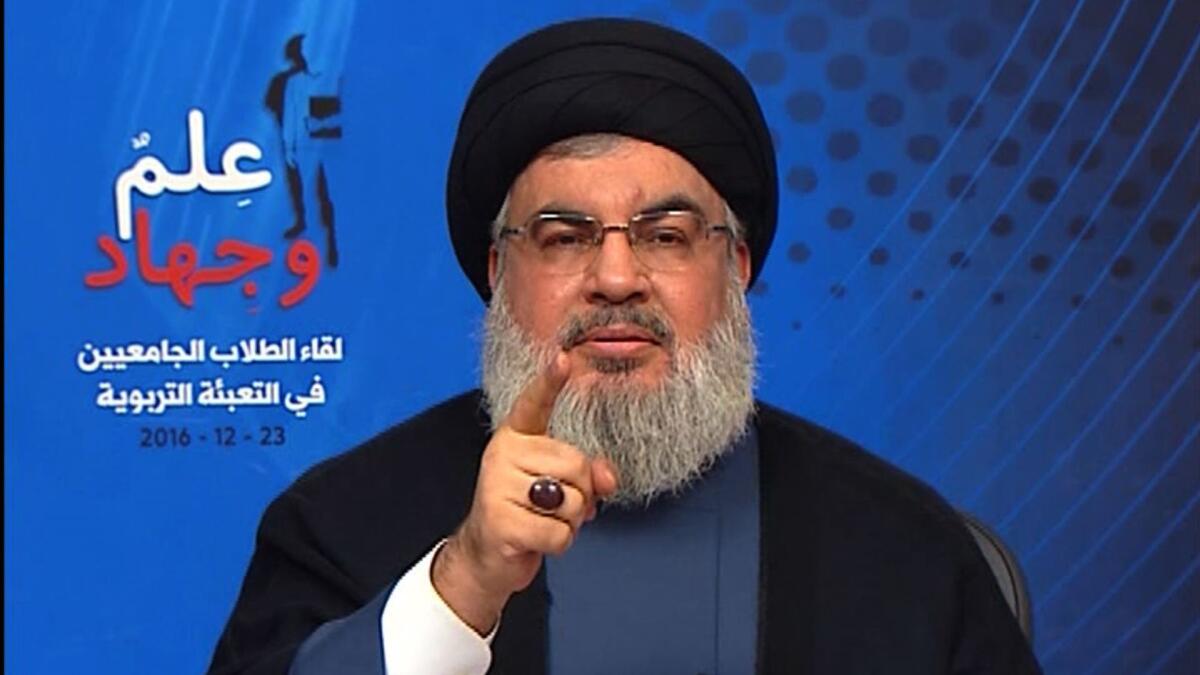
The leader of the Lebanese Shiite group Hezbollah said Sunday that having an “idiot” in the White House is a cause for optimism and will bring “relief” to people around the world.
Hassan Nasrallah, whose group is considered a terrorist organization by the United States, made his remarks in a televised speech in which he said that President Trump has revealed “the true face of the U.S. administration.” He described it as “ugly, unjust, criminal, and racist.”
“So what if Trump comes? What’s new?” he asked.
“We are not worried, but very optimistic because when an idiot resides in the White House, this is the beginning of the release for the oppressed in the world,” he said. The Arabic word he used can also be translated as “fool.”
Hezbollah, a political faction with a powerful armed wing that is supported by Iran, has been a key ally, along with Russia, of Syrian President Bashar Assad in his almost six-year fight against anti-government opposition rebels.
Mexico City protesters: ‘We are not against the American people. This is about Trump’

Thousands of demonstrators waving Mexican flags and signs denouncing President Trump marched through central Mexico City on Sunday, the largest mobilization in the capital to date against the controversial polices of the Trump White House.
“We are not against the American people: This is about Trump, who is spreading hate and division,” said Maria Garcia, a former resident of Chicago who carried an unflattering, paper-mache likeness of the U.S. president. “The United States and Mexico are natural friends and allies, but Trump is destroying this.”
Organizers dubbed the march “Vibra Mexico” (roughly, Mexican vibe), and mounted an aggressive social media campaign encouraging people to attend. Police turned out in force to maintain security.
Top Trump aide again asserts widespread vote fraud, cites no evidence
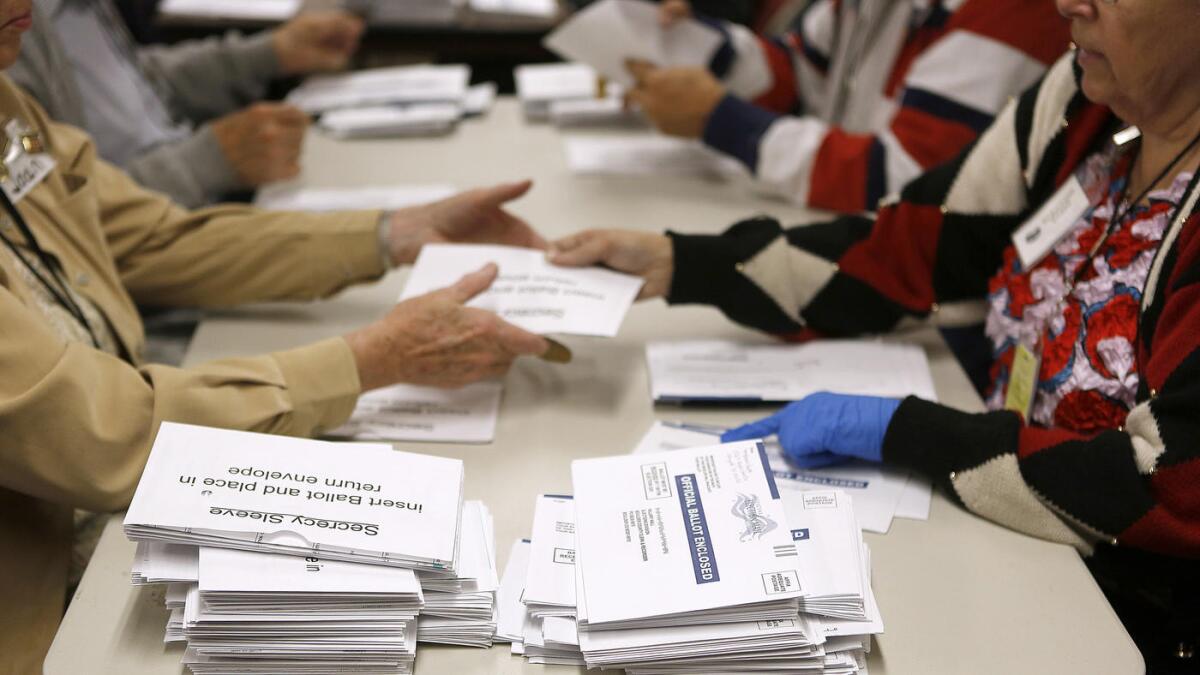
The Trump administration continued Sunday to assert a widely debunked claim that massive vote fraud helped deprive the president of a popular-vote victory in November’s election.
President Trump’s senior policy advisor Stephen Miller said in an interview aired Sunday on ABC’s “This Week” that “the noncitizen voting issue is pervasive and widespread.”
Trump has said that he lost the popular vote to Democrat Hillary Clinton only because 3 million to 5 million illegal immigrants had cast votes for her. Clinton’s margin of victory in the popular vote was more than 2.8 million, while Trump won the electoral college vote, 304-227.
That claim of massive illegal voting has been denied by Republican officials in key states, such as Ohio, and by independent observers. Administration officials have never offered any evidence for it.
Democrats say the unsubstantiated fraud claim is being used by Trump and his supporters to pave the way for state legislation meant to suppress turnout by groups that tend to vote Democratic, including African Americans and young people.
A week ago, Trump said he planned to have a special commission overseen by Vice President Mike Pence investigate alleged voter fraud.
In an interview on Sunday, Sen. Bernie Sanders (I-Vt.) ridiculed the notion that widespread illegal voting had occurred in the November election.
“When somebody goes before you and the American people, saying ‘3 to 5 million people voted illegally in the last election,’ nobody believes that,” said Sanders, who had sought the Democratic presidential nomination. He was interviewed on NBC’s “Meet the Press.”
“There is not a scintilla of evidence,” Sanders said. “What would you call that remark? It’s a lie. It’s a delusion.”
Sen. Al Franken (D-Minn.), in a separate interview, said the voter-fraud claim was one of several that had caused him and some other lawmakers to wonder if Trump was “not right mentally.”
Speaking on CNN’s “State of the Union,” Franken said such a statement was “not the norm for a president of the United States, or actually for a human being.”
In the ABC interview, interviewer George Stephanopoulos pressed Miller for evidence of massive voter fraud. Miller provided none, but asserted that Americans should be “aghast.”
Miller also returned to a theme advanced by Trump in a meeting with lawmakers last week that he lost the New Hampshire vote in the general election because thousands of illegal ballots were cast by residents of neighboring Massachusetts.
“I can tell you that this issue of busing voters into New Hampshire is widely known by anyone who’s worked in New Hampshire politics,” Miller said on ABC. “It’s very real. It’s very serious.”
New Hampshire has a law requiring voters to show identification before casting a ballot.
Earlier this week, when Trump first raised the New Hampshire claim, the state’s former Republican senator Kelly Ayotte, who lost her reelection bid in November, noted that she could have asked for a recount if she had thought the election was tainted by improper voting. She did not do so.
On Sunday, one of the New Hampshire GOP’s most experienced officials, Tom Rath, a former attorney general of the state, also denied Trump’s suggestion, sending a tweet in which he called it “baseless” and “shameful.”
12:57 p.m.: This post was updated with Tom Rath’s tweet.
After early setbacks, Trump faces calls to shift tactics
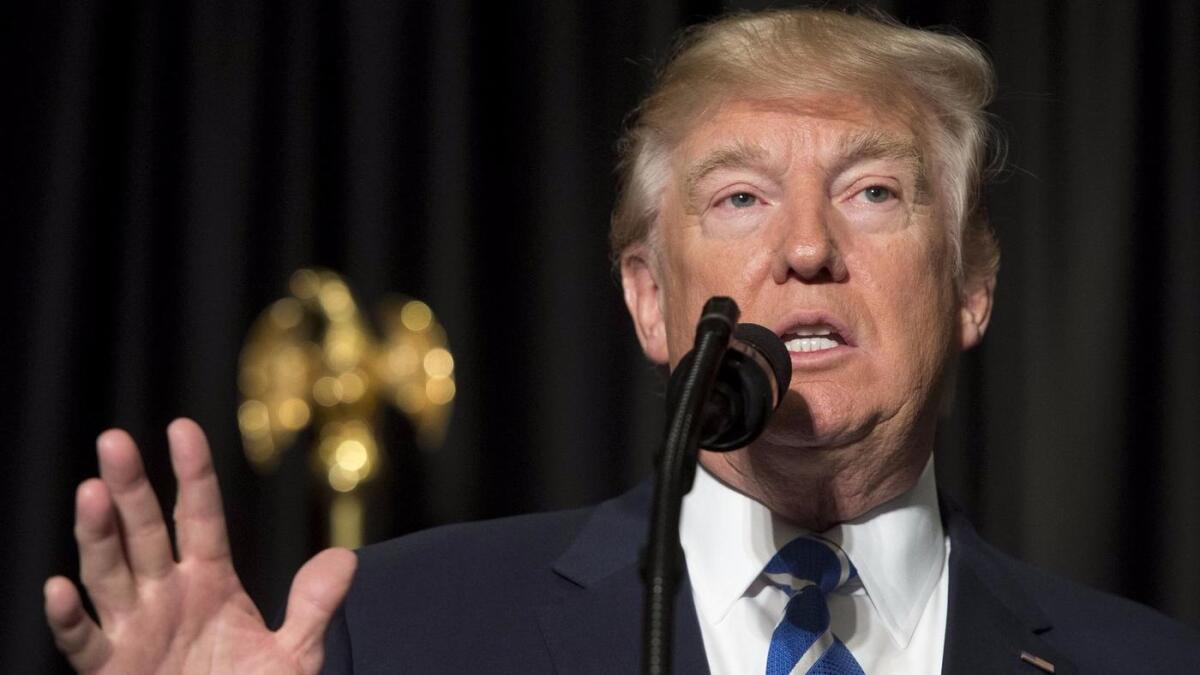
When other presidents were dealt the kind of jolting setback that President Trump received from the courts this week, they learned from those moments to alter their approaches to the job.
Trump, however, has a history of stubbornness and a self-proclaimed mission to upend almost everything his predecessors have done. That could color how he confronts the new limits on his power as he tries to make the kind of sweeping change he expected to deliver on his own.
Signs of struggle inside the White House have emerged between those who want Trump to keep his hyper-aggressive style and those who would like to see him seek more consensus.
So far, those who like new policies to land with the clatter of breaking glass have had the most sway. But Thursday’s ruling that blocked Trump from suspending the country’s refugee program and travel from seven Muslim-majority countries capped a week that saw his authority under assault on several new fronts.
Trump’s Middle East policy could be clarified with Netanyahu visit
Israeli Prime Minister Benjamin Netanyahu arrives in Washington on Tuesday hoping to find in President Trump a kindred spirit and compliant ally after eight years of personal friction with President Obama.
The reality may be more complicated.
As a candidate, Trump signaled he would show staunch support for Netanyahu and his allies in Israel in crucial ways, including backing Israel’s growing settlements in the West Bank, moving the U.S. Embassy to Jerusalem and tearing up the Iran nuclear deal.
He also hinted he might reverse decades of U.S. policy by abandoning the search for a so-called two-state solution that envisions an Israeli nation and a Palestinian nation living side by side in peace.
But after three rocky weeks in office, Trump has backed down on a raft of foreign policy issues — reaffirming the “one China” policy with Beijing and vowing “strong support” for the NATO military alliance in Europe — and he now appears to be reevaluating his Israel policy as well.
White House still weighing options on travel ban, looking toward restrictions on work visas, top aide says
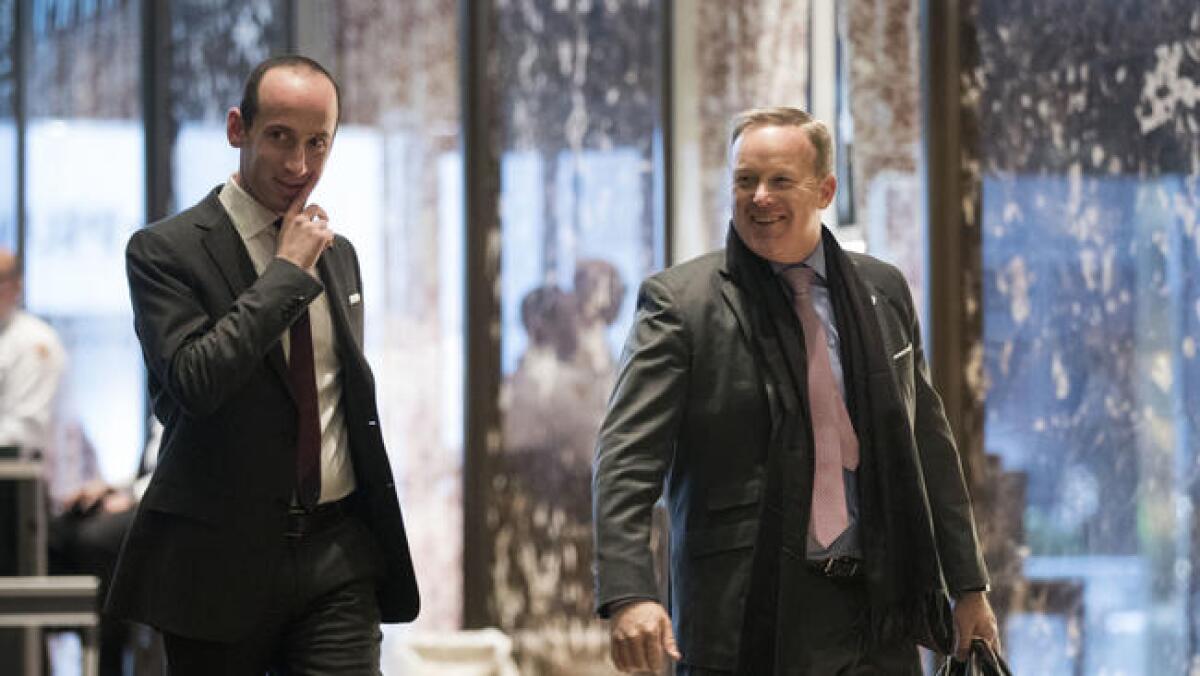
President Trump’s senior policy adviser says the administration is still “considering all our options” in the legal fight over Trump’s travel moratorium.
Policy adviser Stephen Miller also pointed toward an expected move by the administration to cut back on H1B visas, which are issued for foreigners to work in specialty occupations. The high-tech industry is heavily reliant upon such workers.
“I believe that we should have a program in which American workers are given jobs first,” Miller said in an interview on NBC’s “Meet the Press.”
“If you have an open job in this country, a U.S. citizen or existing legal permanent resident ought to have the ability to make the first application for that job.”
The U.S. 9th Circuit Court of Appeals, based in San Francisco, dealt a blow to the president’s policies last week by refusing to reinstate his temporary ban on travel from seven mostly Muslim countries. The government has 14 days to respond to that decision.
Miller said various legal scenarios were being weighed, including an appeal in the 9th Circuit or seeking an emergency stay at the Supreme Court.
“And yes, you could pursue additional executive actions,” said Miller, a principal author of the controversial travel ban. Administration officials indicated Friday that in the next few days, Trump could issue a new executive order, written to avoid the legal problems the current order has encountered.
“The bottom line is that we are pursuing every single possible action to keep our country safe from terrorism,” Miller said.
He also renewed the White House attack on what the president and senior aides have characterized as overreach by the courts. Trump had earlier referred to James Robart, the U.S. District judge in Seattle who initially blocked enforcement of the travel ban, as a “so-called judge.”
“There’s no such thing as judicial supremacy,” Miller said in the NBC interview, adding that judges at both the district and appeals court level had taken “power for themselves that belong squarely in the hands of the president of the United States.”
White House is keeping doubts alive about the future of national security advisor Michael Flynn
The ominous silence around the Trump administration’s national security advisor, retired Gen. Michael T. Flynn, deepened Sunday as a senior White House official in a televised interview declined to say if the president still has confidence in him.
“That’s the question that I think you should ask the president, the question you should ask Reince [Priebus], the chief of staff,” Stephen Miller, the White House senior policy advisor, said on NBC’s “Meet the Press” when asked if Trump still has confidence in Flynn.
“So the White House did not give you anything to say,” asked the show’s host, Chuck Todd.
“They did not give me anything to say,” Miller responded.
Miller’s silence on Flynn was significant because the White House had booked him on several of the major Sunday television interview programs as the administration’s spokesperson this weekend.
White House officials appear to have deliberately chosen Miller, whose portfolio does not include foreign policy, in part to avoid having to give a definitive answer about Flynn.
Flynn’s future with the administration is at issue because of indications that he may have misled his colleagues, including Vice President Mike Pence, about his contacts with the Russian ambassador during the weeks before Trump’s inauguration. That would normally be a severe problem for someone in Flynn’s position, but Trump may not want to appear to be dropping an aide under pressure from the media and Democratic critics.
The FBI has been examining Flynn’s contacts with Ambassador Sergey Kislyak, according to multiple news reports. Agents are looking at whether Flynn tried to undermine the Obama administration’s move to toughen sanctions against Moscow after concluding that Russia had meddled in the U.S. election.
Flynn had publicly denied discussing sanctions with Kislyak. But on Thursday, a Washington Post account, citing nine current or former U.S. officials, flatly contradicted those denials. The article quoted a representative for Flynn as backing away from his previous statements, saying that though Flynn “had no recollection of discussing sanctions, he couldn’t be certain that the topic never came up.”
Since the Post published its report, the White House has passed up several opportunities to publicly back up Flynn. Trump, asked about the report on Friday, said he was unaware of it.
Shortly after Miller’s appearances on “Meet the Press” and ABC’s “This Week,” Trump tweeted his approval of Miller’s statements, again without mentioning Flynn.
Aides to Pence, who had publicly repeated Flynn’s denials in a television interview, have signaled their boss’ unhappiness with the national security advisor. After the Post published its account, a White House official pointedly told the paper that Pence had made his statements based on what Flynn had told him.
Flynn’s contacts with Kislyak may not have broken any laws; the relevant one, the Logan Act, which bars private citizens from interfering with U.S. diplomacy, is an 18th century statute that is periodically waved around as a threat, but has never been used for a prosecution.
But if Flynn misled Pence and other colleagues about what he did, that could make his continued presence in the national security job untenable.
Several leading Democrats in Congress have said the reports suggest Flynn should be fired.
7:52 a.m.: This post was updated with Trump’s tweet.
Dominican paper apologizes after illustrating Trump story with photo of actor Alec Baldwin
Is this what President Trump had in mind when he railed against “fake news”?
A newspaper in the Dominican Republic illustrated a news story about U.S.-Israeli relations with a photo of actor Alec Baldwin doing his send-up of Trump on “Saturday Night Live.”
Under a story headlined “Trump says settlements in Israel don’t favor peace,” the photo of Baldwin/Trump appears next to one of Israeli Prime Minister Benjamin Netanyahu. Both wear red ties and serious expressions.
In a correction posted online Saturday, El Nacional says the photo of Baldwin was transmitted by the Associated Press with the actor’s name attached, but the image inadvertently ended up on page 19 of Friday’s paper. El Nacional apologized for the error.
The president is no fan of Baldwin’s portrayals of him, declaring them “not funny” and “unwatchable.” For his part, Baldwin once tweeted that he’ll stop portraying Trump if he releases his tax returns.
Trump and Abe awkwardly shake hands and Twitter loves it
The U.S. president and Japan’s prime minister met Friday. On the agenda were major world issues, including trade, the future of the U.S.-Japan security alliance and disputed islands in the East China Sea.
But at least in the world of social media, the biggest news was the handshake between the two world leaders at a photo-op in the Oval Office.
President Trump took Prime Minister Shinzo Abe’s hand and they shook. And shook. And shook some more.
With cameras clicking wildly they kept at it for 19 seconds, with the president patting the prime minister’s hand intermittently and awkwardly jerking Abe’s hand forward at one point.
When they finally let go, Abe sat back in his chair and appeared to roll his eyes and sigh -- perhaps in relief, perhaps as a joke.
The exchange prompted a flurry of reactions on social media.
Trump may not appeal to Supreme Court on travel ban, plans new, narrower order
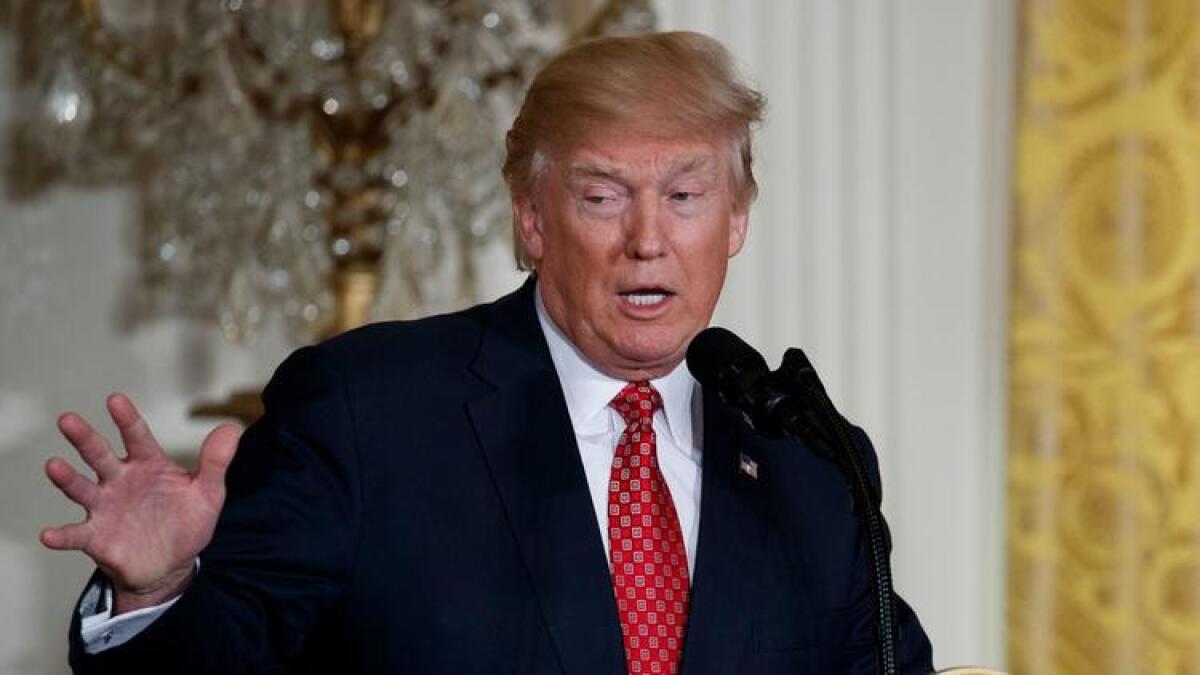
President Trump said Friday that he was considering a new executive order limiting immigration, and White House aides confirmed that the administration may decide not to go to the Supreme Court to defend his current travel ban.
The administration has “a lot of other options, including just filing a brand new order,” Trump told reporters on Air Force One as he flew to Florida with Japanese Prime Minister Shinzo Abe.
The new order would not come until next week, Trump added.
Officials said the administration still planned to defend its legal position before either the 9th Circuit Court of Appeals or the federal district court in Seattle, which have temporarily blocked Trump’s current travel ban from taking effect.
“We are actively pursuing changes or other EOs that will keep our country safe from terrorism,” said a senior administration official, referring to further executive orders.
“The TRO we would not take to the Supreme Court,” the official said, referring to the existing court order.
Subsequently, however, a senior official said that the question of whether to ask for Supreme Court review remained undecided.
“We are reviewing all of our options in the court system,” the official said.
The federal court in Seattle issued a temporary restraining order a week ago that blocked Trump from enforcing his travel ban. The court of appeals upheld that order Thursday night.
The courts have planned to hold further hearings on whether to issue a permanent injunction. Trump’s new orders, which are expected to be more narrowly focused, could make the existing cases moot, however.
The current order, which Trump issued on Jan. 27, made several changes in U.S. immigration policy. It banned entry by citizens of Iran, Iraq, Libya, Somalia, Sudan, Syria and Yemen for 90 days, It also temporarily banned all refugee entries into the U.S. and indefinitely suspended the admission of Syrian refugees. And it created a preference for refugees who are members of persecuted religious minorities.
The administration now seems likely to rescind that order and issue one or more new ones that would suspend refugee admissions and limit new visas from a specific list of countries, according to an administration official familiar with the internal deliberations.
The new orders would allow everyone who already holds a visa or refugee status to keep it. Doing that would eliminate the bulk of the legal flaws that courts have focused on so far.
“The team is reviewing options” to present to the president. “But ultimately it’s all short term anyway because we are going to prevail on the merits of the case,” White House Press Secretary Sean Spicer said.
3:10 p.m.: This story was updated with President Trump’s comment on Air Force One and more details of the administration’s plans.
Court asks Trump for his next move after travel ban defeat
After the U.S. 9th Circuit Court of Appeals issued a blow to President Trump’s travel moratorium on Thursday by refusing to reinstate it, courts and lawyers around the country have been grasping to find out what the White House will do next.
The 9th Circuit has told government lawyers they have 14 days if they want to respond to the decision from three judges who refused to stay a temporary restraining order issued from a lower court judge blocking enforcement of the travel ban while the case is decided.
The government could ask for reconsideration from the same judges, or from a larger group of 11 judges.
But with what appear to be slim chances of getting the ban reinstated by the appeals court, it’s unclear whether the Justice Department would try either option, said UC Irvine Law School Dean Erwin Chemerinsky.
It may not have to. On Friday, a judge on the appeals court made a request that the full court of 25 active judges vote on whether it should on its own -- without a motion from Trump’s lawyers -- reconsider the decision from the court’s motions panel. The court has set an deadline of 11 a.m. on February 16 for briefs on that question.
In the meantime, U.S. district Judge James L. Robart in Seattle, who a week ago issued the restraining order that halted Trump’s travel ban nationwide, has ordered lawyers from the Department of Justice and the states of Washington and Minnesota to submit a joint report to the court by Sunday night about how the case should proceed.
The question at this point: Does it go back to Robart’s court to decide whether his temporary restraining order should be turned into a full preliminary injunction, which would have the effect of extending the order banning enforcement of the travel ban for a longer period? Or does the 9th Circuit’s ruling, as lawyers for the state of Washington have suggested, already have the effect of a preliminary injunction?
The judge has scheduled a telephone conference with lawyers on the case at 11 a.m. Pacific on Monday to discuss next steps.
“You’re seeing each court going about its business, not knowing what will happen in other courts,” Chemerinsky said. “The federal court is saying, ‘Tell me, each side, what should we do next?’ The 9th Circuit is giving the standard amount of time for Trump to ask for reconsideration.”
Meanwhile, judges and lawyers around the country, who are scheduled for hearings over dozens of lawsuits filed over Trump’s travel order, also are sorting through how their cases should proceed in the wake of the 9th Circuit’s decision.
At a Friday hearing at an Alexandria, Va., federal court over the state of Virginia’s suit against Trump, a federal lawyer indicated the government had not decided on how to reply to Thursday’s ruling.
“We may appeal. We may not,” Department of Justice attorney Erez Reuveni said to U.S. District Judge Leonie M. Brinkema. “All options are being considered.”
Brinkema, who said that the executive order “has all kinds of defects” and “clearly is overreaching,” demanded evidence from the government that the travel ban was needed.
“The courts have been begging you to provide some evidence, and none has been forthcoming,” she said.
DeVos blocked by protesters as she attempts to visit Washington, D.C., public school
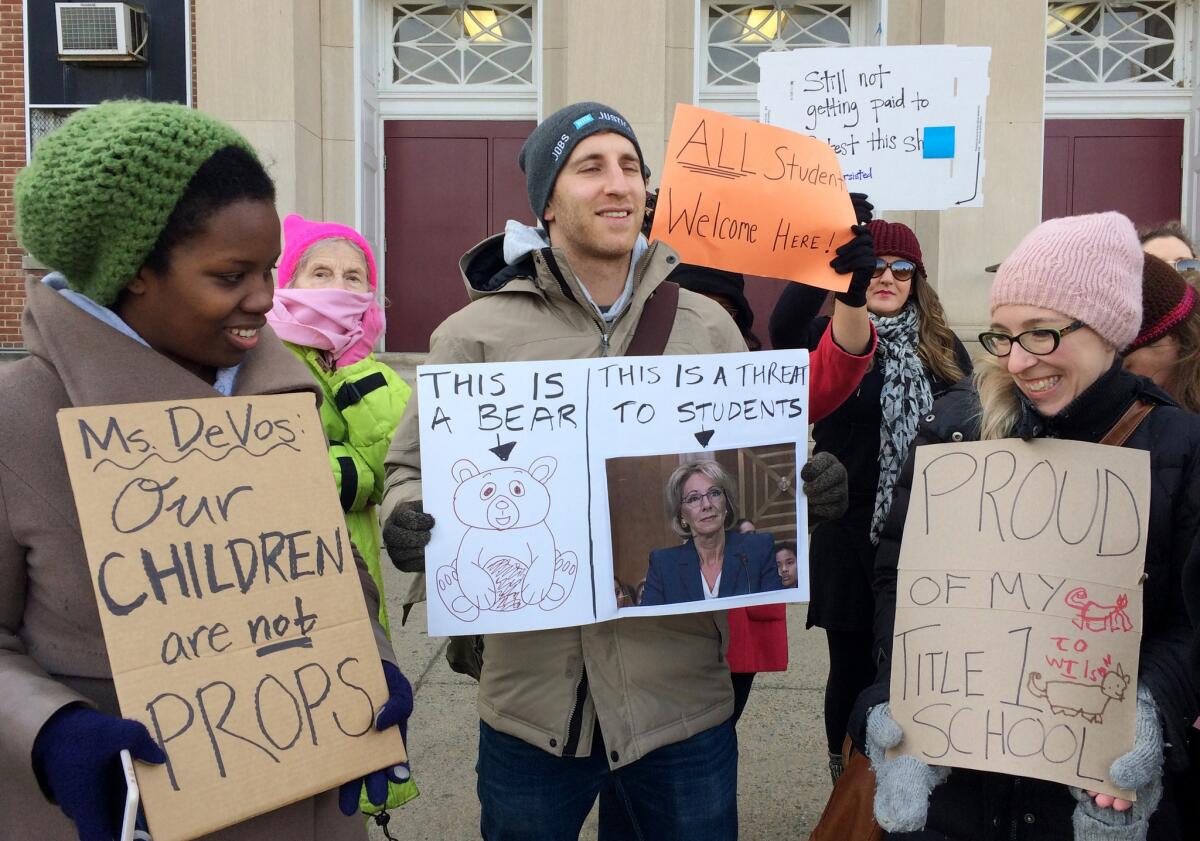
On Friday, on her third day as President Trump’s Education secretary, Betsy DeVos visited Jefferson Academy, a middle school in southwest Washington, D.C.
When she got there, she was surrounded by protesters from various parent groups , the local teachers union and the Movement 4 Black Lives. A video shows protesters blocking DeVos and her security detail as they shouted, “You do not represent anything that we stand for,” and, “Shame, shame, shame.”
Democrats demand answers from Trump after report on his national security advisor’s contact with Russia
Democratic lawmakers demanded Friday that President Trump address a report that his national security advisor, retired Army Gen. Michael Flynn, discussed U.S. sanctions against Russia with that country’s ambassador in December, before Trump took office.
The FBI has been examining Flynn’s contacts with Ambassador Sergey Kislyak, according to reports. At issue is whether Flynn tried to undermine the Obama administration’s move to toughen sanctions against Moscow after concluding that Russia had meddled in the U.S. election.
A Washington Post account, citing nine current or former U.S. officials, flatly contradicted Flynn’s repeated public assertions that he had not discussed sanctions with Kislyak. On Thursday, a representative for Flynn backed away from those statements, telling the Post that though Flynn “had no recollection of discussing sanctions, he couldn’t be certain that the topic never came up.”
Vice President Mike Pence had repeated Flynn’s flat denials in a television interview, and after the Post published its account, a White House official pointedly told the paper that Pence had made his statements based on what Flynn had told him.
Flynn should be fired if he did warn Kislyak, said the ranking Democrat on the intelligence committee, Rep. Adam Schiff (D-Burbank).
“The allegation ... raises serious questions of legality and fitness for office,” Schiff said in a statement. “If he did so, and then he and other administration officials misled the American people, his conduct would be all the more pernicious, and he should no longer serve in this administration or any other.”
Rep. Eric Swalwell (D-Dublin), the ranking Democrat on the panel’s CIA subcommittee, said Flynn should be suspended until the allegations are investigated.
Later Friday, two Democrats on the Senate Foreign Relations Committee, Edward Markey of Massachusetts and Chris Murphy of Connecticut, added to the calls for an investigation.
Flynn’s contacts with Kislyak may not have broken any laws; the relevant one, the Logan Act, which bars private citizens from interfering with U.S. diplomacy, is an 18th century statute that is periodically waved around as a threat, but has never been used for a prosecution.
1:13 p.m.: This story was updated with reaction from Democratic senators.
Many conservatives dismissive of appellate court’s travel-ban ruling against Trump
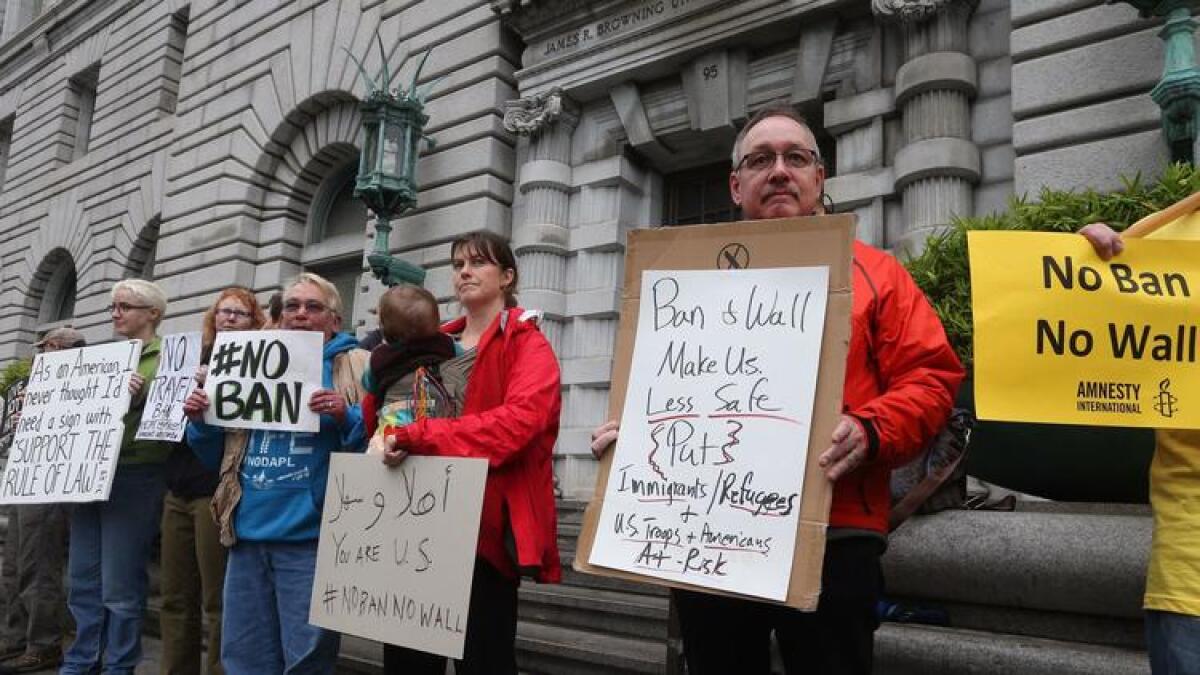
Will the Trump administration find a way to effect a travel ban?
If you pore through conservative media, the answer is clear: yes.
A day after the 9th U.S. Circuit Court of Appeals refused to reinstate President Trump’s controversial executive order barring travelers from seven majority-Muslim countries, there were plenty of conservative views noting that this issue is far from resolved.
Trump tweeted on Friday that it was a “disgraceful decision” -- and there was agreement out there.
Here are some of today’s headlines:
9th Circuit has 80 percent reversal rate at Supreme Court (Daily Caller)
The case is likely to eventually reach the U.S. Supreme Court, where eight justices could hear the matter as Trump’s nominee for the high court, Neil Gorsuch, awaits confirmation. This could lead to a 4-4 decision, which would leave the lower court’s rulings in place.
Still, this article focused on an American Bar Assn. analysis from 2010, which found that eight of out of 10 cases from the 9th Circuit that are reviewed by the Supreme Court are overruled.
“The 9th Circuit, which is known for its liberal tendencies, has the second-highest reversal rate of the 13 appellate courts below the Supreme Court,” the analysis noted.
It is notable that the appellate panel which heard the case this week, comprised of three judges -- two Democratic appointees and one appointed by a Republican -- unanimously ruled against Trump.
Analysis: Ninth Circuit would allow 9/11 hijacker to sue to come to U.S. (Breitbart)
Trump says it’s all about safety.
This analysis piece argues that the 9th Circuit ruling would allow a 9/11 terrorist to sue the government to stay in the United States.
Hani Hasan Hanjour was one of the four pilot hijackers and “was from Saudi Arabia, a country not covered by the executive order,” wrote Joel B. Pollak.
“By the reasoning of the Ninth Circuit, however, Hanjour would have due process rights to challenge his exclusion from the United States once he had been granted a student visa,” Pollak wrote. “His relationship with a U.S. ‘institution’ — in this case, an English as a Second Language school in Oakland, California — would have been enough to grant him standing. A state could have sued on his behalf even while he was still abroad.”
The Donald v. The Judges (American Spectator)
Since he entered office on Jan. 20, it seems Trump has consistently battled judges. First it was U.S. District Judge James Robart in Washington state. Then, the judges of the 9th Circuit Court. His administration has even faced questions about whether he’s battling with Gorsuch, who has called some of Trump’s comments about the judges in the case “demoralizing.”
This article argues that it’s indeed not new for a president to battle the courts and create immigration bans.
“Not only does history offer precedent for the president’s ‘unprecedented’ criticism of the judiciary, so too does it provide ample examples of past chief executives restricting immigration based on broad-brush classifications such as national origin,” wrote Daniel J. Flynn.
“President Franklin Roosevelt banned Japanese, Germans, and Italians from American soil by fiat the day after Pearl Harbor. Unlike Trump, he did not merely suspend entry for 90 days to check their backgrounds. The fact that they came from Japan, Germany, or Italy was all he needed to prohibit entry. While not all past restrictions appear as wise in retrospect as Roosevelt’s, this does not mark them as unlawful.”
Trump: ‘I have no doubt that we’ll win’ travel ban lawsuit
President Trump insisted Friday that his proposed ban on entry into the U.S. from seven nations would ultimately be upheld in the courts, despite two legal setbacks in the last week, but he signaled that his administration was preparing separate steps to ensure national security.
“I have no doubt that we’ll win that particular case,” Trump said one day after a three-judge panel of the 9th U.S. Circuit Court of Appeals upheld a lower-court judge’s decision to freeze Trump’s order. Both rulings mean that travelers from the seven predominantly Muslim countries — Iraq, Syria, Iran, Libya, Somalia, Sudan and Yemen — are allowed to come into the U.S. while the lawsuit is adjudicated.
Speaking at a White House news conference alongside Japanese Prime Minister Shinzo Abe, Trump said he would “do whatever is necessary to keep our country safe.”
“We’ll be doing something very rapidly having to do with additional security for our country. You’ll be seeing that sometime next week,” he said, without providing details.
Analysis: Appeals court ruling was the biggest warning to Trump yet on how he’s approaching the presidency
The appellate court repudiation of President Trump’s travel ban marked the first high-level loss for a new administration that, for all the chaos it has inflicted on Washington and itself, had thus far largely succeeded in accomplishing its goals.
Before the judicial panel refused Thursday to reinstate Trump’s order — which prevented entry into the U.S. from seven mostly Muslim countries and all refugees, until a lower-court judge issued a stay — drama in Washington played out as if the nation had only two pillars of power. Trump nominated Cabinet secretaries, and the Republican-led Senate, the only part of the legislative branch with a role, pushed them past Democratic opposition.
The court decision was a reminder to the president that the success of his administration will also be driven by the views of jurists who represent the third center of power under the U.S. Constitution.
And it was a reminder of how Trump, and his inability to curb his impulses, can pose a threat to his own goals.
Trump expected to again weigh in on travel ban ruling as Japan’s prime minister visits

When President Trump hosts Japanese Prime Minister Shinzo Abe at the White House on Friday, he’ll have a chance to smooth over jitters about his trade policies and reassure a crucial Pacific ally that he won’t upset the delicate balance of power in Asia.
But almost certain to overshadow the visit will be Trump’s first major policy setback, an appeals court panel’s decision Thursday to keep in place the halt on the president’s much-touted travel ban.
As the two leaders meet in the Oval Office midday Friday, Trump’s aides and Justice Department lawyers will be scrambling to put the finishing touches on their legal response to the decision. And Trump is likely to be asked about it at a news conference with Abe after their meeting.
Abe will be the second of four world leaders visiting Trump in his first month in office, an unusual blitz of high-level meetings this early in a presidency. British Prime Minister Theresa May came to Washington two weeks ago, and the leaders of Canada and Israel are expected next week.
The U.S. and Japan are two of the world’s largest consumer markets, and Trump and Abe are expected to discuss ways to cooperate on economic issues and to negotiate trade deals directly.
Japan’s economy took a hit when Trump announced he was dropping the complex Trans-Pacific Partnership, a 12-nation trade deal that Tokyo favored.
Trump has unsettled a careful balance of competing of U.S. interests in Asia. Shortly after he was elected, he undermined longstanding U.S. policy toward China by speaking directly with Taiwan’s leader before his inauguration, thrusting into doubt the U.S. commitment to the so-called “one China” policy.
Japan has concerns about China’s rising influence in the Pacific and Beijing’s military buildup in the South China Sea. The U.S. has about 50,000 troops stationed in Japan, and Abe is expected to seek assurances from Trump that the U.S. will stand up for Japan’s presence on the Senkaku Islands, territory that China disputes.
Trump’s comments about increasing the U.S. nuclear arms stockpile has also unnerved Asian leaders concerned about a new arms race. Japan has long viewed with worry North Korea’s attempts to build a nuclear weapon that could reach its shores.
Following their meeting in Trump’s office and the news conference, Abe and Trump will fly to Palm Beach, Fla., to spend the weekend at Trump’s Mar a Lago resort, where they plan to golf together.
Trump speaks with China’s president, affirms support for ‘one China’ policy
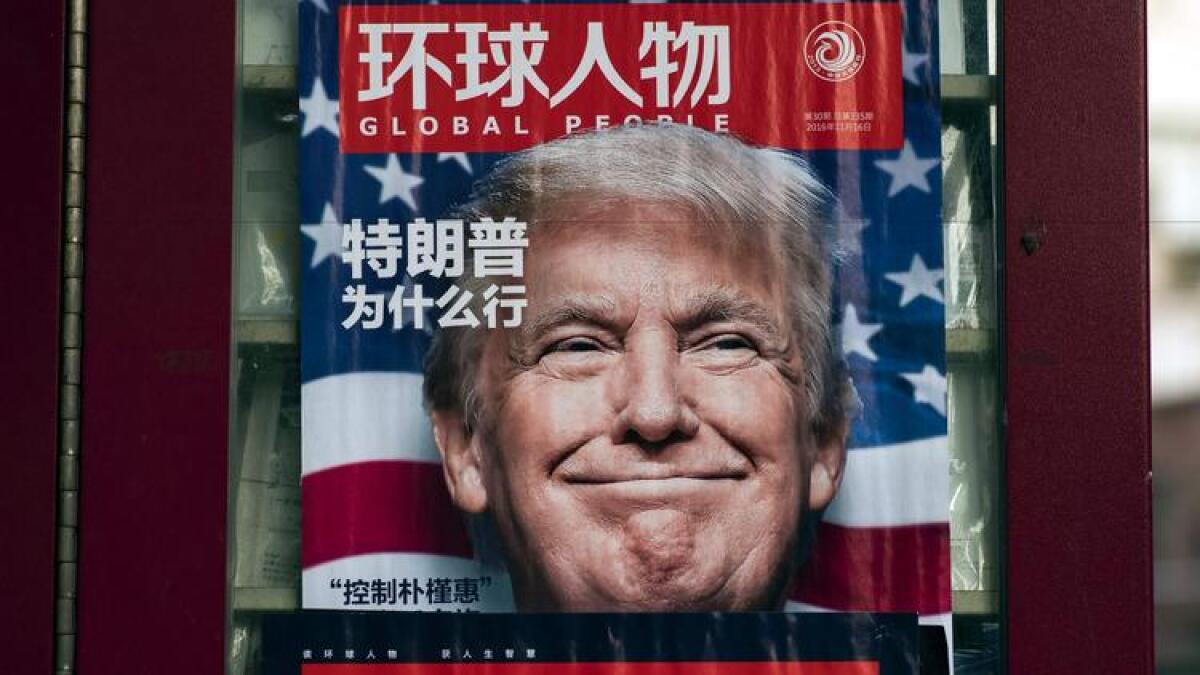
President Trump and Chinese President Xi Jinping spoke by phone on Thursday evening for the first time since Trump’s Jan. 20 inauguration, marking a significant deescalation in the White House’s aggressive posture toward the world’s second-largest economy.
Trump told Xi that he would honor the “one China” policy, according to a statement Thursday by the White House press office, referring to a diplomatic understanding that the U.S. will not challenge Beijing’s assertion of sovereignty over Taiwan, a self-governing island that Beijing views as a breakaway province.
“The phone call between President Trump and President Xi was extremely cordial, and both leaders extended best wishes to the people of each other’s countries,” said the statement. “They also extended invitations to meet in their respective countries.”
Trump shows some interest in a dead immigration bill — the one Republicans killed
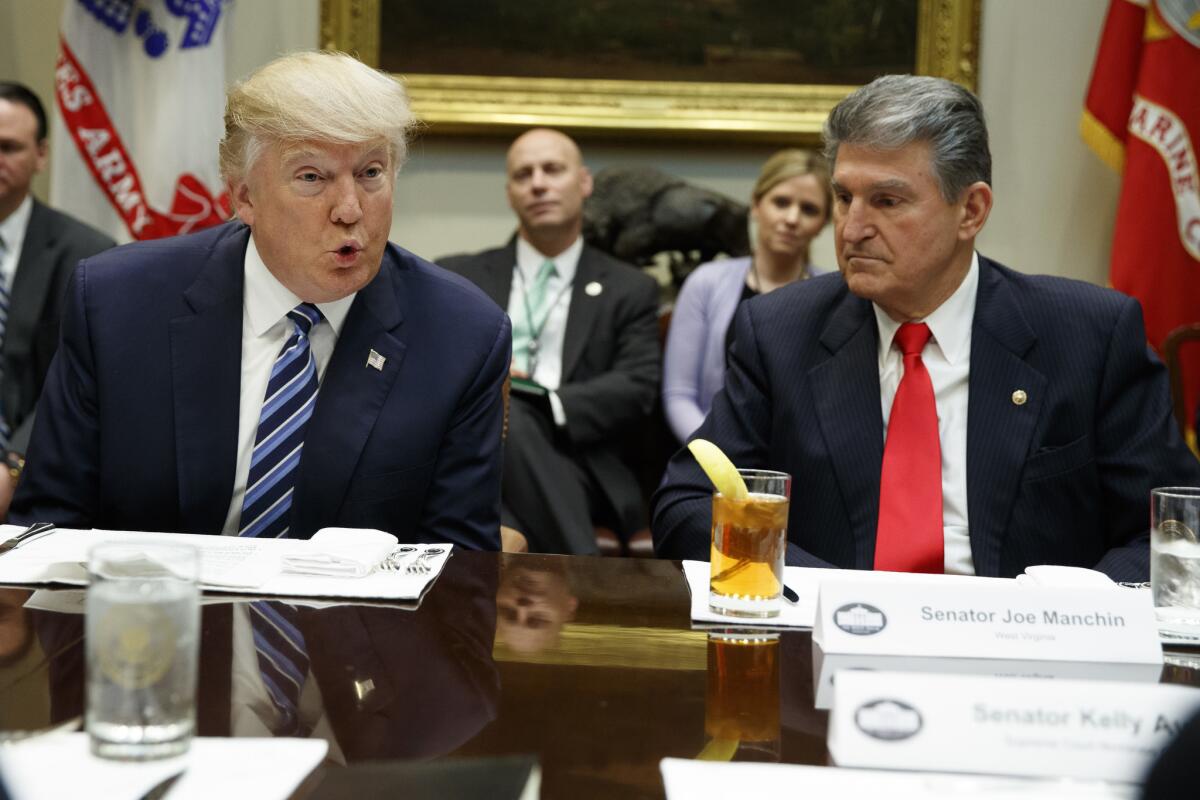
Sweeping legislation in Congress is often confusing, and the last major attempt to fix the immigration system, in 2013, was quickly dismissed by critics with a one-word rejoinder: “amnesty.”
It was shelved by the House a short time later, despite robust support in the Senate.
But President Trump appeared intrigued when told about the details during a lunch meeting with senators Thursday.
“Well, that doesn’t (sound) like amnesty to me,” Trump told the senators, according to an account from Sen. Joe Manchin (D-W.Va.) to reporters, as compiled by NBC’s Kasie Hunt.
“You’ve got to start working on it again,” the president told the group.
Well, that may or may not happen.
Republicans who have the majority in Congress effectively tanked the so-called “gang of eight” bill four years ago and have shown zero interest in reviving it.
Moreover, the bill’s chief opponent, Jeff Sessions, was just sworn in Thursday as Trump’s pick for attorney general.
The White House downplayed Trump’s comment, according to reports.
But the exchange between Trump and the senators was notable because the president didn’t immediately dismiss the landmark legislation.
When the conversation at a lunch with Trump and senators of both parties turned to immigration, lawmakers started explaining the details of the bill to the president: a 10-year path to legal status, once immigrants illegally in the U.S. pay fees, taxes and show they are following the law and learning English; followed by three more years before they can become citizens.
“Well, I want to see it,” the president told the senators, according to Manchin. “I know what amnesty is, and I’m totally opposed to amnesty.”
Senators were encouraged.
Republican leaders in Congress, perhaps not so much.
Trump has once again drifted from party message, and will now leave them to answer renewed questions about the immigration overhaul they shelved.
Republicans have argued for a more incremental approach.
Appeals court refuses to restore Trump’s refugee and travel ban
In a significant pushback from the judiciary, a federal appeals court decided Thursday to continue blocking enforcement of President Trump’s executive order barring travelers from seven predominantly Muslim nations from entering the U.S.
A three-judge panel of the U.S. 9th Circuit Court of Appeals ruled that a Seattle-based federal judge’s earlier restraining order on the new policy should remain in effect while the judge further examines its legality.
The court issued the ruling “per curiam,” which means it was a unanimous decision.
The controversial travel moratorium signed Jan. 27 stirred chaos at airports and protests worldwide as at least 60,000 visas were canceled, including those held by students visiting families abroad and engineers working in the U.S.
U.S. District Judge James L. Robart issued a temporary restraining order blocking enforcement of the order last week after concluding that a challenge by the states of Washington and Minnesota was likely to succeed.
Robart, who was appointed by President George W. Bush, also concluded that halting the ban — at least for a while — would cause no undue harm to the country.
Trump administration lawyers have argued that the country could be at risk of a terrorist attack until heightened vetting measures for travelers from those countries are put into place.
The administration can appeal the decision directly to the U.S. Supreme Court, which has four Democratic appointees and four Republican appointees and may be unable to reach a majority decision. The seat of the late Justice Antonin Scalia remains vacant.
UC Irvine Law School Dean Erwin Chemerinsky said it was difficult to predict whether the Supreme Court would review the decision.
“They don’t want a 4-4 split, but they really like having the last word on high-profile case,” the constitutional law expert said.
Judges could seek a middle ground on Trump’s travel ban by shielding only certain travelers

The government lawyer defending President Trump’s foreign travel ban made an unusual closing plea when arguing this week before a panel of U.S. 9th Circuit Court judges.
Sensing he had not convinced them, Justice Department attorney August Flentje suggested they issue a middle-ground ruling that would shield some travelers, but not others.
He said the temporary restraining order issued by Judge James L. Robart in Seattle is “vastly over-broad” because it extends to many thousands of foreigners who have obtained U.S. visas but have never used them to travel here.
Instead, Flentje urged the judges to focus on the “core concerns” raised by those who challenged Trump’s order, such as foreign students, doctors, technology company executives and tourists who were in the process of traveling to or from the United States and one of seven Muslim-majority nations targeted by Trump’s order. When the ban was announced, many of these people were trapped outside the U.S. or detained upon arrival in the initial confusion over the rollout.
Although his last-gasp plea gained little traction during Tuesday’s argument, it may well play a key role when the judges of the 9th Circuit or the Supreme Court decide on how much of Trump’s order will be upheld or blocked.
U.S. general says thousands of additional troops are needed for Afghanistan
The top U.S. commander in Afghanistan said Thursday that he needs several thousand more troops to help Afghan government forces break a stalemate with the Taliban less than a year after President Obama drew down American forces.
Gen. John W. Nicholson Jr. told the Senate Armed Services Committee that more troops are needed to help train Afghanistan’s military and police forces as they battle Taliban insurgents, Islamic State militants and other militias.
“We have a shortfall of a few thousand,” he said, adding that the troops could come from the United States or other countries in the international coalition in Afghanistan.
President Trump said little about America’s longest war, now in its 16th year, during the campaign last year or since taking office. He has spoken far more often about U.S. military efforts to defeat Islamic State in Iraq and Syria, where the militants have steadily lost ground over the last year.
After bruising confirmation fight, Jeff Sessions takes over at Justice Department
Jeff Sessions was sworn in as U.S. attorney general at the White House on Thursday and promised to aggressively tackle violent crime, terrorism and illegal immigration.
A day after Sessions narrowly won a bitter and racially tinged Senate confirmation battle, the 70-year-old former senator from Alabama was greeted by applause from employees when he entered the Justice Department building.
Earlier, during his swearing-in ceremony, Sessions said he was concerned that growing crime posed a “permanent” risk to Americans.
“I wish the rise we are seeing in crime in America were some sort of aberration or a blip,” Sessions said as he stood next to President Trump. “My best judgment, having been involved in criminal law enforcement for many years, is that this is a dangerous, permanent trend that places the health and safety of Americans at risk.”
Trump has repeatedly said the nation’s murder rate is the worst in at least four decades, although statistics show that is not true.
Across the country, murder and violent crime rates are far below the record levels of the 1980s and 1990s. The nation’s homicide rate in 2015, the last year for which statistics are available, was 4.9 per 100,000 people — lower than every year between 1996 and 2009.
Homicides, however, have spiked in some cities, including Baltimore and Chicago. Killings rose in Los Angeles by about 5% in 2016.
Trump issued three executive orders Thursday that will direct resources to fight criminal organizations, establish a task force to study ways to reduce violent crime and direct the Justice Department to prevent violence against law enforcement officers.
Sessions was the first U.S. senator to endorse Trump and became a close advisor during the campaign. On Thursday, Trump called Sessions uniquely qualified to be the nation’s top law enforcement officer.
“Jeff understands that the job of attorney general is to serve and protect the people of the United States,” Trump said. “And that is exactly what he will do and do better than anybody else can.”
Sessions takes over after a particularly bruising confirmation battle for a sitting U.S. senator. It ended in a 52-47 vote, with only one Democrat crossing party lines to support him.
Democrats and civil rights advocates are particularly concerned with how Sessions, who was one of the Senate’s most conservative members, will address civil liberties, immigration and environmental matters.
Construction resumes on Dakota Access pipeline

Construction on the Dakota Access oil pipeline resumed early Thursday, less than 24 hours after the government granted a final easement allowing for completion of the disputed project.
Despite months of protests led by tribal groups and an expanded environmental review ordered in the final days of the Obama administration, the project is racing ahead at the urging of President Trump.
Four days after he was sworn into office, Trump, who has vowed to expand fossil fuel production and roll back environmental regulations, encouraged the U.S. Army Corps of Engineers to abandon the review ordered under Obama. On Tuesday, the Corps announced that it had done so. The next day, it granted the easement, which allows construction across Corps land and a dammed section of the Missouri River.
The company building the pipeline, Energy Transfer Partners, said late Wednesday that it had “received all federal authorizations necessary to proceed expeditiously to complete construction of the pipeline.” The company, based in Texas, said it expects to have in hand $2.6 billion in loans for the project “within the next several days” and for the pipeline to be operational no later than June.
The $3.8-billion, 1,170-mile pipeline would stretch from western North Dakota to Patoka, Ill.
The project is moving forward despite continued protests and ongoing legal challenges.
The Standing Rock Sioux Tribe, which has led protests against the pipeline, has said it will continue to oppose its completion in court and, if necessary, fight the operation of the pipeline if it is completed. The nearby Cheyenne River Sioux tribe, which has joined the Standing Rock Sioux in legal battles, filed a request in federal court in Washington on Thursday for a restraining order to stop construction.
The main section of the pipeline that remains to be built would be laid beneath the dammed river, just north of the Standing Rock Sioux reservation. The tribe says the pipeline threatens its water supply and sacred sites on what had been its land before the government forced it onto the reservation.
Energy Transfer Partners says the pipeline, which could transport more than 500,000 barrels of oil daily, will be safer than moving oil by rail or truck.
The Standing Rock Sioux have encouraged people who have been protesting the pipeline near its reservation for months to leave and focus instead on political and legal efforts across the country.
Those efforts include divestment. On Tuesday, Seattle became the first city in the nation to end its relationship with a bank in protest of the pipeline. The Seattle City Council voted unanimously to sever ties with Wells Fargo, which manages about $3 billion for the city annually.
Trump lashes out at senator, claiming he ‘misrepresents’ what Supreme Court nominee said
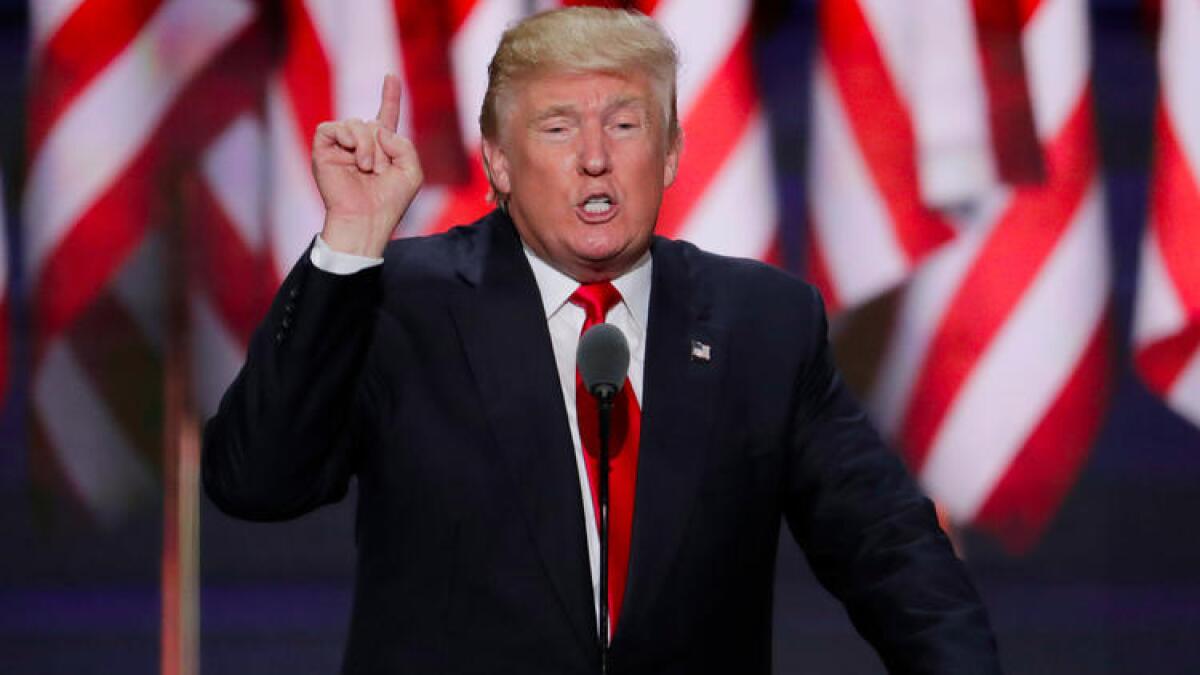
President Trump lashed out Thursday over claims that his pick for the Supreme Court criticized Trump’s attacks on the judiciary.
Neil Gorsuch, Trump’s high court nominee, told Sen. Richard Blumenthal (D-Conn.) that he was “disheartened” by the president’s disparaging statements about the judiciary, the lawmaker told reporters after meeting Gorsuch on Capitol Hill a day earlier.
But Trump fired back, saying Blumenthal misrepresented Gorsuch’s comments. The president also took aim at Blumenthal’s credibility, bringing up a 7-year-old controversy over Blumenthal’s military service.
During Blumenthal’s campaign for Senate in 2010, he was criticized for claiming in speeches that he had served in Vietnam. Blumenthal had been in the Marine Corps Reserve and was not posted overseas. He later said he had misspoken about his record a few times out of the hundreds of speeches he has given in his political career.
Trump himself was disqualified from service during the Vietnam War in 1968 after a physical exam. Trump told the New York Times he received a medical deferment because of bone spurs in his heels.
Senators from both parties have been meeting with Gorsuch this week as he prepares for a confirmation hearing on his nomination to a lifetime appointment to the court.
A Republican, Ben Sasse of Nebraska, told MSNBC that Gorsuch made similar comments to him and “got pretty passionate about it.”
“He said any of attack on any … brothers or sisters of the robe is an attack on all judges,” Sasse said of Gorsuch. “And he believes in an independent judiciary.”
Former Sen. Kelly Ayotte, who is serving as a White House liaison between Gorsuch and lawmakers, said Thursday that Gorsuch was not commenting on a specific case and emphasized that he was troubled by any attack on the judiciary.
“He said that he finds any criticism of a judge’s integrity and independence disheartening and demoralizing,” she said in a statement.
UPDATE:
12:40 p.m.: This story was updated with additional material from a more complete story on the issue.
Here’s how some voters view Trump and the media
Well, he’s back to campaign form – again.
On Thursday, President Trump sent a series of tweets castigating U.S. Sens. Richard Blumenthal (D-Conn.) and John McCain (R-Ariz.). Throughout the campaign, Trump often used social media to hammer ... everyone? Well, at least, members of Congress.
While the conservative media covered Trump’s rant, in which he alluded to Blumenthal as a liar and McCain a loser, its coverage on Thursday focused largely on Congress, terrorism and polls.
Here are some of today’s headlines:
Here’s the only Dem to vote for Sessions as attorney general (Daily Caller)
A day after the Senate, voting mostly along party lines, confirmed Jeff Sessions as attorney general, this profile looks at Sen. Joe Manchin (D-W.Va.), the lone member of his party to support Sessions. Manchin, a former governor of West Virginia, is known as a conservative and has battled his party in the past.
“Manchin, 69, is one of the last remaining blue dog Democrats. Blue dogs are Southern state Democrats with a conservative voting record.”
The Caller notes that “Manchin calls himself ‘a West Virginia Democrat, not a Washington [D.C.] Democrat.’”
Polling backs up Trump’s fight with the press (Daily Caller)
Disgusting. Dishonest. Fake.
These are some of the ways President Trump likes to describe the press.
And this piece in the Daily Caller looks at a survey out this week that show voters’ views on Trump and the media. An Emerson College poll found 49% of voters believe the Trump administration is truthful, compared to 48% who do not. By contrast, 53% of voters find the news media untruthful, compared with 39% who find the media truthful.
The poll was split along party lines -- especially when looking at the media. Ninety-one percent of Republicans believe the news media is untruthful, and 69% of Democrats believe the press is honest.
Dresden unveils controversial monument that looks like radical Islamist fortification (Breitbart)
As Trump continues to insist that the United States will not be like European allies – who, he says, embolden “radical Islamic terrorism” – this piece looks at a new monument erected in Germany by a Syrian German artist.
“A controversial new monument in Dresden to the victims of the battle for Aleppo may have been inspired by temporary fortifications set up by radical Islamists linked to Al Qaeda and the killing of Christians,” the story begins.
The monument, a series of buses standing on end, is intended as a reminder of the bus barricades opposition fighters -- not all of them Islamist -- set up to defend besieged citizens of eastern Aleppo against sharpshooters as they were under heavy attack by Russian and Syrian government forces.
The monument, which draws parallels between the Aleppo siege and the 1945 bombing of Dresden, has drawn protests in that city from right-wing nationalists and Mayor Dirk Hilbert has received death threats due to his support for the project.
Why the DeVos victory matters (American Spectator)
It was a contentious vote, with no Democrats in support of Betsy DeVos, who was confirmed as Education secretary earlier this week.
This piece argues that Democrats are beholden to powerful teachers unions, which were staunchly against DeVos.
“The teachers unions, always vicious about private alternatives, targeted DeVos for extinction,” writes Gilbert T. Sewall. “Had the organized Washington left prevailed in squashing this Cabinet appointment — and it came very close — the education establishment would guess it could block further appointments and policy.”
Top Senate Democrat calls on Trump to withdraw Labor nominee Puzder
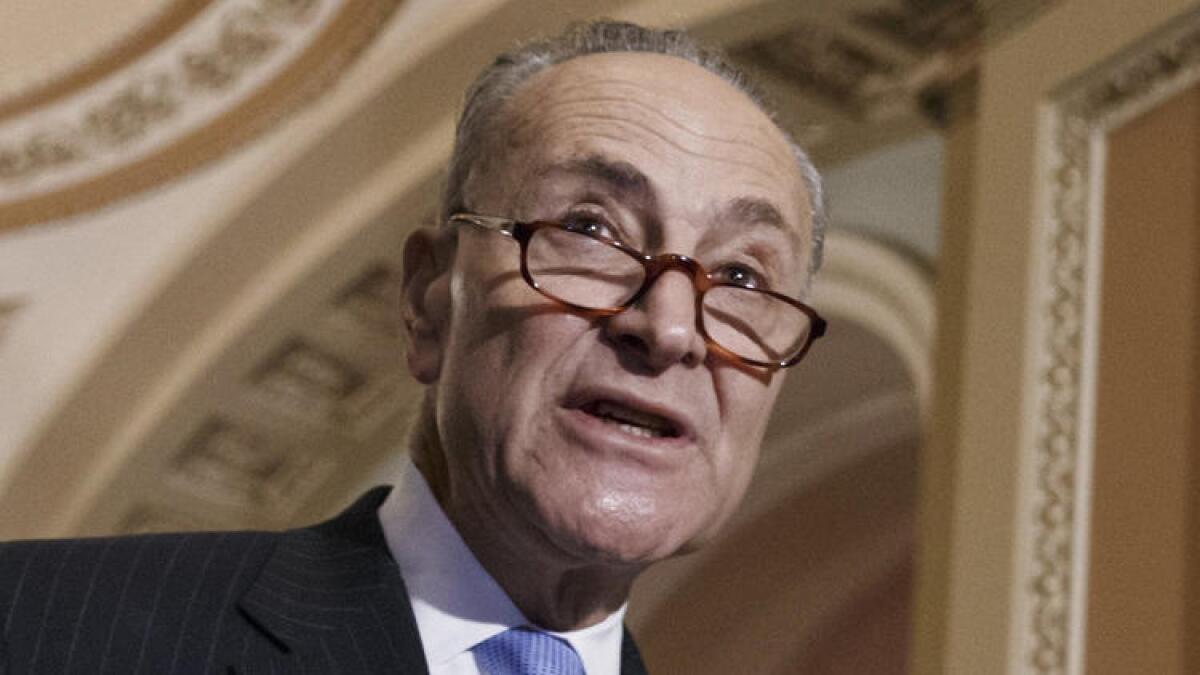
Senate Minority Leader Charles E. Schumer called Thursday for President Trump to withdraw the nomination of fast-food executive Andy Puzder to be Labor secretary, calling him “probably the most anti-worker” choice ever for the Cabinet position.
Democrats and workers rights groups have been sharply critical of Puzder, chief executive of the parent company of the Carl’s Jr. and Hardee’s chains, for his treatment of employees and opposition to a significant minimum wage increase among other views.
On top of that, Puzder admitted this week that he had employed a housekeeper for years who was in the U.S. illegally.
“On policy and practice, Andrew Puzder has proven himself to be an enemy, not a champion, of workers’ rights,” Schumer said at a news conference.
“They ought to withdraw Puzder’s [nomination] before he further embarrasses this administration and further exposes the hypocrisy of President Trump saying one thing to the workers of America and then doing another,” said Schumer, of New York.
Sen. Patty Murray of Washington, the top Democrat on the committee that will review the nomination, said the disclosure this week about Puzder’s housekeeper — and that he failed to pay taxes for her until after he was nominated — was “shocking.”
“Not only is Andrew Puzder uniquely unqualified, but his decision to pick and choose what laws he himself follows is disqualifying,” Murray told reporters.
“There simply should not be one set of rules for the Trump Cabinet and another for everyone else,” she said.
The focus on Puzder comes after Democrats have been unable to derail other Cabinet nominees they’ve opposed, including Atty. Gen. Jeff Sessions and Education Secretary Betsy DeVos.
“This is a nominee that we want people in the country to understand has huge issues,” Murray said of Puzder.
Murray said Democrats are focusing on him now because his confirmation hearing before the Senate Health, Education, Labor and Pensions Committee was just scheduled for next week.
The hearing had been delayed four times as senators awaited Puzder’s ethics and financial disclosure forms.
The committee now has received the paperwork, in which Puzder pledged to divest his multimillion-dollar stake in CKE Restaurants Inc. and sell a wide array of other investments. The hearing is scheduled for Feb. 16.
Schumer said Democrats are doing “everything we can to stop these awful nominees.”
Democrats hope that greater attention to Puzder’s record will lead to his withdrawal or defeat, Schumer said.
“It’s disgraceful to put secretary of Labor and Puzder in the same sentence given his views,” Schumer said.
Can Congress swiftly kill the landmark retirement program California spent years designing?
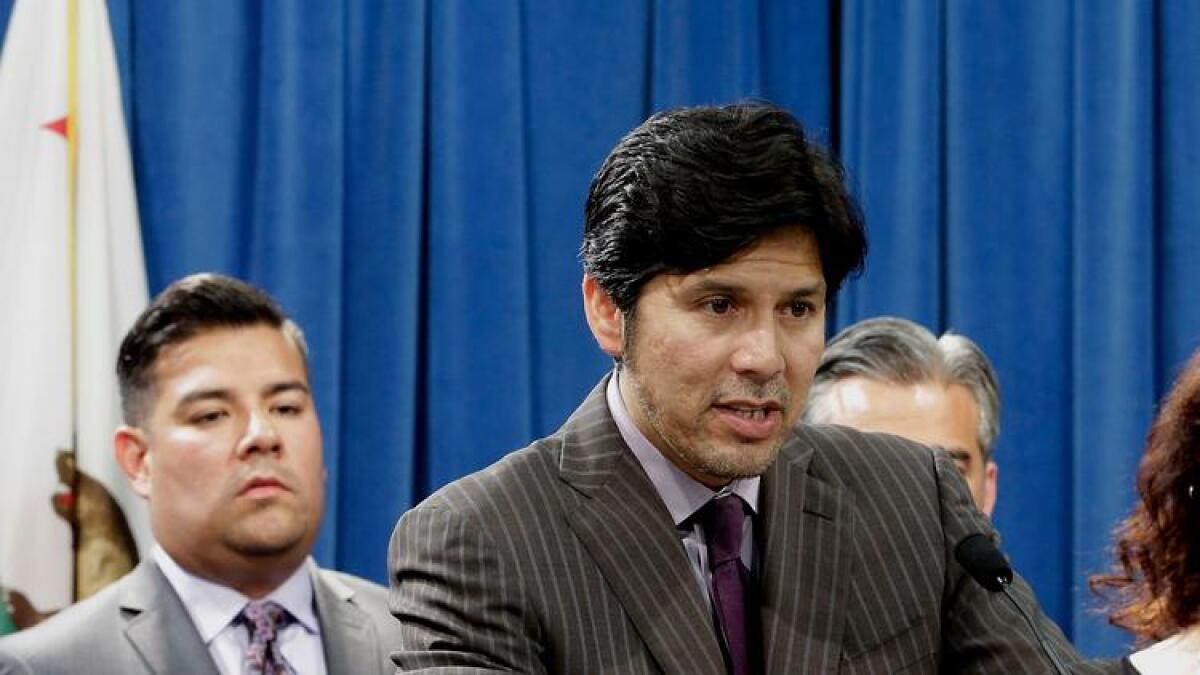
An ambitious California law intended to help create retirement security for low-income workers is in the crosshairs of the Trump-era Congress, which is moving to block the state and others from launching programs to automatically enroll millions of people in IRA-type savings plans.
The push is one of the most direct confrontations yet with California and other liberal states by a GOP-led Congress emboldened by President Trump’s election.
And it is intensifying the debate about whether conservatives who now control Washington will honor their pledge to respect states’ rights, even when states pursue policies out of step with the Republican agenda.
By targeting the novel “auto IRA”-style programs, congressional Republicans are also provoking one of California’s most visible leaders, state Senate President Pro Tem Kevin de León, the Los Angeles Democrat who championed the policy in California and nationwide and is leading a movement in the Legislature to resist the Trump White House.
The 2016 law being targeted requires employers to enroll 6.8 million California workers who currently have no access to a retirement savings account at work in a state-sponsored plan. Millions more in seven other states that have passed laws similar to California’s would also be enrolled in those states. Many more states are now weighing joining a movement that has been years in the making.
Donald Trump campaigned in marketing. Can he govern in prose?
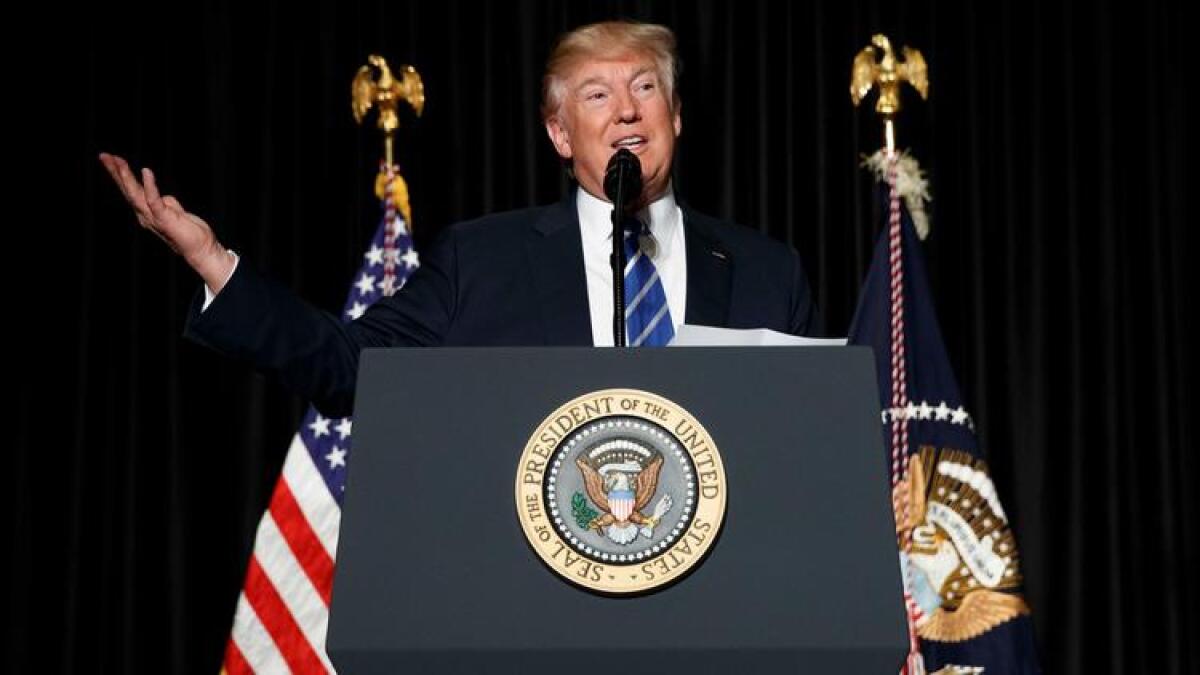
Of all his political gifts, President Trump’s knack for branding his ideas and his opponents with unforgettable slogans and monikers may be the one that inspires the most awe from allies and adversaries.
But the legal and political fight over Trump’s travel ban affecting seven Muslim-majority countries has demonstrated the potential downside to his flair for making his ideas stick in the public imagination. Even as his allies insist that he is not instituting a “Muslim ban,” Trump’s own attempts to sell the policy as just that may prove its undoing.
Unlike conventional politicians, who use careful language to leave themselves room to slip and slide away from their promises, Trump repeatedly employs the type of sizzling sales pitches he learned in real estate and media.
Labor nominee Andy Puzder pledges to divest CKE Restaurants holdings and other assets if confirmed
Labor secretary nominee Andy Puzder pledged that, if confirmed, he would divest his multimillion-dollar stake in CKE Restaurants Inc. — the fast food company he has headed since 2000 — and sell a wide array of other holdings, according to federal financial disclosure and ethics forms.
Puzder also promised not to participate in any matters as Labor secretary involving CKE, parent company of the Carl’s Jr. and Hardee’s chains, unless he first received a waiver or authorization in conjunction with federal law.
The forms were filed with the Office of Government Ethics and obtained by The Times on Wednesday.
The 33-page disclosure report showed Puzder had $35 million to $119 million in assets, which are required to be reported only within broad ranges.
Week 2: Readers grading Trump dole out F’s and A’s.Very few think he’s average
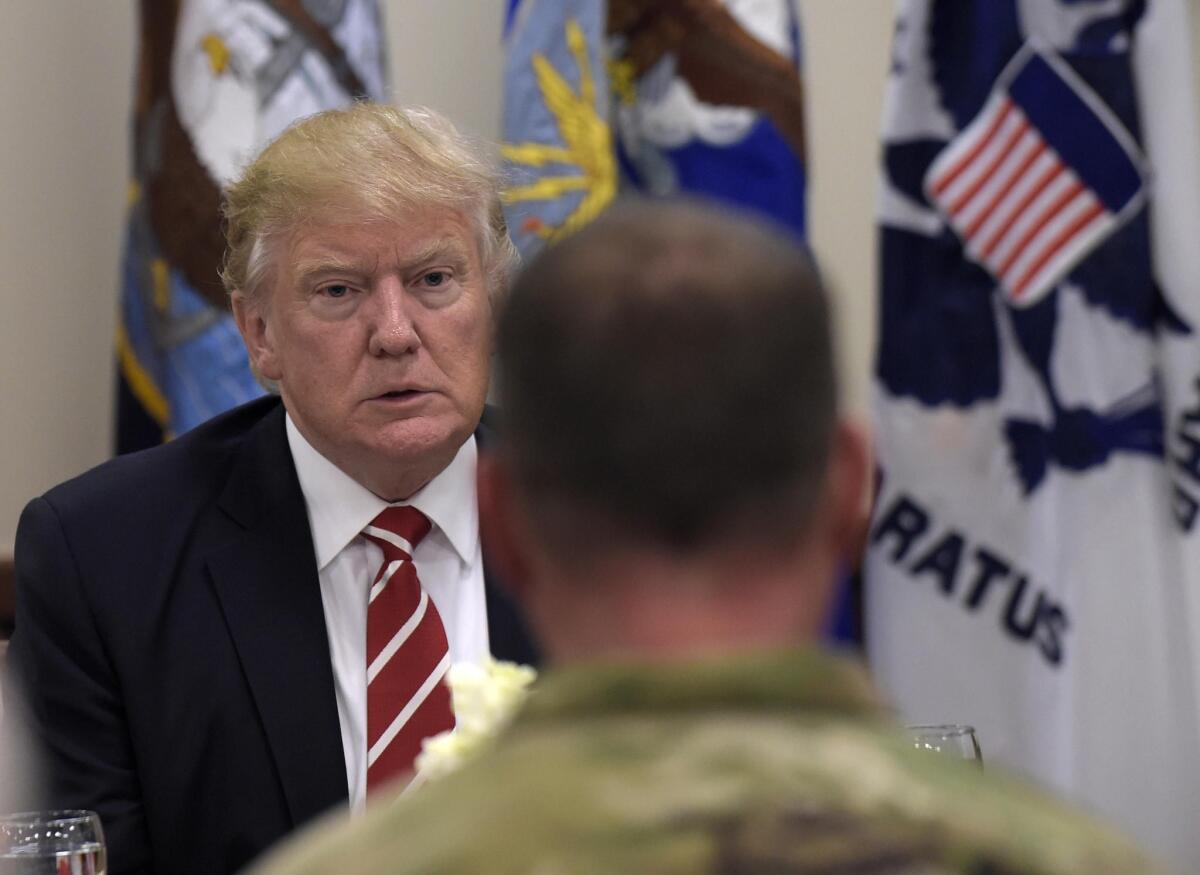
Are you keeping up with President Trump’s first 100 days in office? We’re tracking his major moves each week and asking readers to grade his performance.
We got nearly 3,000 grades assessing Week 2 of his presidency (see above). As with Week 1, those responding were deeply split. The sign? Most graders gave him an A- or higher or an F. Very few readers have designated Trump’s record as average (as in a C).
The lack of regard for facts, for science, for basic protections to our air and water should concern us all.
— Laura Jernigan, Republican from California
I’m an adopted immigrant from a country with friendly relations with the United States, and for the first time, I am scared that I’ll become unwelcome in the only country and community I’ve ever known.
— Alexander Hagen, Democrat from Washington
Those who thought he was doing an A- or higher job more often identified themselves as independent than as a member of a party. Here’s what one said:
The president is a leader and a manager — no matter what the opinion of others, he seems to have a conviction for how to make things better.
— Pierre Mihatov, independent from California
A few Trump fans identified themselves as Democrats:
He [is] sticking to campaign promises! He honored the military.
— Mo Kaplow, Democrat from California
Voting for Week 3 opens again Friday.
SEE MORE WEEK 2 GRADES AND COMMENTS >>
UPDATE: A previous version of this story incorrectly said no one in Week 2 had graded Trump a C. One person gave him a C-. In Week 1, fewer than 10 people chose a grade in the C range.
U.S. Army Corps of Engineers grants final easement for completion of Dakota Access pipeline
The U.S. Army Corps of Engineers on Wednesday granted the final easement needed for completion of the Dakota Access pipeline, clearing the way for construction to resume and stirring uncertainty about the historic protest that has tried to stop it.
“With this action, Dakota Access now has received all federal authorizations necessary to proceed expeditiously to complete construction of the pipeline,” Energy Transfer Partners, the company building the pipeline, said late Wednesday.
The company has said the pipeline can be completed and operational within three months once construction resumes.
The move was not unexpected.
On the first Tuesday he was in office, President Trump instructed the Army to consider rescinding a decision made in the final weeks of President Obama’s term to conduct a more extensive environmental review and consider alternative routes for the pipeline.
On Tuesday, the Army Corps announced that it no longer saw the need for an expanded environmental review and expected to issue the easement on Wednesday.
The same day, Trump told a group that he had not received any complaints about his decision.
“I don’t even think it’s controversial,” he said, a remark that quickly drew criticism from pipeline opponents.
The Standing Rock Sioux Tribe, which has led protests against the pipeline, said it would continue to fight its completion in court and, if necessary, fight the operation of the pipeline if it is finished. But the tribe has also encouraged people who have been protesting the pipeline near its reservation for months to leave and focus instead on political and legal efforts.
The $3.8-billion, 1,170-mile pipeline, which would travel from western North Dakota to Illinois, is nearly complete. The main section that remains to be built is the most controversial: a segment that would travel beneath a dammed section of the Missouri River just north of the Standing Rock Sioux reservation.
The tribe says the pipeline threatens its water supply and sacred sites on what had been its land before the government forced it onto the reservation.
Energy Transfer Partners says the pipeline, which could transport more than 500,000 barrels of oil daily, is a safer means of transportation than rail or truck.
The tribe’s protest began in spring 2016 with a handful of people but expanded to include thousands, drawing a wave of Native Americans from across the country as well as environmental groups. It became an international symbol of the battle against fossil fuels and for tribal rights.
It also became violent at times, with protesters clashing with law enforcement, leading to more than 700 arrests and claims of police brutality.
Scores of protesters continue to camp in subzero temperatures near the planned river crossing in North Dakota, but their numbers have dwindled as the Standing Rock Sioux Tribe has urged them to leave amid brutal winter conditions and concerns about spring floods in a year when the snowpack has been heavy.
“As Native peoples, we have been knocked down again, but we will get back up, we will rise above the greed and corruption that has plagued our peoples since first contact,” Dave Archambault II, chairman of the Standing Rock Sioux Tribe, said Tuesday after the Army Corps announced it would grant the easement.
He added: “We call on the Native Nations of the United States to stand together, unite and fight back. Under this administration, all of our rights, everything that makes us who we are, is at risk. Please respect our people and do not come to Standing Rock and instead exercise your 1st Amendment rights and take this fight to your respective state capitols, to your members of Congress, and to Washington, D.C.”
Pentagon’s plans to move into Trump Tower raise ethics concerns
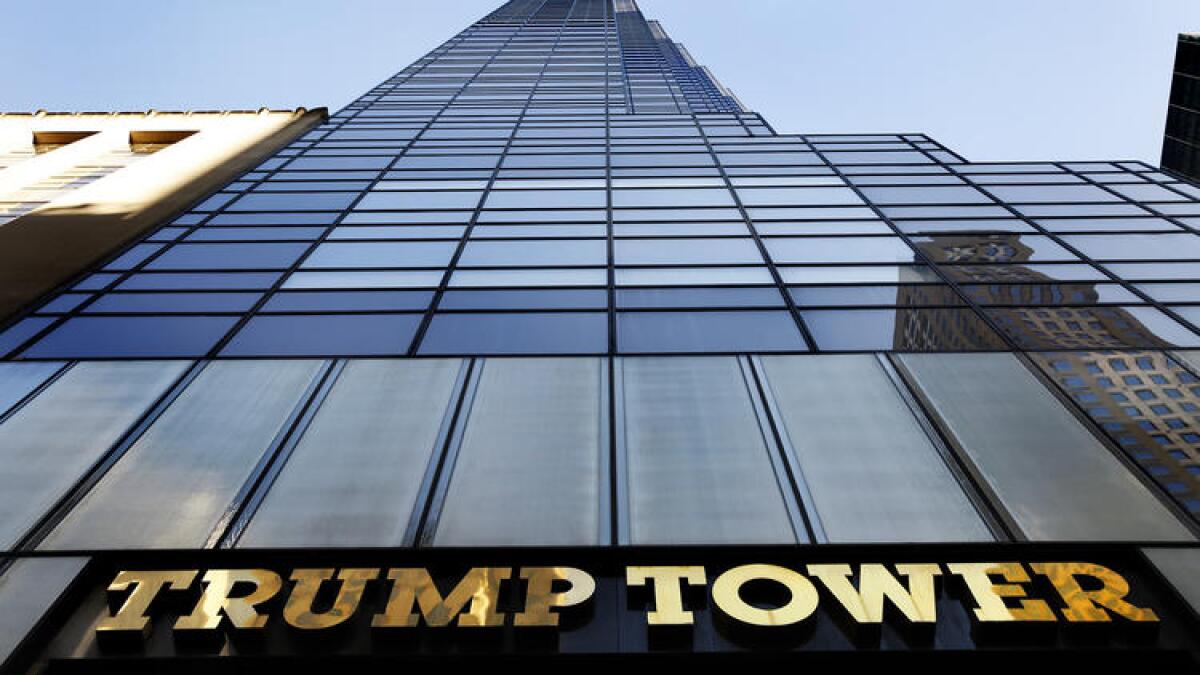
The Department of Defense is planning to lease space in Trump Tower, the 68-story New York building where President Trump has his home and business headquarters, and ethics experts are not happy about it.
“We shouldn’t be in a place where we have to put questions of conflict of interest against questions of national security,” said Jordan Libowitz of Citizens for Responsibility and Ethics, a Washington-based watchdog.
The leased space would be “necessary for the personnel and equipment who will support the POTUS at his residence in the building,” Defense Department spokesman J.B. Bridle said in a statement released Tuesday.
It is not unprecedented for the U.S. government to lease space in order to provide support services for the president when he travels home; the Pentagon rented space near President Obama’s Chicago home.
Trump Tower, however, happens to be an unusually expensive address where a floor with 13,000 to 15,000 square feet of space rents for about $1.5 million a year.
The Secret Service and New York Police Department are already installed in the building to provide security for Trump’s wife, Melania, and son, Barron, who have not yet moved to the White House, and for the president when he visits.
According to public records filed Jan. 26, Trump transferred ownership of Trump Tower to the Donald J. Trump Revocable Trust as part of a promise to turn over the business to his sons. Critics say he still benefits from the trust.
Trust documents obtained by the nonprofit news outlet ProPublica state that the “purpose of the Trust is to hold assets for the exclusive benefit of Donald J. Trump.”
Senate confirms Jeff Sessions as attorney general

After an unusually bitter confirmation battle, Jeff Sessions was confirmed as U.S. attorney general.
After a bitter confirmation battle, the Senate today confirmed Jeff Sessions as the United States’ 84th attorney general.
Sessions, who has served as a senator from Alabama since 1997, takes over a Justice Department facing several high-profile controversies, including the battle over President Trump’s order blocking entry to migrants and visitors from seven predominantly Muslim nations.
What Coretta Scott King’s opposition letter from 1986 said about Jeff Sessions
On the Senate floor Tuesday night, Sen. Elizabeth Warren was prevented from reading Coretta Scott King’s 1986 opposition letter to Jeff Sessions’ nomination for a federal judgeship. Here’s how some of that letter breaks down.
“The actions taken by Mr. Sessions in regards to the 1984 voting fraud prosecutions represent just one more technique used to intimidate black voters and thus deny them this most precious franchise.”
King, the widow of Martin Luther King Jr., penned a letter opposing the nomination of Sessions, then the U.S. attorney in Mobile, Ala., to a seat on the federal bench. She cited a voter fraud case that Sessions oversaw in 1984 against three Perry County Civic League members in Marion, Ala., who helped blacks register to vote.
The defendants, who would come to be known as the Marion Three, were Allen Turner, who had marched from Selma to Montgomery, Ala., with Martin Luther King Jr. at the height of the civil rights movement; Turner’s wife, Evelyn; and activist Spencer Hogue.
“The investigations into the absentee voting process were conducted only in the Black Belt counties where blacks had finally achieved political power in the local government.”
The Marion Three were accused of tampering with ballots of black voters before a primary election in 1984.
“Whites had been using the absentee process to their advantage for years, without incident. Then, when blacks, realizing its strength, began to use it with success, criminal investigations were begun.”
The Marion Three said that after the Voting Rights Act passed in 1965, they began teaching black voters how to cast absentee ballots. Hogue and the Turners said they assisted mostly elderly voters who could not physically go to the polls. They additionally aided illiterate voters, and said they altered ballots only with voters’ permission.
“Mr. Sessions sought to punish older black civil rights activists, advisors and colleagues of my husband, who had been key figures in the civil rights movement in the 1960s.”
The Marion Three were indicted on 29 counts of mail fraud. Sessions said the case began after local officials complained of voter fraud in Perry County, one of Alabama’s smallest counties. Ultimately, a jury of seven blacks and five whites acquitted them.
“Witnesses who did testify were pressured and intimidated into submitting the ‘correct’ testimony.”
Some witnesses who had originally told the FBI that their ballots were altered without approval changed their testimonies during trial.
“These voters, and others, have announced they are now never going to vote again.”
At least two witnesses reportedly said they would not vote.
Supreme Court nominee tells a senator he is disheartened by Trump’s attacks on the judiciary
President Trump’s nominee to the Supreme Court told a U.S. senator that he was “disheartened” by the president’s comments about the judiciary, the lawmaker said Tuesday.
“He certainly expressed to me that he is disheartened by the demoralizing and abhorrent comments made by President Trump about the judiciary,” Democratic Sen. Richard Blumenthal of Connecticut, a member of the Senate Judiciary Committee, told reporters after meeting Trump’s nominee, appeals Judge Neil M. Gorsuch.
As the president’s executive order temporarily suspending travelers from seven predominantly Muslim nations has run into legal roadblocks, Trump has lashed out at members of the independent judiciary.
Over the weekend, he referred to the Seattle judge who suspended the order as a “so-called judge” and suggested that Americans should blame him if a major terrorist attack were to occur.
At a conference of police chiefs in Washington on Wednesday, Trump asked how any judge could question the legal basis of his order.
“A bad high school student would understand this,” Trump said. “I think our security is at risk today, and it will be at risk until we get what we are entitled to.”
Gorsuch has been meeting with senators from both parties at the Capitol this week as he prepares to face questions in a public hearing. Barring a change in Senate rules, Gorsuch will need at least eight Democratic votes to be confirmed to the high court.
Blumenthal, a former state attorney general, described Gorsuch as “unspecific and unforthcoming” on a number of key issues they discussed in their private meeting, including privacy rights and women’s healthcare. But he said his vote on whether to confirm Gorsuch may not be based on his qualifications and views alone.
“There is an elephant in the room with us today. The elephant is Donald Trump, who has issued a series of blistering and bullying attacks on judges around the country,” Blumenthal said.
“I will be asking for more specific and forthcoming responses to those kinds of questions before I determine how I will vote.”
Do most Americans support President Trump’s travel ban?
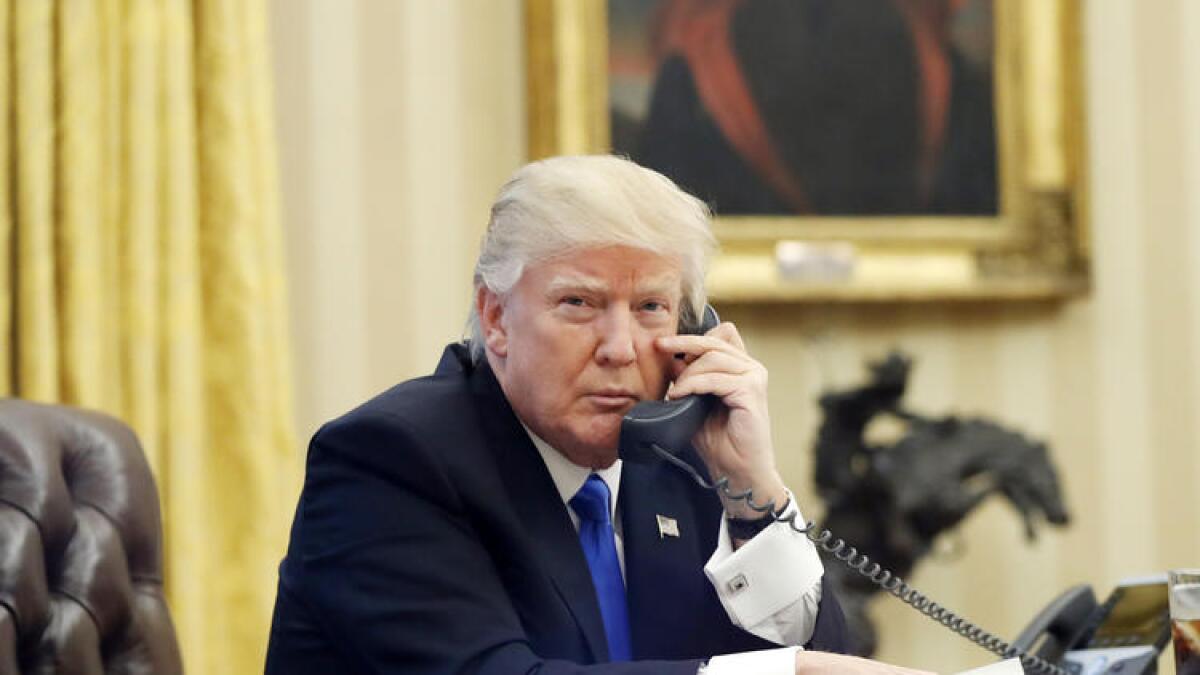
It’s all about the travel ban.
As the U.S. 9th Circuit Court of Appeals weighs whether to lift a hold on President Trump’s ban on admitting travelers from seven predominantly Muslim countries, the conservative media is focused on the pending ruling with polls and recent comments from the president.
Here are some of today’s headlines.
Poll: 55% of voters support Trump’s refugee resettlement freeze (Breitbart)
A Morning Consult/Politico poll released on Wednesday showed that 55% of registered voters support Trump’s travel ban, compared with 38% who do not support it. The poll, conducted Feb. 2-4 surveyed nearly 2,000 registered voters.
By contrast, a recent Quinnipiac poll found that 51% of those surveyed oppose the block on travelers from the seven Muslim-majority countries and 60% don’t like the ban on refugees.
MSNBC repeatedly pushes Elizabeth Warren to call Mitch McConnell ‘Sexist’ (Daily Caller)
After the Massachusetts senator was silenced on the Senate floor Tuesday when she tried to read a 1986 letter from Coretta Scott King about Jeff Sessions, Trump’s pick to lead the Justice Department, two of her male colleagues went on to read the letter without obstruction. Warren went live on MSNBC, where the Daily Caller insists she was prompted to call Senate Majority Leader Mitch McConnell a “sexist.”
“MSNBC’s handling of the McConnell-Warren snafu is downright nauseating,” said the headline on the Daily Caller’s home page.
The Daily Caller posted video of her Senate floor speech, and the subsequent interview with MSNBC.
It’s not the same game: Donald Trump and the Atlanta Falcons (American Spectator)
In this semi-critical piece, Trump is urged not to make the same mistake as the Atlanta Falcons did in Sunday’s Super Bowl: Don’t become complacent with the playbook.
After the Falcons got out to a commanding lead, they did not adjust their strategy enough to stave off the New England Patriots, who stormed back in the fourth quarter and won, 34-28, in overtime to cap the greatest comeback in Super Bowl history.
The author of this piece, Ross Kaminsky, insists that Trump must avoid what would be a critical mistake: expecting that previously successful tactics that got him to the presidency are the same ones that will make a success of his presidency.
In recent days, Trump has assailed the federal judge who blocked his immigration ban as a “so-called” judge and has been critical of foreign leaders, such as Australian Prime Minister Malcolm Turnbull.
“What he seems not to have understood is that once winning election, the target audience for his messages immediately expanded, whether he wanted it to or not, to include members of Congress, foreign leaders, and corporations,” Kaminsky writes. “Just because Mr. Trump and his supporters would prefer not to consider this new audience doesn’t mean he can, or will, get away with ignoring or antagonizing it.”
The judge ‘began throwing pinpoint passes’ (Fox News)
Also, on Fox News, Robert Charles, a former secretary of State under George W. Bush, used the Super Bowl to make a point, painting the 9th Circuit Court hearing as a back-and-forth battle of titans -- providing sideline commentary along the way.
“Could a Ninth Circuit panel, split two-to-one activist judges, actually issue a stay – permitting the President’s Order to stand, at least for now? Might [Judge Richard] Clifton’s questions convert someone, one of the two? Not likely, but stranger things have happened,” he wrote.
Charles seemed particularly impressed when Clifton noted it might be hard to infer religious animus against Muslims when most Muslims around the world wouldn’t be affected by the travel ban. “Bingo!” he wrote. “Touchdown!”
Sessions will face a tough job at Justice Department - and Trump isn’t making it any easier
After enduring an unusually bitter confirmation battle for a sitting U.S. senator, Jeff Sessions will barely have time to settle into his fifth-floor office at the Justice Department before he takes center stage in some of the nation’s most acute controversies.
If Sessions is confirmed as attorney general Wednesday by the Senate, as expected, he will be responsible for leading the legal defense of President Trump’s immigration restrictions, for halting and investigating terrorist attacks, and for probing hate crimes and abuses by local and state law enforcement.
He also is expected to play a key role in implementing Trump’s promised crackdown on illegal immigration by increasing deportations.
His boss isn’t making things easier. Last weekend, Trump denounced a federal judge in Seattle who had temporarily blocked Trump’s executive order suspending immigration and refugees from seven Muslim-majority countries.
A three-judge panel from the 9th U.S. Circuit Court of Appeals in San Francisco heard arguments Tuesday on the government’s effort to lift the stay. The judges did not issue an immediate ruling, and Trump complained Wednesday that the legal process was taking too long.
“You could be a lawyer, or you don’t have to be a lawyer. If you were a good student in high school or a bad student in high school, you can understand this, and it’s really incredible to me that we have a court case that’s going on so long,” Trump told a police chiefs’ conference in Washington.
The legal battle over the travel ban is expected to wind up in the Supreme Court.
Confirmation hearing for Labor nominee Andy Puzder set for Feb. 16 after four delays
Will the fifth time be the charm for Andy Puzder, President Trump’s nominee for Labor secretary?
The Senate Health, Education, Labor and Pensions Committee will hold a confirmation hearing for the fast-food executive on Feb. 16, said Taylor Haulsee, a spokesman for the committee chairman, Sen. Lamar Alexander (R-Tenn.).
Four previously scheduled hearings were delayed as senators awaited Puzder’s paperwork from the Office of Government Ethics.
The committee now has received the paperwork, Haulsee said.
Puzder is chief executive of Carpinteria-based CKE Restaurants Inc., parent company of the Carl’s Jr. and Hardee’s fast-food franchises.
Democrats have criticized Puzder for labor law violations at his company’s restaurants, as well as for his opposition to increasing the federal minimum wage to $15 an hour.
Opponents received more ammunition this week when Puzder admitted to employing a housekeeper who was an immigrant in the U.S. illegally.
9th Circuit Court of Appeals says there will be no ruling today on Trump administration’s travel ban
The 9th Circuit Court of Appeals, which is considering arguments over lifting a temporary halt to President Trump’s controversial travel ban, said Wednesday morning there would be no decision issued today.
Three judges from the court heard arguments from Department of Justice and Washington state attorneys Tuesday afternoon over whether to reinstate Trump’s executive order stopping refugee admission and immigration from seven mostly Muslim countries.
The ban had been put on hold nationwide Friday following the order of a federal district judge in Seattle who is presiding over a lawsuit from Washington and Minnesota states against the ban. The Trump administration has asked the 9th Circuit to reverse the Seattle decision.
“The court will not be issuing a decision today. Also, the court will provide advance notice of 60 to 90 minutes when a decision is imminent,” David Madden, an 9th Circuit official, said in an email.
After Tuesday’s hearing, Judge Michelle Friedland of the 9th Circuit said the court would come to a decision “as soon as possible.”
It’s widely expected that a decision will be reached this week. If the halt on the ban is kept in place, the Justice Department is expected to ask the for a review from the full court to or ask the Supreme Court to take up the issue.
Elizabeth Warren has a book coming in April
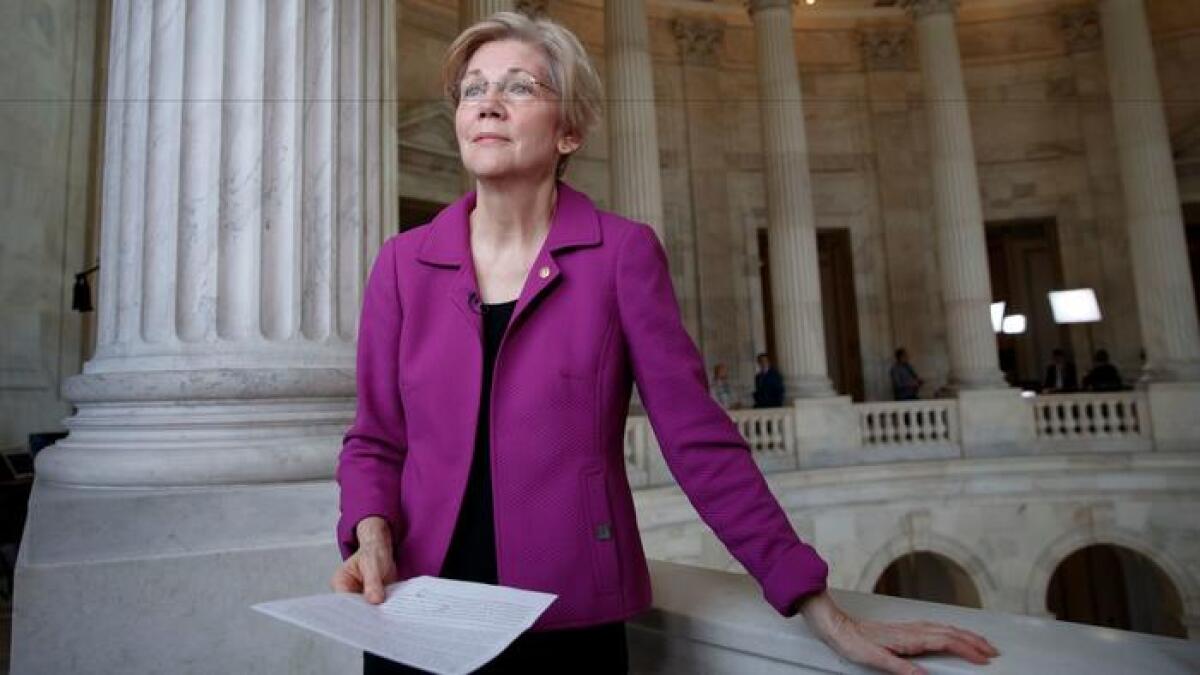
On the same day the Senate rebuked her for reading a letter written by Coretta Scott King, Sen. Elizabeth Warren
(D-Mass.) announced she has a new book coming out in April.
“This Fight Is Our Fight: The Battle to Save America’s Middle Class” is scheduled to be released on April 18 by Metropolitan Books, the publisher announced Tuesday, before Warren was reprimanded on the Senate floor.
Warren’s book will, the publisher promised, tell “the story of how the United States built the greatest middle class in history, and how big corporations and financial institutions then came to overpower the interests of poor, lower-income, and middle-class Americans.”
America’s once-solid middle class is on the ropes, and now Donald Trump and his administration seem determined to deliver the knock-out punch. At this perilous moment in our country’s history, it’s time to fight back -- and I’m looking for more people to join me.
— Elizabeth Warren
GOP’s silencing of Sen. Elizabeth Warren only raises her profile as the Democratic alternative to Trump
The winner of CNN’s prime-time debate between likely 2020 presidential contenders Sens. Bernie Sanders and Ted Cruz was clear: Sen. Elizabeth Warren.
The Massachusetts Democrat punctured the political noise in a defining way late Tuesday night when Senate Republicans silenced her reading of Coretta Scott King’s years-ago criticisms of Trump’s attorney general pick, Sen. Jeff Sessions.
Warren was voted down by Senate Republicans — “The senator will take her seat,” said the presiding officer — in a dramatic display of political clumsiness coming amid concerns over Sessions’ past views on race and at the start of Black History Month.
The response was swift and unrelenting.
“READ THIS. Tonight the GOP silenced @SenWarren AND Coretta Scott King. Below is the letter,” tweeted actress Kerry Washington to her nearly 4.5 million followers.
Twitter delved into the absurdity of a Senate procedure, Rule XIX, that forbids senators from “impugning” the character of another senator, even if it means calling out allegations of racism in a letter from the widow of the slain civil rights leader.
And then there was the made-for-T-shirts quote from Senate Majority Leader Mitch McConnell (R-Ky.) as he justified the vote against Warren: “She was warned; she was given an explanation. Nevertheless she persisted.”
“Nevertheless she persisted” quickly popped up on mock campaign gear on Twitter.
By midday Wednesday #ShePersisted overcame #LetLizSpeak as a trending hashtag on Twitter.
The outcome produced powerful short-term gains for Democrats who are struggling to channel voter unrest over Trump’s agenda into a common cause.
Fundraising was surely robust — “we WILL make our voices heard,” Warren dashed off in an appeal to donors.
But in the longer run, it remains unclear whether Warren’s voice is the best for the party as it tries to rebuild after the 2016 election that delivered Trump to the White House.
Democrats continue soul-searching over their electoral losses, particularly the drift of formerly Democratic blue-collar voters into Trump’s orbit in states like Pennsylvania, Michigan and Wisconsin.
House Democrats were meeting later Wednesday in Baltimore for an annual retreat where that conversation was expected to dominate.
Sanders beat Democratic rival Hillary Clinton during the primaries in some of those states, but it is unclear whether the populist message he — and Warren — deliver can work more broadly with a general election audience.
Other Democrats are trying to rebuild the party in a way that relies on that populist message but without alienating more moderate suburban voters who also moved toward Trump.
At this point, though, Democrats are happy to take their gains when they can, and Warren on Wednesday was making the rounds of media interviews in a victory lap of her moment.
Other senators took turns reading from King’s letter on the Senate floor, and none of the Republicans dared rebuke them.
As for Cruz and Sanders, fresh from their CNN debate on Obamacare, they, too, were talking about Warren.
Cruz, the Texas senator who was the last rival to Trump in the 2016 GOP primary, called her attacks on Sessions “slanderous.”
“When the left doesn’t have any other arguments, they go and just accuse everyone of being a racist,” he told Fox News.
And Sanders stood by Warren’s side. “It is unconscionable that Sen. Mitch McConnell silenced Sen. Elizabeth Warren because she read a letter from Coretta Scott King,” the Vermont independent tweeted.
Trump goes after Nordstrom for dropping his daughter Ivanka’s clothing line
President Trump was responding to Nordstrom’s announcement last week that it would stop selling his daughter’s clothing and accessories line because of poor sales. A boycott of stores that carry Trump-branded merchandise began after Trump was elected.
Trump takes aim at judges, saying ‘a bad high school student’ would see the law favors him
President Trump accused federal judges Wednesday of playing politics by suspending his travel ban and forcefully went after the appeals judges who are deciding whether to uphold that decision.
“It’s a sad day,” Trump said. “I think our security is at risk today, and it will be at risk until we get what we are entitled to.”
Speaking to a gathering of police chiefs in Washington, Trump put on a highly public show of trying to sway the judges. They heard arguments a day earlier in the lawsuit over his executive order suspending all refugee admissions and canceling visas from seven majority-Muslim countries.
Trump read directly from the Immigration and Nationality Act that lays out what powers the president has to stop legal entry into the U.S. in times of crisis.
“A bad high school student would understand this,” Trump said, arguing his central point that the law gives him expansive power to block foreigners from entering the country.
“This is a weapon that you need, and they are trying to take it away from you maybe because of politics, maybe because of political views,” Trump told the law enforcement officers, referring to his order.
Trump’s remarks were an unusually aggressive effort by a sitting president to influence an ongoing court case in which he is involved.
He said he had listened Tuesday night to a broadcast of the arguments before judges from the U.S. 9th Circuit Court of Appeals in San Francisco.
The three-judge panel will decide whether to strike down or uphold a lower-court ruling temporarily suspending the enforcement of Trump’s travel ban.
Civil liberties advocates and Democrats have argued that Trump’s travel ban unfairly blocks entry for Muslims, as he promised to do on the campaign trail. That would violate the constitutional restriction on the government favoring one religion over another, they argue.
The appeals court won’t rule on whether the president’s executive order conflicts with other constitutional protections.
Some national security experts have said that the ban doesn’t address the threats facing the country and could further embolden terrorists to strike against the U.S.
“If the U.S. does not win this case as it so obviously should, we can never have the security and safety to which we are entitled. Politics!” Trump tweeted earlier Wednesday.
He also called the court decision suspending his ban “horrible, dangerous and wrong.”
Senate rebukes Elizabeth Warren for quoting Martin Luther King Jr.’s widow in debate on Jeff Sessions
Sen. Elizabeth Warren has earned a rare rebuke by the Senate for — believe it or not — quoting Coretta Scott King on the Senate floor.
The Massachusetts Democrat ran afoul of the chamber’s arcane rules by reading a 30-year-old letter from Dr. Martin Luther King’s widow that dated to Sen. Jeff Sessions’ failed judicial nomination three decades ago.
The chamber is debating the Alabama Republican’s nomination for attorney general, with Democrats dropping senatorial niceties to oppose Sessions and Republicans sticking up for him.
King wrote that when acting as a federal prosecutor, Sessions used his power to “chill the free exercise of the vote by black citizens.”
Quoting King technically put Warren in violation of Senate rules for “impugning the motives” of Sessions, though senators have said far worse stuff. And Warren was reading from a letter that was written 10 years before Sessions was even elected to the Senate.
Still, top Senate Republican Mitch McConnell invoked the rules. After a few parliamentary moves, the GOP-controlled Senate voted to back him up.
Now, Warren is forbidden from speaking again on Sessions’ nomination. A vote on Sessions is expected Wednesday evening.
Democrats pointed out that McConnell didn’t object when Sen. Ted Cruz (R-Texas) called him a liar in a 2015 dustup.
“I’m reading a letter from Coretta Scott King to the Judiciary Committee from 1986 that was admitted into the record. I’m simply reading what she wrote about what the nomination of Jeff Sessions to be a federal court judge meant and what it would mean in history for her,” Warren said.
House committee votes to scrap agency that helps states improve voting systems
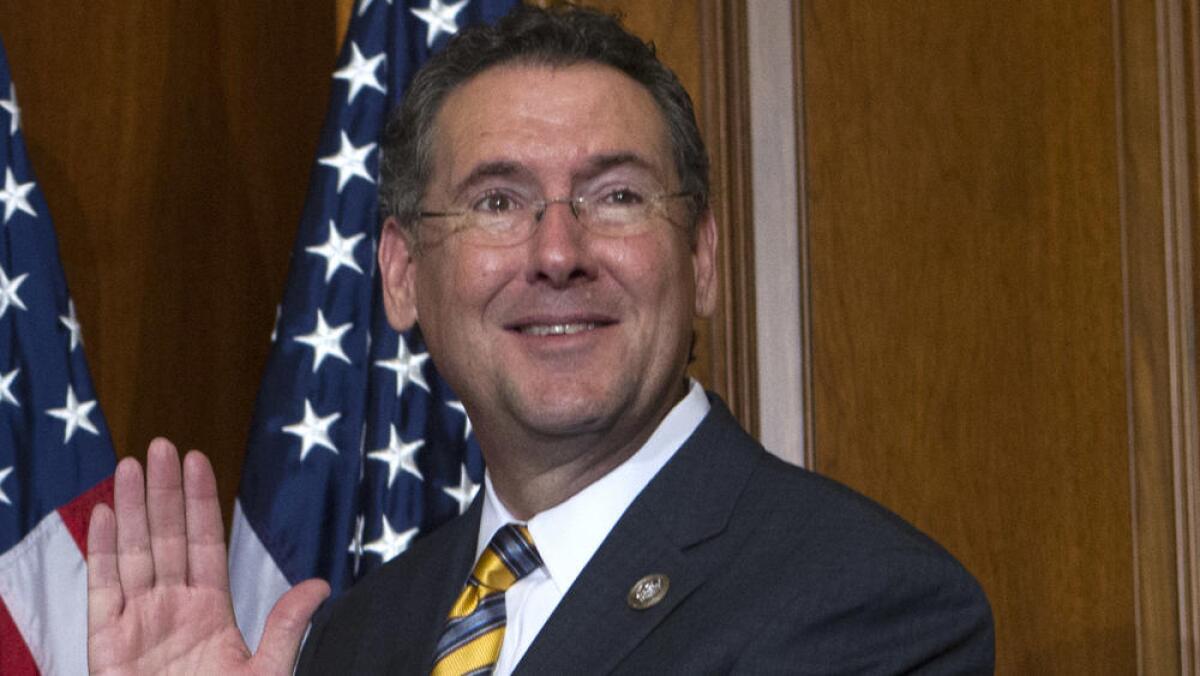
A House committee voted Tuesday to eliminate an independent election commission charged with helping states improve their voting systems.
The party-line vote came less than two days after Trump vowed to set up a White House commission helmed by Vice President Mike Pence to pursue Trump’s erroneous claims of election fraud.
The GOP majority on the House Administration Committee voted to eliminate the Election Assistance Commission, which was created by Congress after the 2000 Florida recount to upgrade voting technology and provide election-related information to federal entities, state officials and election administrators.
Republicans, who led the effort to terminate the agency, say it’s a prime example of government waste. They’ve been introducing legislation to end the commission for years with little success.
“If we’re looking at reducing the size of government, this is a perfect example of something that can be eliminated,” said Rep. Gregg Harper (R-Miss.), the committee chairman, after the bill passed on a 6-3 vote. “We don’t need fluff.”
Harper said he hadn’t spoken to Trump about the legislation. “He’s certainly welcome to call me at any time,” he said.
The bill was opposed by committee Democrats and voting rights groups, who argued that the agency plays a vital role in protecting elections from hacking and other types of interference.
The committee also voted to terminate the public financing system, which provides major party presidential nominees a lump sum grant of about $94.14 million in the general election. But by accepting the grant, a candidate may not raise any additional funds and is severely limited in how much of his own money he can give or lend to his campaign.
Neither Hillary Clinton nor Trump accepted public financing in the 2016 campaign.
Money for the public financing of campaigns is collected through voluntary $3 checkoffs on tax returns. The legislation would devote $63 million of the available funds to pediatric cancer research. The remainder would be returned to the Treasury for deficit reduction.
It is unclear whether the full House will vote on the measures.
As court argument begins on travel ban, administration runs into skeptical questions
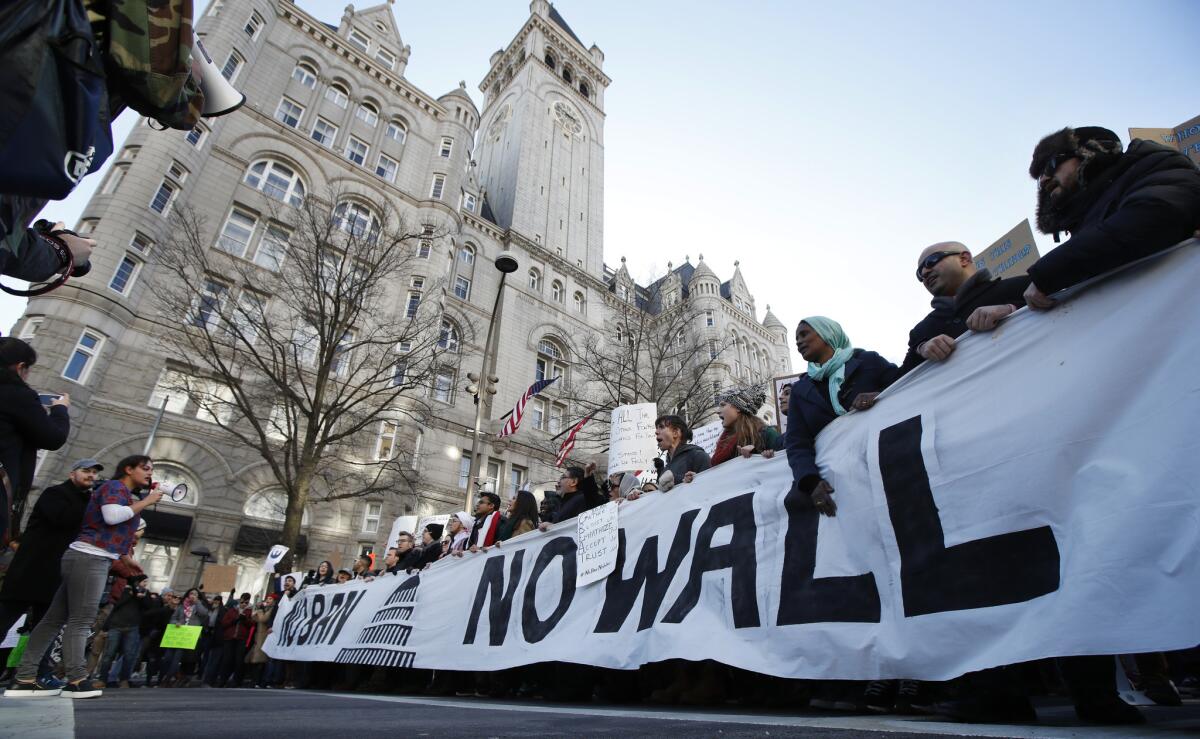
A lawyer for the Trump administration ran into skeptical questions from a panel of federal judges as the U.S. 9th Circuit Court of Appeals began a hearing on the president’s travel ban.
“Haven’t there been allegations here of bad faith” by President Trump in his decision making, asked Judge Michelle T. Friedland, referring to claims that the executive order restricting travel from seven countries was a thinly disguised way of banning Muslims from the country.
The three-judge 9th Circuit panel is hearing arguments on whether to allow Trump’s executive order to be implemented. A district court judge in Seattle has issued a temporary restraining order blocking the government from putting the executive order into effect.
All three of the judges on the panel asked attorney August E. Flentje, representing the federal government, for evidence that people holding valid visas from any of the seven countries had committed terrorist acts in the U.S.
“The president determined there was a real risk,” Flentje said.
Judges again asked if there was any other evidence. “The proceedings have been moving very fast,” Flentje said, explaining that so far the record of the case does not include any such evidence.
Friedland quickly shot back that the reason the proceedings were moving quickly was that the administration had filed an emergency appeal rather than allow the district court to hold a full hearing.
“Are you arguing then that the president’s decision in that regard is unreviewable?” Friedland asked.
“Yes,” the government attorney responded.
As appeals court takes on White House immigration order, conservative media is talking about the terrorist threat
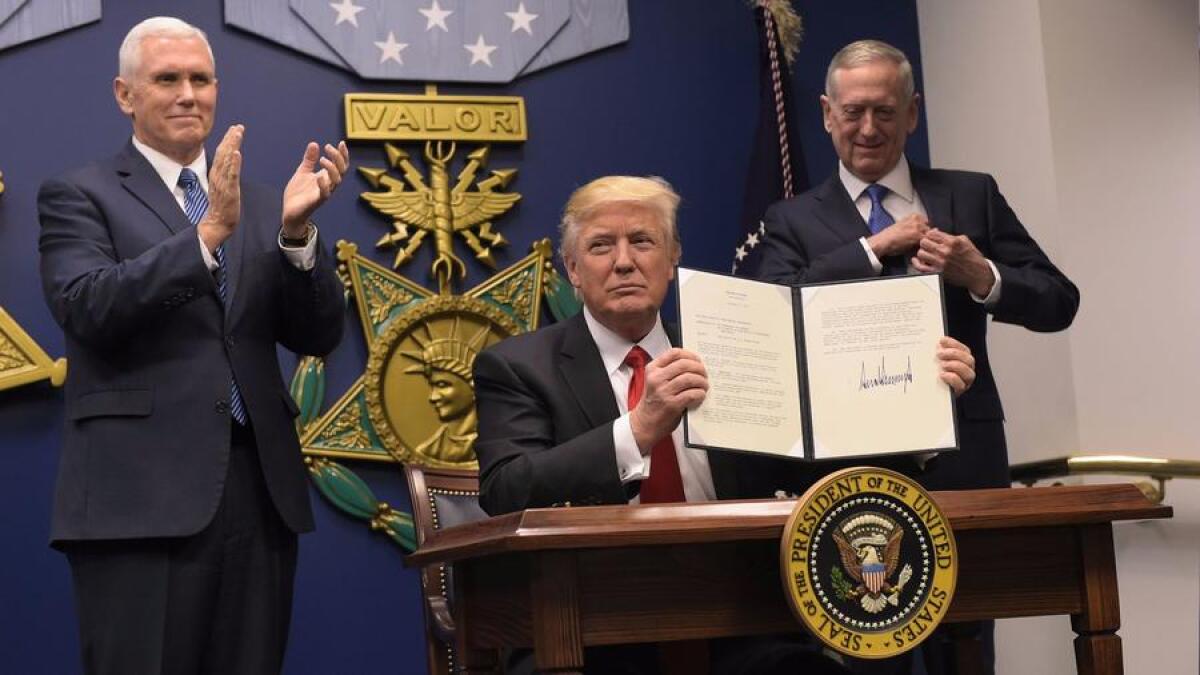
Observers on both sides of the aisle are watching as a federal appeals court hears arguments on whether to stay a restraining order on President Trump’s ban on travel from seven majority-Muslim countries.
To be blunt: It’s the big story of the day.
In the conservative media — which we’re going to be watching more closely as a new GOP administration gets rolling — it’s all about blocking the terrorist threat to the country.
Here are some of the headlines out there today:
Fair-weather fighters: ISIS jihadists claim headaches, bad backs to get out of battle, documents show (Fox News)
On Fox News, a destination for round-the-clock terrorism coverage, several stories Tuesday focus on Islamic State, including a piece based off a Washington Post report highlighting fatigue among its fighters.
France: Anti-Christian attacks rise 245% (Breitbart)
As President Trump continues a steady drumbeat about terrorist attacks in France and throughout Europe — a side effect, he says, of Syrian refugees and “radical Islamic terrorism” — Breitbart is focused on a recent report issued by the French Interior Ministry showing an uptick in attacks on Christian places of worship.
Also out there: A spirited defense of White House senior advisor Steve Bannon. “Saturday Night Live” last week compared him to the Grim Reaper. But there’s been pushback:
Steve Bannon is not the imaginary hobgoblin portrayed by the media elite (American Spectator)
In an interview last week with the New York Times, the president’s chief advisor said the mainstream media should “keep its mouth shut and just listen for a while,” arguing that traditional news organizations have “zero integrity, zero intelligence.”
The Spectator’s glowing profile of Bannon, who helped found Breitbart, suggests that the way many media outlets cover his comments could be categorized as “fascinated hogwash” devoid of any context.
Taxes and NAFTA: Can Trump’s cure for American manufacturing bolster the auto industry?
President Trump is not a fan of recent trade deals.
He condemned the Trans-Pacific Partnership during the campaign and called the North American Free Trade Agreement “the worst trade deal maybe ever signed anywhere.”
Since being elected, he has signaled a move toward more protectionist policies, suggesting at one point a border tax of 20% on imported goods. Those policies may affect the auto industry differently than in the past.
The U.S. auto industry is now intricately tied into a global web of factories, supply chains and international markets. This process started years before NAFTA and accelerated after the 2009 financial crisis.
“Today, you can walk into a dealership in the United States and buy a car that was built in Poland, Hungary, the Netherlands, Thailand, China and in several other countries,” said Bernard Swiecki, senior automotive analyst at the Center for Automotive Research, a nonprofit automotive research organization.
Or you can buy a Camry built in Kentucky.
The law backs a president’s power on immigration. Here’s where the travel ban differs
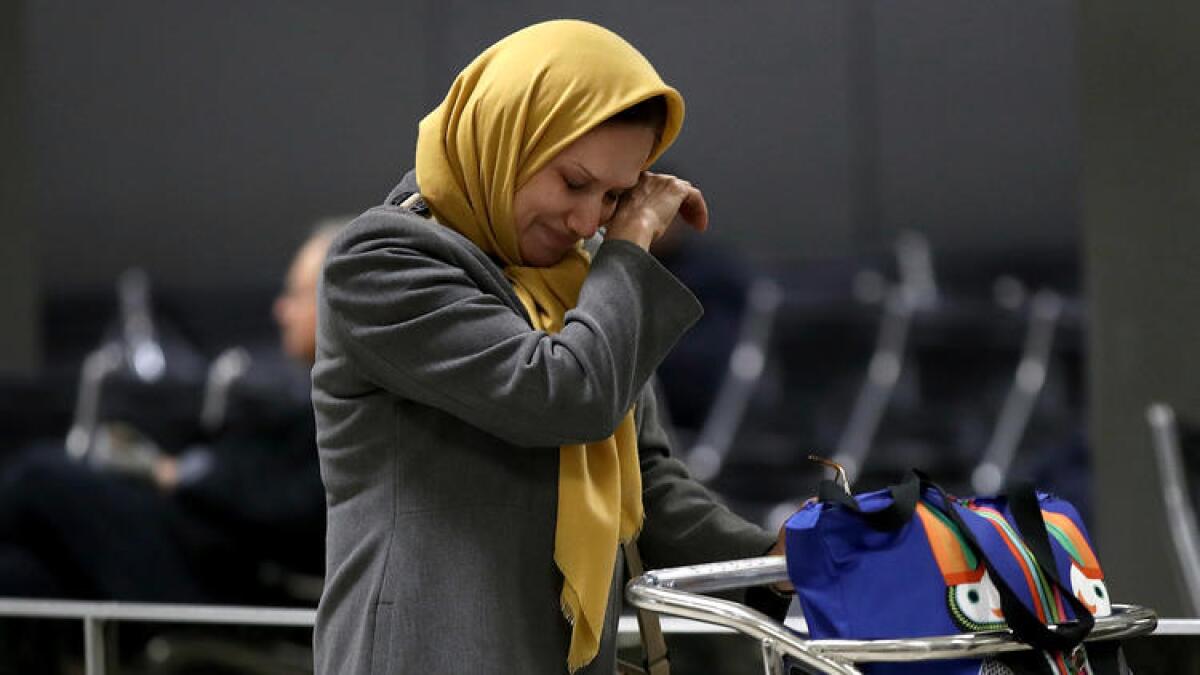
Even before Donald Trump entered the White House, many were predicting federal courts would serve as an important check on his use of presidential power, particularly given his aggressive style and a GOP-led Congress that so has far been loath to confront him.
But few expected the first constitutional clash would occur in Trump’s third week on the job.
Fortunately for Trump, the law on immigration and related matters favors the president. Legal precedents traditionally have accorded the chief executive complete and nearly unchecked power to deny foreigners permission to enter the United States.
White House: Trump doesn’t question judicial independence
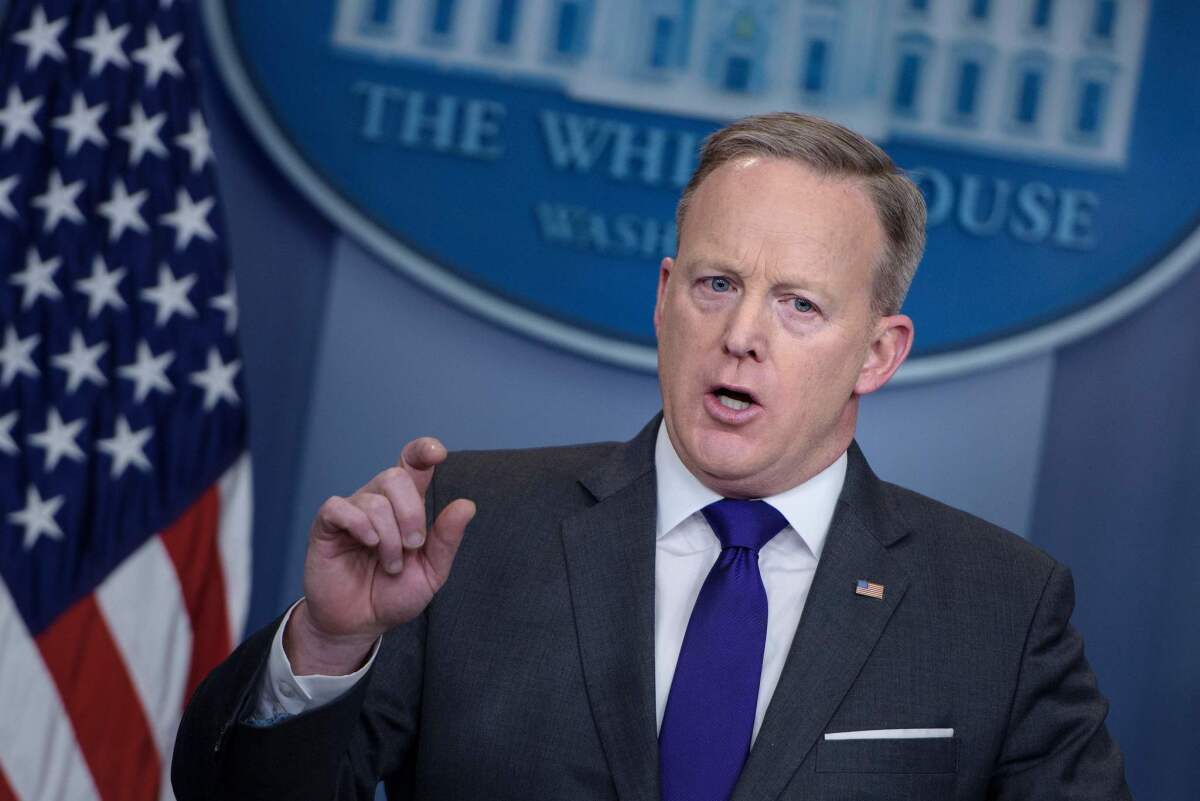
The White House again insisted Tuesday that the courts ultimately will find that President Trump’s travel ban is constitutional, making its case hours before a hearing that could determine whether the administration can resume enforcement of the directive.
Press Secretary Sean Spicer defended what he said was the president’s “immediate and decisive action” to suspend travel from seven mostly Muslim nations “to make sure that this country and our people are protected.”
“That’s what he’s talking about, is making sure that we don’t have any regret ... that we haven’t done something to protect people,” Spicer said, citing existing law that grants a president broad authority to suspend immigration in the event of a potential threat.
Spicer reminded reporters at his daily briefing that the three-judge panel on the U.S. 9th Circuit Court of Appeals would not issue a decision on whether the president’s executive order conflicts with other constitutional protections, but rather whether to strike down a lower court ruling temporarily suspending the enforcement of it.
Spicer noted that administration had been successful in a similar effort in a Boston case.
“There, once we were able to explain our position, the court lifted the order and held that the president’s executive order could take effect,” he said. “We look forward to a final decision on the merits of this soon.”
Spicer also denied that Trump was seeking to undermine judicial independence when the president tweeted over the weekend about the legal proceedings. Trump referred at one point to the “so-called judge” who had granted the restraining order at issue in today’s 9th Circuit hearing.
“There’s no question the president respects the judicial branch and its ruling,” Spicer said. But, “I don’t think there’s any other way that you can interpret that, that the president has the discretion to do what’s necessary to keep this country safe.”
Homeland Security Secretary Kelly denies that White House pressured him to preserve ban on entry by green card holders
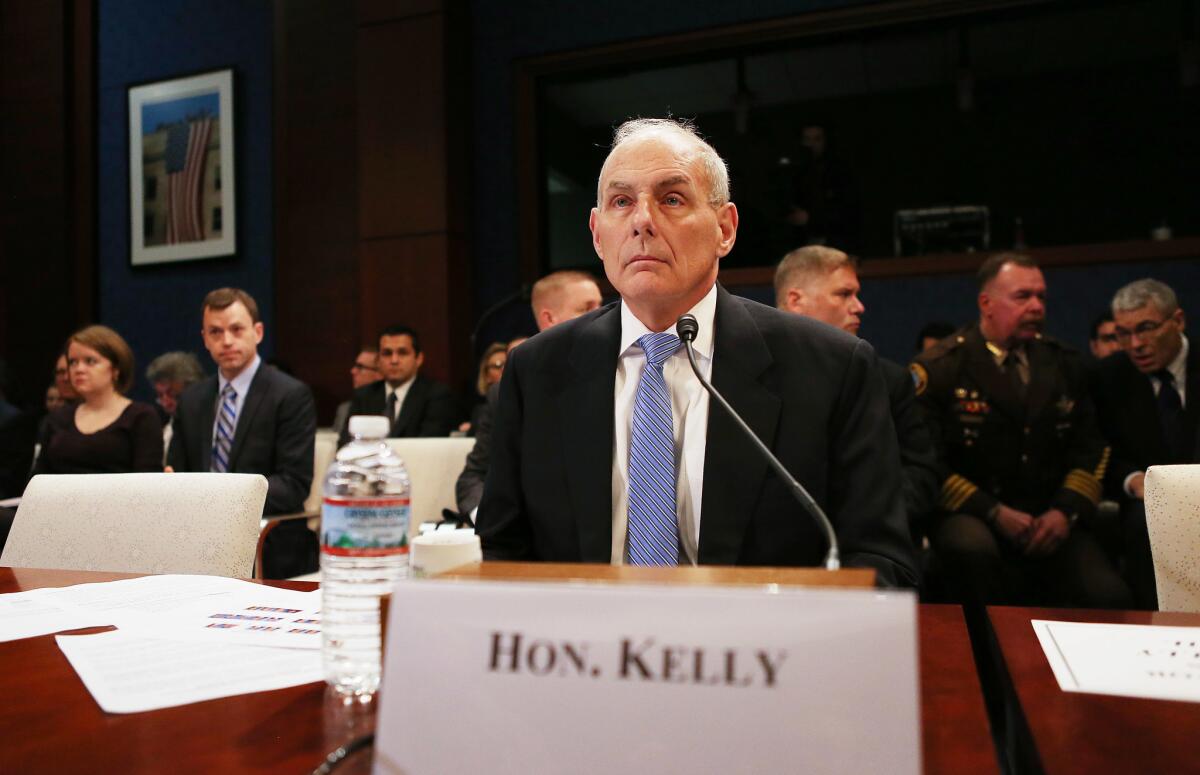
Homeland Security Secretary John F. Kelly denied Tuesday that a senior White House aide asked him to keep in place a temporary ban on allowing green card holders to enter the U.S.
Permanent residents were caught up in the early hours of President Trump’s temporary bans on entry by refugees and travelers from seven predominantly Muslim countries. After the orders sowed confusion and drew widespread condemnation, the Department of Homeland Security clarified that green card holders would not be kept out of the country.
According to a weekend report in the Washington Post, Kelly was asked by senior White House counselor Steve Bannon to preserve the ban on green card holders. The White House strongly denied the story, and Kelly echoed that stance at a House Homeland Security Committee hearing, calling the report “untrue.”
“Every paragraph, every sentence … was wrong,” Kelly said. “It was a fantasy story. This reporter, whoever he is, got it so wrong; that’s assuming he’s not making it up.”
Rep. Kathleen Rice (D-N.Y.) asked whether Kelly had concerns about political advisors pressuring him to act.
“I work for one man. His name is Donald Trump,” Kelly said. “He has told me one thing: ‘Secure the border.’”
Key House Republican calls on Trump to fire head of the Consumer Financial Protection Bureau
The chairman of the House Financial Services Committee on Tuesday called for President Trump to fire the head of the Consumer Financial Protection Bureau.
During an interview on Fox Business Network, Rep. Jeb Hensarling (R-Texas) said that “personnel is policy” and urged Trump to “immediately fire” CFPB Director Richard Cordray.
Hensarling has been an outspoken critic of the bureau, which was created by the Dodd-Frank financial reform act that Trump says he wants to try to dismantle.
The bureau, which took over and expanded on consumer protection duties that had been spread among several other regulators, issues and enforces regulations on mortgages, credit cards, payday loans and other financial products.
Hensarling is the author of a sweeping proposal to replace Dodd-Frank. The legislation would rename the bureau the Consumer Financial Opportunity Commission, replace the single director with five commissioners and subject it to congressional appropriations.
Two Republican senators — Mike Lee of Utah and Ben Sasse of Nebraska — also have called on Trump to fire Cordray. But there are legal questions about Trump’s authority to make such a move at the independent bureau.
Cordray has said he has no plans to step down before his term ends in July 2018.
Homeland Security secretary: ‘We’re not going to build a wall everywhere all at once’
Homeland Security Secretary John F. Kelly laid out for lawmakers on Tuesday the lengthy timeline needed to build a wall along the U.S. border with Mexico, giving the administration’s first detailed description of how the project, President Trump’s central campaign promise, will unfold.
Rather than immediately launching a massive, multibillion-dollar construction project along the 2,000 miles of the southern border, Kelly described a more restrained approach.
“We’re not going to build a wall everywhere all at once,” he told the House Homeland Security Committee.
About 650 miles of walls and fences already exist along the border now. Kelly said he would rely on border agents to tell him where they need a wall right away, and fill in gaps with ground sensors, surveillance blimps and other technologies that help detect illegal border crossings.
The department lives in “a world of finite time [and] resources,” he said.
Nonetheless, Kelly said he wants to see construction of a wall “well underway” within two years.
Constructing a wall to cover the 2,000-mile border with Mexico, as Trump repeatedly pledged during the campaign, will cost tens of billions of dollars, according to estimates. Trump has insisted Mexico will pay for the wall, but Mexican officials have said their country won’t foot the bill.
Trump vows to keep fighting for ‘common sense’ travel ban
President Trump said his administration will fight to preserve his seven-nation travel ban, even if it means appealing to the Supreme Court.
“It’s very important for the country,” Trump told reporters Tuesday during a round table with sheriffs from around the country, calling his executive order “common sense.” “We have to have security in our country.”
Surrounded by the members of law enforcement, Trump restated his administration’s commitment to preventing terrorism on U.S. soil.
“They want to take a lot of our powers away,” he said. “Some people with the wrong intentions.”
Also on hand was Dana Boente, the acting U.S. attorney general installed just a week ago after the previous one, Sally Yates, directed Justice Department lawyers not to defend Trump’s executive order.
The U.S. 9th Circuit Court of Appeal was to hear arguments Tuesday in the administration’s appeal of a Washington state judge’s temporary restraining order halting enforcement of the administration plan.
Labor nominee Puzder admits employing a housekeeper who was in the U.S. illegally
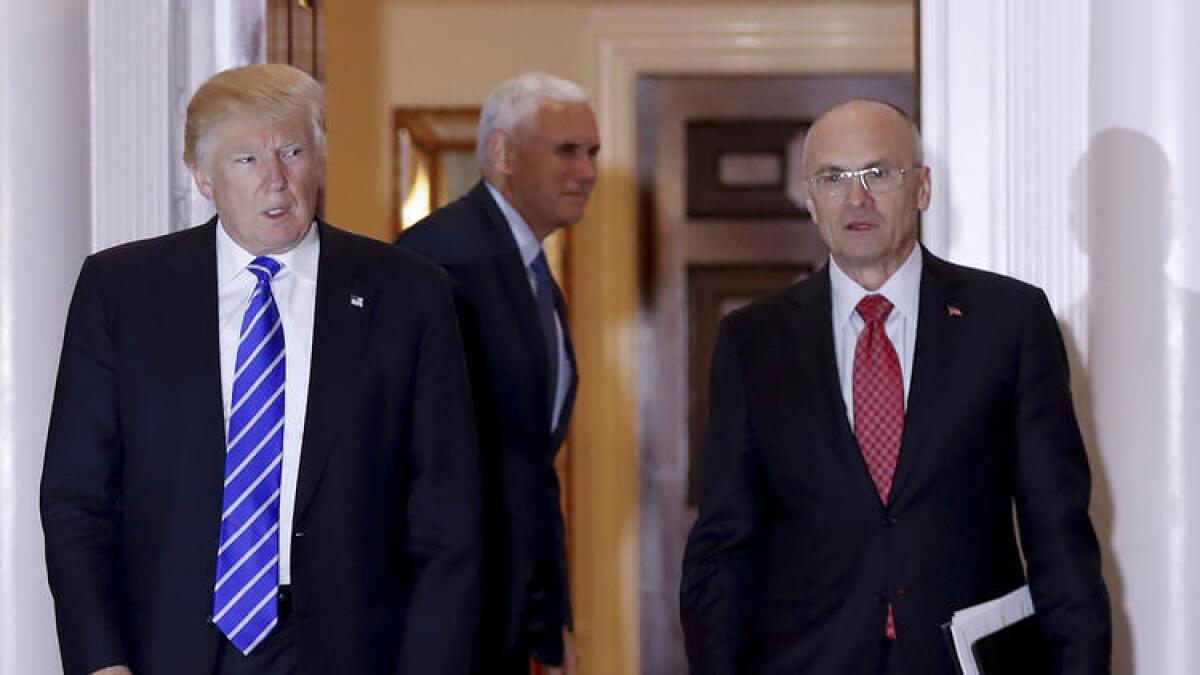
Andy Puzder, President Trump’s nominee for Labor secretary, admitted to employing an immigrant housekeeper who had entered the U.S. illegally, raising another potential problem for his confirmation amid Democratic criticism of his treatment of workers.
“My wife and I employed a housekeeper for a few years, during which I was unaware that she was not legally permitted to work in the U.S.,” Puzder said in a written statement provided by a spokesman.
“When I learned of her status, we immediately ended her employment and offered her assistance in getting legal status. We have fully paid back taxes to the IRS and the state of California,” said Puzder, who is chief executive of CKE Restaurants Inc., the Carpinteria-based parent of the Carl’s Jr. and Hardee’s fast-food chains.
Homeland Security secretary takes responsibility for travel ban’s botched rollout: It’s ‘all on me’
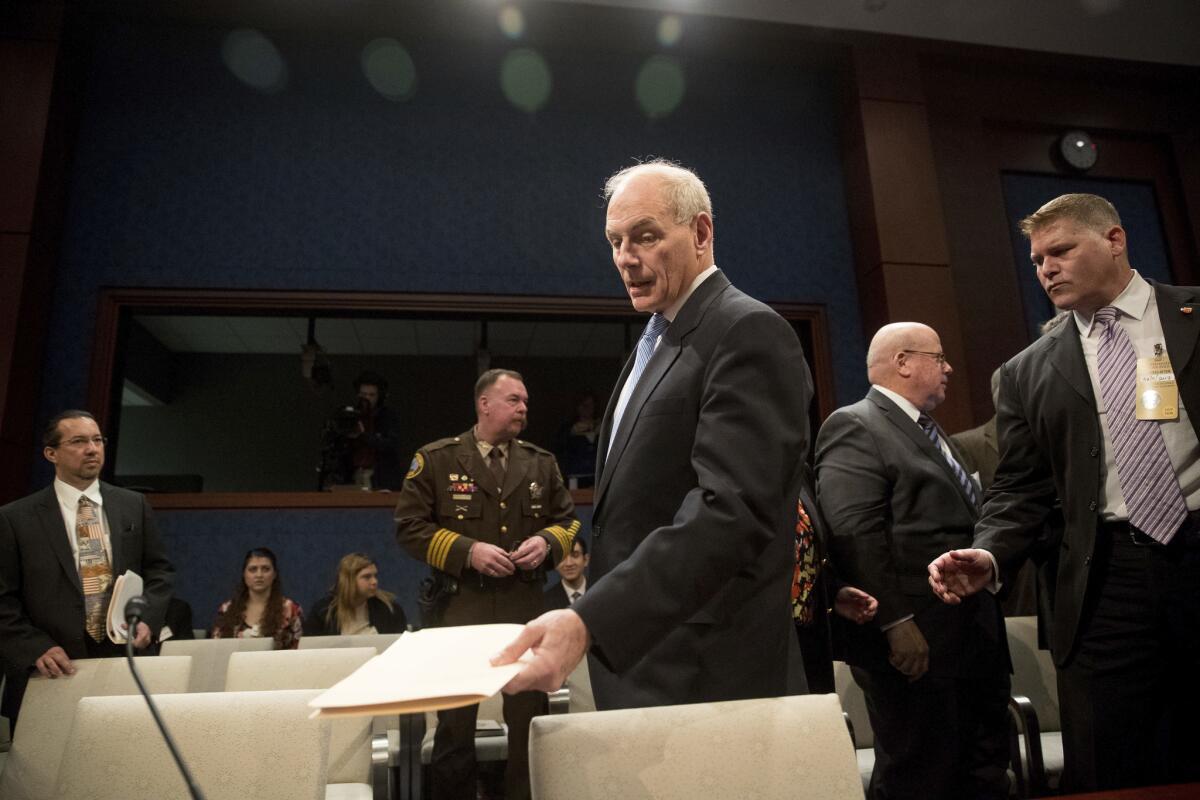
President Trump’s top Homeland Security official took responsibility Tuesday for the haphazard rollout of Trump’s restrictions on entry into the U.S., a striking claim because he was largely left out of the crafting of the order.
The confusion surrounding the execution of the order is “all on me,” Homeland Security Secretary John F. Kelly told the House Homeland Security Committee in his first appearance before Congress since Trump temporarily halted refugees and barred entry for people to the U.S. from seven Muslim-majority countries.
Looking back, Kelly added, “I should have delayed it just a bit” to inform those directly affected by the order as well as members of Congress.
But the writing of the order and planning for its rollout was limited chiefly to a handful of senior White House advisors and agency lawyers, and Kelly found himself in the awkward position of defending the execution of a directive he didn’t see until the week it was issued and wasn’t told was coming until the day before it was signed.
“The thinking was to get it out quick so that people trying to come here to harm us could not take advantage of a period of time to jump on an airplane,” he said.
The White House has been heavily criticized not only for the chaos at airports that ensued after the ban was implemented but also because lawmakers and policy experts were left out of crafting the directive.
Lawmakers of both parties condemned the White House over the temporary ban’s implementation.
Melania Trump refiles libel lawsuit claiming she lost a ‘once-in-a-lifetime’ chance to profit off her high profile
First Lady Melania Trump this week refiled a libel lawsuit against the corporation that publishes the Daily Mail’s website, this time in New York, for reporting rumors that she worked as an escort.
In the new filing Monday, the first lady’s attorneys argue the report damaged her ability to profit off her high profile.
Mrs. Trump, the filing states, “had the unique, once-in-a-lifetime opportunity, as an extremely famous and well-known person, as well as a former professional model, brand spokesperson and successful businesswoman, to launch a broad-based commercial brand in multiple product categories, each of which could have garnered multi-million dollar business relationships for a multi-year term during which Plaintiff is one of the most photographed women in the world.”
Those product categories, it goes on to say, could have included apparel, accessories, jewelry, cosmetics, hair care and fragrance, among others.
Trump had previously filed the lawsuit against Mail Media Inc. in Maryland, but a judge earlier this month ruled the case shouldn’t be filed in Maryland and dismissed it. The lawsuit now filed in New York, where the corporation has offices, seeks compensatory and punitive damages of at least $150 million.
Trump had sued Mail Media Inc. along with blogger Webster Tarpley for reporting the rumors. Trump filed the lawsuit in Maryland after both Tarpley and the Daily Mail issued retractions. The lawsuit against Tarpley has been allowed to move ahead in Maryland.
Without citing evidence, Trump says terrorist attacks go unreported by news media
Days after a senior White House aide complained that the news media had failed to report a nonexistent “massacre” in Kentucky, President Trump suggested Monday that journalists deliberately ignored terrorist attacks.
“It’s gotten to a point where it’s not even being reported,” Trump said in remarks to troops at MacDill Air Force Base in Tampa, Fla. “And in many cases, the very, very dishonest press doesn’t want to report it. They have their reasons and you understand that.”
It’s unclear which attacks he had in mind because the news media have devoted extensive resources to covering both terrorist plots and counter-terrorism operations since the Sept. 11 attacks in 2001.
The administration has disputed critical coverage of last week’s special operations raid at an Al Qaeda compound in Yemen, insisting it was a success despite the death of a U.S. Navy SEAL and the reported deaths of up to a dozen women and children.
And Kellyanne Conway, a senior White House advisor, said Friday that she misspoke when she brought up a nonexistent attack in Bowling Green, Ky. Her comment sparked a rash of mockery on social media and drew renewed attention Monday when earlier instances surfaced where she used the same phrasing.
The White House later painted the president’s remarks at MacDill as a critique of the media, rather than a demonstrably false claim about whether attacks were covered.
“He felt members of the media don’t always cover some of those events to the extent that other events might get covered. Protests will get blown out of the water, and yet an attack or a foiled attack doesn’t necessarily get the same coverage,” Press Secretary Sean Spicer told reporters.
The White House also released a list of 78 attacks in recent years, saying most failed to garner enough attention from the press.
Notably, the list included several of the most prominent terrorist attacks during that time span. Included were the 2015 Paris attacks that killed 130 people, the Orlando, Fla., nightclub massacre last summer that killed 49 people and dominated not only the news but also discussion on the campaign trail, and the San Bernardino shooting in December 2015 in which 14 people were gunned down. The Times won a Pulitzer Prize for its breaking-news coverage of the attack.
Kremlin says Fox News was ‘insulting’ in calling Putin a killer
The Kremlin said Monday it wanted Fox News to apologize for the “insulting” comment its host made about Russian President Vladimir Putin, calling him a “killer.”
In an interview broadcast Sunday, President Trump told the network’s Bill O’Reilly that he respected Putin.
“He’s a killer, though,” O’Reilly interjected. “Putin’s a killer.”
In the 16 years that Putin has been either president or prime minister, several Russian opposition leaders, human rights activists, journalists and whistle-blowers were assassinated or died under suspicious circumstances.
The Kremlin, which has always denied involvement in any of those deaths, lashed out at the network. “We think that such words from a correspondent of the Fox News network are unacceptable, insulting,” Kremlin spokesman Dmitri Peskov told journalists in a conference call. “And we would, honestly, prefer to receive apologies.”
Pelosi calls Trump’s plan to dismantle financial regulations a ‘massive con’ and vows to fight it
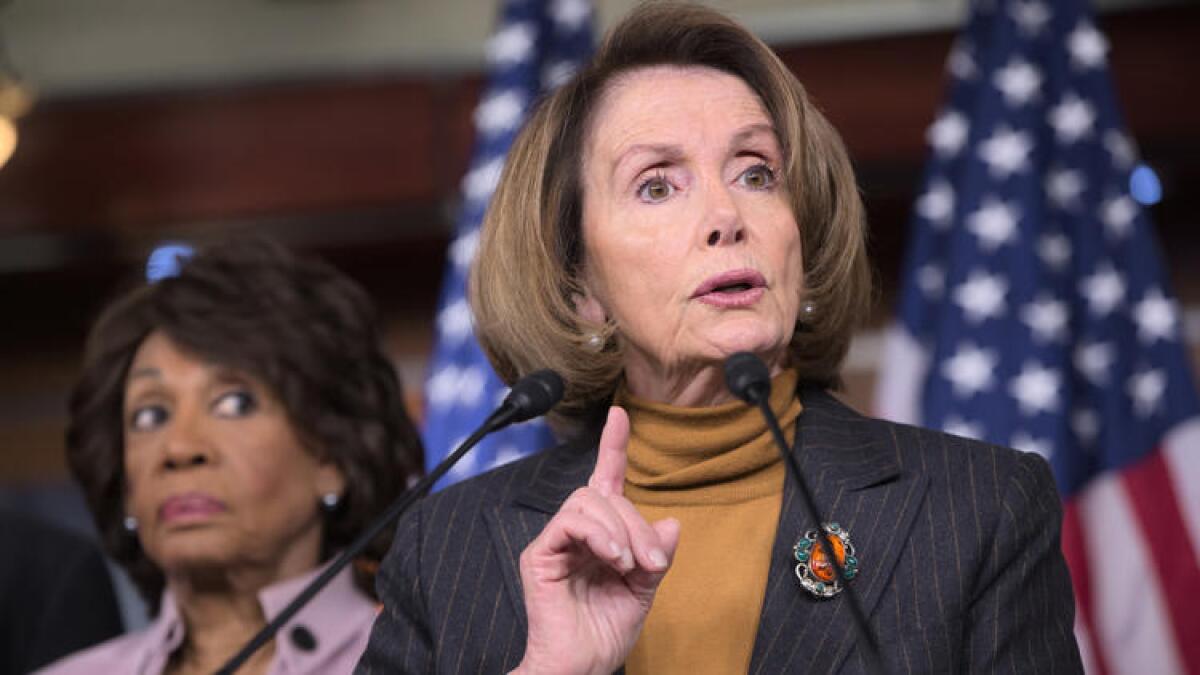
House Democratic Leader Nancy Pelosi vowed Monday to fight what she called President Trump’s “massive con” to dismantle the Dodd-Frank financial law.
Pelosi said House Democrats would take their case to the public to try to stop Trump from removing protections designed to prevent a repeat of the 2008 financial crisis.
“The president has moved to expose hardworking Americans to unfair, deceptive and predatory practices, perpetuating a massive con on those who thought he would stand up for them against the powerful interests,” Pelosi told reporters.
There’s a long history of presidential untruths. Here’s why Donald Trump is ‘in a class by himself’
As president, Ronald Reagan spoke movingly of the shock and horror he felt as part of a military film crew documenting firsthand the atrocities of the Nazi death camps.
The story wasn’t true.
Years later, an adamant, finger-wagging Bill Clinton looked straight into a live TV camera and told the American people he never had sex with White House intern Monica Lewinsky.
He was lying.
Presidents of all stripes and both major political parties have bent, massaged or shaded the truth, elided uncomfortable facts or otherwise misled the public — unwittingly or, sometimes, very purposefully.
“It’s not surprising,” said Charles Lewis, a journalism professor at American University who wrote a book chronicling presidential deceptions. “It’s as old as time itself.”
But White House scholars and other students of government agree there has never been a president like Donald Trump, whose volume of falsehoods, misstatements and serial exaggerations — on matters large and wincingly small — place him “in a class by himself,” as Texas A&M’s George Edwards put it.
Analysis: Democrats find their voice in the protests against President Trump
The fight over the future of the Democratic Party has been decided in the streets.
The swelling crowds at women’s marches and the chanting airport cadres protesting President Trump’s new immigration plan have pushed the party to the left after years of mincing steps in that direction, most recently in the presidential contest.
After the November election, a convulsion began within Democratic ranks over how to rebuild from a stunning defeat. The options were to carve a path toward the white working class and suburban residents of middle America or toward the Obama coalition of urban, young and minority voters — or to sharpen a message that appealed to both.
Trump’s presidency has shunted that debate aside, and the ensuing protests have defined the party as more liberal and more activist than it was even months ago. While some Democrats fear a fracturing of the party, others are convinced that opposition to the president will force unity on the factions.
Obama saw low-wage workers as struggling moms. Trump may see them as suburban teens
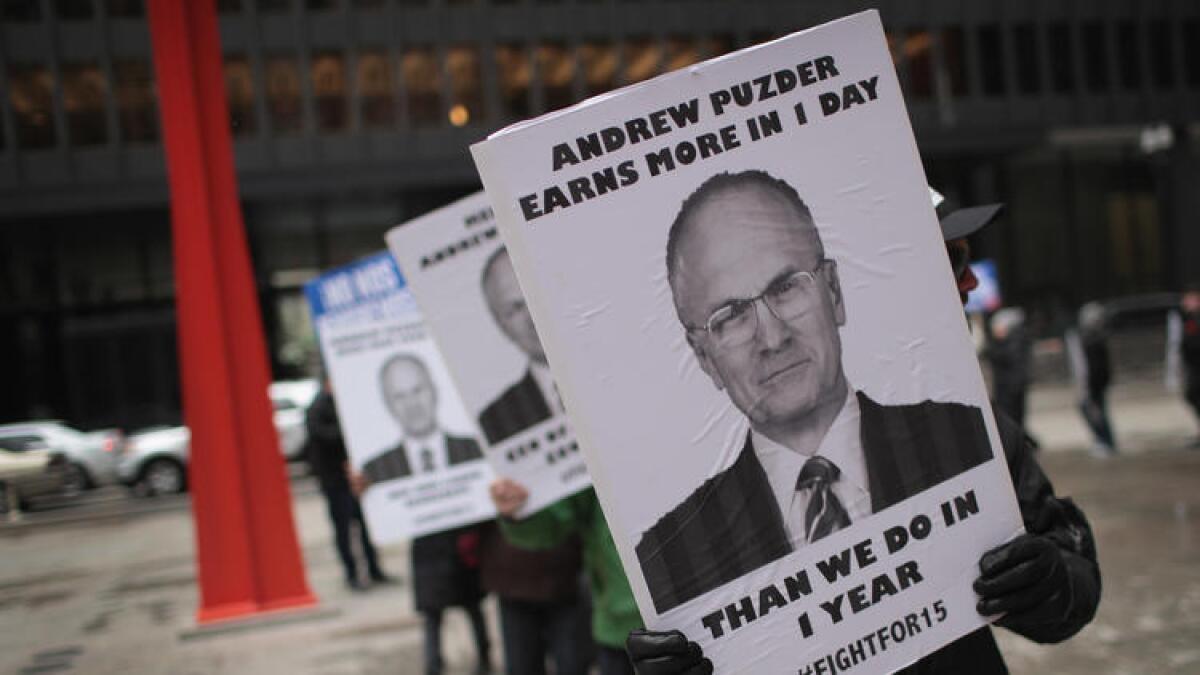
Andy Puzder, the fast-food executive who is President Trump’s nominee for Labor secretary, fondly recalls his first job: scooping ice cream at Baskin-Robbins for a buck an hour as a teenager near Cleveland.
“I learned a lot about inventory and customer service,” the chief executive of CKE Restaurants Inc. told The Times last year. “But there’s no way in the world that scooping ice cream is worth $15 an hour, and no one ever intended it would ever be something that a person could support a family on.”
Those comments encapsulate the starkly different approach the Trump administration is expected to take on low-wage workers and their issues, compared with the Obama administration.
To President Trump and other Republicans, fast-food jobs and other low-paying work are largely for young people just getting started in the labor market. An increase in the federal minimum wage to $15 from the current $7.25 would reduce those opportunities, hurting workers and businesses, Republicans say.
States urge appeals court to leave judge’s order in place blocking Trump’s immigration order
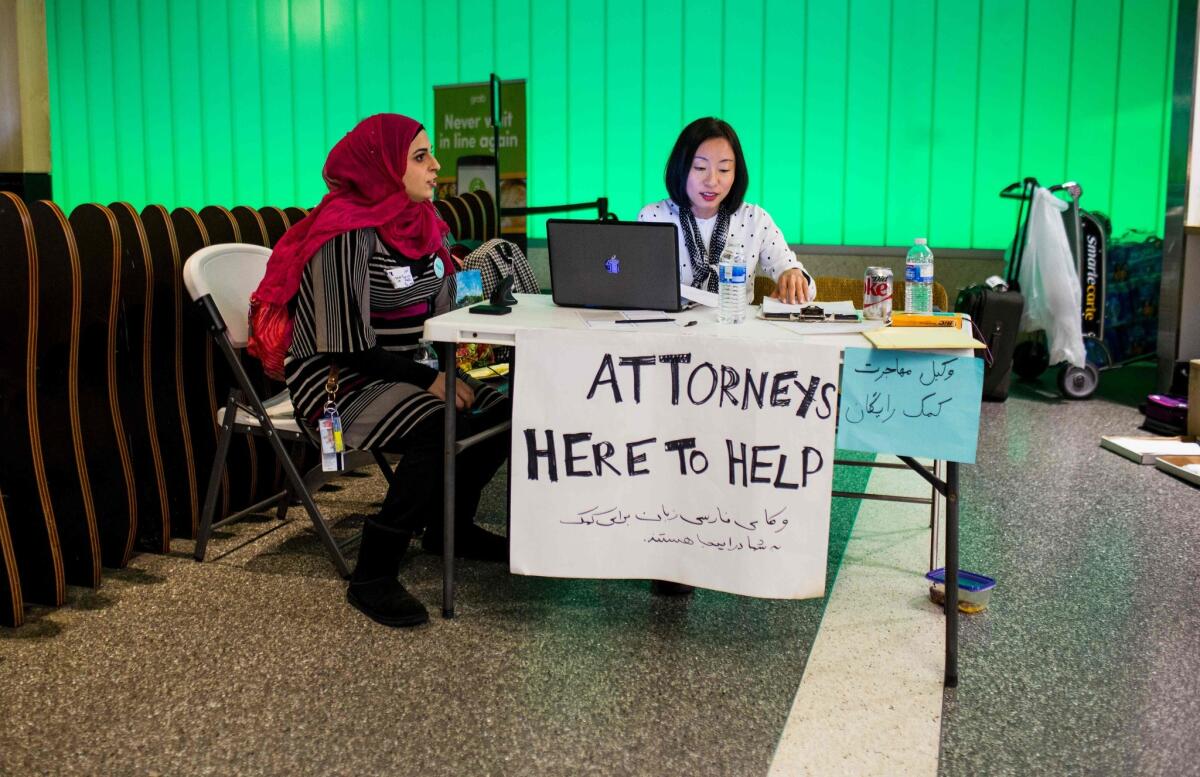
Removing a hold on President Trump’s travel moratorium would “unleash chaos again” and hurt business and universities, two states told a federal appeals court Monday.
In written arguments, lawyers for the states of Washington and Minnesota said a temporary hold on Trump’s executive order banning travel from seven predominantly Muslim nations should remain in place until a lower court determines whether the order was unconstitutional.
The state of Washington citied a litany of problems caused by the order. More than 7,000 non-citizen immigrants from the affected countries live in Washington, the state told the appeals court.
“Those who were abroad were blocked from returning home,” the states argued. “Husbands were separated from wives, brothers from sisters, and parents from their children.”
Nearly 100 businesses, including well-known technology firms such as Apple, Google, Twitter and Uber, filed arguments supporting the states’ case.
The companies argued the ban was disruptive, making it more difficult for them to recruit and retain employees and threatening their ability to attract attract talent, business, and investment to the United States.
A number of former national security and intelligence officials — including former secretaries of State John F Kerry and Madeleine Albright, former defense secretary and CIA director Leon E. Panetta, and ex-national security advisor Susan Rice — also sided with the states.
In a declaration, they argued that the order “could do long-term damage to our national security and foreign policy interests, endangering U.S. troops in the field and disrupting counter-terrorism and national security partnerships.”
Trump: ‘California in many ways is out of control’
Declaring California to be “out of control,” President Trump threatened to withhold federal funding to the state if it votes to declare itself a sanctuary state.
A state Senate committee on Tuesday approved a billfrom State Senate President Pro Tem Kevin de León that would prohibit state and local law enforcement agencies from using officers or jails to uphold federal immigration laws, effectively a statewide version of so-called sanctuary cities.
In an interview airing during Fox’s Super Bowl pregame show, Fox News Channel host Bill O’Reilly asked the president about the plan.
“I think it’s ridiculous,” Trump said, reiterating his opposition to sanctuary cities, which he said “breed crime.” He signed an executive order in his first week in office that threatened to withhold federal funding for cities that don’t cooperate with federal immigration officials.
“If we have to, we’ll defund,” Trump said. “We give tremendous amounts of money to California. California in many ways is out of control, as you know.”
Trump said it wasn’t his preference to do so, and that states and cities should get money they need “to properly operate.”
But, “if they’re going to have sanctuary cities, we may have to do that. Certainly that would be a weapon,” he said.
Trump again criticizes federal judge who ruled against his travel ban
New flap erupts over Trump comparing U.S. ‘killers’ to Putin minions
Once again, President Trump’s professed admiration for his Russian counterpart Vladimir Putin is causing headaches for fellow Republicans and drawing fire from Democrats – but this time, with a twist.
When Fox News’ Bill O’Reilly observed while interviewing Trump that Putin is “a killer,” the president retorted: “You think our country is so innocent?”
Vice President Mike Pence, asked in several talk-show appearances about the president’s seeming comparison of officially sanctioned extrajudicial killings in Russia with unspecified U.S. actions, said Trump had merely intended to stress his own desire to re-engage the Kremlin.
SIGN UP for the free Essential Politics newsletter >>
“I simply don’t accept that there was any moral equivalency in the president’s comments,” Pence said on CBS’ “Face the Nation,” casting the remarks instead as “an attempt to deal with the world as it is…to start afresh with Russia.”
Some congressional Republicans, though, sought to distance themselves from Trump’s apparent comparison – or attack it outright. Florida Sen. Marco Rubio, a onetime rival for the Republican presidential nomination, tweeted: “We are not the same as Putin.”
Sen. Ben Sasse of Nebraska, speaking on ABC’s “This Week,” also said he saw no equivalency between the U.S. and “murderous thugs” acting at Putin’s behest, but said there might be additional context in the Trump-O’Reilly interview, which had not aired in full at the time he spoke. Excerpts had been released in advance.
Democrats were harsher in their response. “I really do resent that he would say something like that,” said Sen. Amy Klobuchar of Minnesota, also interviewed on ABC. She said she did not think there was any comparison to be made.
From his campaign days forward, Trump has spoken repeatedly of his hopes for a friendly relationship with Putin, prompting expressions of concern from some lawmakers and from European leaders who fear he is not sufficiently mindful of Russia’s bellicose moves in Ukraine and elsewhere.
Trump also spent the early days of his presidency feuding with the U.S. intelligence agencies over their assessment that Russian cyber-attacks were intended to sway the American presidential election in his favor.
The U.S. president has made similar remarks in the past about Putin’s reputation for violent retribution against perceived political enemies. He told interviewer Joe Scarborough in 2015 – when the talk-show host pointed out that Putin kills journalists who oppose him – that “our country has done plenty of killing , too.”
This was the first time since taking office, though, that Trump has used such language in defending Putin, whom he says he hopes to enlist as an ally in the fight against the jihadists of Islamic State.
“There are a lot of killers. We have a lot of killers,” Trump said in the Fox interview.
Senate Majority Leader Mitch McConnell, in an interview on CNN, said he wasn’t going to “critique every utterance” of Trump’s, but didn’t defend him either.
“I obviously don’t see this issue the same way he does,” he said. “America is different – we don’t operate in any way the way the Russians do.”
Pence, speaking on NBC’s “Meet the Press,” avoided directly answering the question of whether he thought Trump had misspoken. He said it was important not to let “semantics” get in the way of exploring ways to work together with Russia.
Russia’s harsh dealings with dissenters came under renewed scrutiny this week when a prominent Putin critic – U.S. green card holder Vladimir Kara-Murza, who lives in Virginia -- showed symptoms of poisoning for the second time in two years during a visit to Moscow.
Rubio appeared to allude to that case in his tweet, asking when was the last time a Democratic political activist had been poisoned by the GOP, or vice versa. The Florida Republican said separately on Twitter that sanctions on Russia should be lifted only if Putin halted aggressive actions in Ukraine.
Appeals court declines to reinstate Trump travel ban
President Trump grappled Saturday with the first major setback to his young administration, appearing to question the constitutional checks on his power after a judge’s order reopened the flow of travelers from seven mostly Muslim nations covered by his controversial travel ban.
The Department of Homeland Security said Saturday that it had suspended “any and all actions” related to Trump’s executive action after federal Judge James Robart issued a temporary restraining order, effective nationwide, in response to a lawsuit filed by the states of Washington and Minnesota. The suit argued that the president’s moves had amounted to religious discrimination against Muslims in violation of the U.S. Constitution.
On Saturday night, the Justice Department said it would appeal the order by Robart, an appointee of President George W. Bush who is now senior judge of the U.S. District for the Western District of Washington.
Early Sunday, the Court of Appeals for the 9th Circuit denied a request to immediately reinstate Trump’s travel ban, asking both sides to file arguments by Monday.
Appeals court denies Justice request to immediately reinstate travel ban
A federal appeals court has denied the Justice Department’s request for an immediate reinstatement of President Donald Trump’s ban on certain travelers and all refugees.
The 9th U.S. Circuit Court of Appeals in San Francisco instead asked both the state of Washington and the Trump administration early Sunday to file more arguments by Monday afternoon.
The Trump administration appealed a federal judge’s ruling that temporarily placed the ban on hold. The higher court’s denial of an immediate stay means legal battles over the ban will continue into the coming week at least.
Acting Solicitor General Noel Francisco forcefully argued in the government’s brief Saturday night that presidential authority is “largely immune from judicial control” when it comes to deciding who can enter or stay in the United States.
White House requests reinstatement of travel ban, saying federal judge ‘second guessed’ president on national security
The Department of Justice filed an emergency motion late Saturday asking a federal appeals court to reinstate an executive order that suspended new arrivals from seven majority-Muslim countries, a controversial program that sparked protests around the world.
In a filing with the U.S. 9th Circuit Court of Appeals, Trump administration attorneys requested an immediate stay of U.S. District Judge James L. Robart’s temporary restraining order Friday that suspended enforcement of the most controversial provisions of the ban across the country.
“The injunction immediately harms the public by thwarting enforcement of an Executive Order issued by the President, based on his national security judgment,” lawyers wrote in their motion.
“The injunction contravenes the constitutional separation of powers; harms the public by thwarting enforcement of an Executive Order issued by the nation’s elected representative responsible for immigration matters and foreign affairs; and second-guesses the President’s national security judgment about the quantum of risk posed by the admission of certain classes of aliens and the best means of minimizing that risk,” it said.
The motion follows an earlier filing by the government giving notice of its intention to appeal the Seattle judge’s order.
In a brief on behalf of the administration, acting Solicitor Gen. Noel Francisco said Robart’s order, issued in response to a suit filed by the states of Washington and Minnesota, was an “impermissible intrusion” into Trump’s authority and amounted to “second-guessing” the president.
The Trump administration has said a suspension of travel to the U.S. by citizens of countries with connections to terrorism is needed until the government can develop a system of “extreme vetting” to screen incoming visitors.
It imposes a temporary ban on new arrivals from seven predominantly Muslim countries--Iraq, Iran, Syria, Sudan, Yemen, Iran and Somalia--and suspends resettlement of refugees in the U.S.
Many travelers from those countries began arriving at airports Saturday after Robart issued the restraining order that set aside the ban pending further legal arguments. Other courts had previously issued similar rulings, but Robart’s was effective nationwide.
Protests against Trump are unrolled around the world Saturday
Spirited protests against President Trump and his policies, particularly his administration’s controversial travel ban, were held around the world and across the United States again Saturday.
The largely peaceful rallies overseas drew thousands of people in major cities including London; Paris; Berlin; Manila; Barcelona, Spain; and Jakarta, Indonesia.
There were also major demonstrations against the travel ban on people from seven predominantly Muslim countries for a second weekend in a row across the United States, in cities such as New York, Washington, San Francisco, Atlanta, Los Angeles, St. Louis, Denver, Salt Lake City and Philadelphia.
Marching in London behind a banner reading “Stop Trump’s Muslim Ban,” tens of thousands of people first gathered in front of the U.S. Embassy and then paraded about two miles through the government quarter to the prime minister’s residence at No. 10 Downing Street to demand the British government withdraw Prime Minister Theresa May’s invitation to Trump to visit this year.
Police in Berlin said 1,200 anti-Trump protesters took part in a rally through the center of the city that ended in front of the U.S. Embassy and next to the landmark Brandenburg Gate in the heart of the German capital where the Berlin Wall that divided the city once stood.
Trump administration files formal notice of appeal on court order suspending immigration ban
The U.S. Justice Department filed a formal notice of appeal Saturday afternoon, seeking to overturn a federal judge’s order to halt major parts of President Trump’s travel and refugee ban.
The filing provides notice that the government will ask a federal appeals court to reverse U.S. District Judge James L. Robart’s temporary restraining order that blocked enforcement of the controversial immigration restrictions pending further review of the legal issues raised in a suit filed by the states of Washington and Minnesota.
Attorneys for those states have argued that the order discriminates against Muslims. It blocks all arrivals from seven predominantly Muslim countries, and suspends all refugee resettlements.
Members of persecuted religious minorities in the seven countries are given some preference.
The case heads next to the U.S. 9th Circuit Court of Appeals for a decision on whether or not the travel ban can be enforced.
“This is just a notice that they are appealing. The U.S. will now file some type of motion requesting a stay, and a brief which argues why the 9th Circuit should grant it,” said Carl Tobias, a law professor at the University of Richmond in Virginia who has been following the litigation.
Margo Schlanger, a University of Michigan law professor and former civil rights official in the Obama administration’s Department of Homeland Security, also emphasized that the Seattle judge’s order blocking the ban remains in place.
“It’s not a stay application. An appeal leaves the order in place while the appeal is processed -- unless there’s a stay,” she said.
Legal experts say the case, or one of the others filed challenging the ban, is likely to end up before the U.S. Supreme Court.
Asked about the appeal on Saturday in Palm Beach, Fla., where he was visiting his Mar-a-Lago estate, Trump said the administration would prevail.
“We’ll win,” Trump said. “For the safety of the country, we’ll win.”
Rally in New York supports immigrants and rights for gays and lesbians
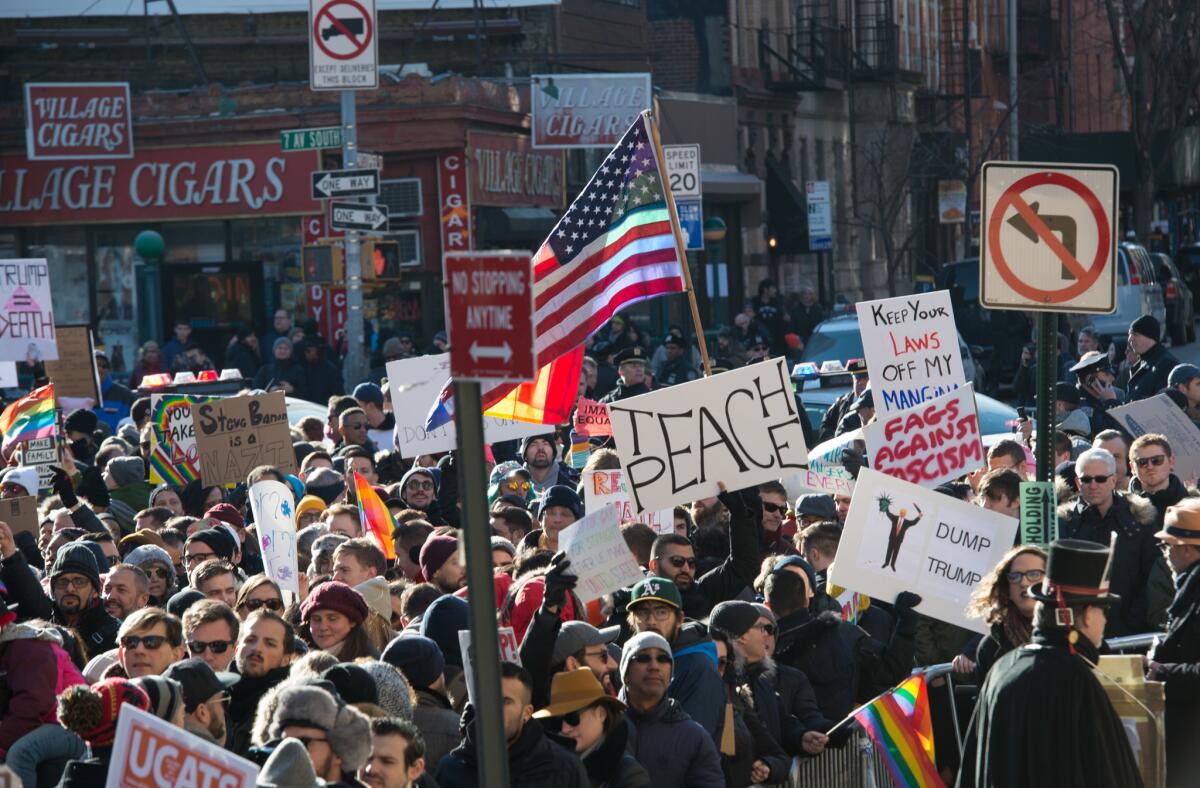
Members and allies of New York’s LGBT community rallied Saturday in front of the historic Stonewall Inn, the site of one of the country’s earliest gay rights protests, to challenge President Trump’s restrictions on immigration and refugees.
In a scene that’s grown increasingly familiar across the country, crowds held up makeshift signs emblazoned with slogans of togetherness and empathy, as well as the trademark rainbow flags that have become a symbol of the LGBT community.
Chants of “Love, not hate, that’s what makes America great” rang out through the narrow streets of Greenwich Village as speakers including activists and lawmakers took their turns at a small lectern addressing the thousand-strong crowd.
“Donald Trump is a liar,” New York state Sen. Tom Duane said, noting that the LGBT community had pledged itself to a new era of honesty. “Most of us were in the closet — that’s the way we used to live. That’s not the way we’re going to live now.”
The protest was spearheaded by New York City Councilman Corey Johnson, who said in a Facebook post that the event would “stand in solidarity with every immigrant, asylum seeker, refugee and every person impacted by Donald Trump’s illegal, immoral, unconstitutional and un-American executive orders.”
New York Mayor Bill de Blasio and Gov. Andrew Cuomo lent their support to the rally along with notable LGBT organizations such as GLAAD, which said in a statement that the rally would “show support for equality and acceptance and resist the presidential administration’s discriminatory actions.”
Many in the LGTB community fear that Trump will seek to use his powers to allow business owners, hospitals and schools to refuse service or employment to LGBT people based on religious beliefs. So far, he has made no such move.
Scenes of welcome at U.S. airports as travelers from previously banned countries arrive

At Boston’s Logan International Airport, crowds gathered at international arrivals area to welcome those from countries that had been restricted under President Trump’s travel ban, suspended by a federal judge a day earlier.
They held signs saying, “Refugees are welcome in the U.S.A.,” “Christians build bridges, not walls,” and, “I am home and so are you.”
“We had more than 40 mostly Iranian nationals land and clear customs today. We’ve had Tunisians and Syrians too, all flying from Germany on Lufthansa,” said Kerry Doyle, an attorney with the American Immigration Lawyers Assn. who was posted at the airport.
Many visa holders had changed their plans and fly to Massachusetts even though it wasn’t their originally intended port of entry because of an earlier Boston federal judge’s temporary order against Trump’s ban that was being applied locally when the national order came down from Seattle.
“It’s a whole different feeling at the airport than last week,” said Doyle.
Abed Ayoub, policy director of the American-Arab Anti-Discrimination Committee, said he had been in touch with lawyers for immigrants headed toward several other U.S. airports.
“We’ve heard a lot of good news for a change. A number of individuals we’re working with have been permitted to board flights to the U.S. They’re nationals from Iran, Libya, Iraq and Sudan flying to Boston, New York and Virginia,” said Ayoub.
Trump, tweeting disbelief at judicial impediment, brings back the ‘ban’
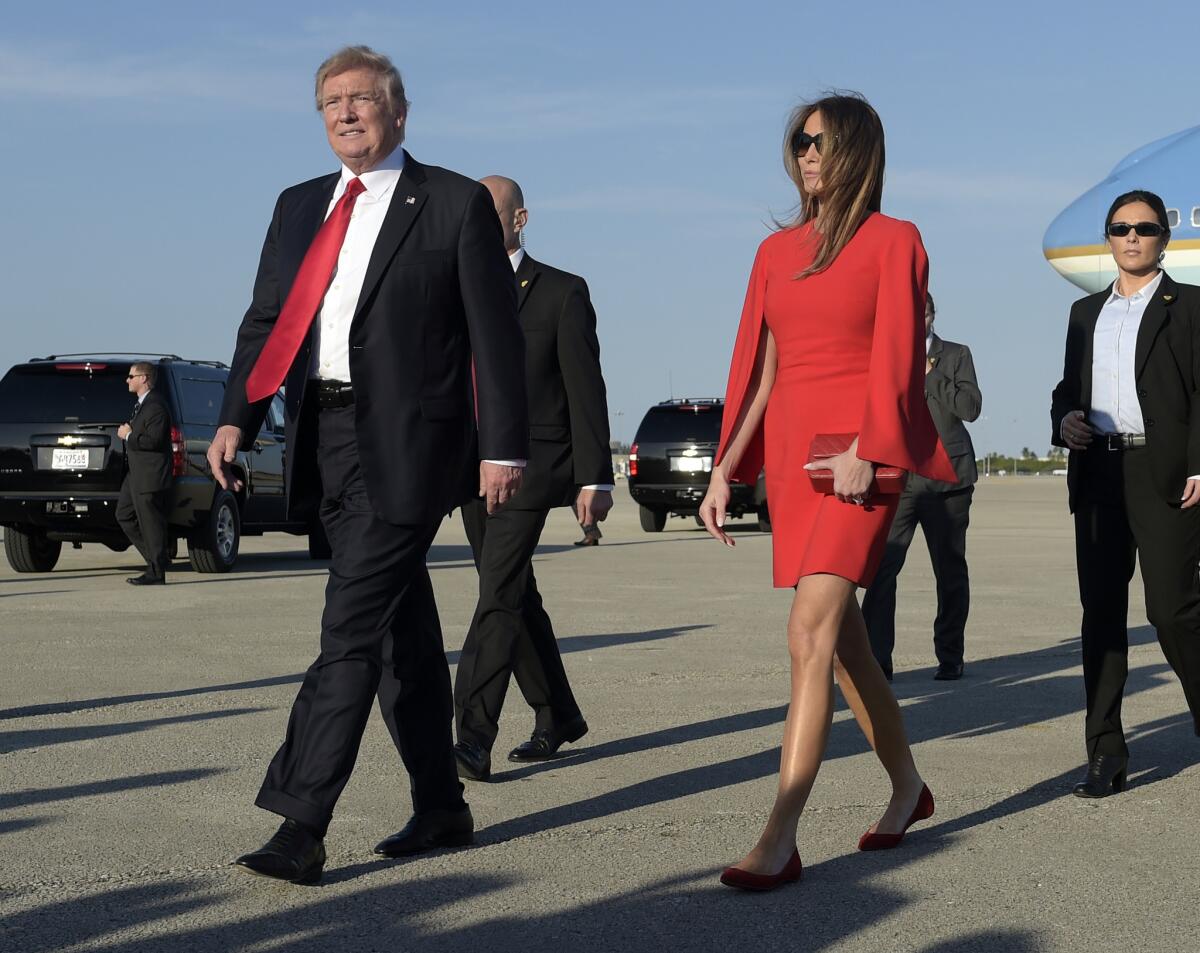
For a time this week, the White House pushed back strenuously on the idea that President Trump’s executive order constituted a “ban” on immigration from seven mostly Muslim nations, despite the president’s own use of the term.
On Saturday, as he reacted again to a judge ordering a halt to the enforcement of the controversial order, the president himself used the term again.
The tweet came after Trump spent more than four hours on the grounds of a golf course he owns near his Mar-a-Lago estate, as he spends the third weekend of his presidency at what his administration is calling the “Winter White House.”
Trump is scheduled to speak by phone with two more world leaders -- Italian Prime Minister Paolo Gentiloni and Ukrainian President Petro Poroshenko.
He and First Lady Melania Trump will later attend a gala fundraiser for the Red Cross. A protest dubbed the March to Mar-a-Lago is planned at the same time, which organizers say could draw at least 2,000 to West Palm Beach.
Rallies at LAX both for and against Trump’s immigration order
Both opponents and supporters of President Trump’s sweeping travel ban on people from seven predominantly Muslim countries are staging separate rallies at Los Angeles International Airport on Saturday, one day after a federal judge temporarily suspended the ban.
Demonstrators began rallying in front of the Tom Bradley International Terminal at 11 a.m.
Department of Homeland Security halts enforcement of controversial travel ban
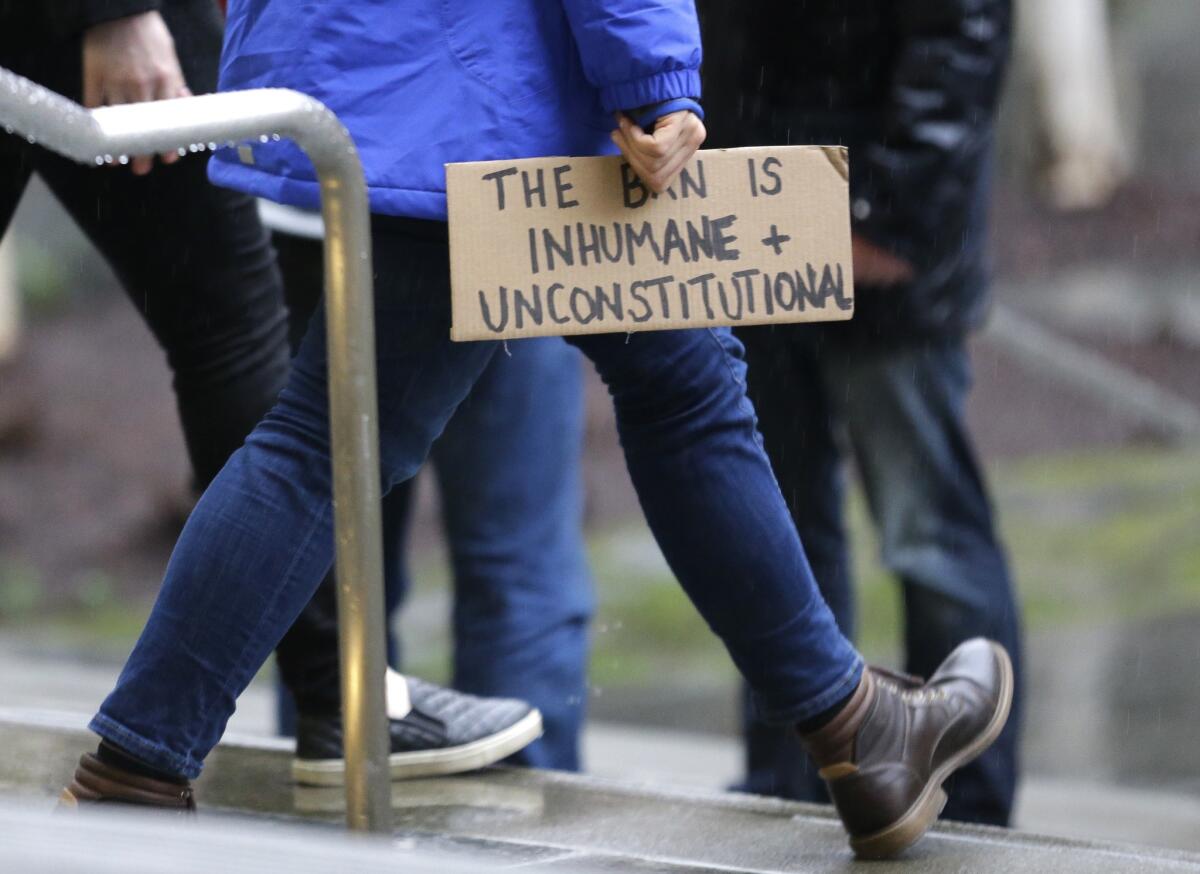
The Department of Homeland Security said Saturday that it had suspended “any and all actions” related to President Trump’s travel ban on immigrants from seven mostly Muslim countries, as well as its temporary halt on refugee resettlements.
The move came after a federal judge in Seattle issued a temporary restraining order against the major parts of Trump’s executive order, effective nationwide, in response to a lawsuit filed by the states of Washington and Minnesota.
“DHS personnel will resume inspection of travelers in accordance with standard policy and procedure,” the department’s statement said.
The State Department, which “provisionally revoked” 60,000 visas since the president signed his executive order on Jan. 27, said Saturday it had started re-accepting those visas from people in the countries affected.
Trump’s White House has said it will ask for an emergency stay of the judge’s order, arguing the president’s actions were lawful.
“The opinion of this so-called judge, which essentially takes law-enforcement away from our country, is ridiculous and will be overturned!” Trump said amid a series of early morning tweets.
Some travelers in countries affected by the suspension -- Syria, Iraq, Libya, Iran, Somalia, Sudan and Yemen -- already were being allowed to board planes headed to the U.S..
White House calls court order against its travel ban “outrageous,” vows court battle
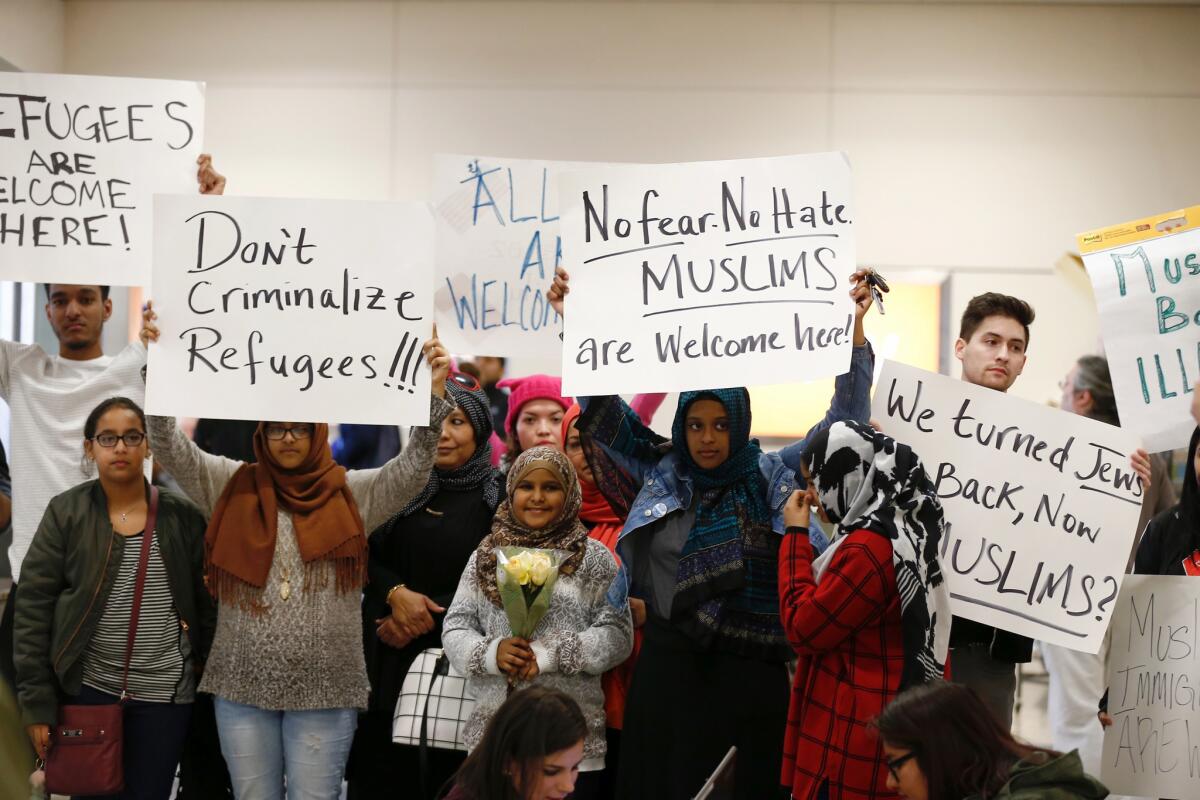
The White House responded sharply Friday night to a Seattle federal judge’s order that temporarily halts enforcement of an executive order suspending immigration from seven predominantly Muslim countries and blocking the entry of any new refugees for at least 120 days.
“At the earliest possible time, the Department of Justice intends to file an emergency stay of this outrageous order and defend the executive order of the president, which we believe is lawful and appropriate,” the White House said in a statement. Later, the word “outrageous” was removed in a revised statement that was sent out.
“The President’s order is intended to protect the homeland and he has the constitutional authority and responsibility to protect the American people,” the statement continued.
“As the law states, ‘Whenever the President finds that the entry of any aliens or of any class of aliens into the United States would be detrimental to the interests of the United States, he may by proclamation, and for such period as he shall deem necessary, suspend the entry of all aliens or any class of aliens as immigrants or non-immigrants, or impose on the entry of aliens any restrictions he may deem to be appropriate,’ ” the statement said.
Lawsuits have argued that the executive order’s focus on countries that are predominantly Muslim and its provision for giving preference to religious minorities could violate the Constitution’s protections against religious discrimination. Civil rights groups have also challenged the president’s targeting of specific nationalities.
Federal judge in Seattle temporarily blocks Trump’s immigration order nationwide
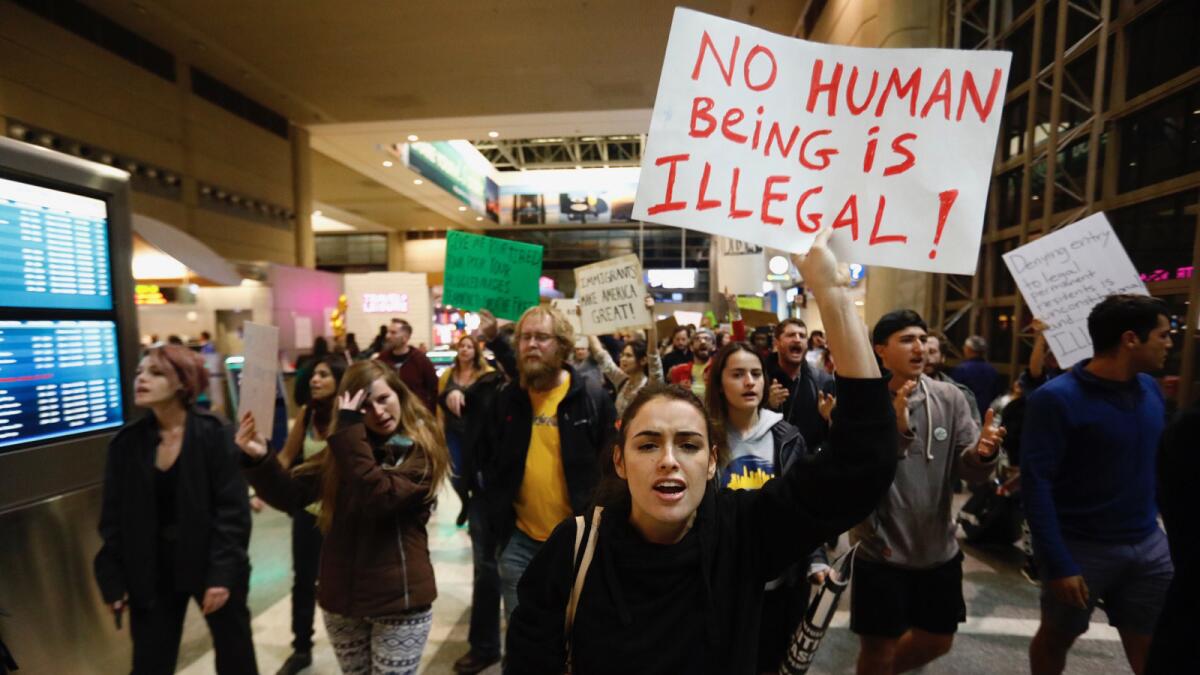
A federal judge in Seattle has temporarily blocked President Trump’s order to halt immigration from seven predominantly Muslim countries.
U.S. District Judge James Robart issued a temporary restraining order against the president’s immigration restrictions on Friday, and signaled that the order applies to cases across the country.
The suit was filed by the state of Washington and joined by Minnesota. The judge in his ruling did not address the state’s claim that the immigration ban is unconstitutional.
The court order said enforcement of the executive order signed by President Trump last week must be suspended until the judge can make a final decision.
The judge declined a request from a Department of Justice attorney to stay the order, but it’s expected that the administration will appeal the decision.
“The Constitution prevailed today,” Washington Attorney General Bob Ferguson said in a statement. “No one is above the law — not even the President.”
“This decision shuts down the executive order immediately, shuts it down. That relief is immediate, happens right now. That’s the bottom line,” he said.
On a scale of A to F, this is how people are grading Trump’s first 100 days in office
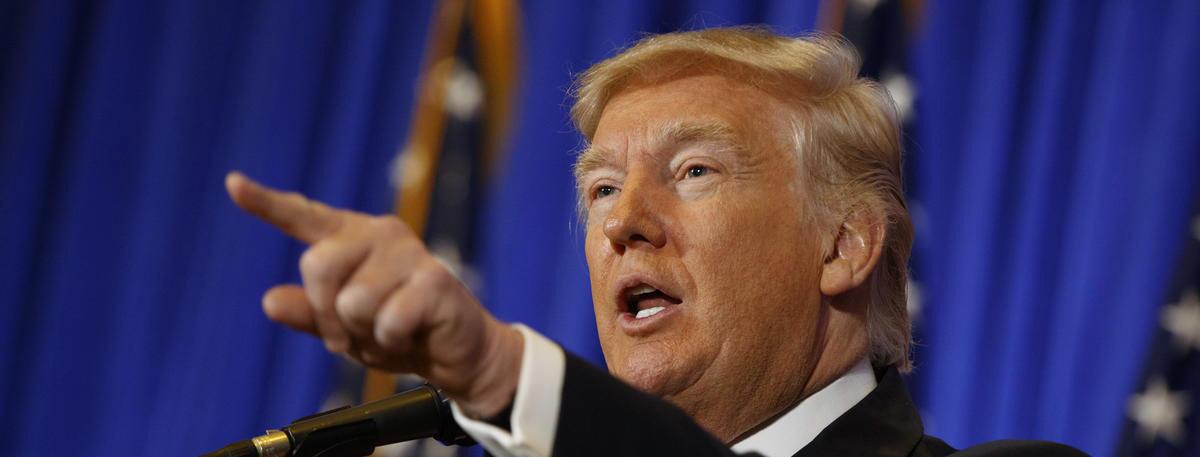
Are you keeping up with President Trump’s first 100 days in office? Week by week, we’re tracking his major moves and asking readers to grade his performance on a scale of A to F. Thousands responded and judged his leadership during week one.
Several of those who gave him an A, said their reasoning was because he stuck to the promises he’d made during his campaign.
“Our country needs to be ran like a business.”
“I didn’t vote for him but, I am glad that we are out of TPP, renegotiating NAFTA which has hurt the Rust Belt, banned lobbying for 5 years.”
“He is doing what he promised. And that is unique in politics.”
Of those that graded him an F, many said they were disappointed in the policies and decisions he’d implemented.
“He fired someone who stood up to him to protect constitution, which was her job.”
“I am truly frightened by the discrimination of the immigrant ban.”
“The country is more divided than when he took office two weeks ago.”
Read what others are saying, and tell us how you think he did during week two of his presidency.
Nearly 60,000 visas revoked since Trump’s immigration order
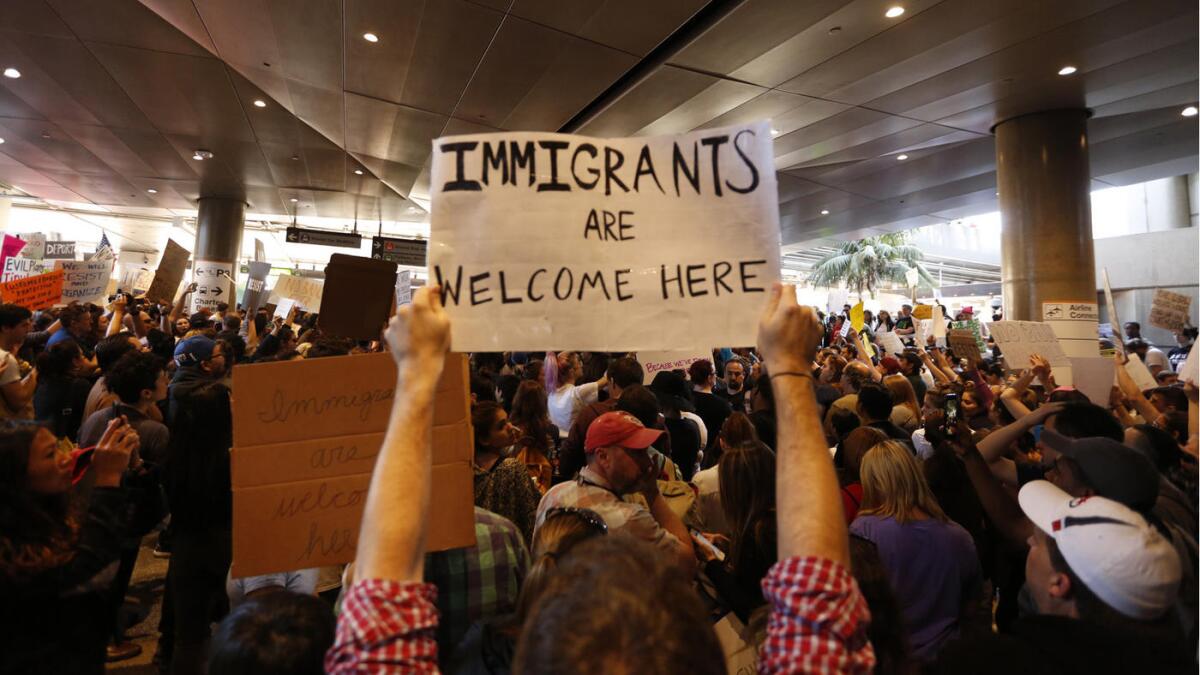
Nearly 60,000 visas were revoked after President Trump’s executive order to suspend refugee resettlements and other admissions from seven predominantly Muslim countries, a government lawyer said in a Virginia federal court Friday.
The revelation came during a hearing on a lawsuit filed against the President’s order last week by visa holders prevented from entering the U.S. The suit includes two Yemeni brothers who said they landed at Dulles International Airport but were forced to give up their visas and were put on a flight to Ethiopia.
At the hearing, a Department of Justice lawyer said 100,000 visas were canceled. Afterward, the State Department said number of revoked visas is less than 60,000. That figure doesn’t count expired visas or diplomatic visas that are exempt from the President’s order. The lower number makes up less than 1 percent of the visas the U.S. issues each year, and the number denied entry into the country since the executive order last week is substantially lower.
“We recognize that those individuals are temporarily inconvenienced while we conduct our review under the executive order. To put that number in context, we issued over 11 million immigrant and non-immigrant visas in fiscal year 2015. As always, national security is our top priority when issuing visas,” said Will Cocks, spokesman for the Bureau of Consular Affairs at the State Department.
The statements Friday were the first time the government has given detailed counts of canceled visas.
When asked about the visas at a Friday press briefing, White House spokesman Sean Spicer said he didn’t “have all the details” and would get back to reporters. A journalist had asked Spicer if the revocations included visas of people already in the U.S. and if the government would “begin finding them and trying to deport them.”
At the court hearing in Alexandria, Va., Judge Leonie M. Brinkema said she would allow the state of Virginia to join the court case. That means the legal proceedings could continue even if the situation with the two brothers named in the case, Tareq and Ammar Aqel Mohammed Aziz, ages 21 and 19, and others similarly impacted by the immigration suspension is resolved.
The judge described the outcome of the president’s immigration order, where even those with visas or green cards were sometimes detained, sent home or not allowed to board flights to the U.S.--while protests raged outside many international U.S. airports--as “chaos.”
She also said it was a “real problem” that people who had been given permission to enter the U.S. were not allowed in.
“This order touched something in the U.S. that I’ve never seen before,” Brinkema said. “People are quite upset.”
The next hearing on the case is scheduled on Feb. 10 at the Federal District Court in Alexandria.
Tracy Wilkinson contributed reporting.
Pentagon releases ‘sensitive’ video - only to discover it was posted online years ago
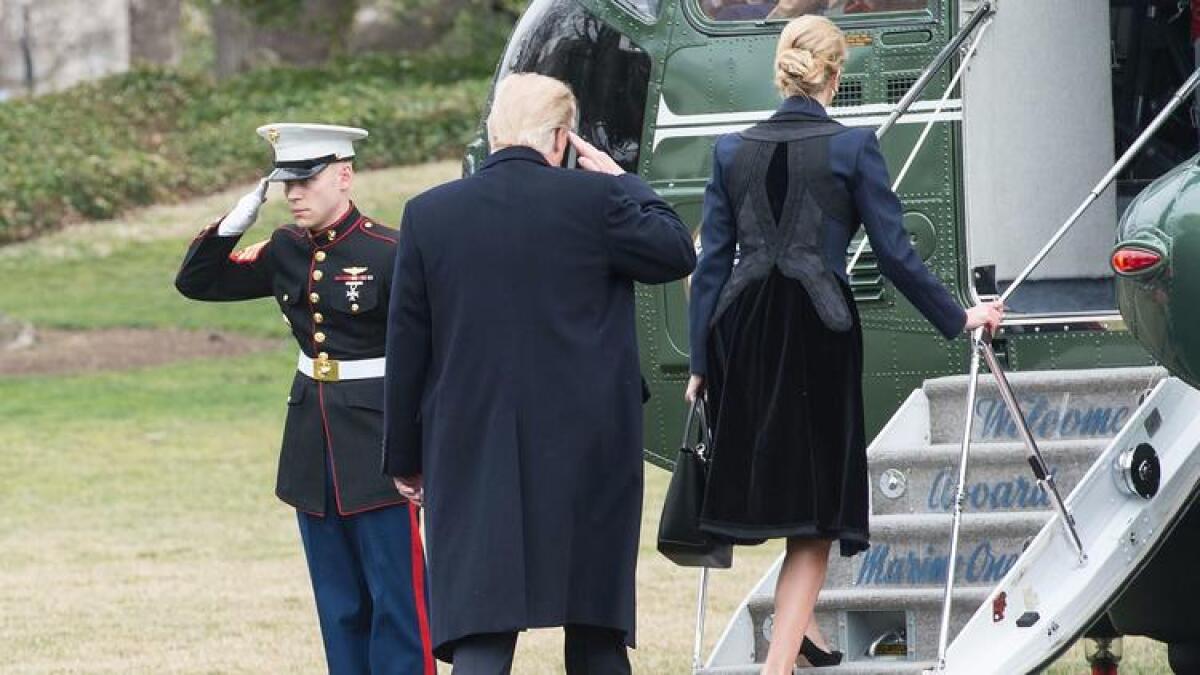
A botched Pentagon raid in central Yemen got worse Friday when the military released what it claimed was sensitive intelligence seized during the assault - only to discover that the video had been posted online in 2007.
The Pentagon released five video clips that showed jihadists building a bomb, a sample of the material the officials said U.S. Navy SEALs had collected last Sunday during a shootout at a compound used by Al Qaeda in the Arabian Peninsula.
An hour after the release, however, the Pentagon pulled the video back after acknowledging it had been posted online a decade ago.
The embarrassing episode compounded growing questions about the assault, which left one American dead and six injured, as well as what the Pentagon has said were likely civilian casualties, including numerous women and children.
The raid brought about the first confirmed American death in combat under President Trump.
The White House argued this week that the raid was a success because the U.S. recovered valuable intelligence about terrorist operations. The Pentagon release Friday apparently was intended to bolster that claim.
U.S. Central Command, which is responsible for U.S. military operations in the Middle East, issued the five clips in a single video that lasted less than two minutes. Officials said the five videos were recovered from computers seized during the raid.
The footage depicted a figure, wearing a white lab coat and a black ski mask, pouring material into a glass beaker. Speaking in Arabic, he instructed viewers to build a bomb and attack the West.
“The videos are one example of the volumes of sensitive Al Qaeda terror-planning information recovered during the operation,” Col. John J. Thomas, the Central Command spokesman, said in a statement.
“What was captured from the site has already afforded insights into Al Qaeda leadership, AQAP methods of exporting terror, and how they communicate,” he added.
But the videos, entitled “Courses for Destroying the Cross,” had been available online since 2007, according to the SITE Intelligence Group, an independent group that researches and archives communications by terrorist groups.
Capt. Jeff Davis, a Pentagon spokesman, later acknowledged that the video had been online, but he said it was only part of the material recovered from laptops, cellphones and other devices taken from the compound.
Chief Warfare Operator William “Ryan” Owens, 36, was killed and six other service members were wounded during the pre-dawn attack in central Bayda province.
Earlier this week, the military admitted that Yemeni civilians were likely killed when helicopter gunships were called in to support U,S. forces who were locked in battle with the militants.
Among those reported killed was the 8-year-old daughter of Anwar Awlaki, the American-born Al Qaeda leader who was killed in a 2011 drone strike in Yemen. Awlaki’s teenage son was subsequently killed in a separate U.S. drone strike that was targeting another Al Qaeda figure.
The Pentagon has mostly relied on drone strikes against Al Qaeda targets in Yemen, especially after the country fell into civil war two years ago.
In this case, U.S. commanders suspected they had found an AQAP headquarters. The raid aimed to collect material that could help identify operatives and provide intelligence about planning of terrorist attacks.
Congress kills rule that forces companies to disclose payments to foreign governments
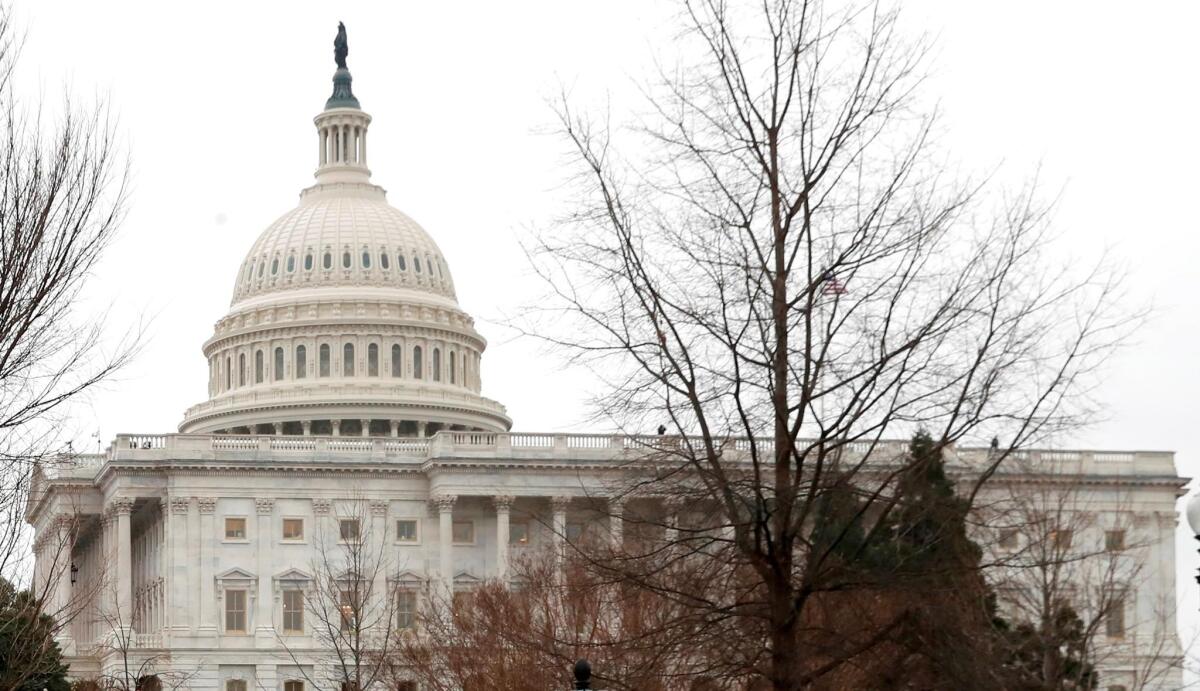
Congress has passed legislation ending an Obama-era regulation that has required oil and gas companies to disclose payments to the U.S. or foreign governments for commercial development.
The Senate gave final congressional approval to the measure Friday, 52-47, in an unusual vote that began before dawn.
President Trump is expected to sign the bill. It represents an initial Republican swipe at the 2010 Dodd-Frank law curbing Wall Street that President Obama and Democrats enacted after the 2008 financial crisis.
Republicans say the regulation gives foreign competitors valuable information about U.S. firms and would hurt the economy.
Democrats tied the move to Exxon Mobil, headed until recently by Rex Tillerson, Trump’s secretary of State. They said killing the regulation would let big firms hide questionable dealings with foreign governments such as Russia.
Kellyanne Conway concedes error: ‘Honest mistakes abound’
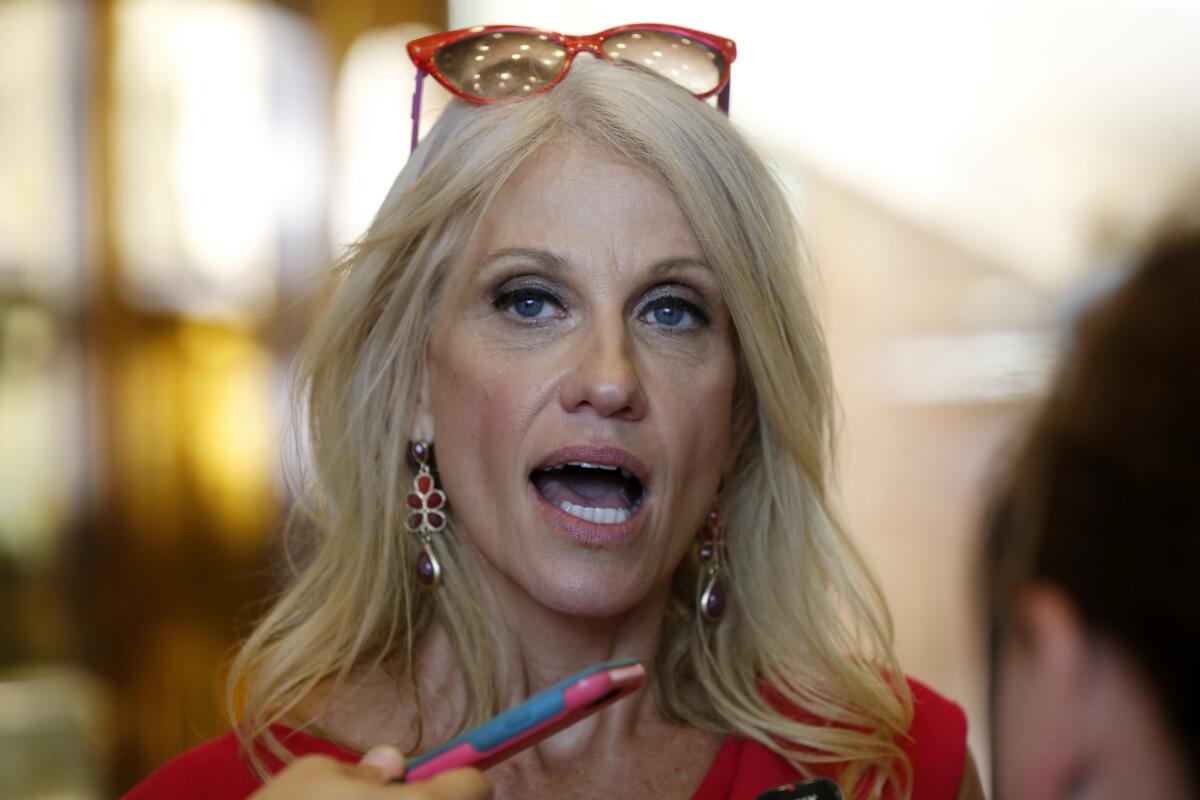
Kellyanne Conway, a top advisor to Donald Trump, admitted Friday that she mistakenly cited a nonexistent “massacre” while defending the president’s order suspending entry to refugees and travelers from seven majority-Muslim nations.
Conway’s backtrack came on Twitter, hours after she received widespread criticism for an MSNBC interview in which she cited “the masterminds behind the Bowling Green massacre.”
Her mea culpa included criticisms of the media, a favorite White House target, which she accused of not owning up to unrelated mistakes.
There is one Bowling Green in Ohio and another in Kentucky. Neither has suffered a terrorist attack.
Conway said in another tweet that she meant to say the “Bowling Green terrorists,” citing the 2011 arrests of two Iraqis in Bowling Green, Ky.
They were convicted of trying to send money and weapons to Al Qaeda in Iraq for the purpose of killing U.S. soldiers there. according to a statement from the Justice Department.
Here’s the full story on the 2011 arrests.
Trump imposes sanctions on people and companies in Iran
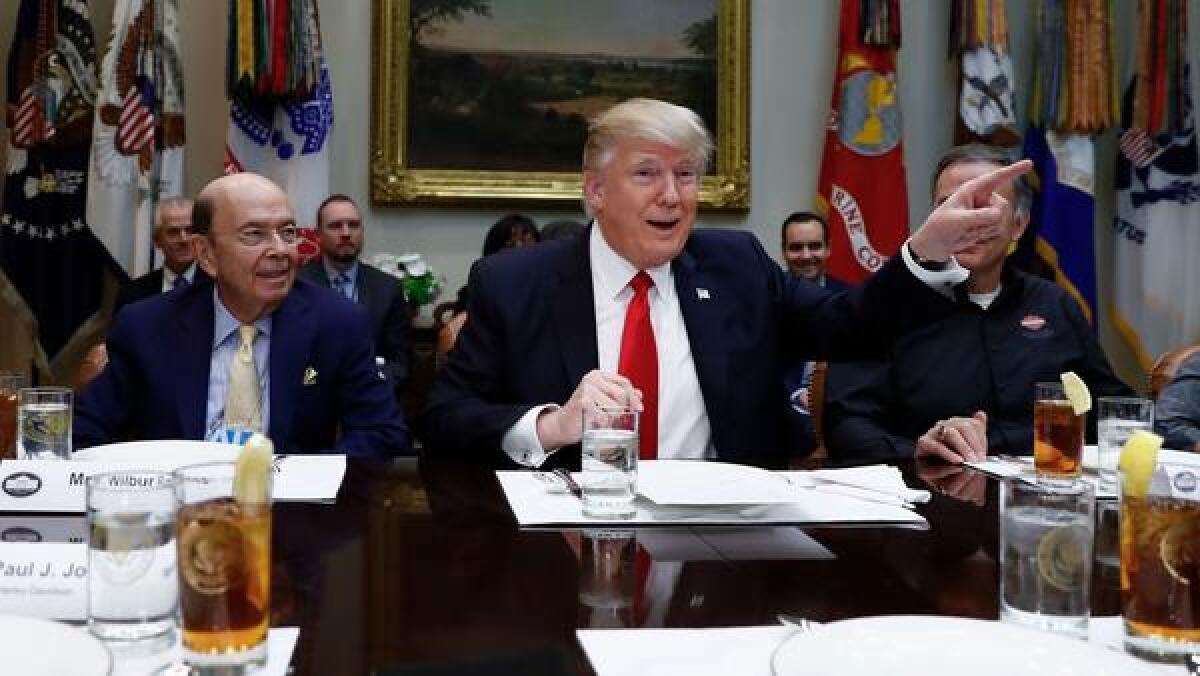
President Trump imposed sanctions on Iran on Friday, delivering on his promise to take a harder line with the volatile U.S. foe.
The sanctions, on 13 people and 12 companies, came a day after he put Iran “on notice” for testing a medium-range ballistic missile and for attacks by Iran-funded Houthi militants on a Saudi frigate. The early test from Iran has put pressure on Trump, following a campaign spent denouncing the nuclear deal between Iran and six world powers negotiated by the Obama administration.
“Iran’s continued support for terrorism and development of its ballistic missile program poses a threat to the region, to our partners worldwide, and to the United States. Today’s action is part of Treasury’s ongoing efforts to counter Iranian malign activity abroad ...,” said John E. Smith, acting director of the Treasury Department’s Office of Foreign Assets Control. “We will continue to actively apply all available tools, including financial sanctions, to address this behavior.”
Trump tweeted Friday morning that Iran is “playing with fire.”
“They don’t appreciate how ‘kind’ President Obama was to them. Not me!” Trump continued.
That followed angry words from Iran, which has been incensed over Trump’s temporary ban on travel from the country, along with six other majority Muslim nations.
Ali Akbar Velayati, senior advisor to supreme leader Ayatollah Ali Khamenei and a former foreign minister, was quoted by the Tasnim news agency Thursday calling Trump a “puppet,” a “novice” and an extremist.
“This is not the first time when an inexperienced man is threatening Iran,” he said. “The new administration of America will realize that threatening Iran will not work, and empty and baseless ranting should be stopped.”
Trump has spent weeks before and after taking office stirring other countries with his fiery rhetoric in tweets, speeches and phone calls. Some of his domestic actions — halting all refugees as well as foreign visitors from seven countries and taking the first steps toward a border wall — also have sent a strong message to friends and foes around the world.
But Friday’s action marks the most direct step aimed at penalizing another nation, underscoring the aggressive foreign policy approach Trump has promised to take.
The move marks a period of renewed tension after the 2015 deal to prevent the state from building a nuclear program. Trump campaigned on tearing up the deal, which he called terrible. Israel opposed the deal, as did many conservatives in the U.S.
But if Trump attempts to unravel it alone, analysts say he would have a hard time getting cooperation to reimpose international sanctions from allies who backed the deal. The sanctions were crucial to getting Iran to negotiate the nuclear deal.
The Trump administration said the launch of a missile Sunday from a site 130 miles east of Tehran — which exploded 650 miles away — violated United Nations resolution 2231, forbidding “any activity related to ballistic missiles designed to be capable of delivering nuclear weapons” by Iran.
Iran denied it violated the resolution. The U.N. has yet to weigh in.
Trump’s national security advisor, Michael Flynn, announced the administration’s objections Wednesday. Trump followed that up Thursday with a series of tweets.
“Iran has been formally PUT ON NOTICE for firing a ballistic missile. Should have been thankful for the terrible deal the U.S. made with them!” Trump wrote.
7:38 a.m.: This story was updated with comment from the Treasury Department.
U.S. economy creates robust 227,000 jobs in January; unemployment rate remains low at 4.8%
The labor market started the year strong, adding a robust 227,000 net new jobs last month while more people began looking for work, the Labor Department said Friday.
Although the January job growth figure exceeded expectations — and was the best since September — that was somewhat offset by a downward revision of job growth the previous two months by 39,000.
Kellyanne Conway cites ‘massacre’ that didn’t happen to defend Trump’s immigration ban
A top aide to President Trump has cited a 2011 “massacre” in Kentucky that never happened as a reason why the administration’s temporary ban on immigration from seven Muslim-majority nations is necessary.
During an interview with MSNBC’s Chris Matthews that aired Thursday, Kellyanne Conway defended Trump’s executive order on immigration last week by saying that former President Obama instituted a similar policy for Iraqi refugees in 2011.
“President Obama had a six-month ban on the Iraqi refugee program after two Iraqis came here to this country, were radicalized, and they were the masterminds behind the Bowling Green massacre. Most people don’t know that because it didn’t get covered,” Conway said.
Conway is referring to a tightening of security checks for entry into the U.S. after the May 2011 arrest of two men on charges of plotting to send weapons and money to Al Qaeda operatives waging an insurgency in their native Iraq. Waad Ramadan Alwan and Mohanad Shareef Hammadi were mistakenly admitted to the U.S. as Iraqi refugees in 2009 and resettled in Bowling Green, Ky.
European Union leaders at Malta summit bristle at Trump remarks
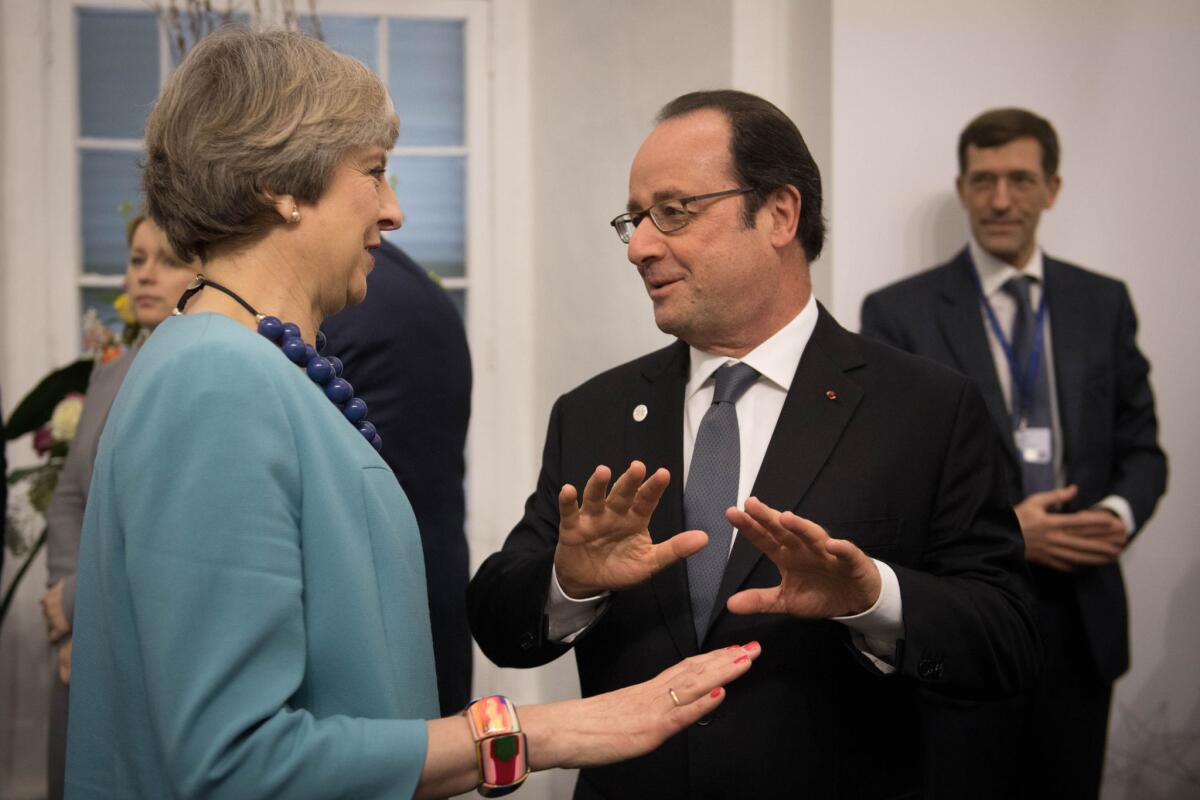
The European Union has been weathering plenty of disunity in recent months. But on Friday, the bloc’s leaders seemed united in concerns over President Trump.
In the Mediterranean island nation of Malta, leaders arriving for the EU’s first gathering since Trump’s inauguration had some sharp words for the 2-week-old U.S. administration.
Both before and after taking office, Trump has been vocal in his support of Britain’s vote last June to exit the European Union, and has made repeated if casual references to the likelihood of the bloc breaking up. He has also called NATO “obsolete,” but in recent days has signaled support for the transatlantic alliance.
Those remarks, though, clearly rankled. French President Francois Hollande, who spoke with Trump last weekend, was perhaps the most openly combative in his view of the U.S. leader.
“It is unacceptable that there should be -- through a certain number of statements by the president of the United States -- pressure on what Europe should or should not be,” the French news agency AFP quoted Hollande as saying as he arrived at the informal summit.
German Chancellor Angela Merkel took a cooler and more pragmatic tone, telling reporters as she arrived: “I have already said that Europe has its destiny in its own hands.”
She said that as far as she was concerned, “talks about Europe are here in the foreground and not to deal with other parts of the world.”
Germany has been unhappy, however, with Trump’s talk of the European common currency, the euro, being artificially undervalued, and his suggestions that Merkel’s government was to blame.
Heading into the meeting, EU President Donald Tusk had taken the unprecedented step of warning in a letter to European leaders that Trump posed a “threat” to the bloc, listing that alongside other menaces including Russian aggression, jihadist attacks and a wave of populism.
The gathering was a potentially awkward one for British Prime Minister Theresa May as she moves to implement so-called “Brexit.” May met with Trump last week and pressed European concerns about the degree of American support for NATO.
But May’s offer to serve as a “bridge” between Trump and the EU drew a tart response from the president of Lithuania, Dalia Grybauskaite – who also took a swipe at the U.S. president.
“I don’t think there is a necessity for a ‘bridge,’” she told the BBC. “We communicate with the Americans on Twitter.”
The main goal of the Malta gathering is to take steps to forge a common policy on immigration – another point of contention between Trump and the EU. Many of the European leaders have been highly critical of Trump’s suspension of the U.S. refugee program and his temporary ban on travel from seven Muslim-majority countries.
Trump: Schwarzenegger was bad as California governor and on TV, ‘but at least he tried hard’
President Trump said Friday that Arnold Schwarzenegger “tried hard” to make “Celebrity Apprentice” a success, but has failed.
The president kept alive a theme he brought up a day earlier during his first appearance at the National Prayer Breakfast.
Trump, who once hosted the NBC reality TV show, took a pot shot there at Schwarzenegger, the current host and former California governor, over a ratings nosedive for the show.
Schwarzenegger responded quickly to Thursday’s remarks in a video on his verified Twitter account, suggesting that he and Trump switch jobs.
Trump to order review of Dodd-Frank financial regulations, suspend retirement advisor rule
President Trump will take aim at financial regulations on Friday, ordering a review of the Dodd-Frank Wall Street reform law that could lead to major changes and suspending a conflict-of-interest rule for retirement advisors before it goes into effect this spring, according to a senior administration official.
Trump will be targeting major initiatives of the Obama administration that Republicans have strongly opposed.
In meetings with business leaders since taking office, Trump has heard consistent complaints about federal regulations, said the official, who spoke to reporters on the condition of anonymity to preview the president’s announcement.
At 9 a.m. PST, Trump will sign an executive order directing the Treasury secretary to consult with regulators about what needs to be done to fix the Dodd-Frank Wall Street Reform and Consumer Protection Act and report back within “a relatively short period of time,” the official said.
Trump’s nominee for Treasury secretary, Steve Mnuchin, has not yet been confirmed by the Senate. He could get a full Senate vote next week.
Trump is also expected to issue a memo to the Labor Department to cease implementation of the retirement advisors rule and undertake a complete review of it.
U.N. Ambassador Nikki Haley blames Russia for new fighting in Ukraine
The new U.S. ambassador to the United Nations, Nikki Haley, on Thursday blamed Russia for renewed, deadly fighting in Ukraine and said U.S. sanctions against Moscow would remain in place.
Haley’s comments at her first formal appearance at the U.N. Security Council were striking because, as a candidate, President Trump had suggested he would be willing to ease sanctions on Russia.
During the campaign, Trump did not criticize President Vladimir Putin for Russia’s annexation of Crimea in 2014 or its support for armed insurgents in eastern Ukraine.
Trump suggested at one point he might be willing to recognize Crimea as part of Russia and hinted he would consider lifting sanctions that Washington and its European allies had imposed on Moscow in response.
Trump’s position on Ukraine has alarmed Europe, which fears an increasingly aggressive Russia, and was disputed by some of his Cabinet picks during their Senate confirmation hearings.
Among them was Haley, a former governor of South Carolina who is considered a rising star in the GOP.
“We do want to better our relations with Russia,” Haley said Thursday at the U.N. “However, the dire situation in eastern Ukraine is one that demands clear and strong condemnation of Russian actions.”
She cited suffering by the people of Ukraine after “nearly three years of Russian occupation and intervention.”
Sanctions will remain in place “until Russia and the separatists it supports respect Ukraine’s sovereignty and territorial integrity,” she added.
Renewed fighting in eastern Ukraine has killed dozens of people, including civilians, and spawned a humanitarian crisis as electricity, water and food have become scarce in some areas in the dead of winter.
The White House has not commented on the fighting in Ukraine.
A State Department statement earlier this week condemned a “dramatic” surge in violence in eastern Ukraine, citing violations of a cease-fire with heavy artillery. But it did not mention Russia.
Trump’s Justice Department may crack down on thriving pot industry, but is it too big to jail?

Marijuana mogul Seibo Shen is accustomed to fighting — but it is usually on the jujitsu mat, where the undefeated 40-year-old prefers to engage completely baked.
“You know that movie ‘Drunken Master’?” he said, nodding to the cult film about a martial arts master whose secret weapon is inebriation. “It’s like that. I like to consume so much before a competition that they are literally walking me onto the mat.”
Shen, founder of a thriving start-up that hawks luxury vaporizers at $450 a pop, might want to stock up for an impending match that could prove epic. His opponent? President Trump’s Justice Department.
Shen is among the swiftly growing ranks of marijuana entrepreneurs who could be headed for a showdown with the federal government.
The election of Donald Trump has shocked the marijuana industry into a state of high alert at a time it had planned to be gliding into unbridled growth. Trump’s nominee for attorney general, Alabama Sen. Jeff Sessions, is a longtime field lieutenant in the war on drugs with unabashed hostility toward pot. It was only 10 months ago that Sessions was scolding from the dais of a Senate hearing room that the drug is dangerous, not funny and that “good people don’t smoke marijuana.”
Now he is poised to set the direction on national drug enforcement policy at the same time that eight states, including California, have legalized recreational use of the drug. Some 60 million Americans are living in states where voters have opted to allow any adult to be able to purchase marijuana.
Business leaders like Shen are betting the rapid maturity of the cannabis industry has made it too big to jail.
Homeland Security watchdog to investigate rollout of Trump’s travel ban
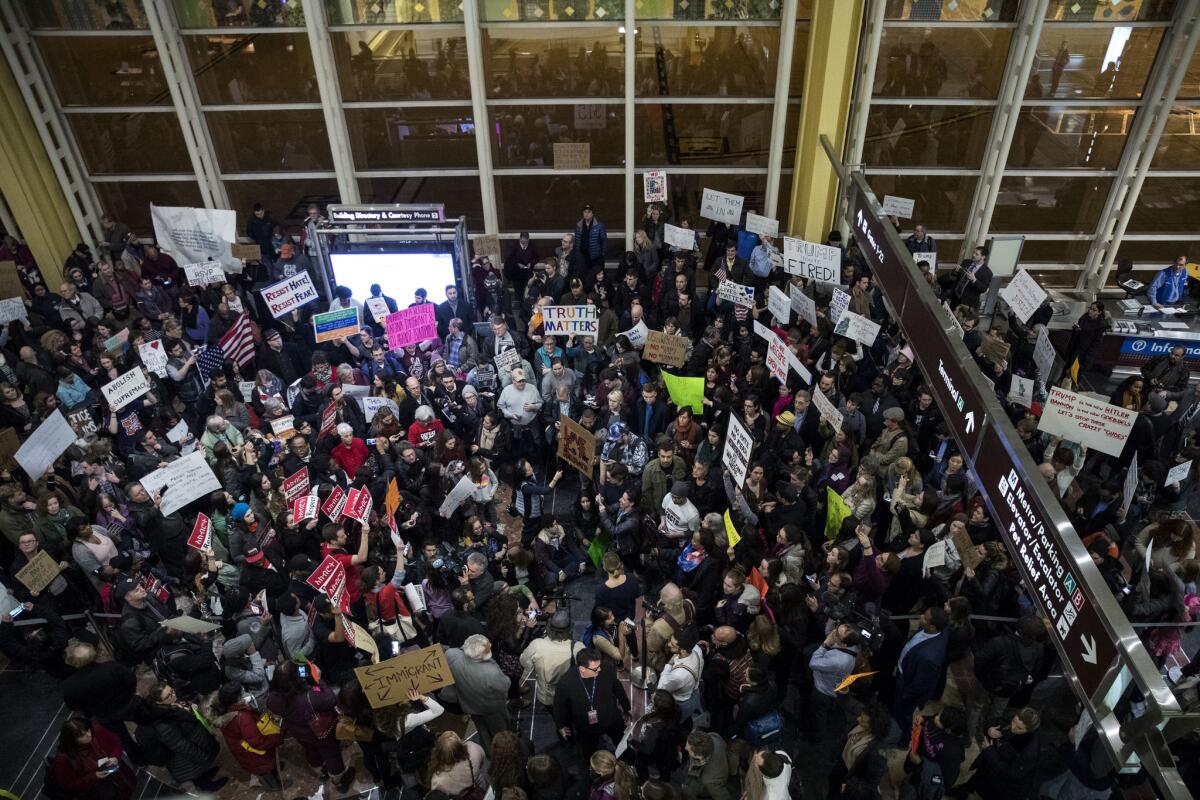
The Department of Homeland Security’s internal watchdog has begun investigating last week’s controversial rollout of President Trump’s refugee and immigration restrictions.
The investigation came in response to letters from Democratic lawmakers and hotline complaints, according to the inspector general’s office.
In a news release late Wednesday, the office said it will look into the order and how the department adhered to court orders as well as allegations of misconduct.
Trump’s travel and refugee ban, rolled out as soon as he signed the order Friday, sparked chaos and protests at the nation’s airports over the weekend as border agents detained hundreds of people. The order temporarily halted all refugees and barred entry into the U.S. for people from seven majority-Muslim countries: Iraq, Syria, Iran, Libya, Somalia, Sudan and Yemen.
Democrats and civil liberties groups have decried the order as unfairly targeting Muslims, and security experts said it could do more harm than good by stoking anti-American sentiment overseas without reducing the danger of terrorism at home.
Two Democratic senators from Illinois, Dick Durbin and Tammy Duckworth, requested the investigation.
Many Republicans, including House Speaker Paul Ryan, have defended the measure as providing a necessary pause to “make sure that the vetting standards are up to snuff so we can guarantee the safety and security of our country.”
Trump’s EPA pick poised to survive Senate fight, but his brewing battle with California will be harder to win
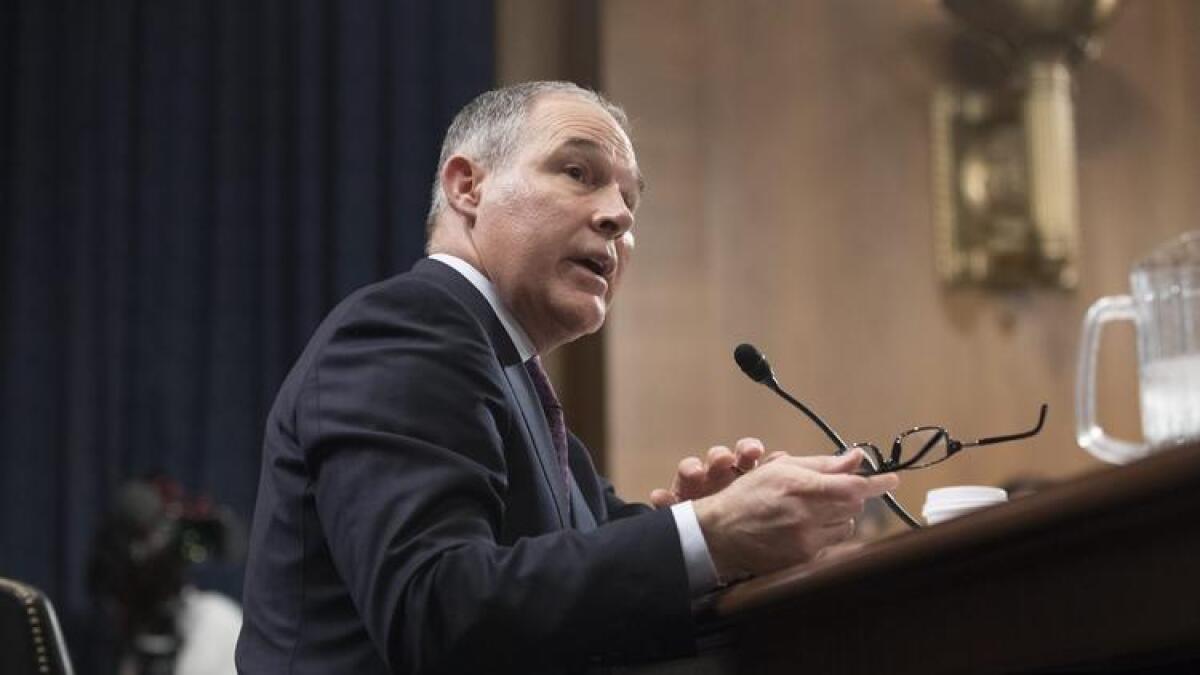
President Trump’s nominee to run the Environmental Protection Agency survived a rancorous committee vote Thursday, putting him on the path to full Senate confirmation and a confrontation with California.
Scott Pruitt, who oil and gas companies are betting will help them reassert dominance over the energy economy, has cast doubt on California’s power to force automakers to build more efficient, cleaner-burning cars.
But he soon may learn that battles like the one he appears poised to launch can be full of unpleasant surprises.
The landmark environmental policy that the EPA nominee called into question — giving California unique authority to set tough rules for car and truck emissions — has proved resilient. So has California.
Many such provocations by past administrations eager to flex their executive muscle have gone sideways. They have bogged previous White Houses down in years-long, politically bruising regulatory and legal disputes, during which the president who set out to teach an early lesson to assertive states ends up getting schooled by them.
“Announcing that you are going to give your supporters what they want by picking off a few high-profile policies and rescinding them is really easy,” said Jody Freeman, a professor at Harvard Law who served as White House counselor for energy and climate change under the previous administration. “Doing it is much harder.”
Secretary of State Rex Tillerson tries to calm concerns on his first day in office
Secretary of State Rex Tillerson marked his first day of work Thursday by acknowledging turmoil in the department he will lead and urging anxious employees “not to let personal convictions overwhelm our work on one team.”
He stepped into the grand lobby at the State Department, flanked by dozens of national flags and hundreds of employees, and invoked a folksy humor and calm manner, even though his message was firm.
“Hi. I’m the new guy,” he told the crowd in a Texas drawl.
He chose not to dwell on policy, except to say that American security abroad was a “core value.”
He said he wanted to focus on the men and women who now work for him, calling them the world’s finest public servants and the “brick and mortar” of U.S. diplomacy.
He sought to reassure them that he values their service and their opinions, even when they diverge from administration policy.
But, he said, it was time to put differences aside and get to work.
“We must all remain focused on the mission at hand before us,” Tillerson said. “I remind you our undertakings are larger than ourselves or our personal careers.”
Acknowledging widespread disappointment over the outcome of the presidential election, he urged the crowd “not to let personal convictions overwhelm our work on one team.”
The State Department has been in an uproar in recent days over some of President Trump’s early actions overseas.
More than 800 diplomats and Foreign Service employees signed a letter of dissent to register their concern after Trump ordered a suspension of most travel and immigration from seven mostly-Muslim nations.
Tillerson received sustained, polite applause from the crowd, some of whom had waited more than an hour while he attended the national prayer breakfast with Trump.
The only cheers came when Tillerson thanked veteran diplomat Thomas Shannon, the undersecretary for political affairs who has been acting secretary of State since John F. Kerry departed on Jan. 20.
Tillerson concluded his comments by noting the list of names inscribed on the lobby wall of U.S. diplomats who were killed in the line of duty. He said he will ensure the list is up to date and will pay homage to them.
That gesture stood in contrast to Trump’s visit to the Central Intelligence Agency a day after his inauguration, when he did not mention gold stars engraved in the lobby wall to honor slain CIA officers and analysts.
Aaron David Miller, who served as a Middle East envoy for Democratic and Republican administrations, praised Tillerson’s opening day comments.
“He speaks to State employees as if he’s going to be State’s man at [the White House] not [the White House] man at State,” he said.
During his Senate confirmation hearing, Tillerson came under fire from Democrats for his international business deals as chief executive of ExxonMobil, the global oil giant, and his personal friendship with Russian President Vladimir Putin.
But at the prayer breakfast on Thursday, Trump said Tillerson’s business ties to leaders around the globe were “a good thing.”
“I think he’s going to go down as one of the great, great secretaries,” Trump said.
GOP senators bypass Democrats to move Trump EPA pick ahead
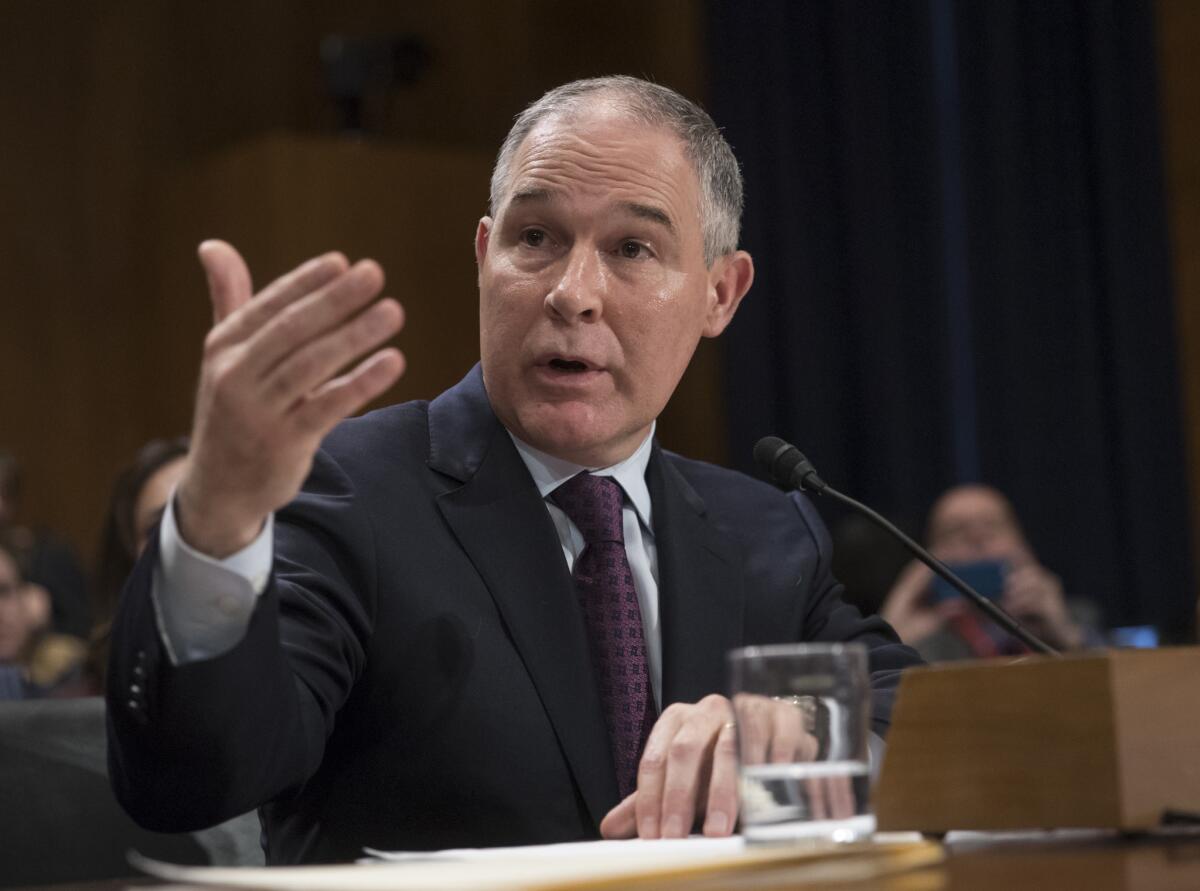
Republicans voted to send to the full Senate the nomination of President Donald Trump’s pick to lead the Environmental Protection Agency on Thursday.
The vote came after Republican suspended committee rules to muscle through the vote, because Democrats boycotted the meeting.
Seats reserved for the 10 Democrats on the Senate Environment and Public Works Committee were empty Thursday as the meeting to advance the nomination of Scott Pruitt was gaveled to order. Accusing the absent Democrats of obstruction, the remaining 11 Republicans voted unanimously to suspend rules requiring at least two members of the minority party to be present for a vote to be held.
In 2013, GOP members of the same committee boycotted a similar committee meeting on Gina McCarthy, President Obama’s then-nominee for EPA administrator. McCarthy was eventually approved by the Senate, serving in the post until Trump’s inauguration.
Trump on ‘tough’ phone calls to foreign allies: ‘Don’t worry about it’
President Trump seemed to acknowledge a recent string of “tough” phone calls to foreign allies, saying at the National Prayer Breakfast on Thursday that they were part of what he characterized as an effort to straighten out a troubled world.
“Believe me when you hear about the tough phone calls I’m having, don’t worry about it,” Trump said.
The comments came after the White House and the Mexican government denied reports by the Associated Press and Mexican media that he threatened to send U.S. troops to Mexico to fight “bad hombres” during a call with President Enrique Peña Nieto.
A separate report in the Washington Post described a testy call with Australian Prime Minister Malcolm Turnbull in which he angrily denounced a refugee agreement with the government and ended the scheduled hourlong call less than halfway through.
The calls have caused alarm, given the importance and history of America’s strategic alliances.
Trump cast the calls as part of a hard-charging approach that he argues is necessary. “The world is in trouble but we’re going to straighten it out,” he said. “That’s what I do.”
Trump also performed another presidential first on Thursday: boasting about his television ratings on “The Apprentice” during the Prayer Breakfast while mocking former Gov. Arnold Schwarzenegger. Presidents have attended the annual breakfast since the Eisenhower administration, usually using it to express humility. Trump was introduced by Mark Burnett, the show’s producer, who also produced a miniseries series, “The Bible.”
“They hired a big big movie star,” Trump said of Schwarzenegger, who replaced him on the show. “We know how that turned out. The ratings went down the tubes. It’s been a total disaster.
“I want to just pray for Arnold, if we can, for those ratings,” he added.
But there were also serious moments, in which Trump promised to fight for religious liberty proposals sought by Christian conservatives, spoke about the sacrifice made by the military and of the emptiness of material wealth in comparison to spiritual richness. He said many of his wealthiest friends are “very miserable, unhappy people.”
“The quality of our lives is not defined by our material success but by our spiritual success,” he said. “I tell you that as somebody who has had tremendous material success.”
Trump dials up Iran rhetoric in early morning tweets
Iran was on the verge of collapse until the U.S. gave it a “lifeline” in the form of the nuclear deal between Iran and six world powers, President Trump said Thursday.
“Iran has been formally PUT ON NOTICE for firing a ballistic missile,” Trump tweeted. “Should have been thankful for the terrible deal the U.S. made with them!”
Trump was repeating comments made a day earlier by national security advisor Michael Flynn,
Trump also tweeted, “Iran was on its last legs and ready to collapse until the U.S. came along and gave it a life-line in the form of the Iran Deal: $150 billion.”
Flynn said Wednesday that the “Obama administration failed to respond adequately to Tehran’s malign actions” and put Iran “on notice,” without elaborating on what actions may be taken.
Trump asks: ‘No federal funds?’ for UC Berkeley after protests halt Milo Yiannopoulos speech
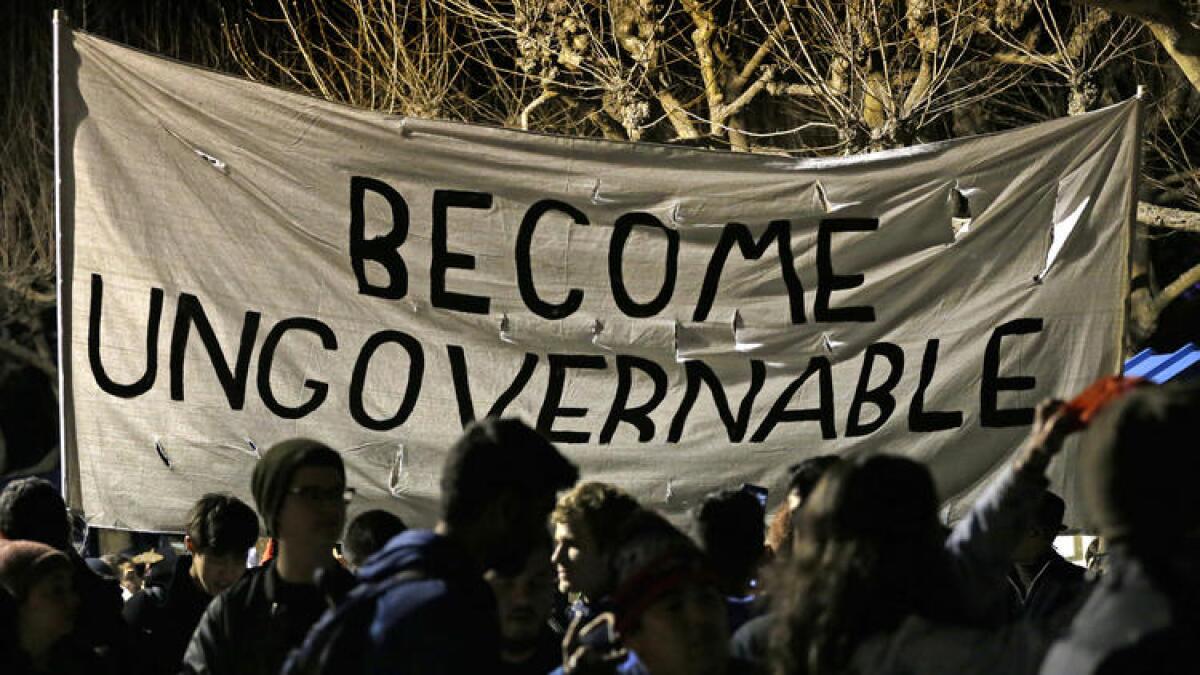
President Trump suggested in an early morning tweet that that federal funds could be taken from UC Berkeley after violent protests caused school officials to halt a planned speech by conservative firebrand Milo Yiannopoulos.
University officials called off the event about two hours before Yiannopoulos was to speak at the student union, where more than 1,500 people had gathered outside. Some hurled metal barricades and others smashed windows.
“This is not a proud night for this campus, the home of the free-speech movement,” said Dan Mogulof, a Berkeley spokesman.
It’s unclear whether Trump was actually threatening to cut funding or making some kind of rhetorical point. The larger UC system, for which Berkeley is the flagship campus, receives billions of dollars from the federal government to fund a variety of programs, notably research, student aid and healthcare programs.
Update
8:25 a.m.: This post was updated with information about the university’s federal funding. It also clarifies that Trump’s intent was not immediately clear.
Did Trump threaten to send troops to Mexico to help fight ‘bad hombres?’ Mexico says no

The Mexican government on Wednesday vehemently denied reports that President Trump threatened to send American soldiers into Mexico during a phone call with Mexican President Enrique Peña Nieto.
Such a threat “did not happen during that call,” said a government statement released on Twitter on Wednesday night.
“I know it with absolute certainty there was no threat,” Peña Nieto spokesman Eduardo Sanchez said in a radio interview. “The things that have been said are nonsense and a downright lie.”
White House puts Iran ‘on notice’ after missile test and Houthi attack on Saudi ship
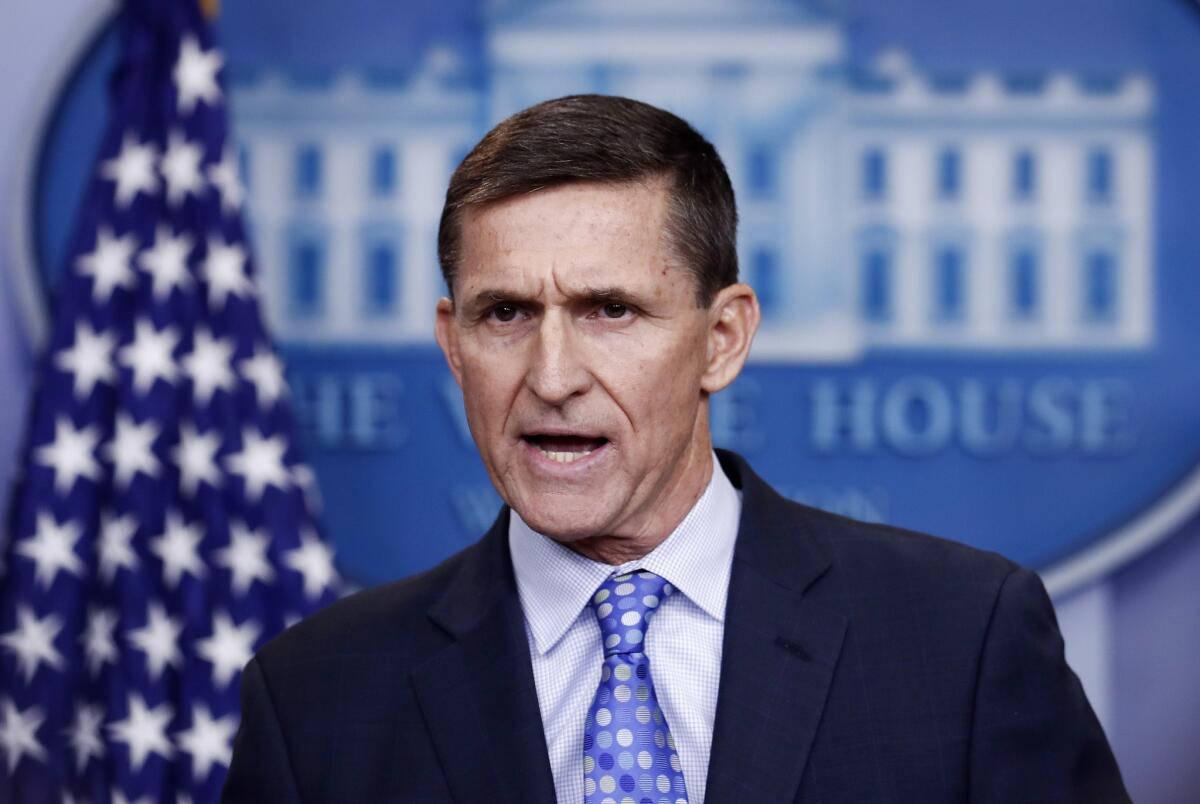
The U.S. has put Iran “on notice” for carrying out a medium-range ballistic missile test and attacks by proxy forces on a Saudi frigate, White House National Security Advisor Michael Flynn said Wednesday, a cryptic comment that appeared to signal the Trump administration is taking a tougher stance on Iran than its predecessor.
“The Trump administration condemns such actions by Iran that undermine security, prosperity, and stability throughout and beyond the Middle East and place American lives at risk,” Flynn told reporters at the White House.
Iran’s first real test of the Trump administration came Sunday, when the U.S. military tracked an Iranian missile launch at a site more than 130 miles east of Tehran.
The missile was tracked flying southward 650 miles before exploding when its reentry vehicle failed, according to U.S. officials who weren’t authorized to speak publicly on what their intelligence showed.
Flynn said the launch was a violation of a United Nations resolution passed shortly after the landmark 2015 nuclear deal between Iran and six world powers was reached. President Obama was a major proponent of the deal.
“The Obama administration failed to respond adequately to Tehran’s malign actions — including weapons transfers, support for terrorism, and other violations of international norms,” Flynn said, adding that “Iran continues to threaten U.S. friends and allies in the region.”
Resolution 2231 calls on Iran “not to undertake any activity related to ballistic missiles designed to be capable of delivering nuclear weapons, including launches using such ballistic missile technology.”
The U.N. has not yet determined whether the launch was a violation, but Iran has repeatedly maintained that missile development is within its rights to self-defense against attack from Israel, its longtime regional adversary.
Iran’s foreign minister Mohammad Javad Zarif denied any violation as a result of the test and cautioned Washington over escalating tensions, according to the semi-official Fars news agency.
“We hope that Iran’s defense programs — which are out of the sphere of the Resolution 2231 and the nuclear deal — will not become a pretext for political games,” Zarif said Tuesday.
Separately, Houthi rebels launched a suicide boat attack Monday against a Saudi Arabian military frigate as it transited off Yemen’s western coast in the Red Sea, killing two crew members and wounding three others.
The Houthis, a Shiite Muslim group backed by Iranian money and weapons, have been locked in a war with a Saudi-led coalition in Yemen since 2015 when they forced the country’s U.S.-backed president into exile and quickly swept across the Arab world’s poorest nation.
Three boats packed with explosives attacked the frigate, which was carrying 176 people, according a coalition statement, but the vessel was able to continue operating.
The Houthis said a guided missile hit the Saudi frigate, not explosives-packed boats. Footage released by Houthis showed a fiery explosion..
In October, President Obama authorized a U.S. Navy destroyer to launch cruise missile attacks against coastal radar sites along the western coast of Yemen, in the same area the Saudi vessel was targeted.
The Pentagon alleged that the U.S. guided-missile destroyer Mason was targeted by missiles fired from Hudaydah, a rebel-controlled area in western Yemen. The ship was not hit and no one aboard was injured.
2:32 p.m.: This story was updated with comment from Iran’s foreign minister.
Trump administration further clarifies travel ban, exempting green card holders
The Trump administration has clarified language in its travel ban affecting seven majority-Muslim countries to make clear that green card holders from those countries do not need to get a waiver before entering the U.S., the White House said Wednesday.
White House spokesman Sean Spicer announced the change during a briefing with reporters, saying it was made in the name of efficiency.
“They no longer need a waiver because if they are a legal permanent resident, they won’t need it anymore,” Spicer said.
The ban, issued Friday, has caused confusion at U.S. airports and sparked lawsuits. It bars incoming travelers from seven countries — Iraq, Iran, Syria, Yemen, Sudan, Somalia and Libya — for 90 days and blocks refugees from around the world for 120 days.
Confirmation of Betsy DeVos as secretary of Education in peril as two GOP senators defect
President Trump is facing his most serious Cabinet confirmation battle yet after two GOP senators on Wednesday announced that they will vote against his nominee for secretary of Education, Betsy DeVos.
In speeches on the Senate floor, Sens. Susan Collins of Maine and Lisa Murkowski of Alaska said they were troubled by what they said was DeVos’ lack of understanding of public school issues beyond her signature cause of promoting school choice in struggling urban communities. Their plans to vote against DeVos threw the nomination into turmoil.
Late Wednesday, DeVos’ nomination took another hit, from Eli Broad, the billionaire philanthropist who has funded many education reform efforts, especially charter schools. Broad sent a letter to senators calling DeVos unqualified.
“With Betsy DeVos at the helm of the U.S. Department of Education, much of the good work that has been accomplished to improve public education for all of America’s children could be undone,” Broad wrote.
He said he initially had questions about her desire for “unregulated” charter schools and vouchers, and that her performance at her confirmation hearing had increased his doubts.
DeVos currently does not have any support from Senate Democrats. She will need every remaining Republican to vote for her to force a tie on the Senate floor, which could then be broken by Vice President Mike Pence.
White House officials expressed confidence that DeVos would be confirmed despite the opposition from Murkowski and Collins. Opponents focused attention on Sen. Pat Toomey of Pennsylvania, who has not yet declared his intentions.
The fissure in the Senate GOP caucus over her nomination created a considerable political headache for the new administration. It will likely delay the confirmation of Alabama Sen. Jeff Sessions, Trump’s nominee for attorney general, as Sessions’ vote will now be crucial to winning approval for DeVos.
The turbulence reflects the challenges Trump faces in working with Congress, even when it is controlled by his own party. And it comes at a time when some fellow Republicans are eager to send the administration the message that failing to work in concert with Congress -- as Trump neglected to do before issuing poorly executed executive orders on immigration -- can be perilous to his agenda.
In her floor speech, Collins said DeVos’ focus on charter schools and vouchers “raises the question about whether or not she fully appreciates that the secretary of Education’s primary focus must be on helping states and communities … strengthen our public schools.”
Collins said she was “troubled and surprised” that DeVos lacked familiarity with the landmark Individuals with Disabilities Education Act, guaranteeing appropriate education to children with special needs.
Murkowski said she had received thousands of calls from voters expressing alarm about DeVos. “They’re very concerned that Mrs. DeVos will force vouchers on Alaska,” she said. “Mrs. DeVos has much to learn about our nation’s public schools, how they work and the challenges they face.”
This post was updated with news of Eli Broad’s letter criticizing DeVos.
Senate confirms Rex Tillerson as Trump’s secretary of State
The Senate has approved Rex Tillerson, the former chief executive of Exxon Mobil Corp., to serve as Donald Trump’s secretary of State.
The nomination was approved by a 56-43 vote cast largely along party lines.
Tillerson, 64, takes over a department that has already shown its distrust of Trump’s initial foreign policy.
On Tuesday, more than 800 U.S. diplomats and Foreign Service officers gave the State Department a signed memo of dissent after Trump issued an order to bar travel or immigration from seven mostly-Muslim nations.
Tillerson came under criticism during his confirmation hearings for refusing to condemn governments with confirmed records of human rights abuses, including Russia, Saudi Arabia and the Philippines.
He also faced harsh questions about whether he would be tough on Russia or would defend efforts to curb climate change, among other challenges.
At Exxon, Tillerson opposed the economic sanctions imposed on Russia after President Vladimir Putin annexed Crimea and sent troops to support separatists in Ukraine in 2014.
Tillerson said sanctions hurt U.S. businesses, and Exxon reportedly lost hundreds of millions of dollars because it had to scrap planned oil exploration and refinery projects in Russia.
Tillerson had acknowledged a close, friendly relationship with Putin, who bestowed one of the country’s highest honors, the Order of Friendship, on the Exxon chief in 2013.
Trump, however, praised Tillerson as a “world-class” business executive who would bring fresh insight and global experience to the job as America’s top diplomat.
Trump says Frederick Douglass did ‘an amazing job’
President Trump singled out one of the most renowned figures in American history Wednesday with the type of praise he might normally reserve for a quality subcontractor on one of his development projects.
“Frederick Douglass is an example of somebody who’s done an amazing job that is being recognized more and more, I notice,” Trump said during an African American History Month listening session at the White House.
“Harriet Tubman, Rosa Parks and millions more black Americans who made America what it is today. Big impact. I’m proud to honor this heritage. And we’ll be honoring it more and more.”
Douglass, who escaped slavery to become a leading abolitionist and social thinker, died in 1895. His life story is a staple of most grade-school curricula. Trump was recognizing him as someone whose impact is highlighted in the National Museum of African American History and Culture, the newest major Smithsonian museum to open in Washington.
“I am very proud now that we have a museum on the National Mall where people can learn about [the Rev. Martin Luther King Jr.], so many other things,” Trump said before noting the interest in Douglass.
Jeff Sessions’ nomination as attorney general advances to full Senate
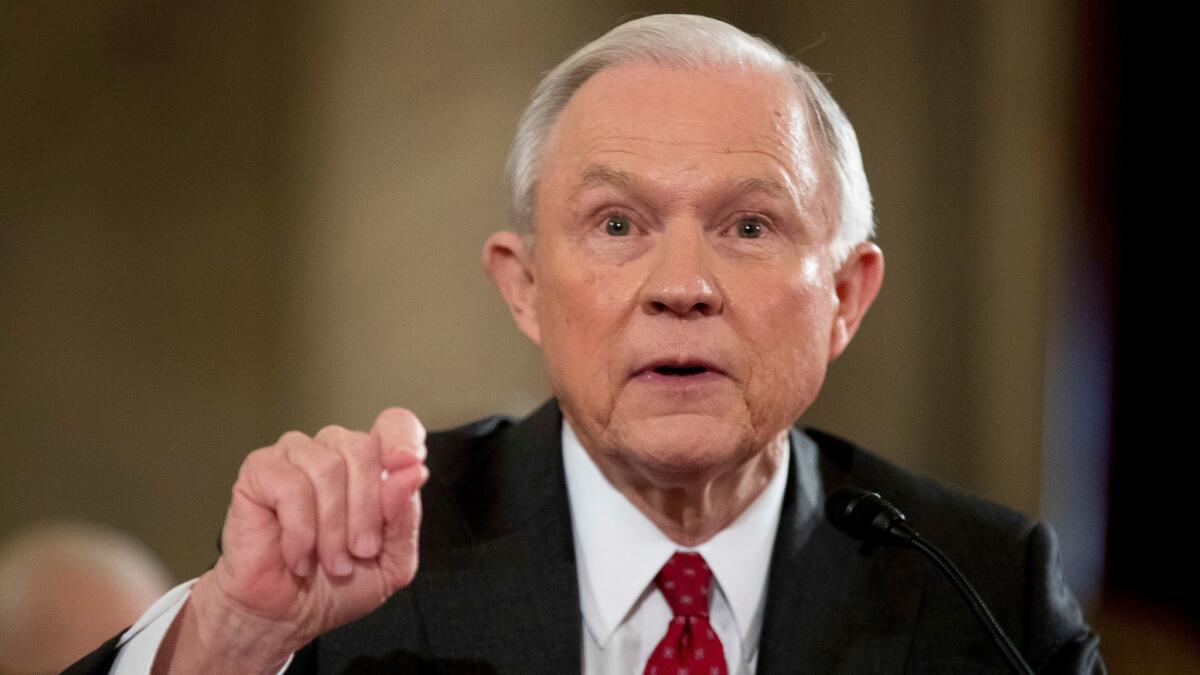
The Senate Judiciary Committee has approved the nomination of Sen. Jeff Sessions (R-Ala.) to be attorney general after angry exchanges between Republicans and Democrats.
The 11-9 vote was along party lines. All the panel’s Democrats voted against the nomination.
The Alabama Republican is expected to be confirmed by the full Senate. Republicans have been strongly supportive of their colleague, arguing that he will follow the law and maintain traditional independence from President Trump, if needed.
Democrats have expressed doubts that Sessions would be able to say no to the president since he was one of Trump’s earliest and strongest defenders in the election campaign.
They also expressed concerns about whether Sessions would be committed to civil rights, a chief priority of the Obama administration.
Senate Republicans approve Price and Mnuchin nominations after changing the rules to stymie Democrats’ boycott
Republicans on the Senate Finance Committee voted Wednesday to recommend the nominations of Tom Price as Health and Human Services secretary and Steve Mnuchin as Treasury secretary to the full Senate after changing rules to stymie a boycott by Democrats.
Both nominations advanced by 14-0 votes with only Republicans attending the meeting.
The move came after Democrats prevented votes for both men Tuesday, charging that Price and Mnuchin misled the committee.
That delaying tactic infuriated Senate Finance Committee Chairman Orrin Hatch (R-Utah), who called the move “pathetic” and Democrats “idiots.”
Committee rules require at least one member from each party to be present for a meeting. But the committee’s Republicans changed the rules Wednesday to allow for confirmation votes, Hatch said.
“We took some unprecedented actions today due to the unprecedented obstruction on the part of our colleagues,” Hatch said.
Democrats have said Mnuchin, a wealthy Wall Street executive, misled the committee in his response to a written question about foreclosures at Pasadena’s OneWest Bank while he ran it from 2009-15.
Democrats pointed to a report Sunday by the Columbus Dispatch that Mnuchin denied that OneWest engaged in so-called robo-signing of mortgage documents.
The paper said its analysis of nearly four dozen foreclosure cases in Ohio’s Franklin County in 2010 showed that the bank “frequently used robo-signers.”
The Dispatch cited a foreclosure involving a mortgage signed by Erica Johnson-Seck, a OneWest vice president who said in a deposition in a 2009 Florida case that she signed an average of 750 documents a week.
Barney Keller, a spokesman for Mnuchin, said Monday that several courts had dismissed cases involving allegations of robo-signing by Johnson-Seck.
“The media is picking on a hardworking bank employee whose reputation has been maligned but whose work has been upheld by numerous courts all around the country in the face of scurrilous and false allegations,” Keller said.
Democrats also have problems with Price, a six-term congressman and former orthopedic surgeon who has distinguished himself in conservative circles for his staunch opposition to the Affordable Care Act and his plans to slash federal healthcare spending.
His nomination has become among Trump’s most controversial, in part because of his hostility to government safety net programs, including Medicaid and Medicare.
Democrats have also been increasingly critical of Price’s extensive trading in healthcare stocks while he has been in Congress, and in some cases while he has pushed legislation that would benefit his portfolio.
Price has denied any wrongdoing.
Also drawing criticism was Price’s purchase of discounted shares in an Australian biotech firm, Innate Immunotherapeutics, which he was offered through a private deal not available to general shareholders.
Price also denied that this was improper, and Senate Republicans have rallied to his side, saying he did not violate any ethics rules.
8 a.m.: This article was updated with staff confirmation of the votes and the tallies.
President Trump says it’s illegal to be registered to vote in two states — but he’s wrong
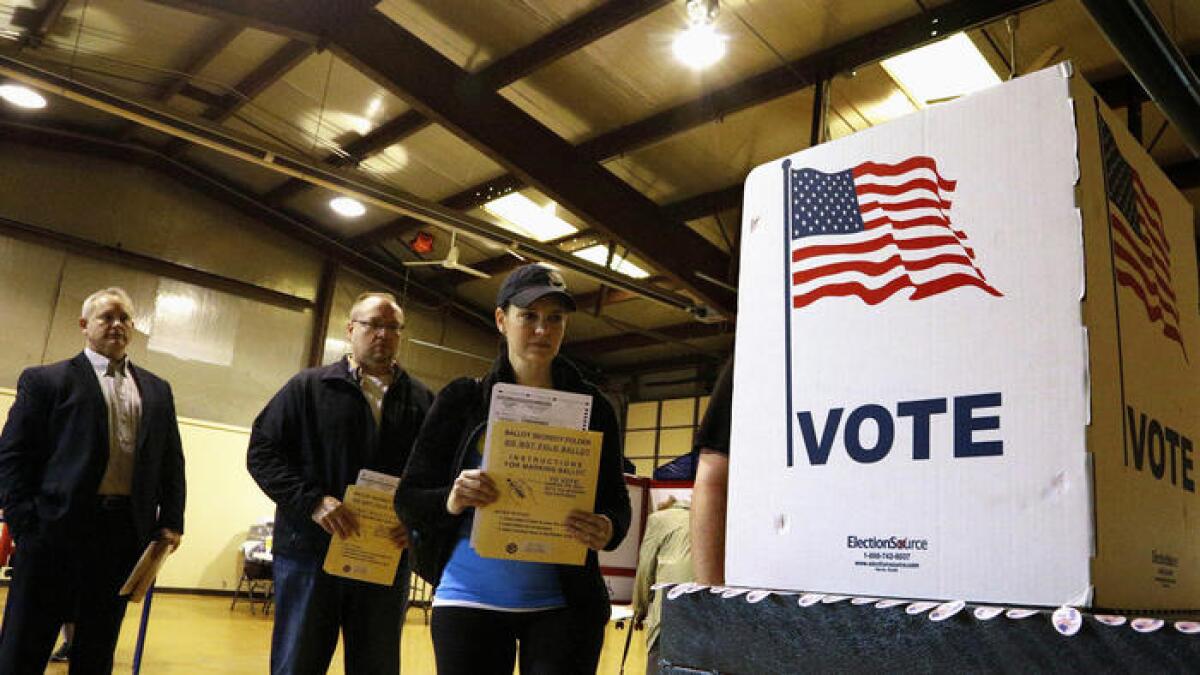
It was a forceful condemnation — a vow to wipe out a serious crime.
“I will be asking for a major investigation into VOTER FRAUD, including those registered to vote in two states,” President Trump boomed on Twitter last week.
But Trump’s social media decree missed a crucial fact: It’s not illegal to be registered to vote in multiple states. It is, however, a felony to cast ballots in more than one state — yet it rarely happens.
Trump’s tweet storm about voter registration — and his unfounded claim that millions of illegal votes were cast for Democratic rival Hillary Clinton in November — has cast a spotlight on voting procedures nationwide. That spotlight has revealed some ironies.
The White House might not be OK with the term ‘ban,’ but Trump is
President Trump tweeted a day after White House Press Secretary Sean Spicer, Homeland Security Secretary John Kelly and other top administration officials insisted that Trump’s order to keep out travelers from seven predominantly Muslim countries was not a “ban.”
What Trump’s push to limit overseas workers means for India’s army of high-tech migrant labor

Nikhil Shravage, a 27-year-old systems engineer in the Indian industrial city of Pune, greeted President Trump’s inauguration with dread.
With a master’s in computer science and five years’ experience at a multinational company, Shravage harbors dreams of working in the United States. Every year, thousands of Indians come to the U.S. on special visas for skilled professionals, the vast majority taking temporary jobs in the tech sector.
But with Trump vowing to put “America first” and prevent U.S. jobs from going overseas, India’s army of young tech workers is bracing for new restrictions on a visa program that has represented a path to the middle class for thousands over the last two decades.
“Trump seems to be really looking out for Americans, and he will come really hard at this,” Shravage said.
Democrats see opening in Trump’s stumble on travel ban, move to block Cabinet votes
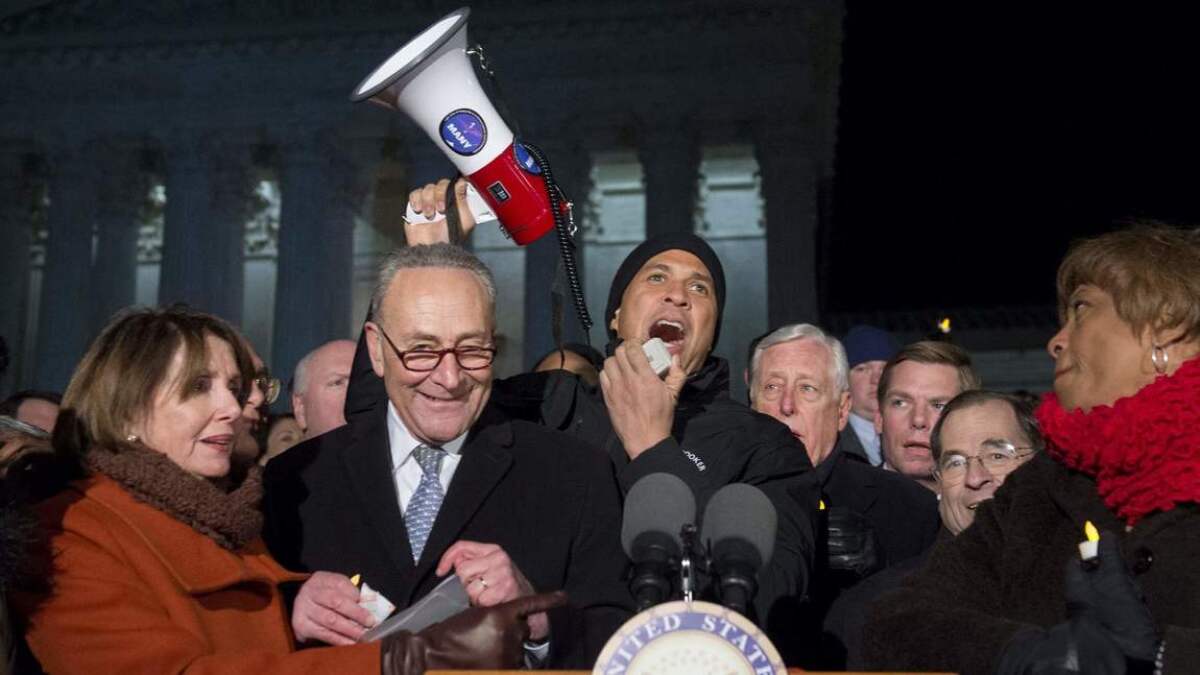
Seizing on President Trump’s early missteps and the wave of protests his executive actions have triggered, Democrats are feeling more emboldened to confront the new administration head-on.
Democrats are still the minority in Congress, lacking the votes to stop Trump’s agenda. But they have the ability to jam it up. And Tuesday they did just that.
Travel order and firing of acting Atty. Gen. Sally Yates roil Justice Department
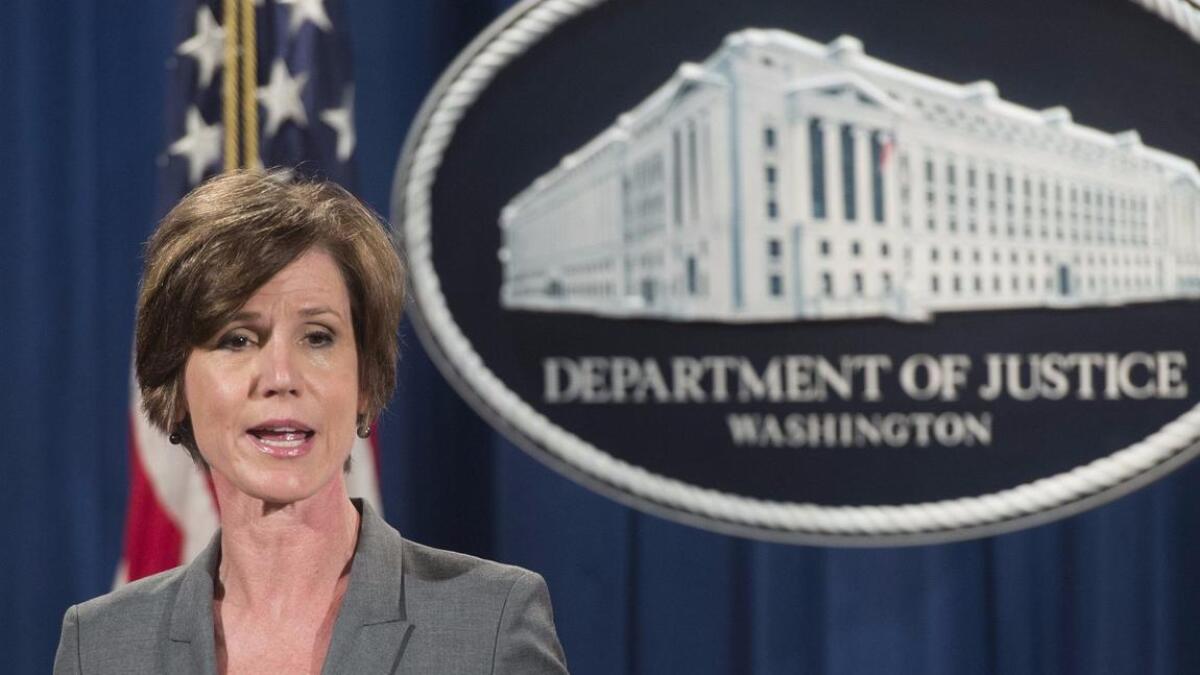
President Trump’s decision late Monday to fire acting Atty. Gen. Sally Yates over her decision to not defend his immigration order has split the Justice Department, with some lawyers hailing the longtime federal prosecutor for taking a courageous stand and others calling it an act of political grandstanding.
The firing left Justice Department officials grappling with the legal and political fallout, and anxious over the agency’s future in a Trump administration.
Biden Foundation is launched to continue the work of the former vice president
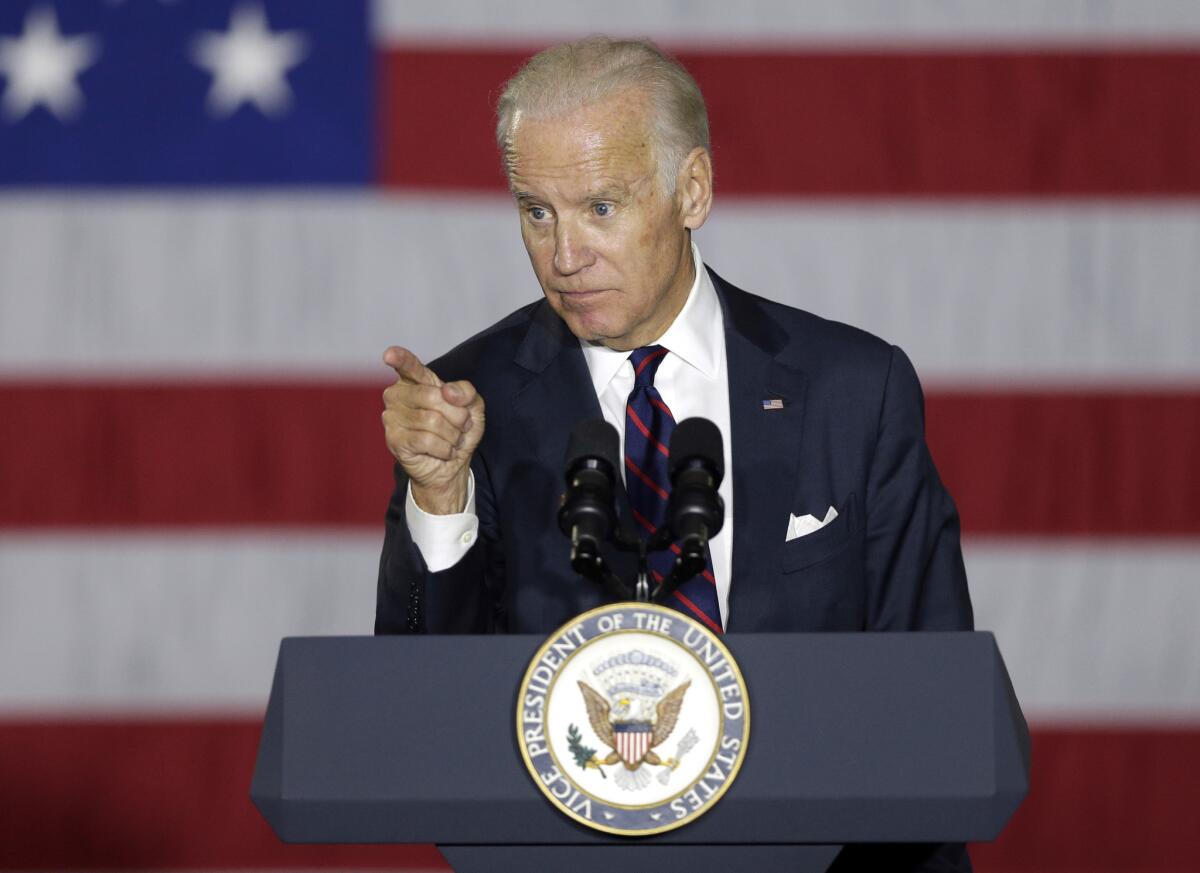
His tenures as senator and vice president behind him, Joe Biden is taking a first step to translate the work of more than four decades in public service into private life.
Longtime allies on Wednesday launched the Biden Foundation, a nonprofit corporation that they say will build on his commitment to “protecting and advancing rights and opportunities for all people.”
The foundation will continue his search for a cure for cancer that Biden began in the White House, promote the Violence Against Women Act that was among his chief legislative achievements, and increase access to education including community colleges, a major initiative of his wife, Dr. Jill Biden.
Ted Kaufman, a longtime Biden advisor who was also appointed to his Delaware Senate seat in 2009 when Biden became vice president, will be chairman of the foundation’s board. Biden’s sister and former campaign manager, Valerie Biden Owens, will serve as vice chairman.
“We are honored that a group of longtime friends and supporters have begun the work of founding the Biden Foundation to build on our lifelong commitment to issues that have always motivated us,” Biden and his wife said in a statement.
“We look forward to this new chapter where we will continue our work to ensure that everyone — no matter their income level, race, gender, age, or sexuality — is treated with dignity and gets a fair shot at achieving the American dream.”
Other aspects of Biden’s post-White House life will be announced soon, including partnerships with the University of Pennsylvania and the University of Delaware.
Biden, like President Obama, will live at least part time in the Washington area. The two men are also expected to partner on political causes, including Obama’s efforts to support Democrats in state legislative races with the goal of boosting the party’s fortunes ahead of crucial 2020 redistricting.
Trump calls off economic speech in Milwaukee amid protests
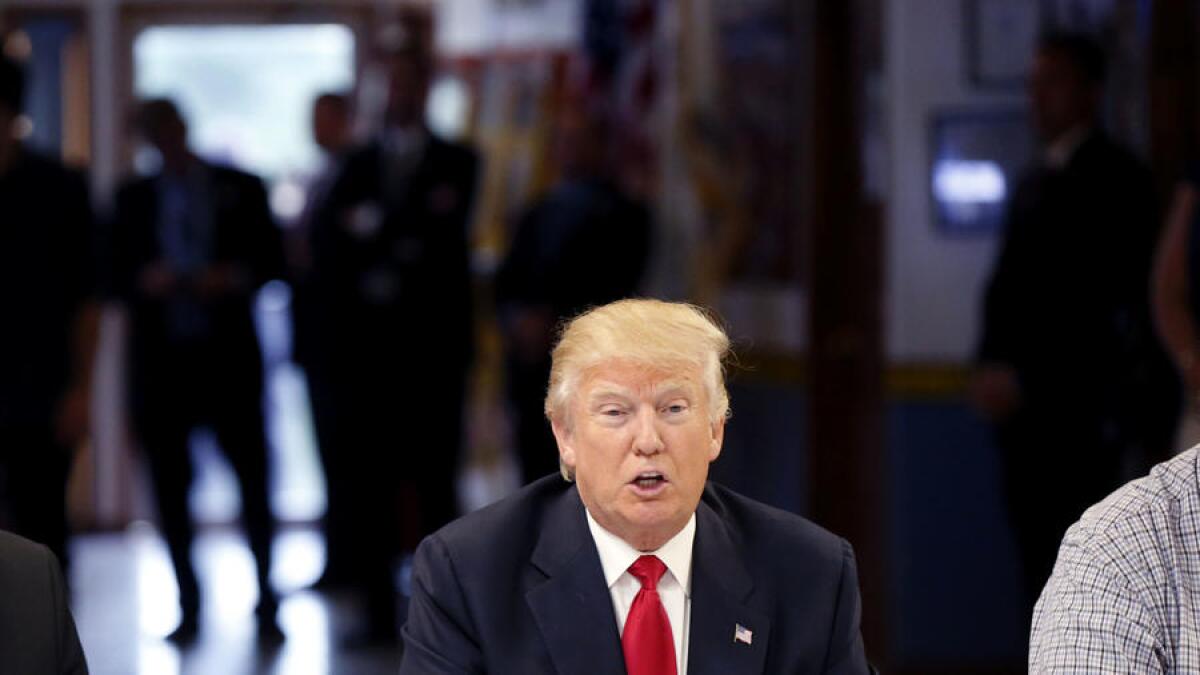
President Trump has canceled a planned trip to deliver an economic speech in Milwaukee on Thursday, an aide said.
The would-be host, a Harley-Davidson factory, was uncomfortable with planned protests coinciding with Trump’s executive orders limiting travel from certain countries and halting refugees, CNN reported.
Harley-Davidson representatives could not be reached for comment.
A White House spokeswoman confirmed that the trip was off, but said the change in plans was related to Trump’s schedule. She disputed that it was at the request of Harley-Davidson.
“It definitely had nothing to do with protests,” she said.
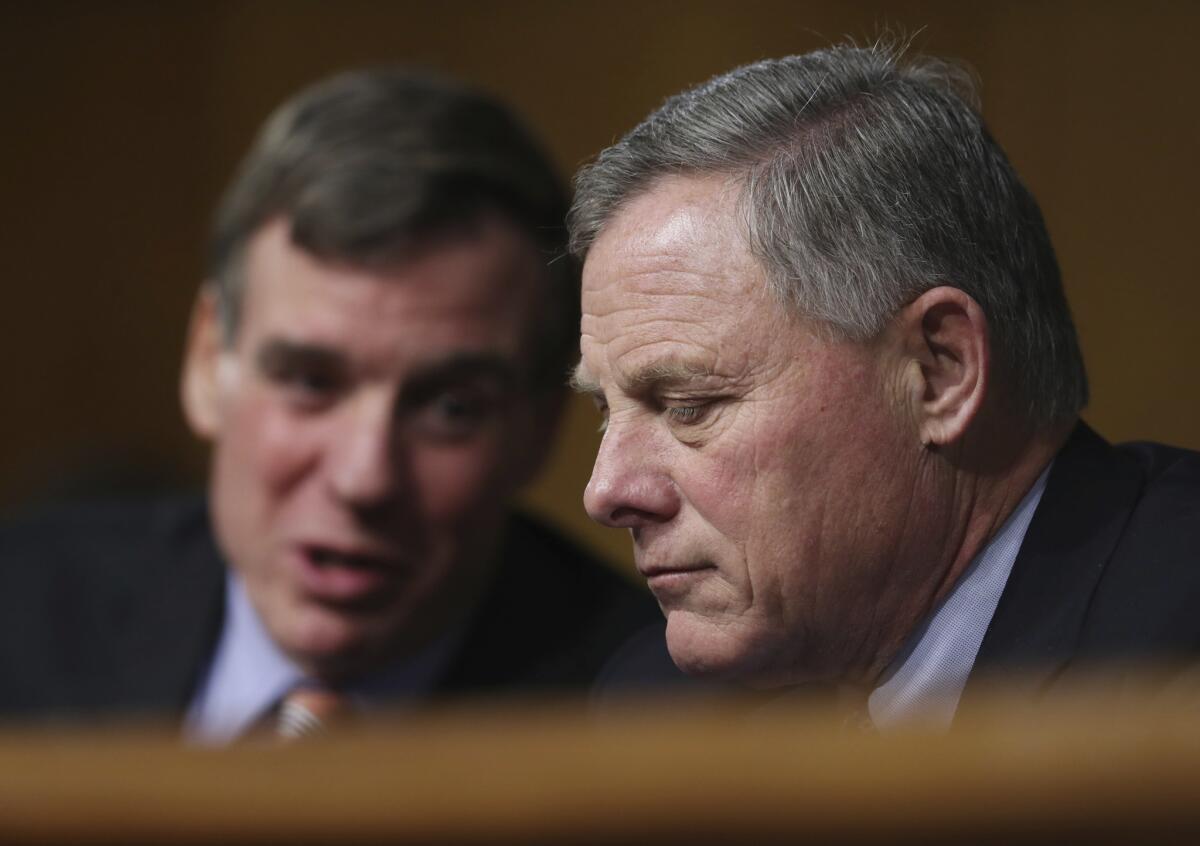
Social media is freaking out about a photo of the man who holds the nuclear football. The Pentagon is not
A photo of a smiling uniformed Army officer identified as the aide carrying nuclear launch information for the president went viral Monday as social media users wondered whether it was prudent for him to be identified, but military officials said he did nothing illegal nor against protocol.
A member of President Trump’s Mar-a-Lago resort in Florida, Richard DeAgazio, posted the photo on Facebook.
U.S. military officials said it’s not illegal for the officer to take the photo, nor against protocol, though they acknowledged it is strange.
“There is an understanding that we, as military officials and those who serve our elected officials, typically seek to maintain a low profile,” said a senior U.S. defense official, who wasn’t authorized to speak on the matter. “It’s never about us. It’s about the mission and the people we serve.”
The photo of the aide doesn’t pose any immediate security risk, but it’s illustrative of another problem, said Stephen Schwartz, a nuclear weapons policy expert and the coauthor of “Atomic Audit,” which assesses the costs of the U.S. nuclear weapons program.
“The idea that a rich guy could walk up to one of them and snap a photo with them to brag to his friends strikes me as flat-out wrong,” he said.
The White House has not addressed the photograph.
A military aide constantly shadows the commander in chief, carrying the briefcase commonly referred to as the “nuclear football.” The case does not actually contain nuclear codes, rather nuclear attack options on foreign targets and other information critical in an emergency.
The briefcase can be traced at least to the Kennedy administration, when the threat of nuclear war hit its peak during the Cuban Missile Crisis in 1962.
Because the case must be near the president at all times, several aides from all military branches are authorized to carry it. They are photographed nearly every day trailing the president, perhaps most famously in Red Square in Moscow in May 1988 alongside President Reagan in a momentous visit to the Soviet Union.
Conservative pundits criticized Vice President Joe Biden in August when he publicly identified a military aide with the nuclear football during a campaign rally for Democratic nominee Hillary Clinton.
The Department of Defense is also planning to lease space in Trump Tower, the 68-story New York building where the president has his home and business headquarters. A floor with 13,000 to 15,000 square feet of space at the building rents for about $1.5 million a year.
The reason the military needs the space? They need room for military aides to handle the nuclear football.